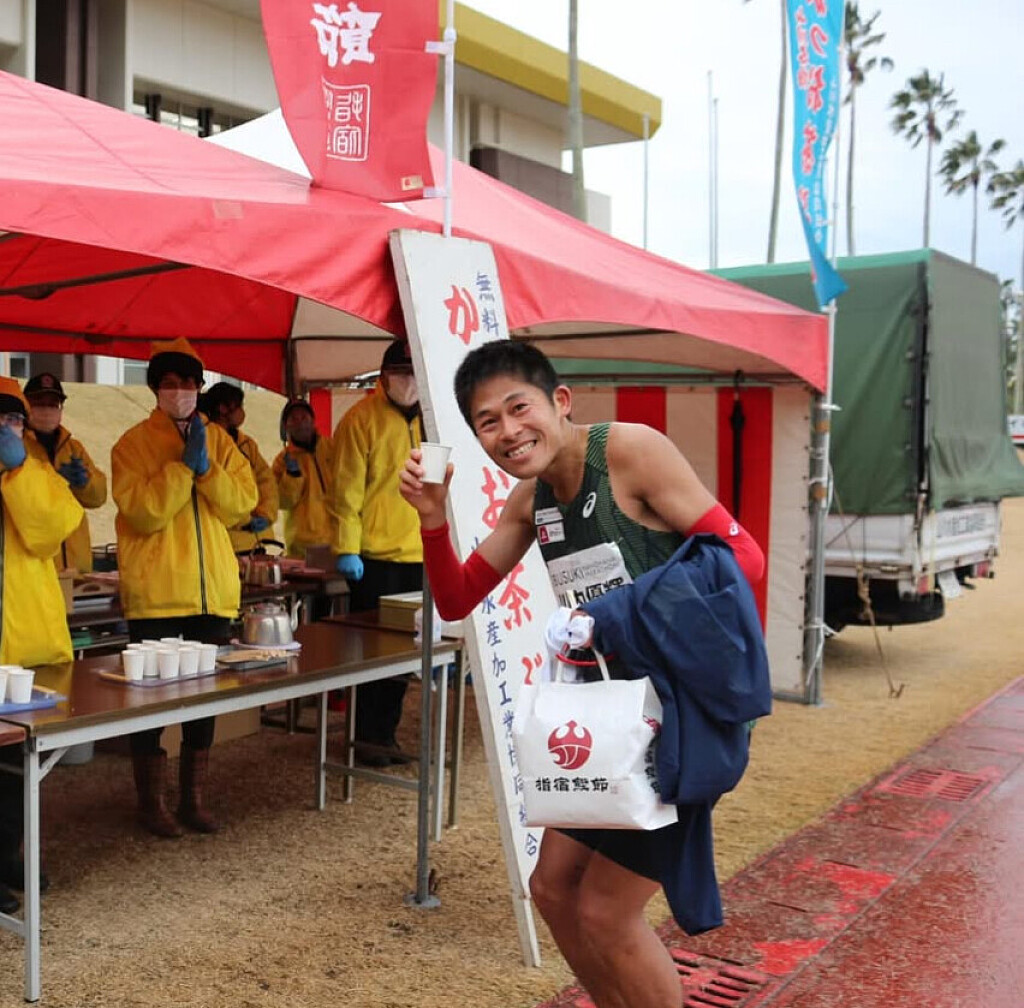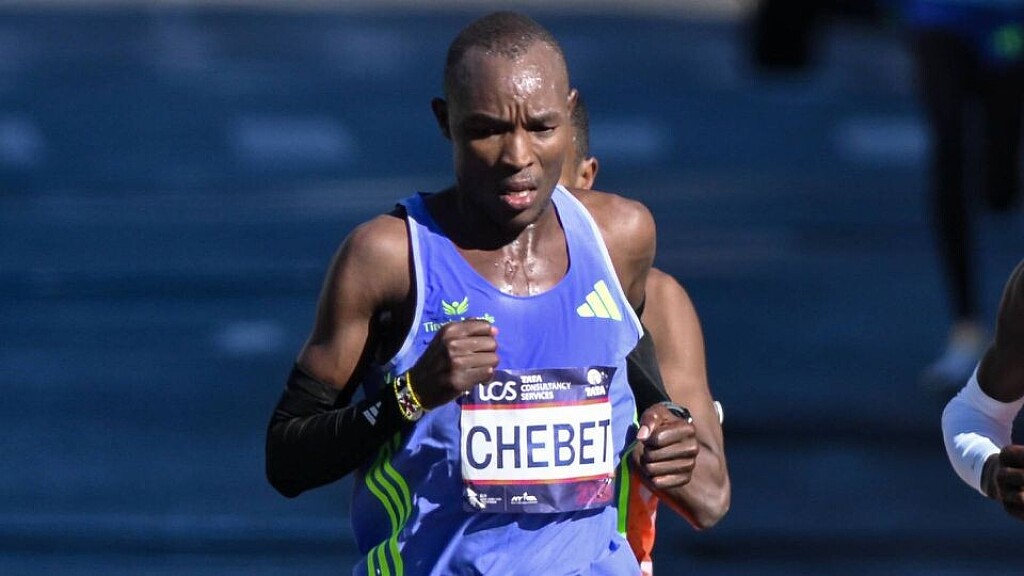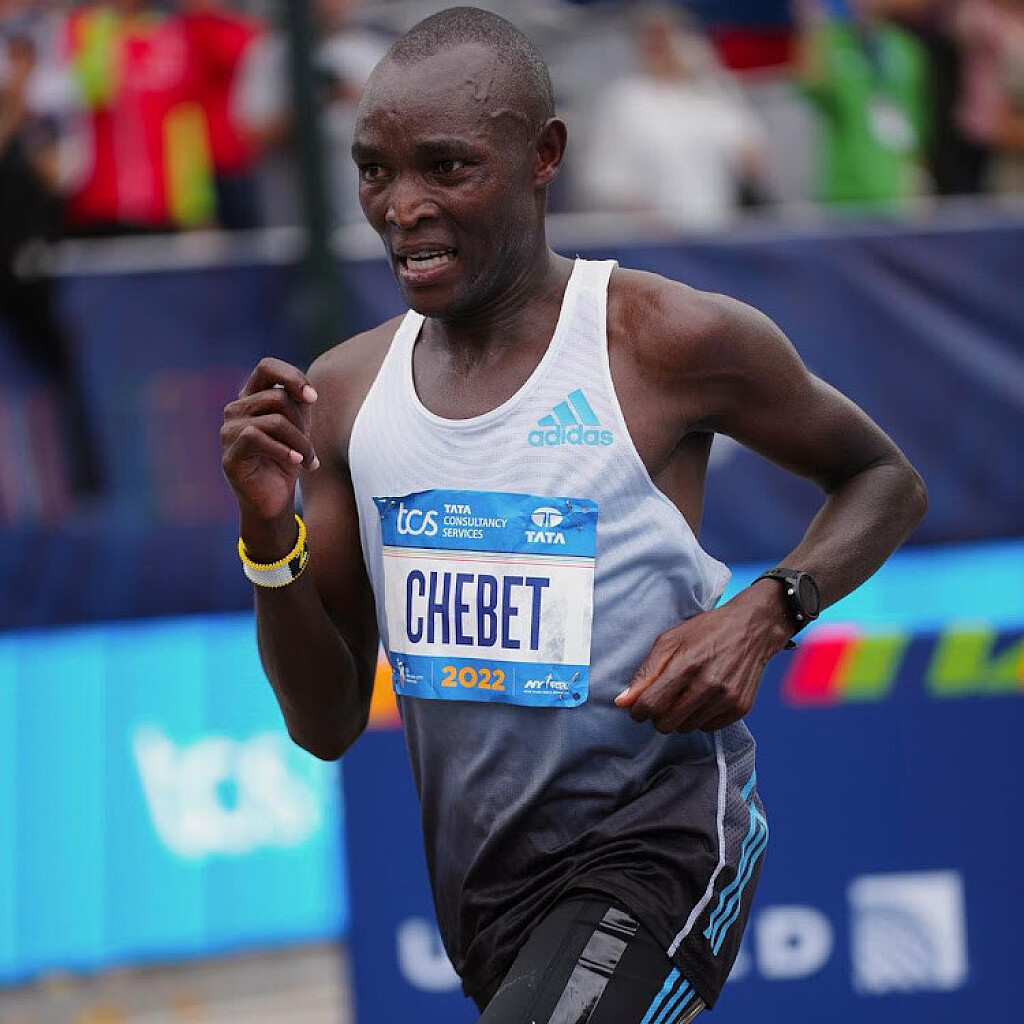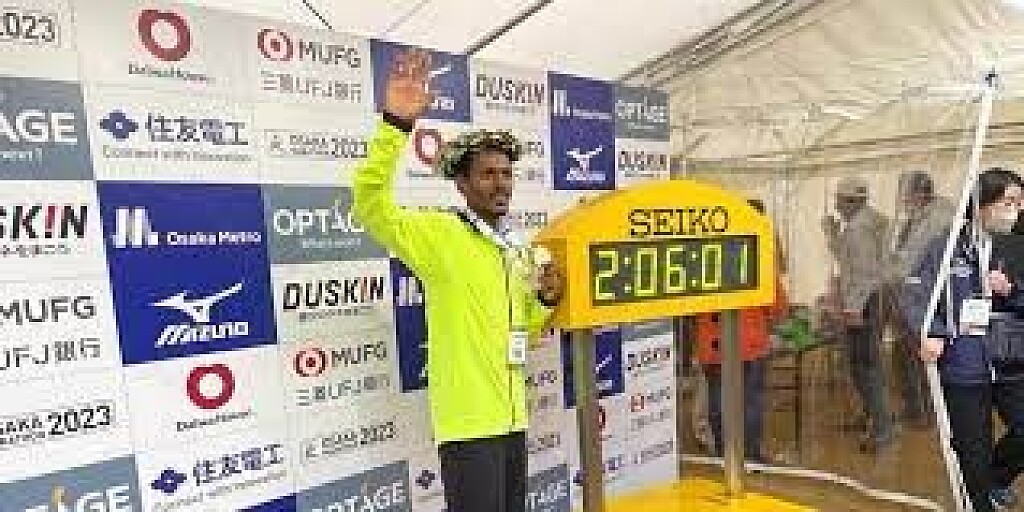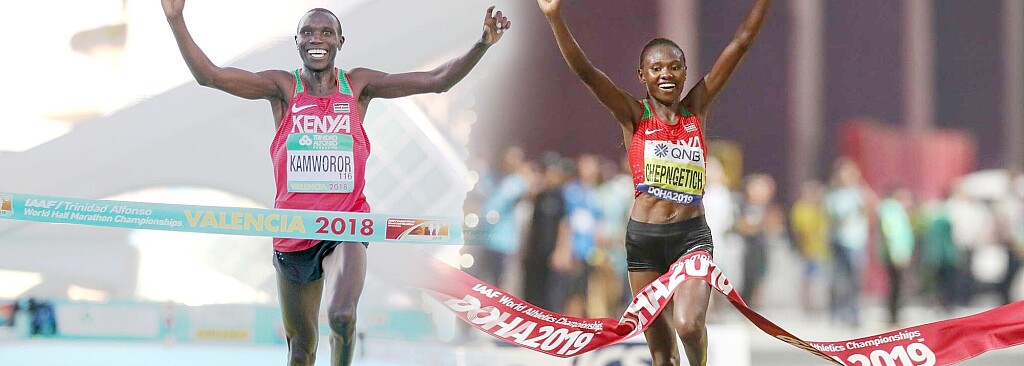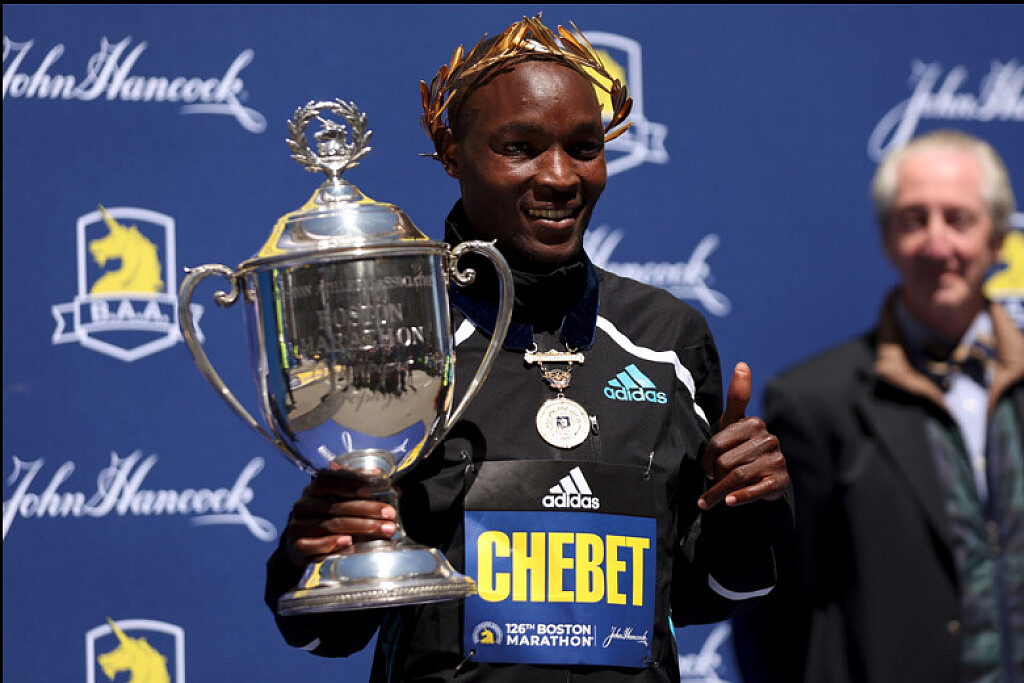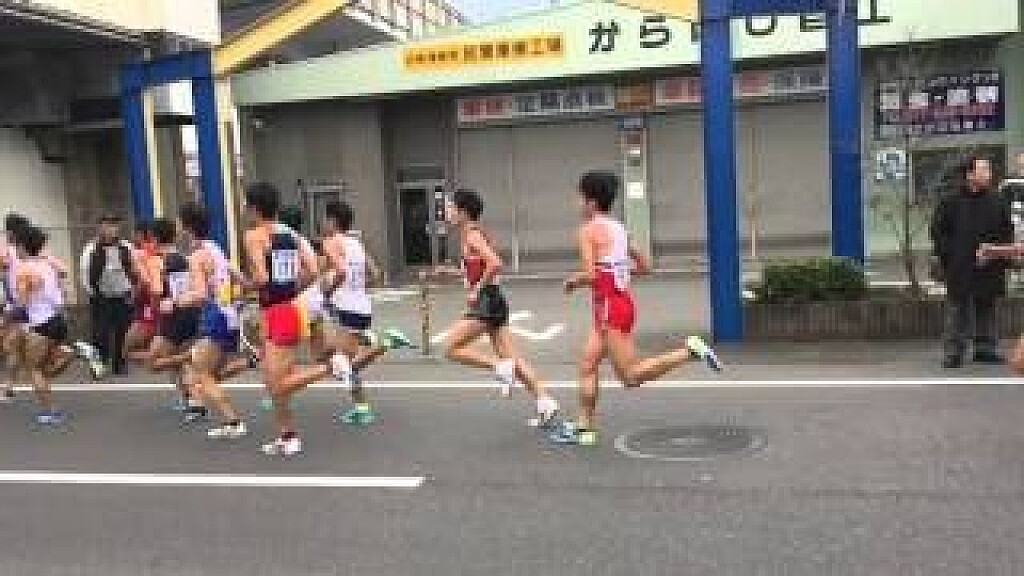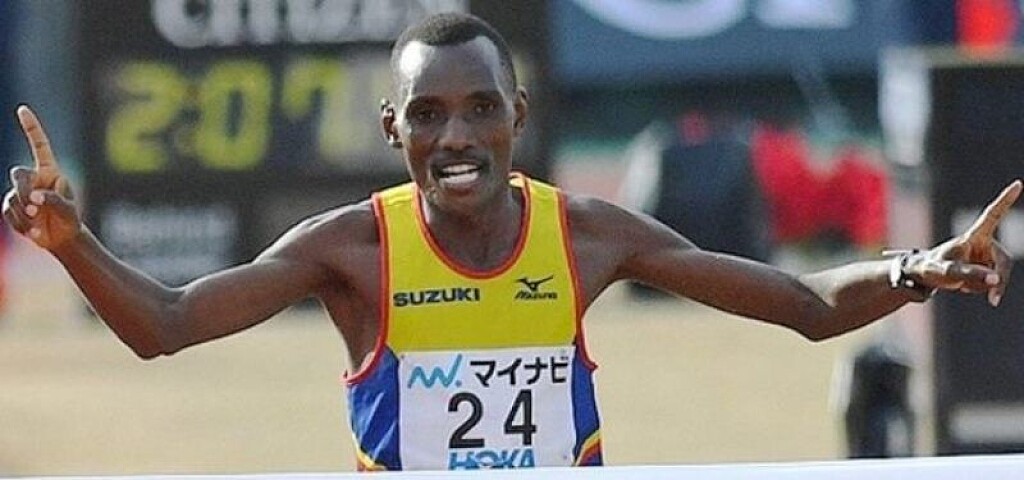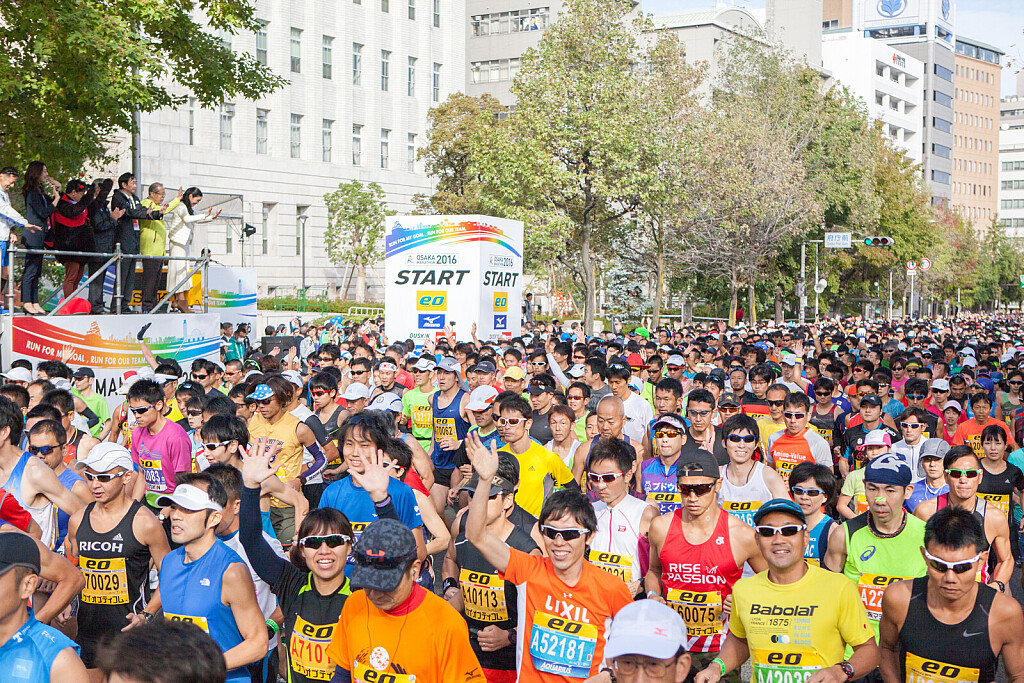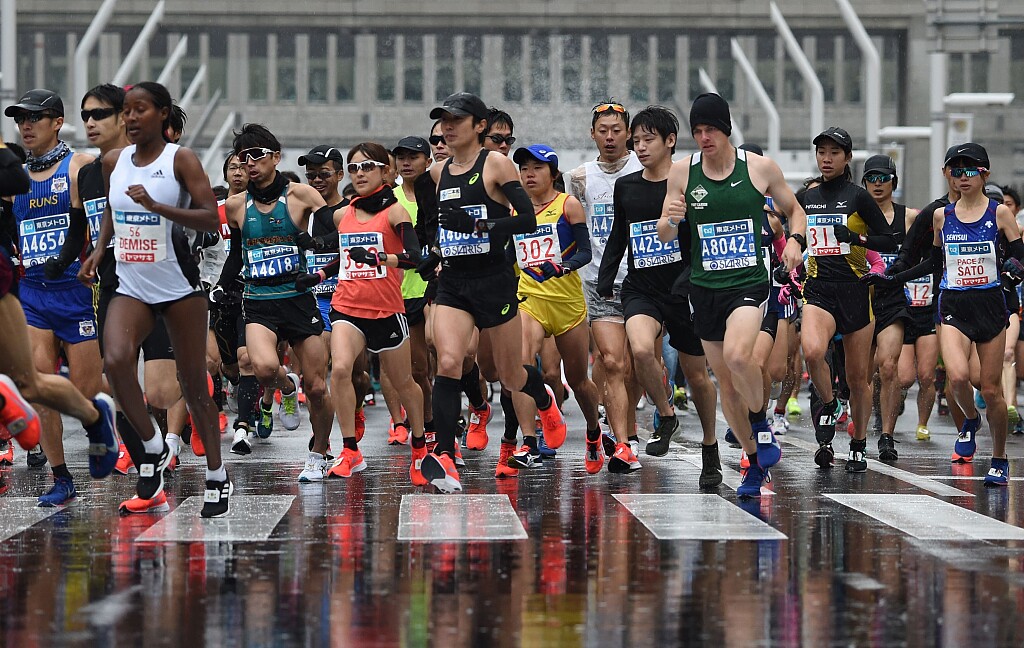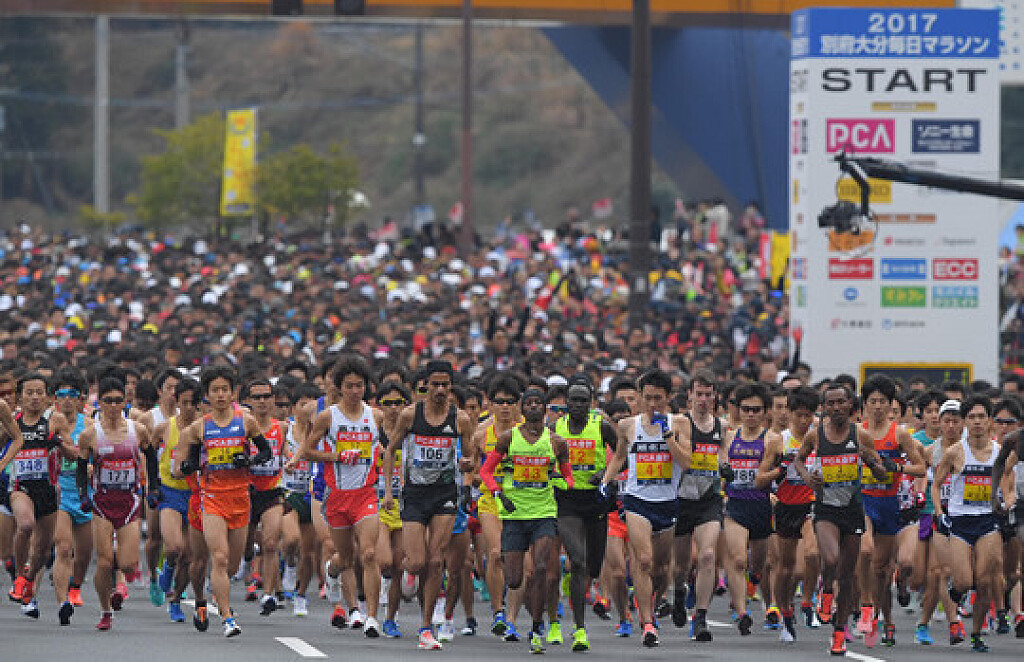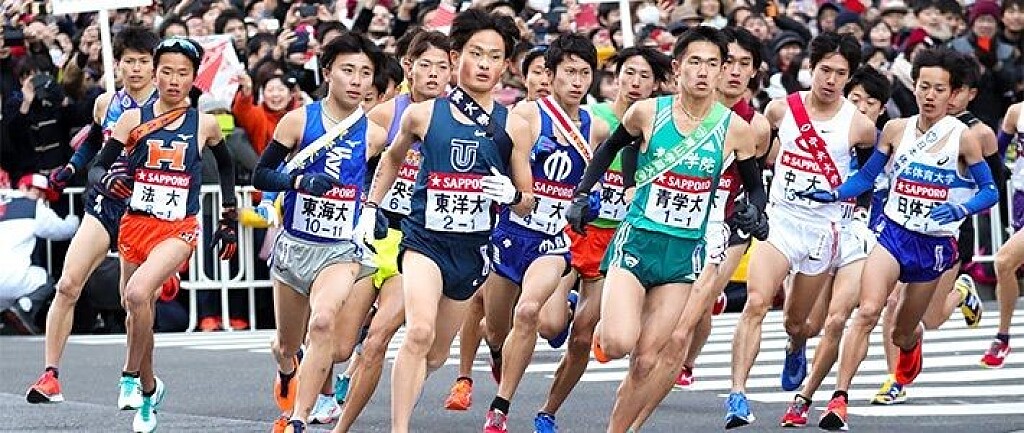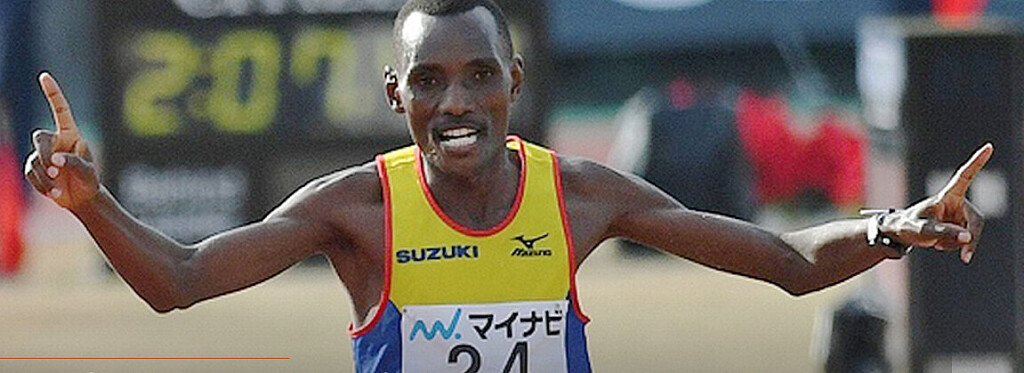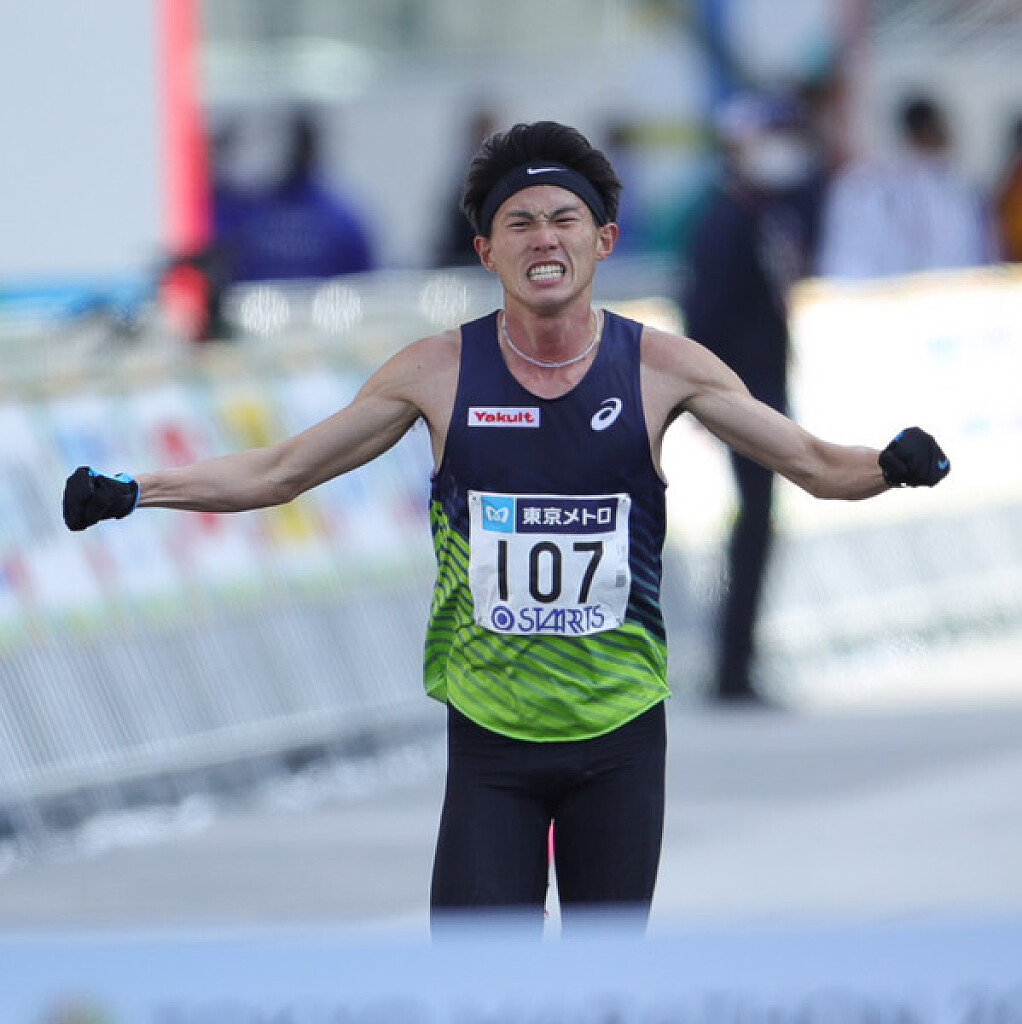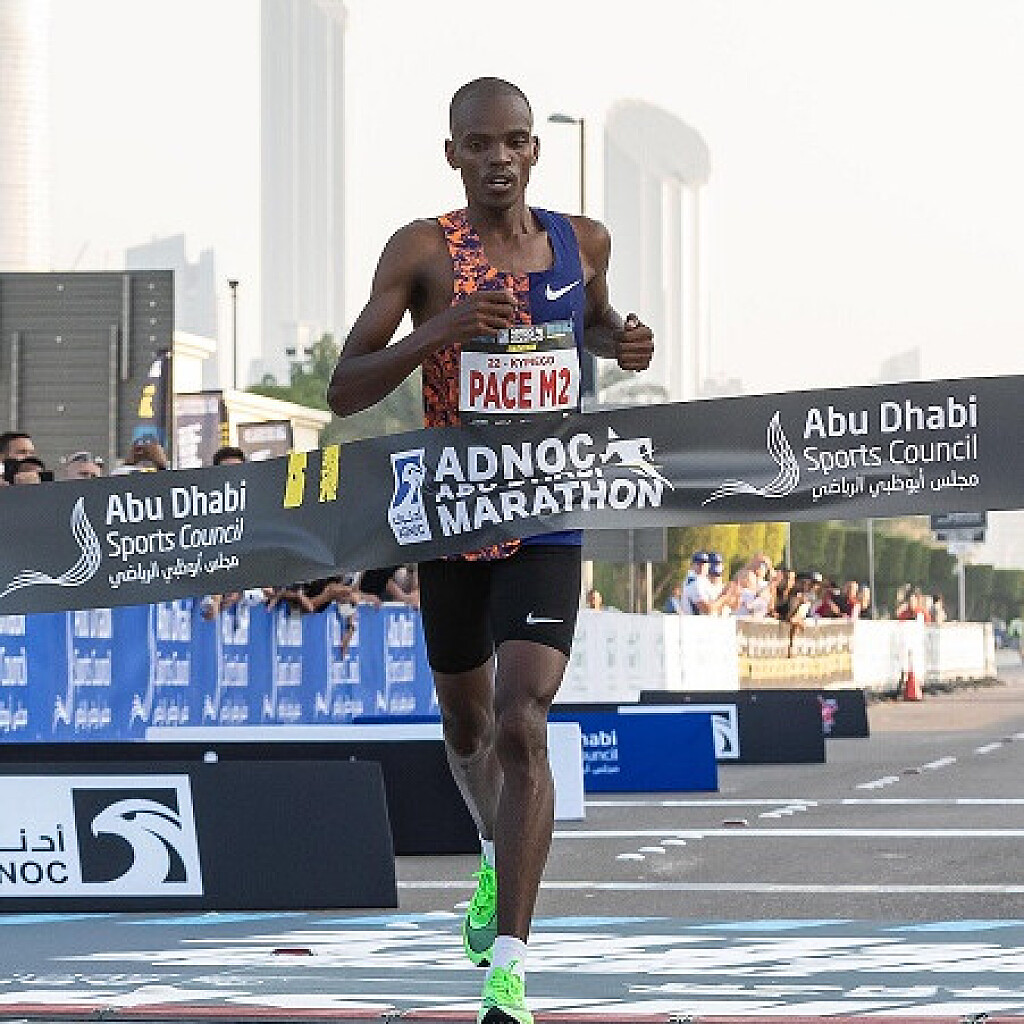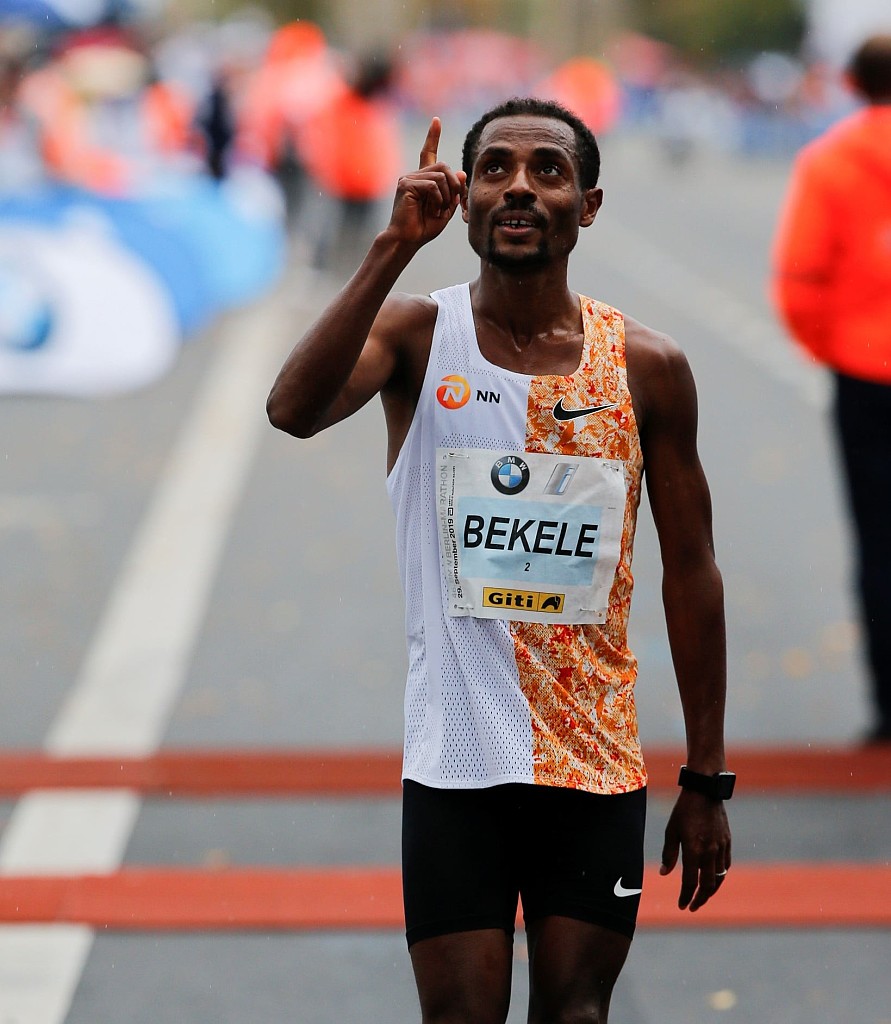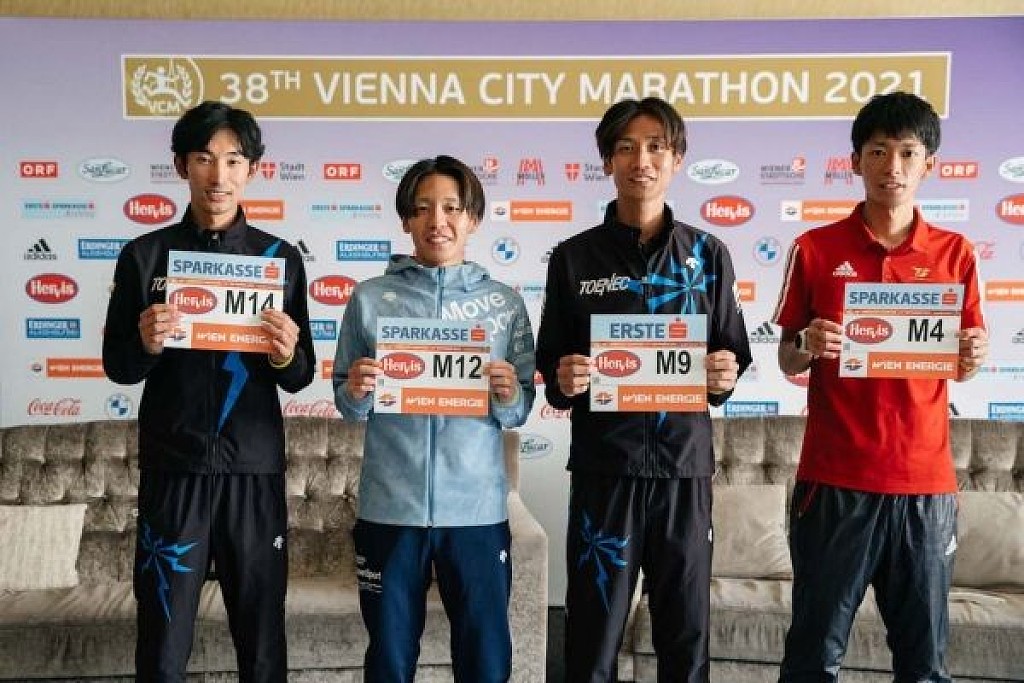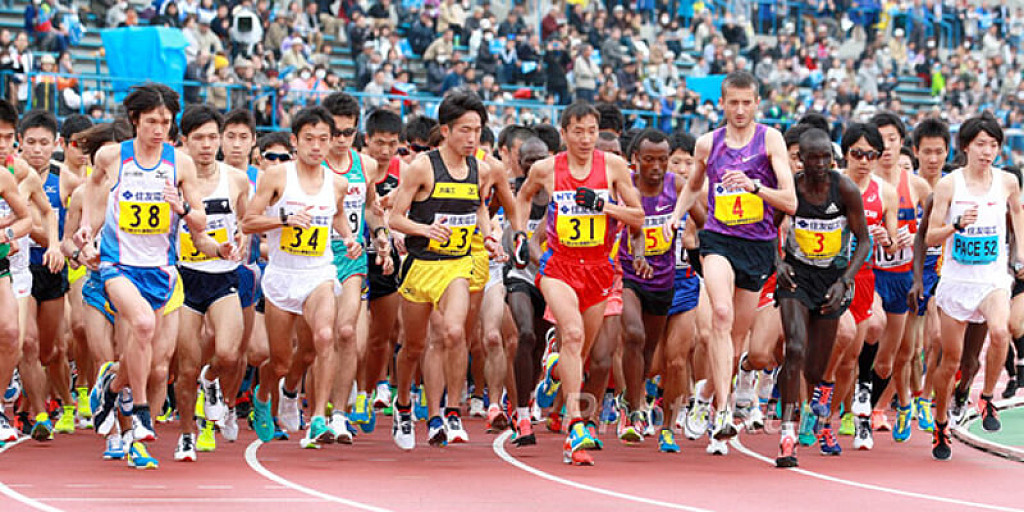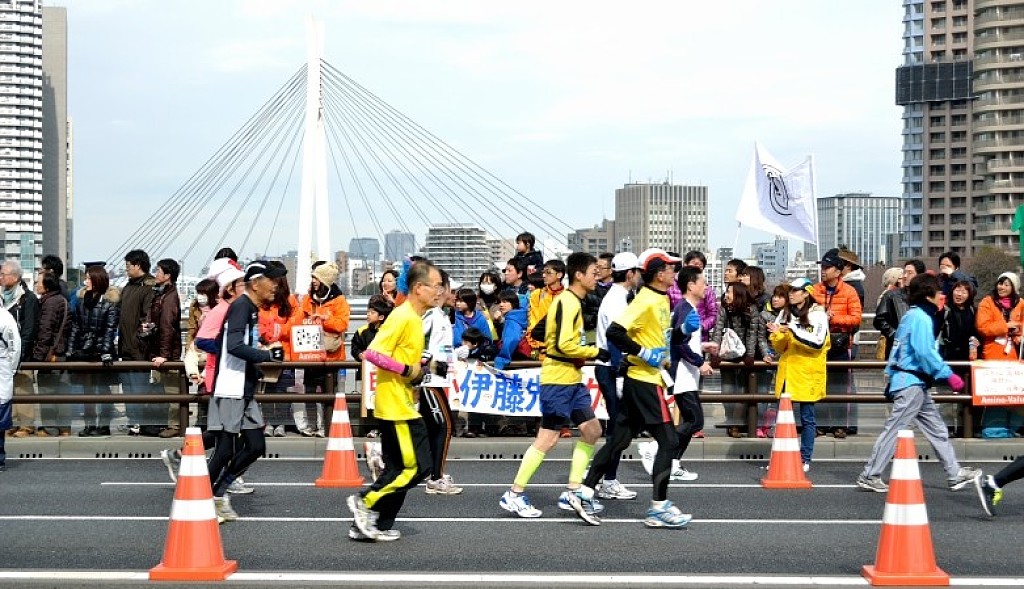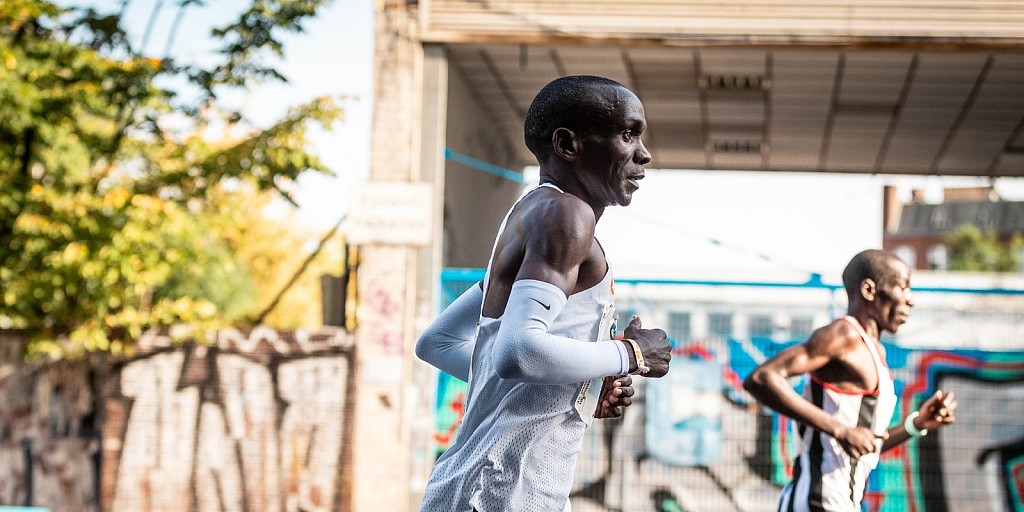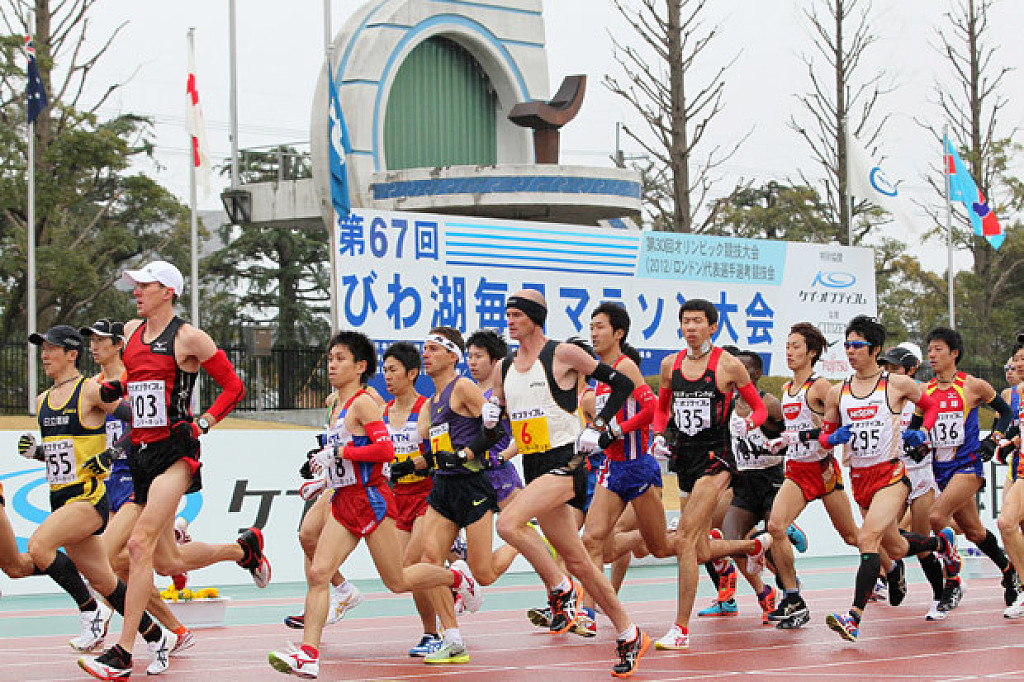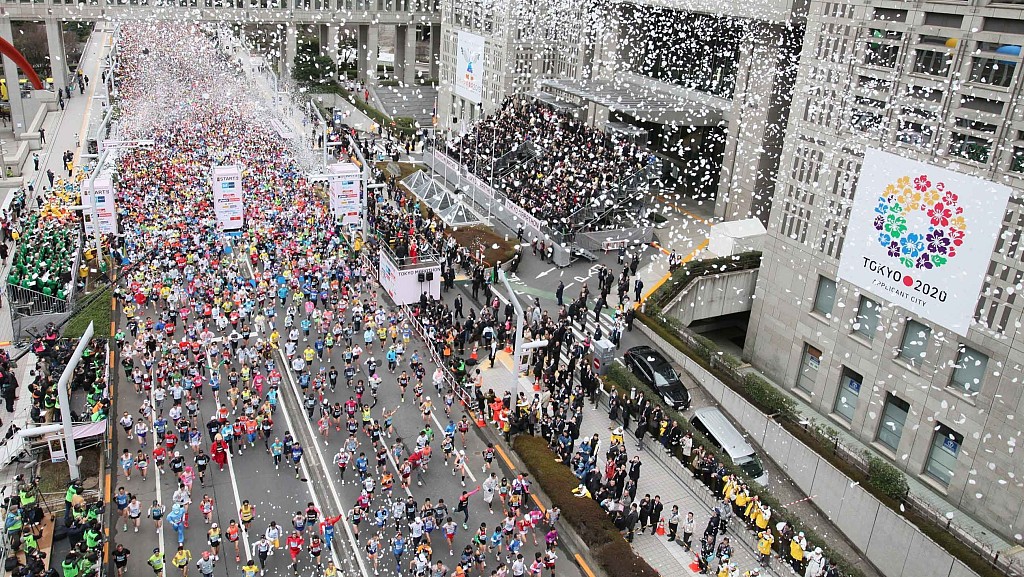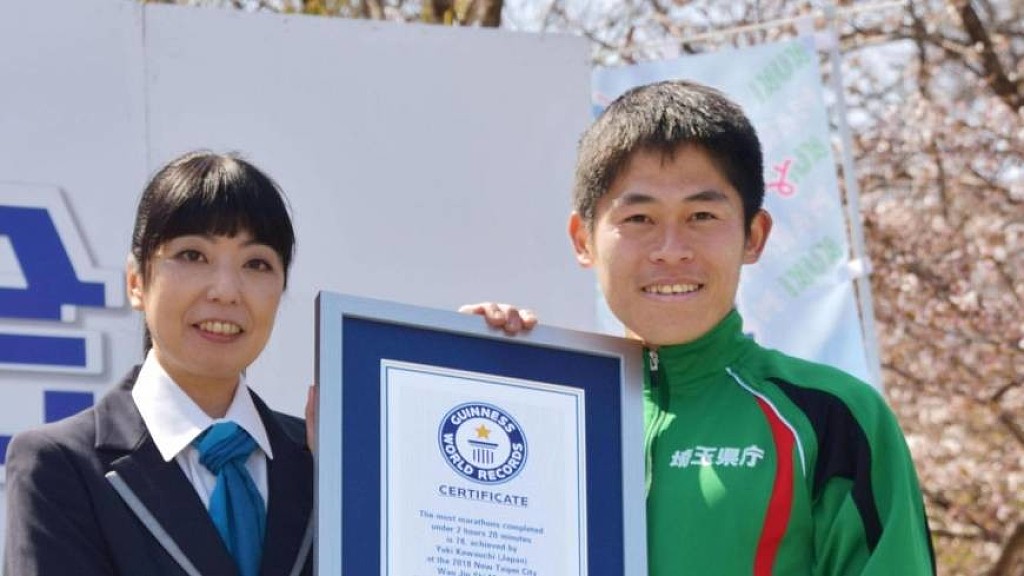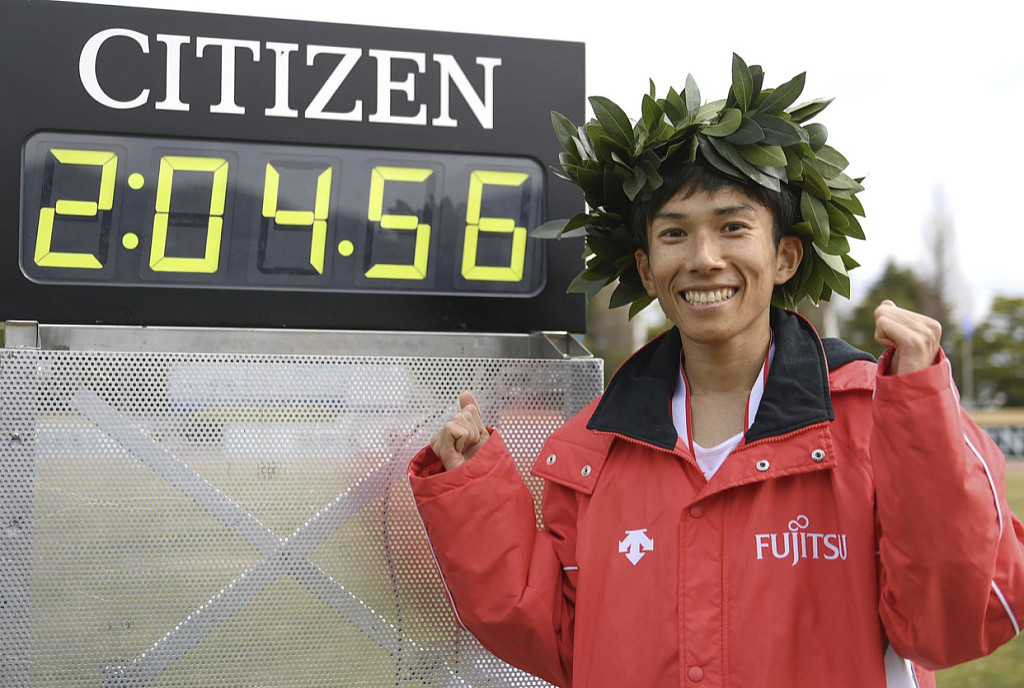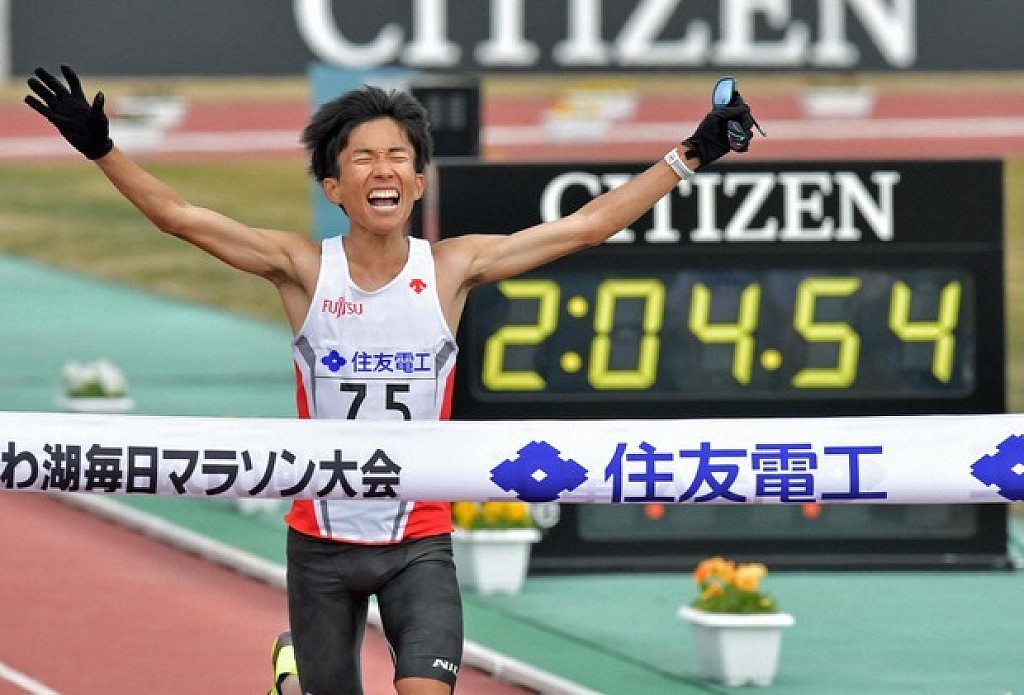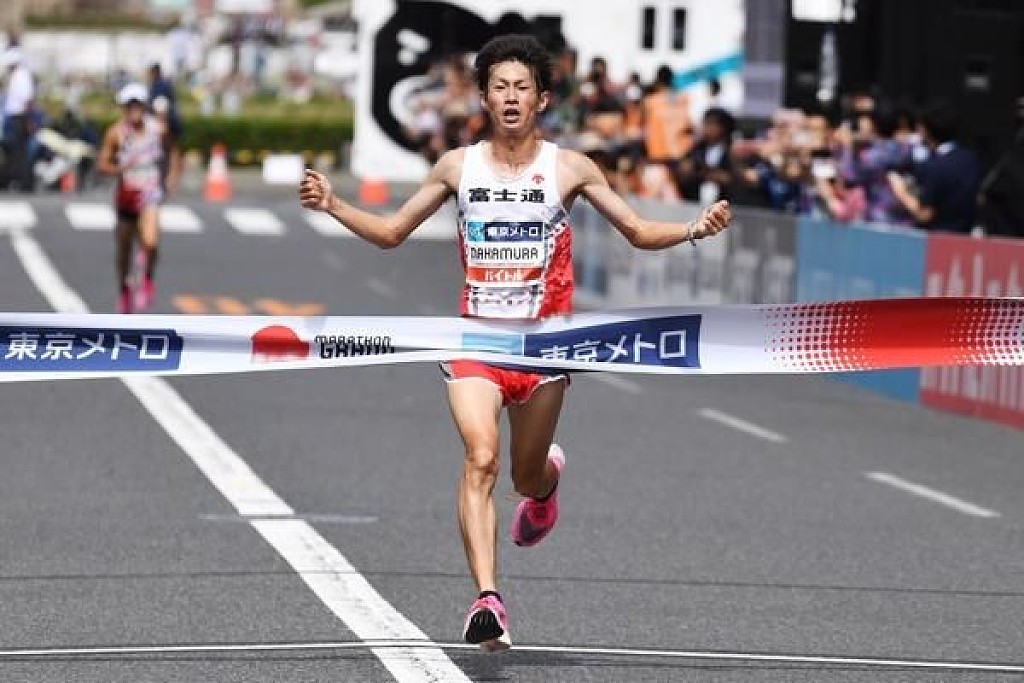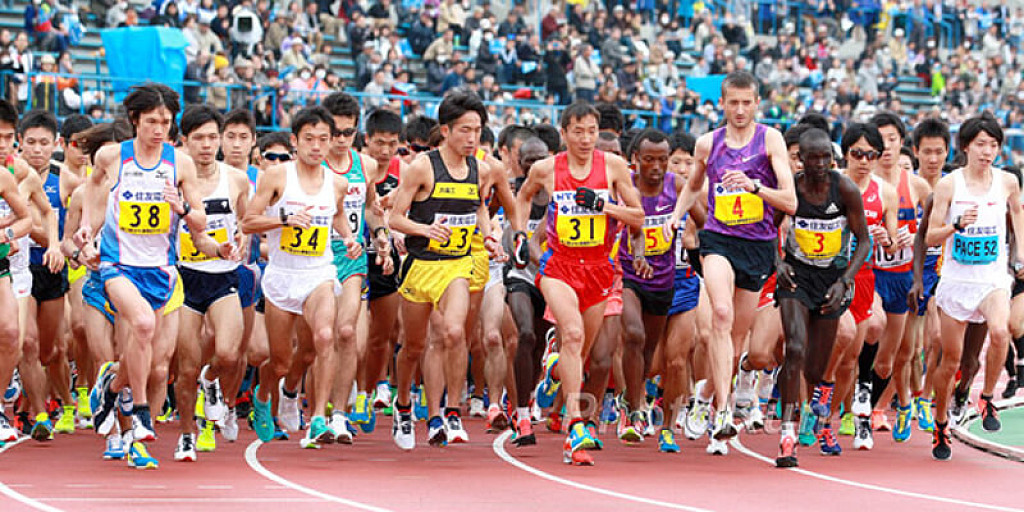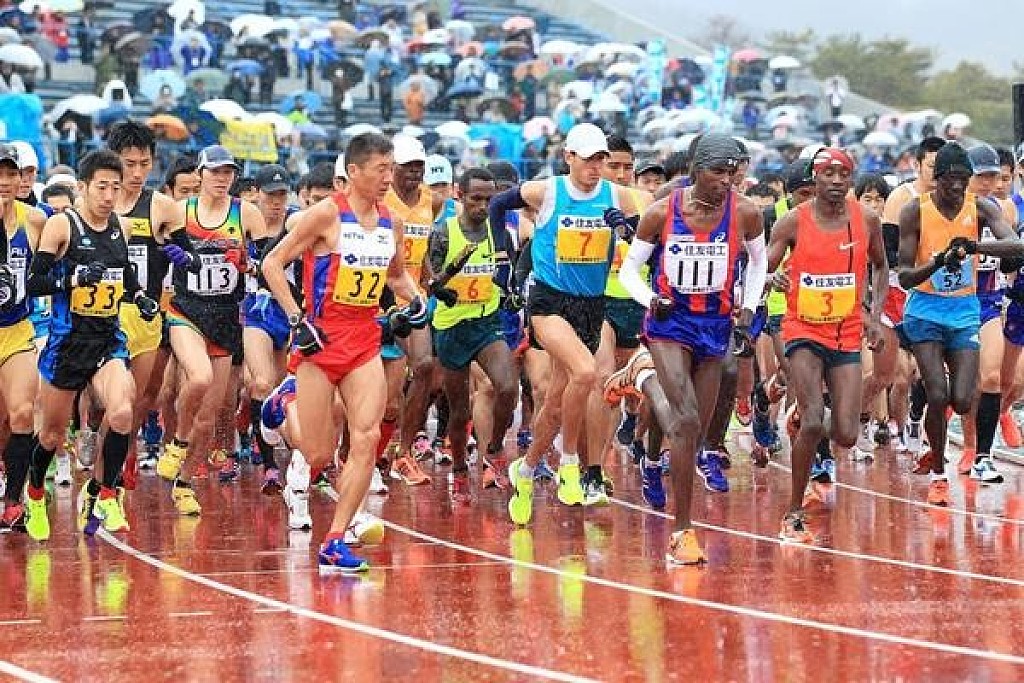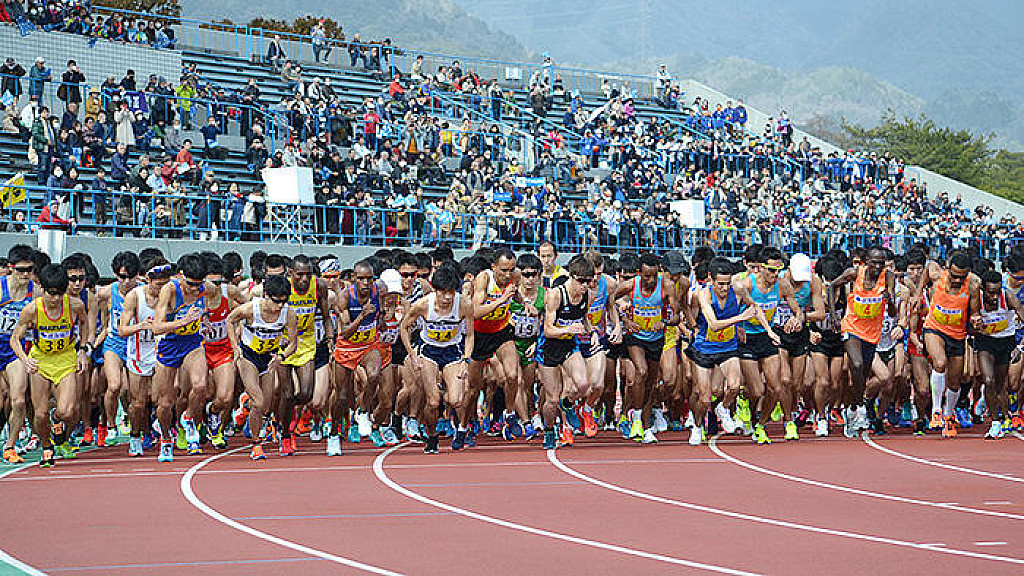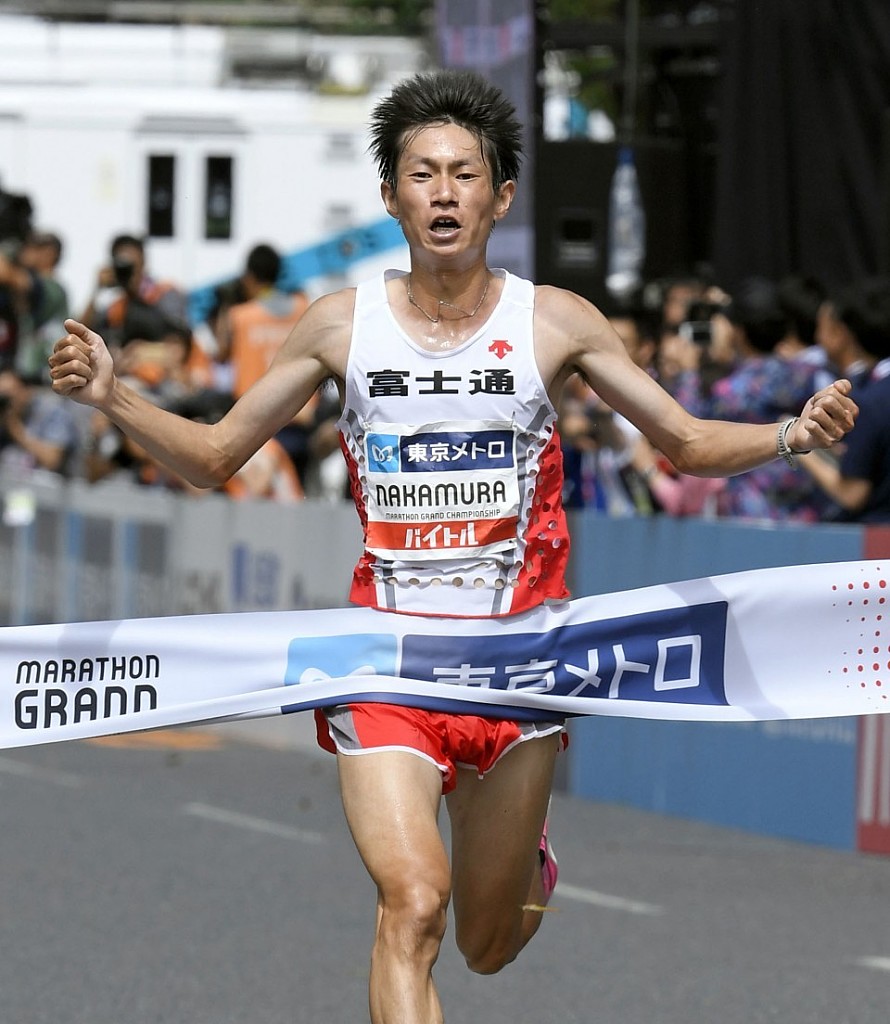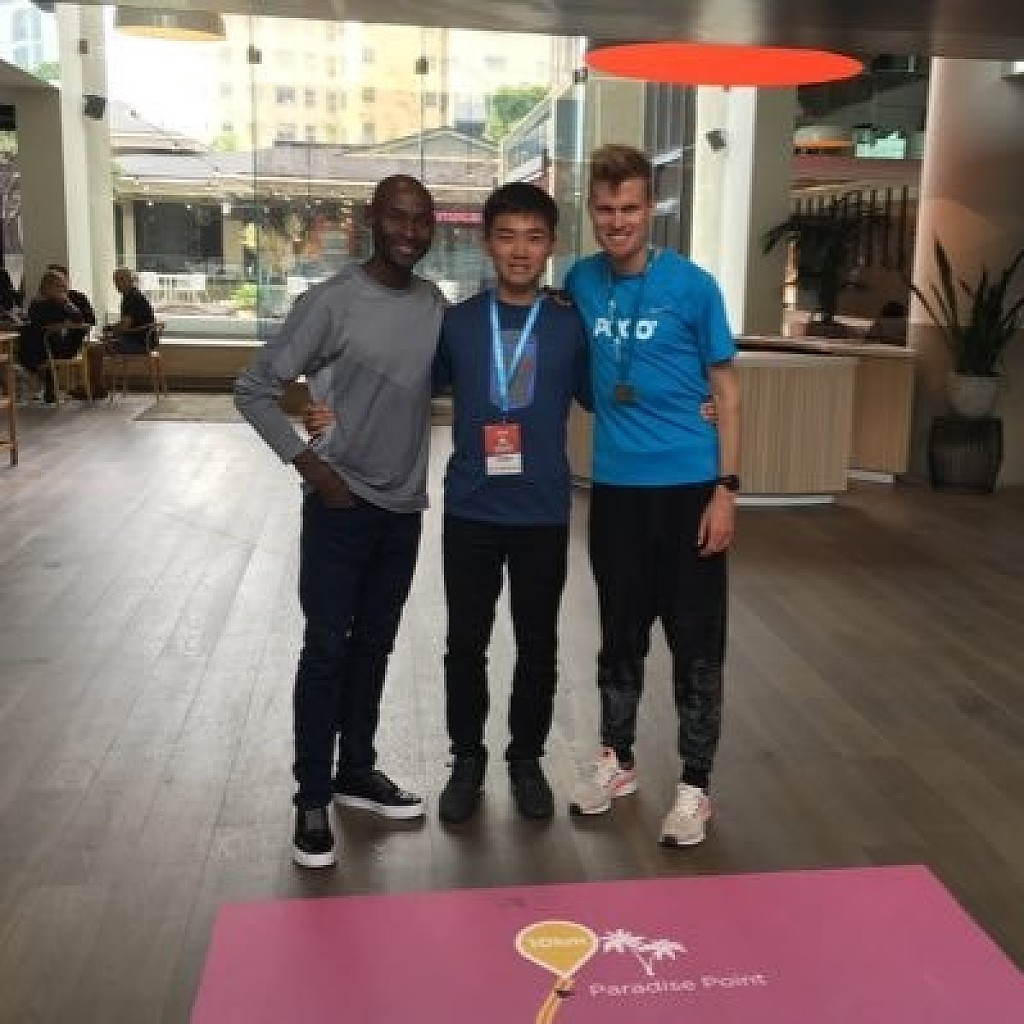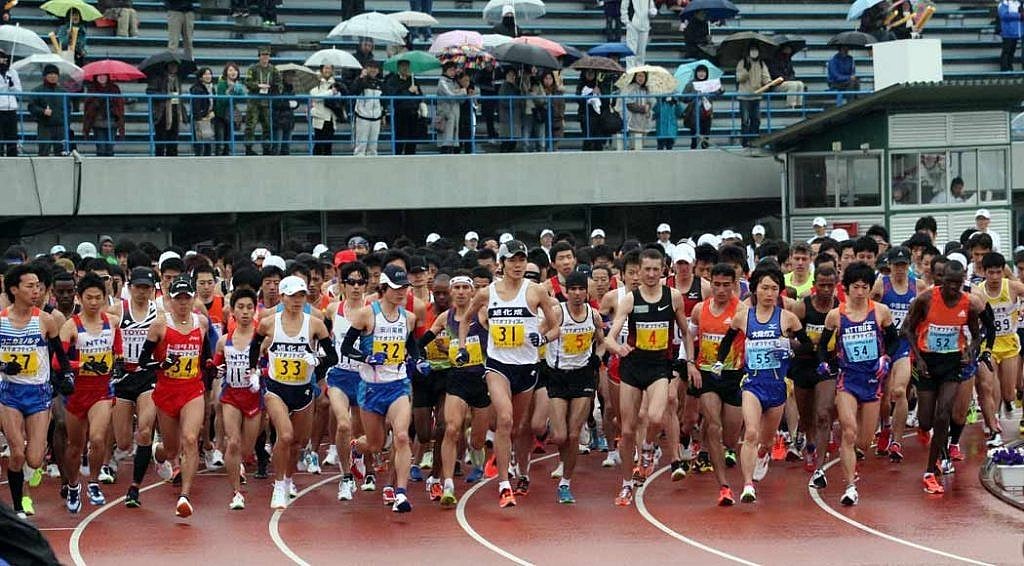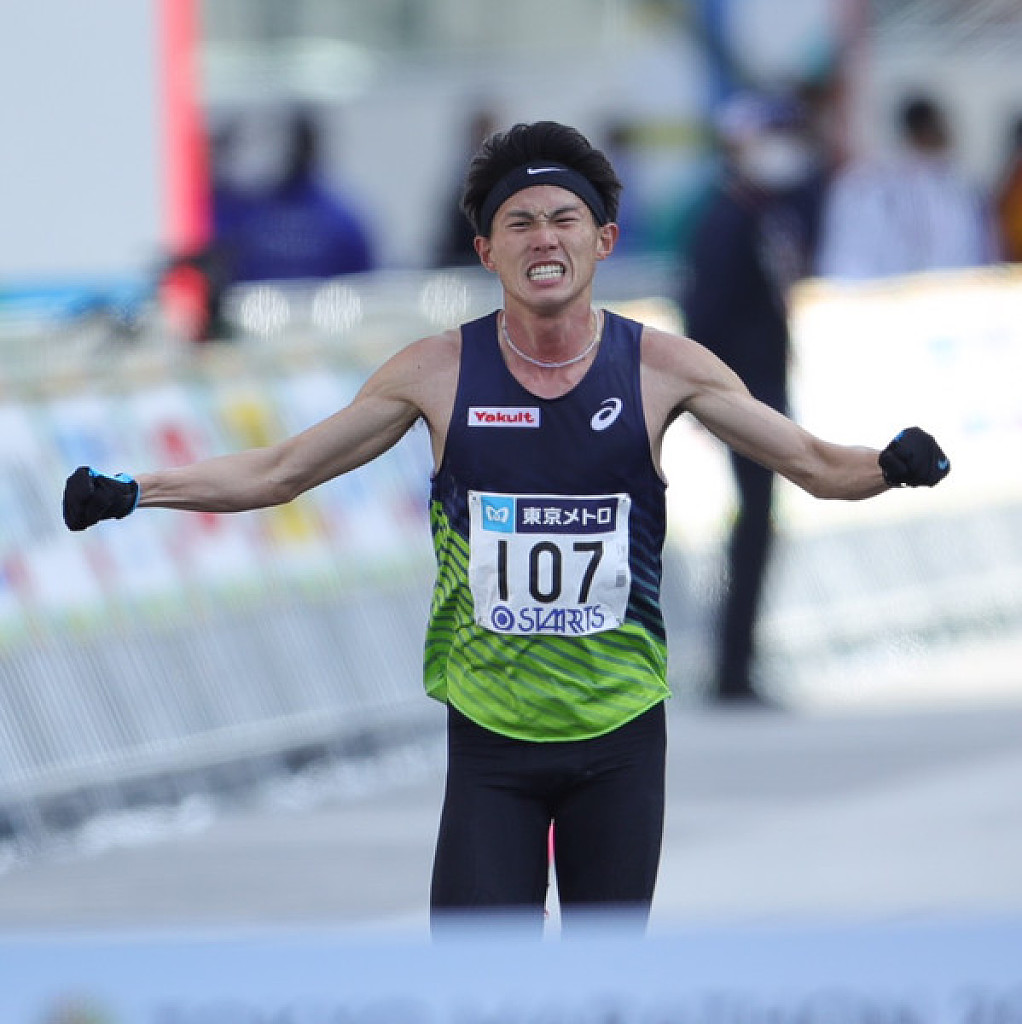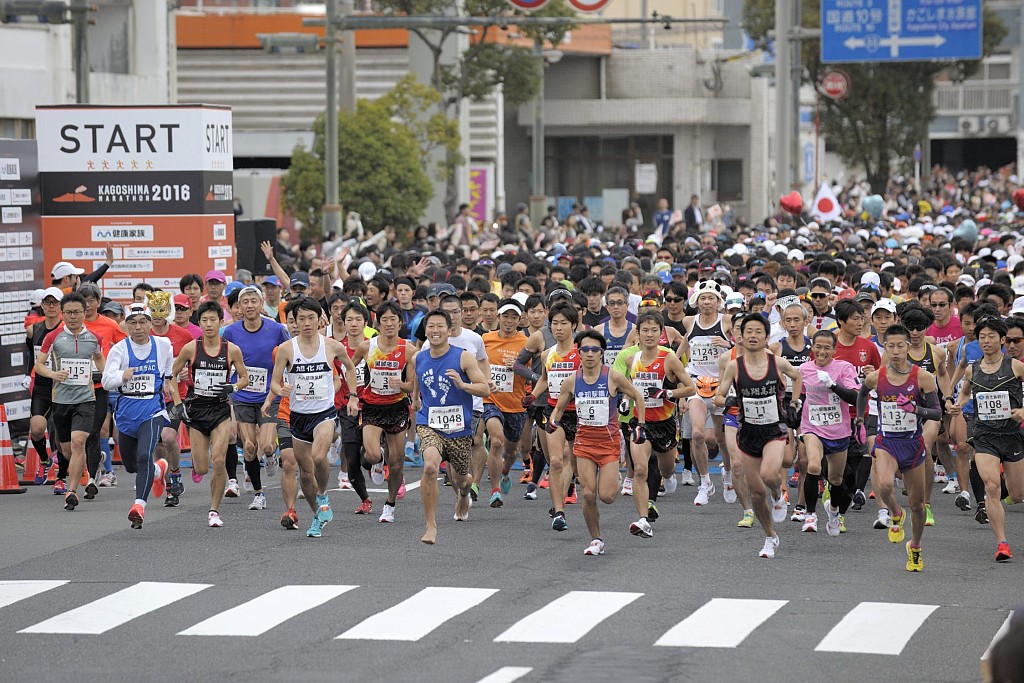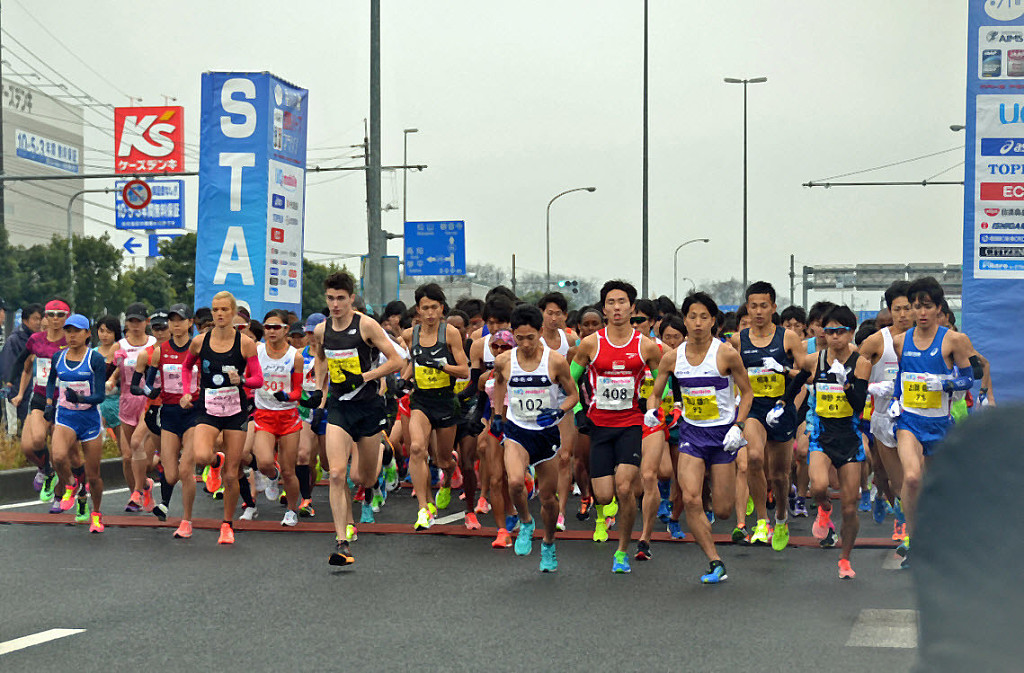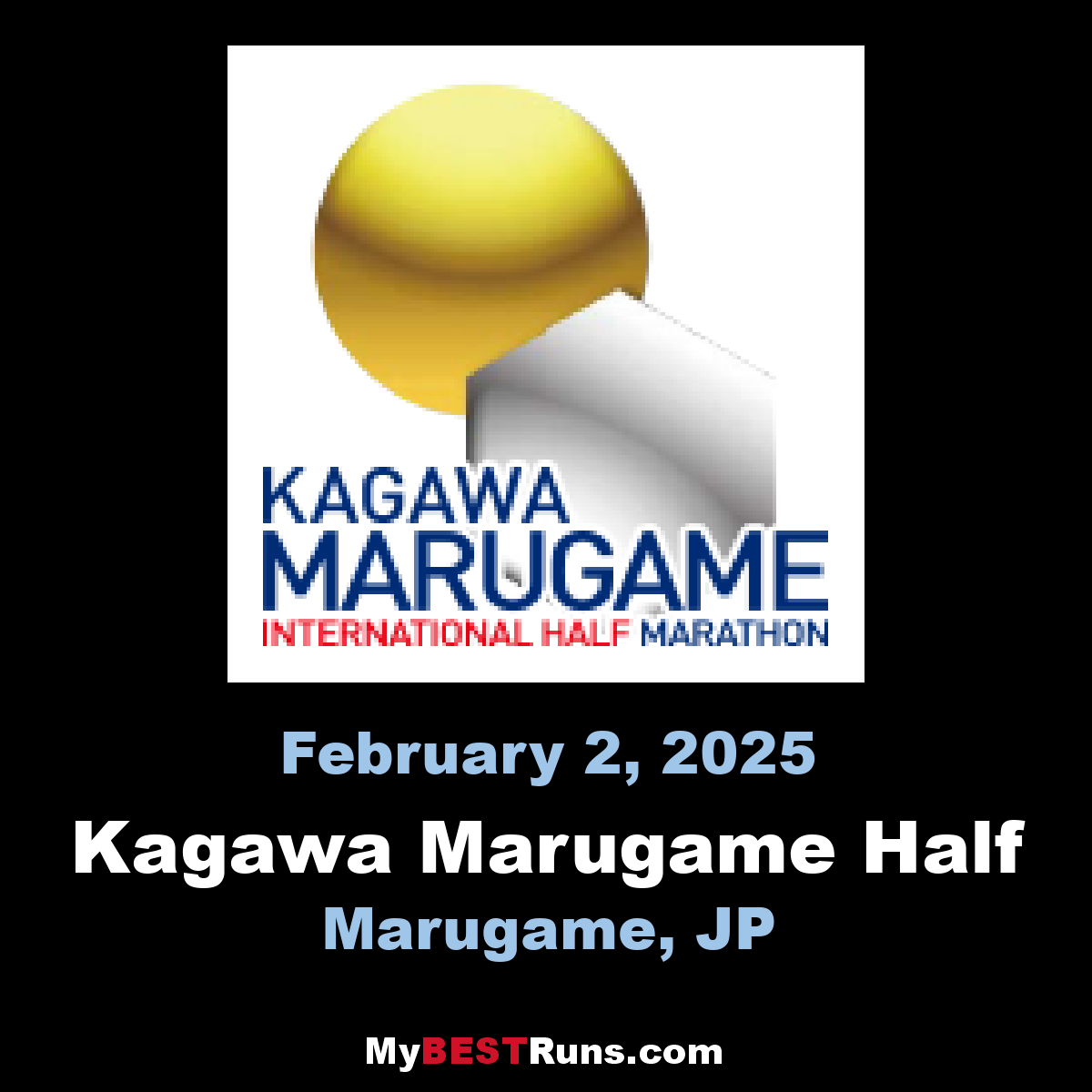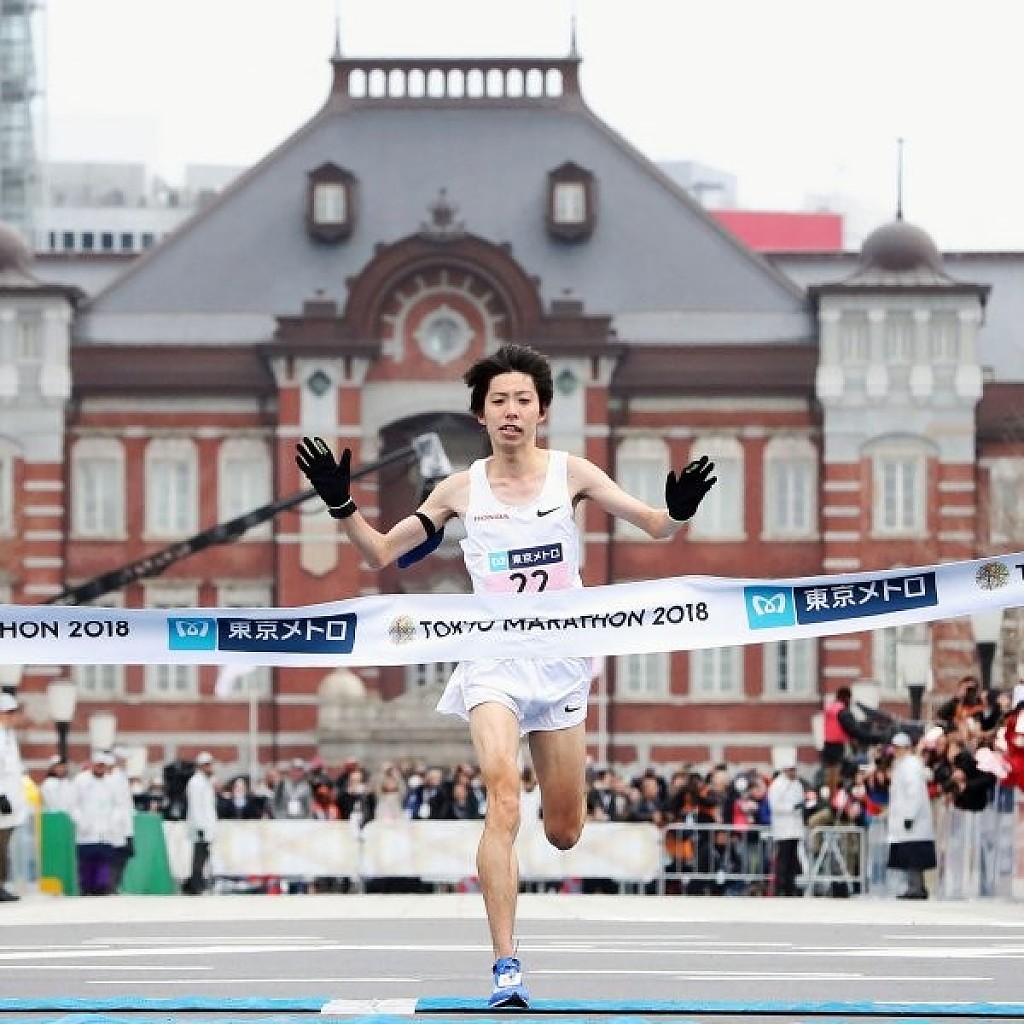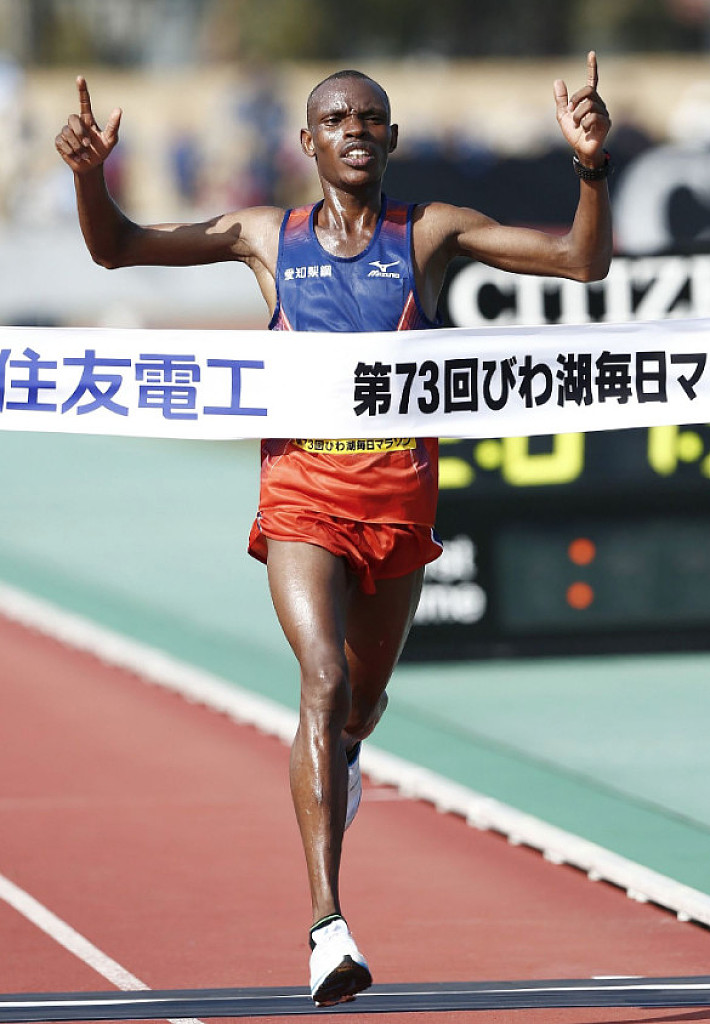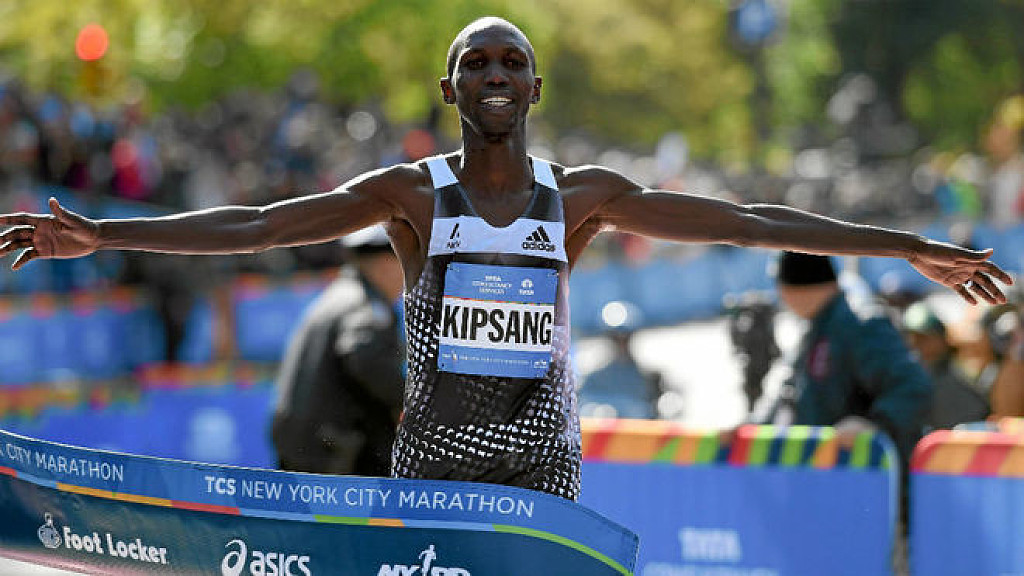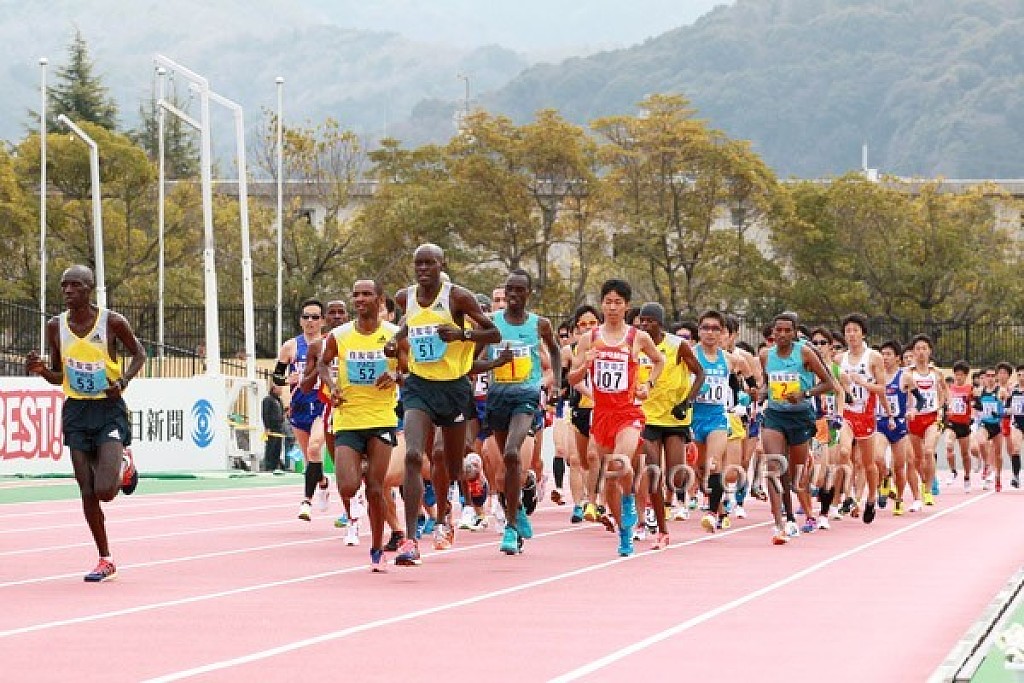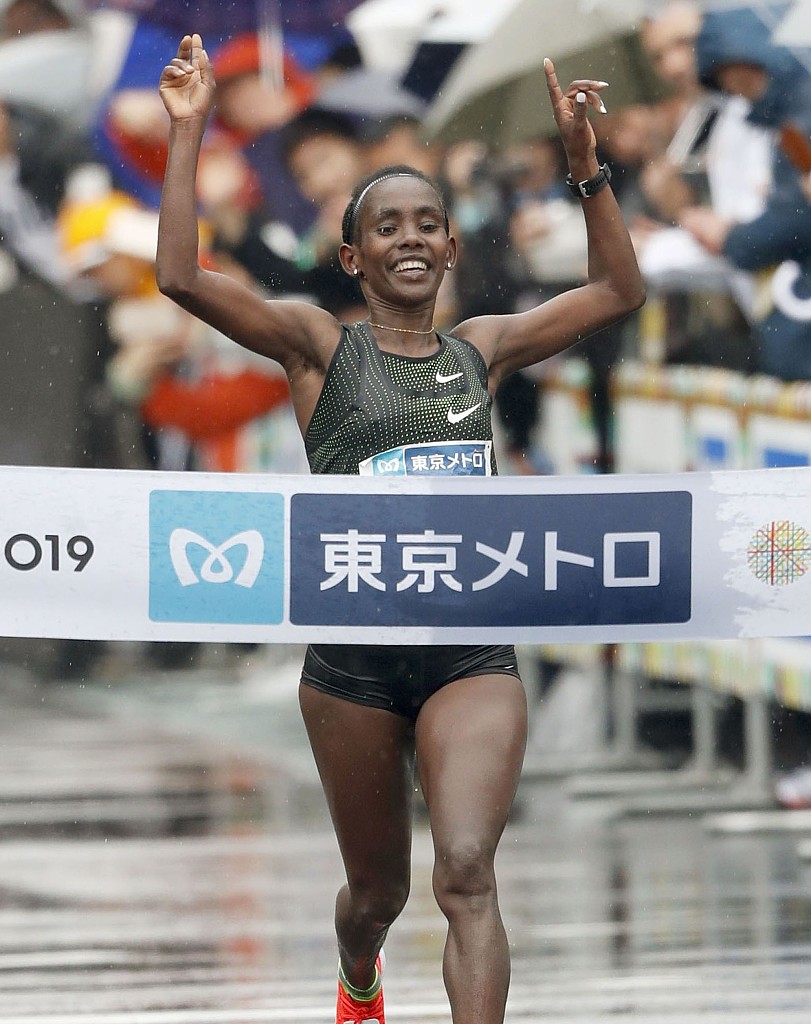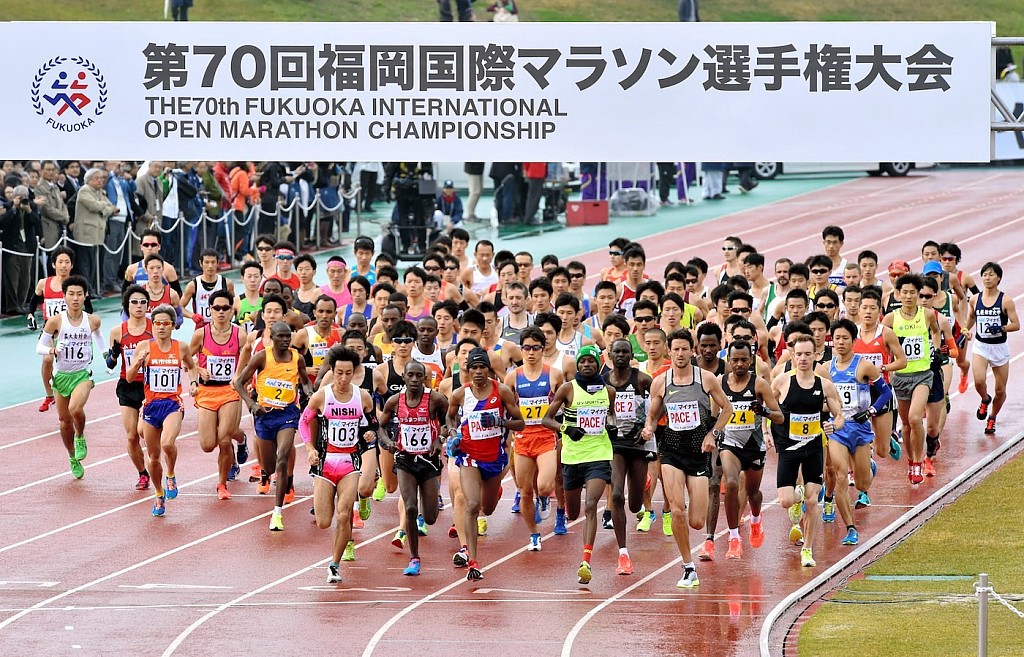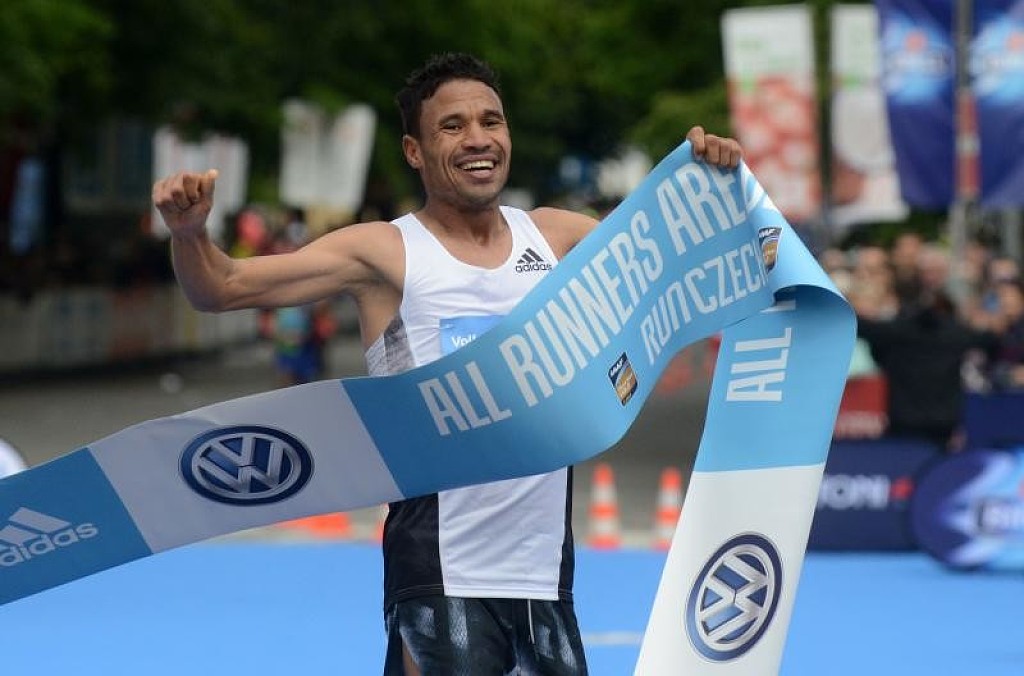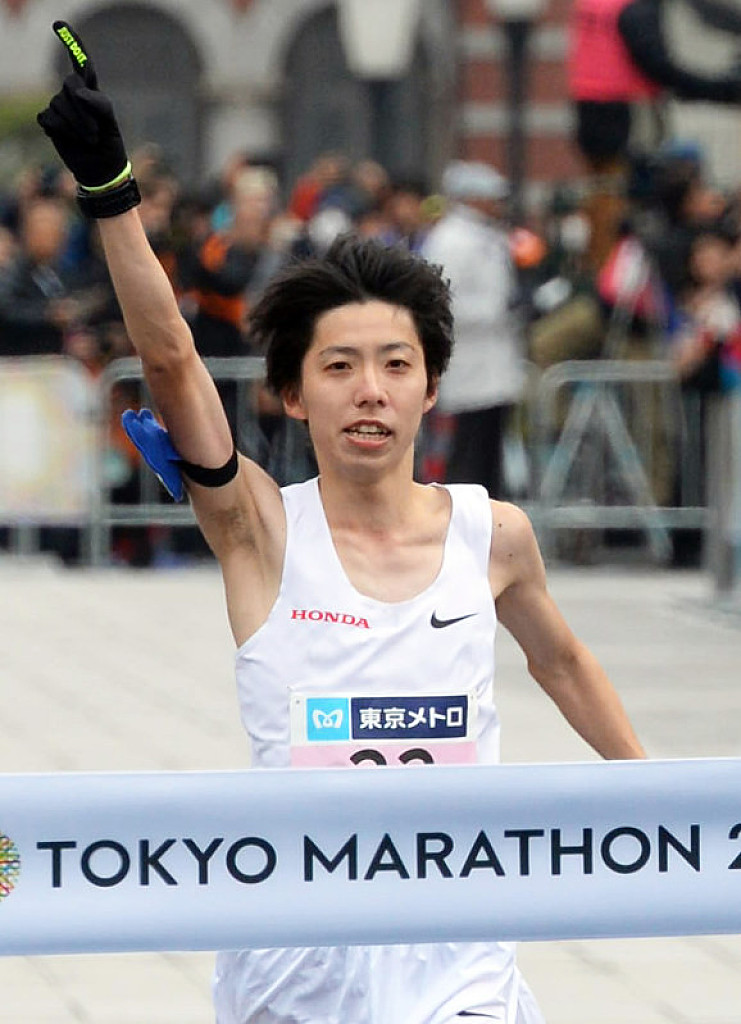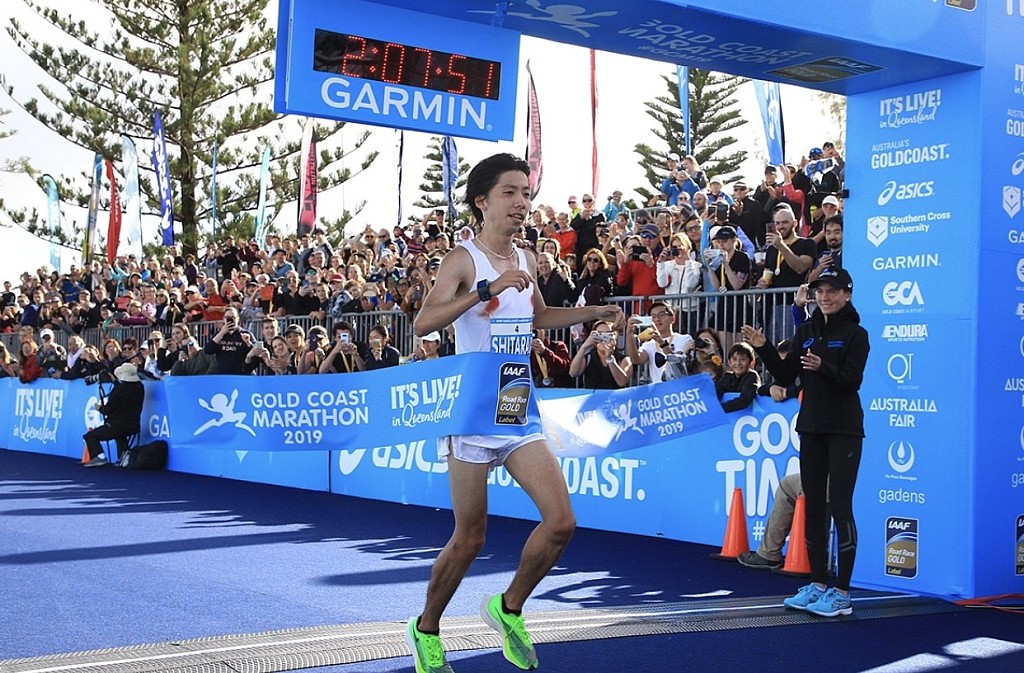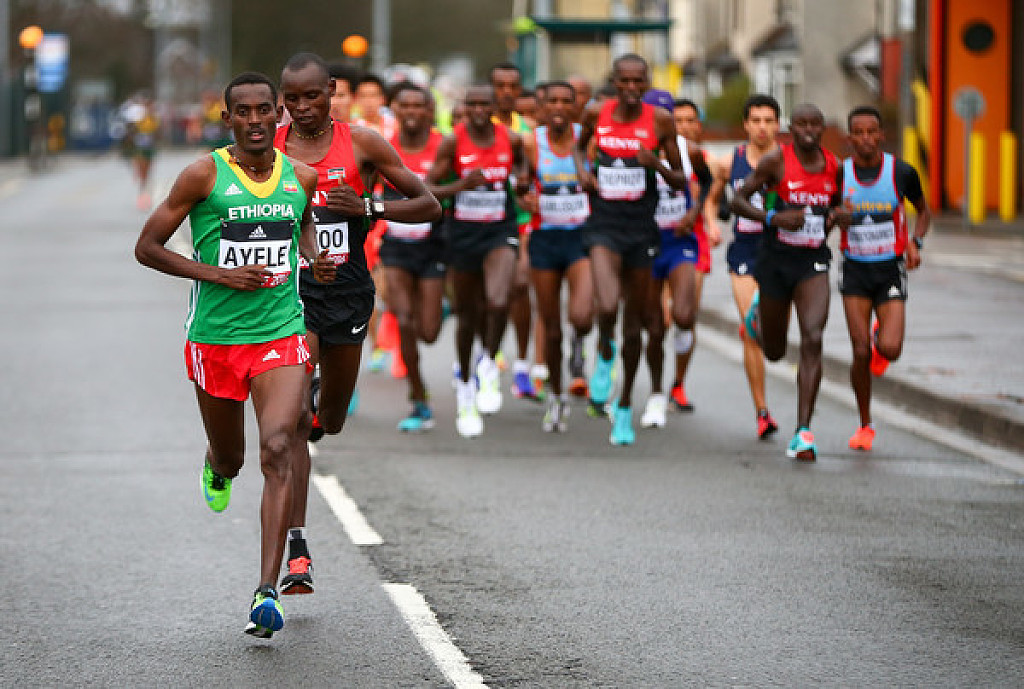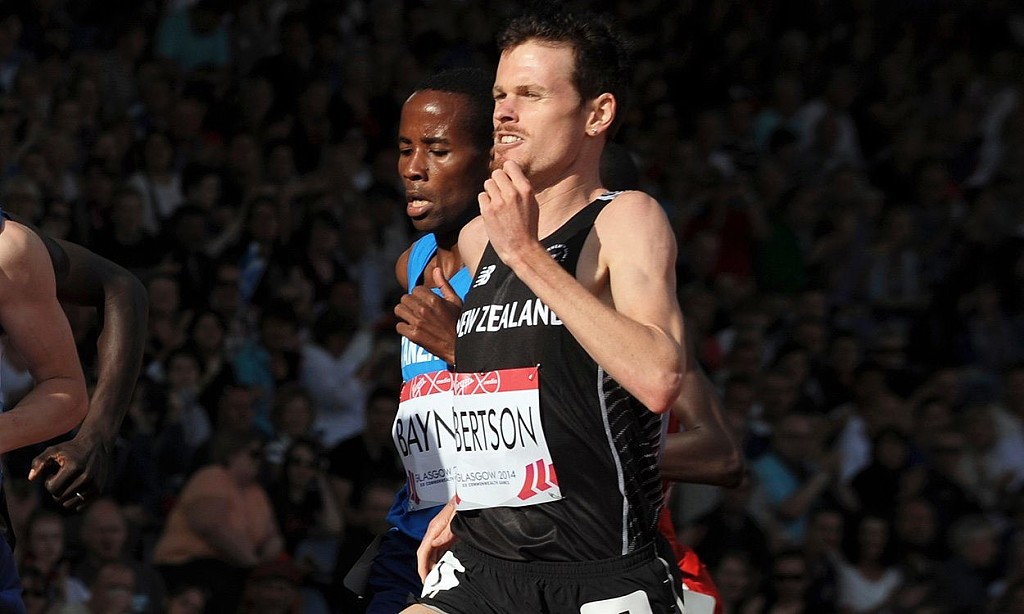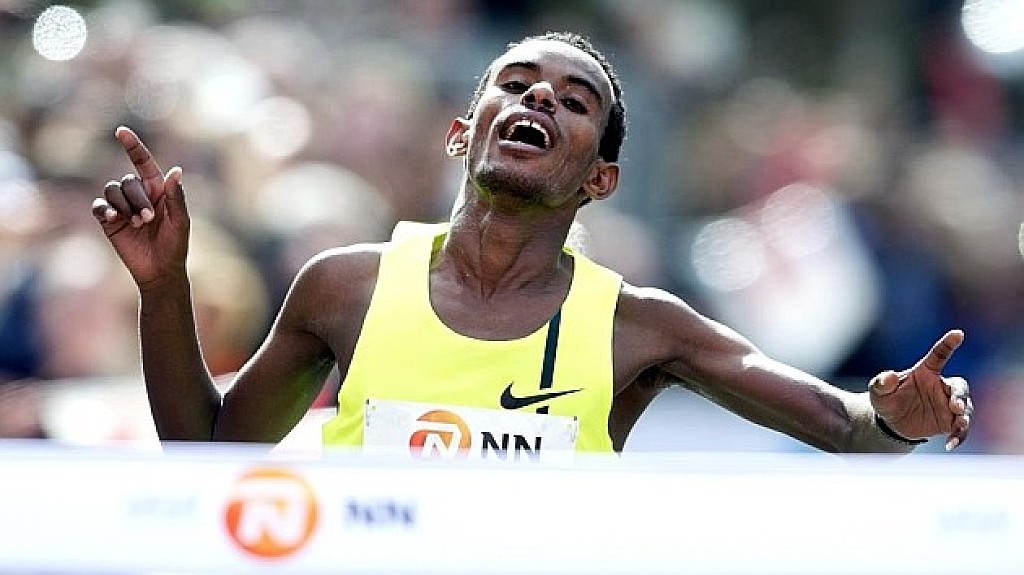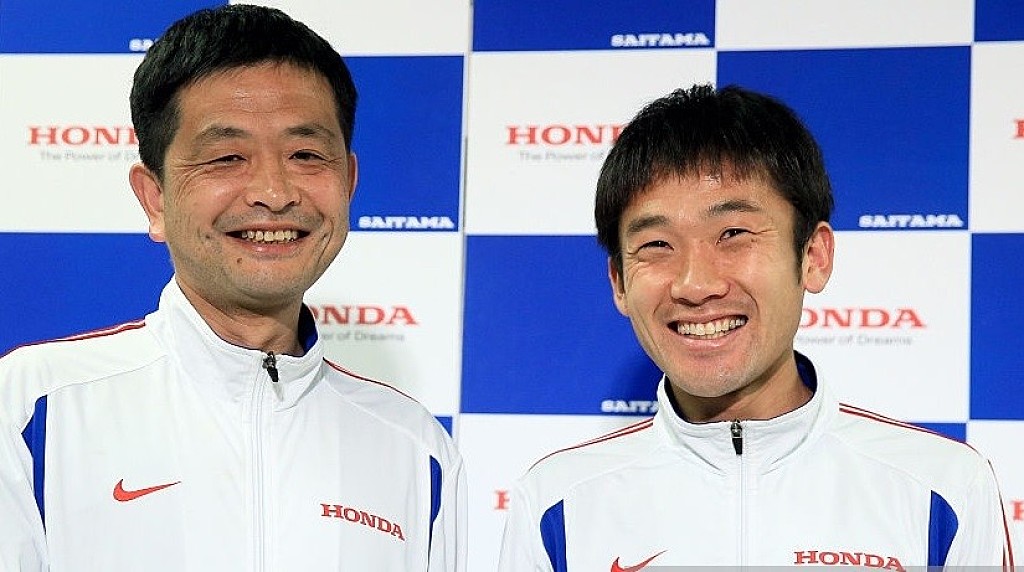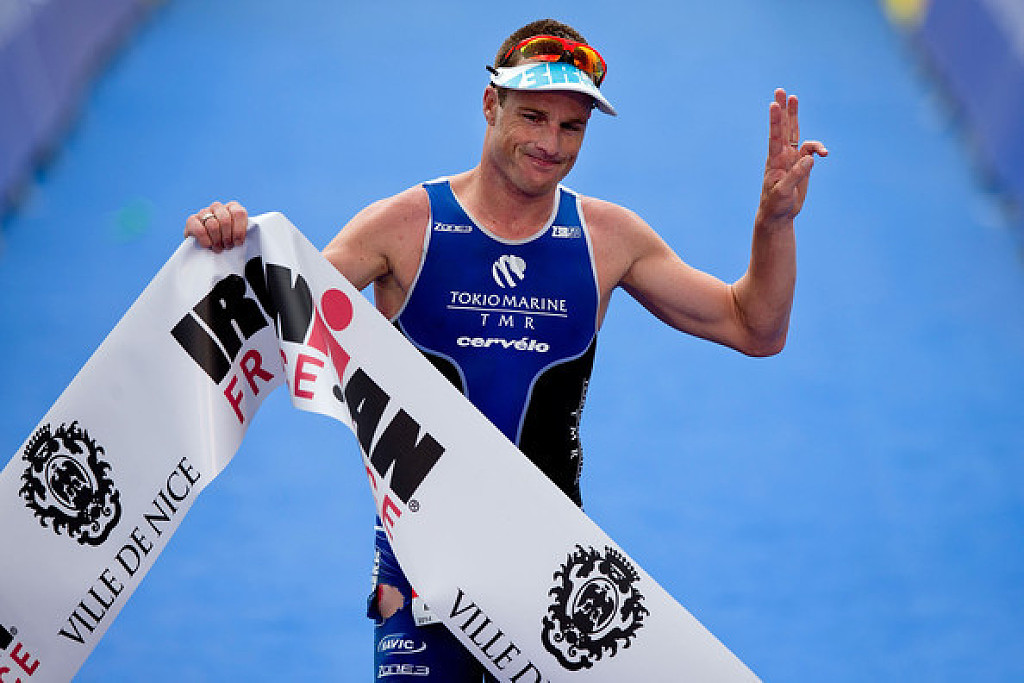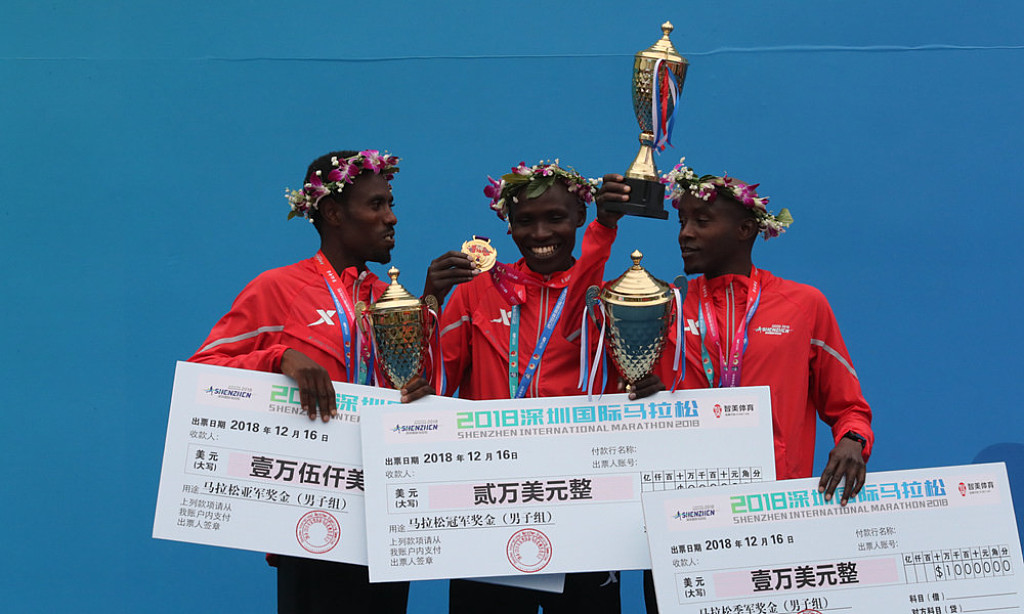Running News Daily
Running News Daily is edited by Bob Anderson. Send your news items to bob@mybestruns.com Advertising opportunities available. Train the Kenyan Way at KATA Kenya and Portugal owned and operated by Bob Anderson. Be sure to catch our movie A Long Run the movie KATA Running Camps and KATA Potato Farms - 31 now open in Kenya! https://kata.ke/
Index to Daily Posts · Sign Up For Updates · Run The World Feed
Articles tagged #Lake Biwa
Today's Running News
Yuki Kawauchi Proves His Endurance with New Marathon Success in 2025
Yuki Kawauchi, known worldwide as the “Citizen Runner,” continues to defy expectations in the marathon world. From his historic 2018 Boston Marathon victory to his latest triumphs in 2025, Kawauchi remains one of the most consistent and determined long-distance runners in the sport. Now a full-time professional, he has overcome setbacks and continues to post impressive results on the global stage.
The 2018 Boston Marathon Victory
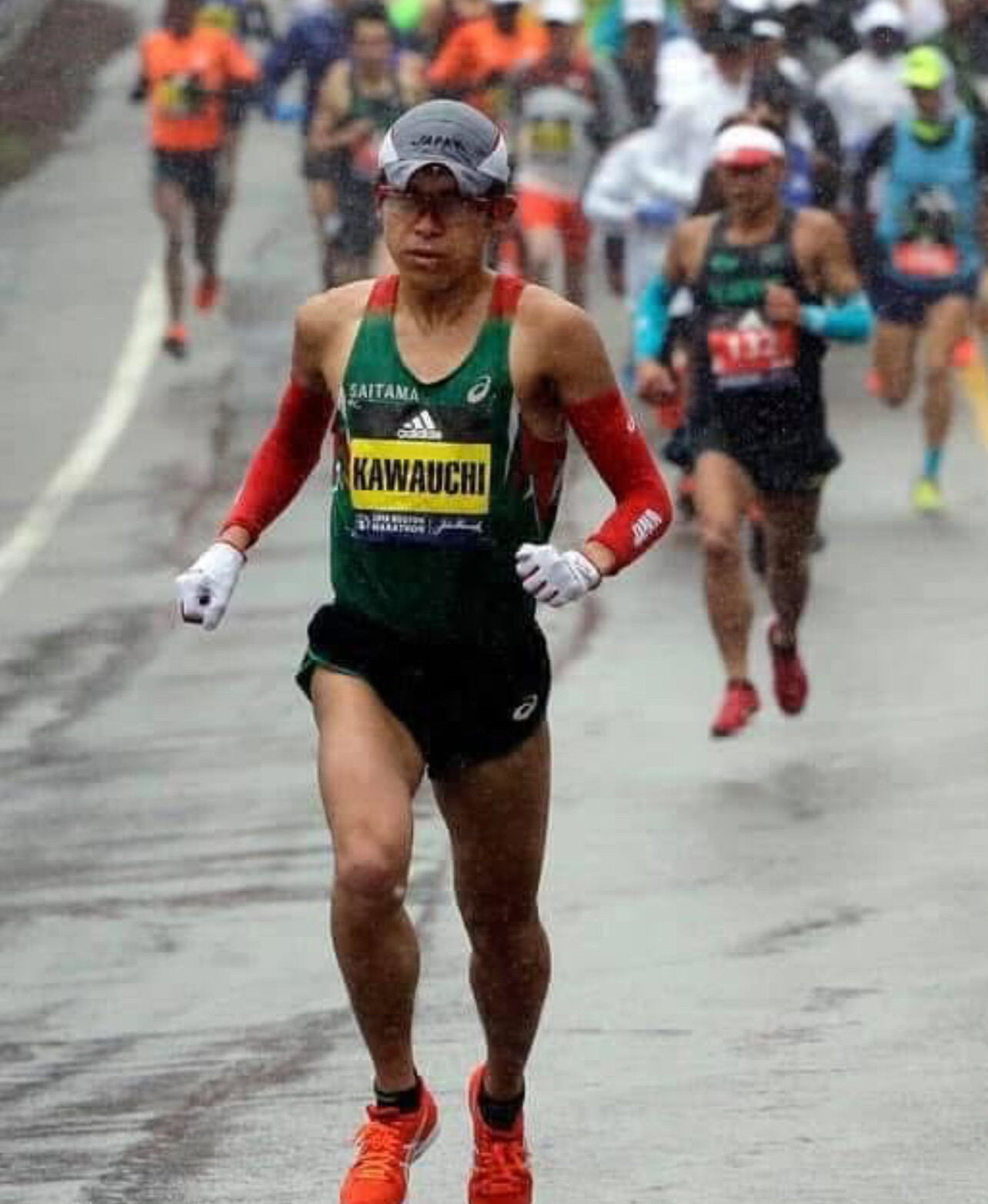
Kawauchi cemented his place in marathon history on April 16, 2018, when he won the Boston Marathon in one of the most challenging weather conditions the race had ever seen. With heavy rain, powerful headwinds, and freezing temperatures around 40°F (4°C), many elite runners struggled—but not Kawauchi. His relentless surges and fearless strategy allowed him to overtake defending champion Geoffrey Kirui in the final miles, crossing the finish line in 2:15:58. He became the first Japanese man to win the race since Toshihiko Seko in 1987.
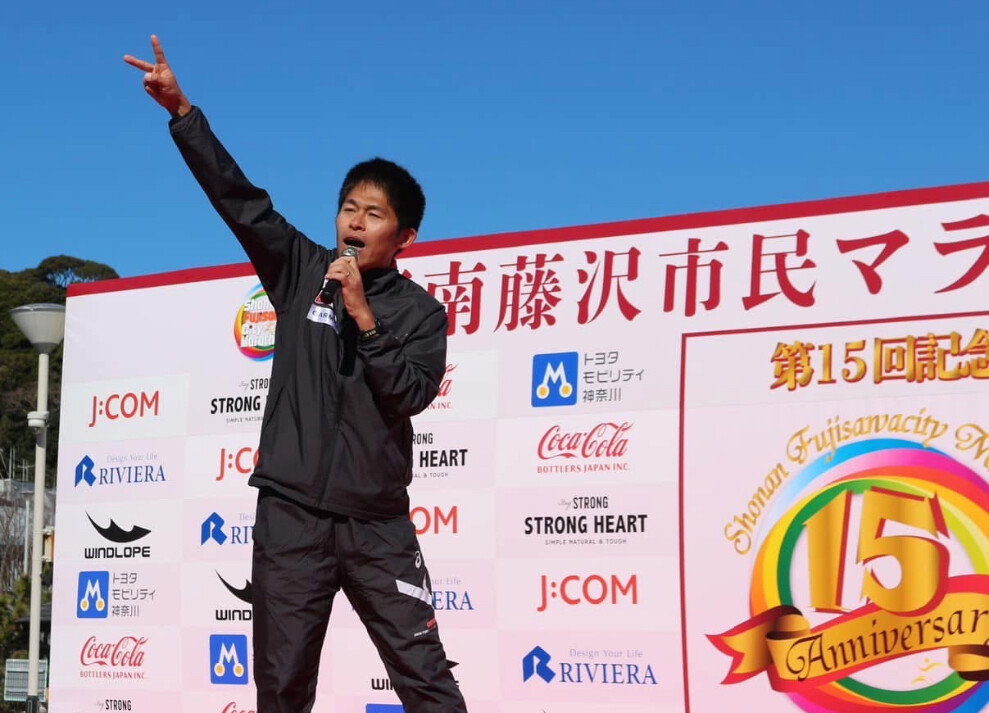
Transition to Professional Running
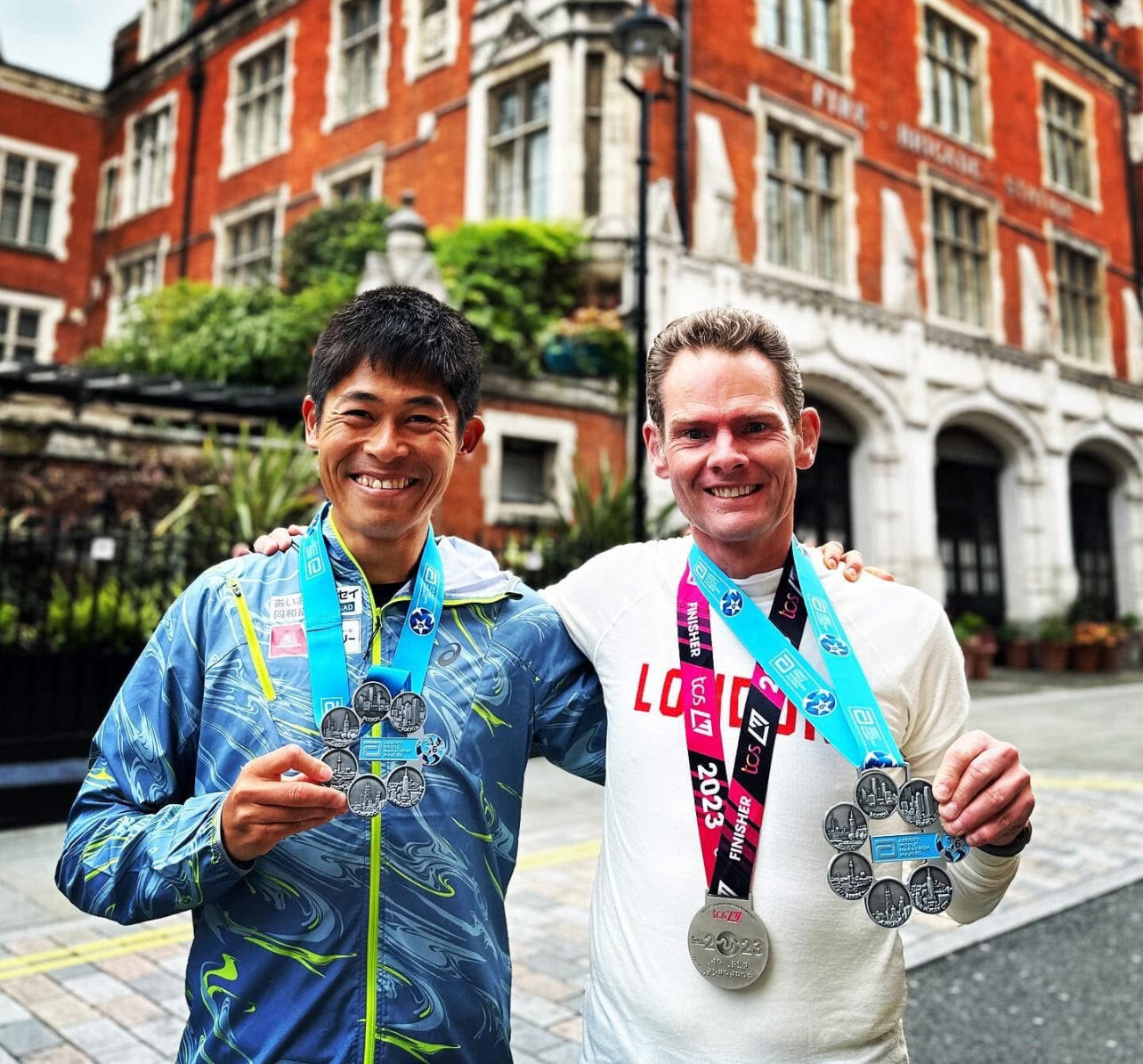
Despite his international success, Kawauchi spent years balancing his training with a full-time job as a government clerk. In 2019, he made the long-awaited decision to turn professional, allowing him to focus entirely on training and racing. The transition led to an improvement in his performances, including a personal best marathon time of 2:07:27 at the 2021 Lake Biwa Marathon.
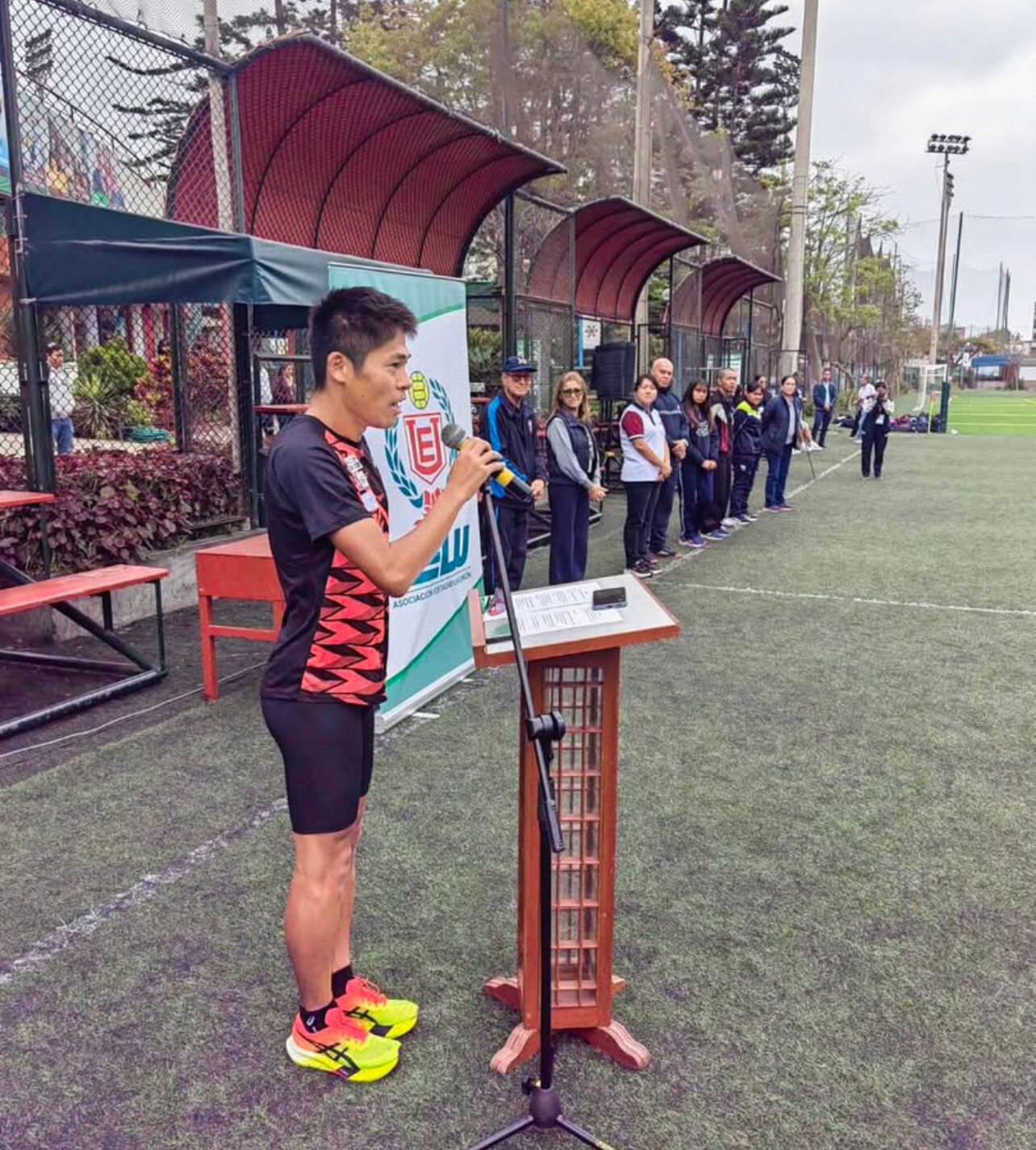
Battling Through 2024

The road to success is never without obstacles. In 2024, Kawauchi endured an inconsistent season, marked by injuries and slower race times. However, he continued to compete with determination, finishing several marathons despite the setbacks:
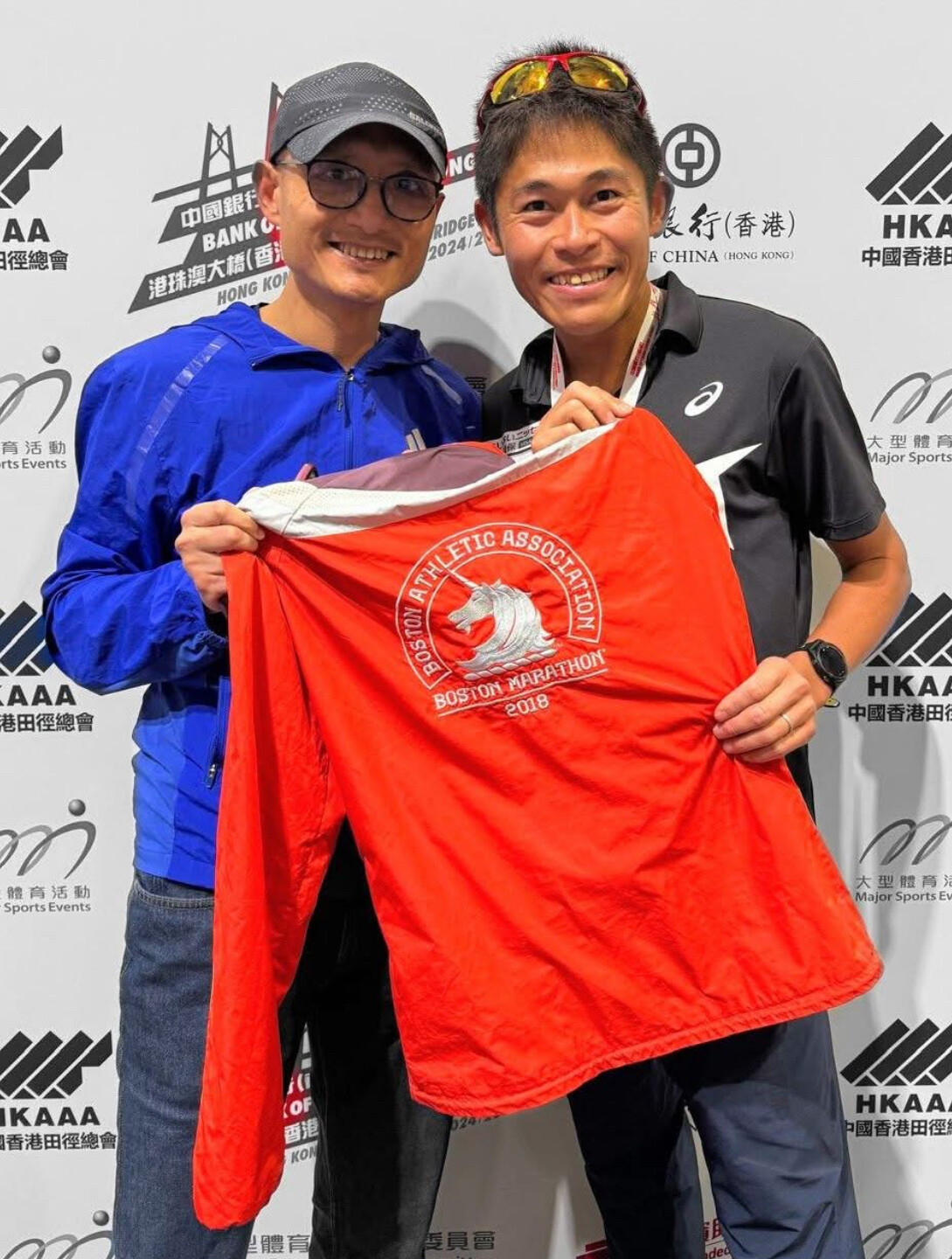
• Ibusuki Nanohana Marathon (January 2024): 1st place, 2:21:13
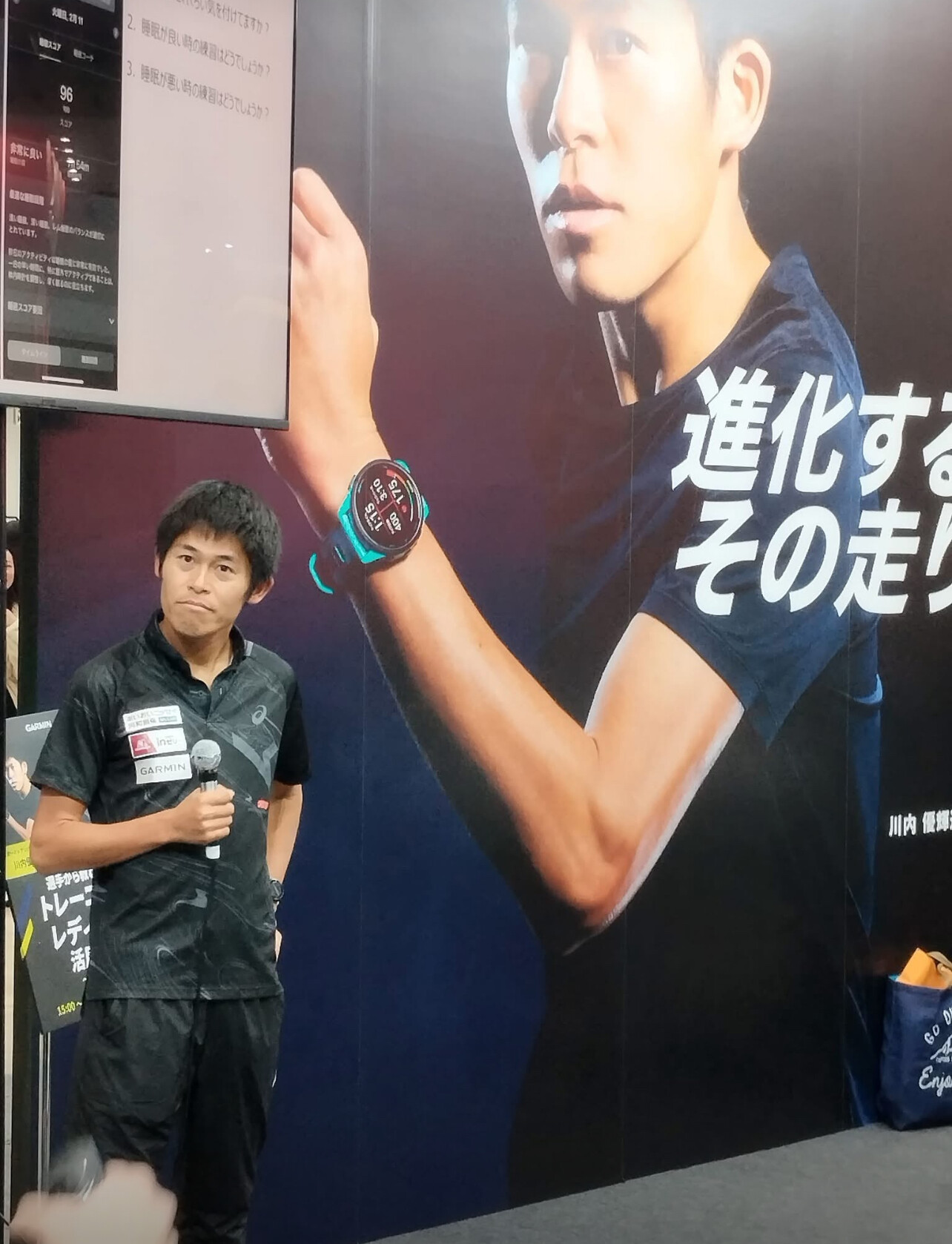
• Paris Marathon (April 2024): 75th place, 2:31:03
• Gold Coast Marathon (July 2024): 156th place, 2:42:26
• Hofu Yomiuri Marathon (December 2024): 38th place, 2:33:01
• Mie Matsusaka Marathon (December 2024): 6th place, 2:22:02
Despite these struggles, Kawauchi never lost sight of his goal—to return stronger in 2025.
A Strong Comeback in 2025
This year, Kawauchi has proven once again why he is one of the most enduring marathoners in the world. His persistence paid off with a strong performance early in 2025:
• Tokyo Marathon (March 2025): 15th place, 2:10:45
His victory at the Tohoku Miyagi Revive Marathon was a defining moment, signaling that Kawauchi is back in top form.
Training and Personal Life
Now a professional, Kawauchi has adapted his training regimen to include higher mileage and more structured workouts. He still follows an old-school approach, frequently training alone and racing more often than most elite marathoners. His high-volume racing strategy continues to set him apart, proving that consistency and experience can be just as valuable as raw speed.
In his personal life, Kawauchi married fellow runner Yuko Mizuguchi in 2019. The couple shares a passion for marathon running, supporting each other’s athletic careers. Their shared dedication to the sport has made them one of Japan’s most inspiring running duos.
A Lasting Legacy
Yuki Kawauchi has defied conventional wisdom in long-distance running, proving that elite performances don’t require sponsorships, high-tech training camps, or corporate teams. His dedication, work ethic, and ability to push through challenges continue to inspire runners of all levels.
With his recent 2025 victory and continued improvement, Kawauchi remains a formidable competitor in the global marathon scene. Whether battling extreme weather or personal setbacks, his resilience and love for the sport continue to make him a legend in the running community.
by Boris Baron
Login to leave a comment
No one has run more sub 2:20 marathons than Yuki.
As of March 8, 2025, Yuki Kawauchi has completed 104 marathons under 2 hours and 20 minutes. This milestone includes his recent performances in 2025:
Tokyo Marathon (March 2025): 15th place with a time of 2:10:45 and Tohoku Miyagi Revive Marathon (April 2025): 1st place, finishing in 2:11:18. - Bob Anderson 3/9 7:31 pm |
Evans Chebet reveals secrets behind his remarkable marathon success
Evans Chebet has disclosed the key principles behind his remarkable marathon success, sharing insights into his disciplined training, perseverance, and the challenges that shaped his journey to global acclaim.
Former Valencia Marathon champion Evans Chebet has become a towering figure in the world of distance running, boasting an illustrious career with 30 marathons under his belt and three World Major Marathon titles to his name.
From humble beginnings in Elgeyo Marakwet County to the global stage, Chebet’s journey to the top is a shining example of determination, dedication and faith.
Reflecting on his achievements, Chebet, who has conquered courses in Boston and New York, says his success comes down to a simple but powerful mantra.
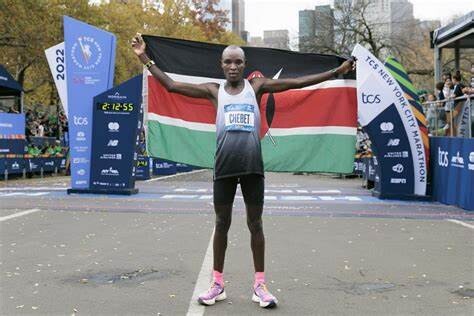
“The young upcoming athletes should exercise patience in their careers and not take shortcuts. My life story is a testament to that. I did not go past primary school, but the number of countries I have visited are numerous,” he said as per Star.
Chebet attributes much of his triumphs to unwavering discipline and a grueling training regimen.
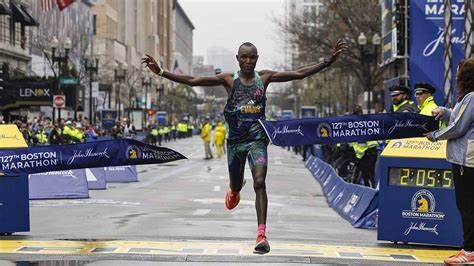
The 35-year-old marathoner has no background in track running, focusing instead on road races from the start to provide for his family.
This unique approach was shaped by financial hardships that forced him to leave school at an early age to support his widowed mother and nine siblings.
“My father died just before I was born, leaving my mother to shoulder the burden of raising 10 children. I had to drop out of school while in Class Four and start burning charcoal to help her,” he recalled.
“Life was really hard, but I knew as a man, I had to do everything to support my family.”
Chebet’s turning point came in 2005 when his uncle, Isaac Koech, introduced him to running and bought him his first pair of training shoes.
Guided by his uncle and inspired by his late father, who had been a runner, Chebet began training with unwavering determination.
His big break came in 2006 when coach Claudio Berardelli invited him to join the Rosa camp in Kaptagat, where he honed his skills for the global stage.
“Coach Berardelli recruited me and began training me. In so many ways, he has moulded me into the man I am today,” Chebet said, acknowledging the critical role his mentor played in shaping his career.
Over the years, Chebet’s path to glory has been marked by strategic planning and meticulous preparation.
For instance, leading up to his impressive performance at the New York Marathon, he focused intensively on hill work.
“I had trained adequately before the New York race. My main area of focus was hill work and long runs. I used to do 20km to 30km of hill work every day as part of my training,” he revealed.
Despite his rigorous training and consistent results, Chebet has faced setbacks, including being overlooked for Kenya’s Olympic team.
However, he remains optimistic, using each challenge as motivation to push harder.
“It was heartbreaking not to have been included in the team for the Olympics. I know if I had been there, I would have no doubt come back home with gold,” he said.
Chebet’s career highlights include victories at the 2019 Buenos Aires Marathon, the 2020 Lake Biwa and Valencia Marathons, and back-to-back wins at the Boston Marathon in 2022 and 2023.
His win in New York in 2022 further cemented his status as a world-class athlete.
“My target next season is to win both New York and Boston. It’s something I know I am capable of, and I will work towards it,” he said, expressing his desire to continue building his legacy in 2025.
Balancing his career and family life, Chebet draws inspiration from his five children and his wife, Brillian Jepkorir, who is also an athlete.
“I hope my children will take up running in the future,” he said.
To aspiring runners, Chebet offers invaluable advice rooted in his life experience.
“Be prayerful and learn to invest wisely to secure your futures. More importantly, exercise patience and avoid shortcuts. My journey proves that success is possible even when starting from nothing."
by Festus Chuma
Login to leave a comment
Chebet to test New York reediness at Sunday's Great North Run
Two-time Boston Marathon champion Evans Chebet will gauge his readiness for November’s New York Marathon at Sunday (September 8) when he lines up at the Great North Run, England.
The Great North Run is the largest half marathon in the world, and it is staged in North East England.
Chebet revealed he is looking to test his body as he aims for positive results ahead of the New York Marathon.
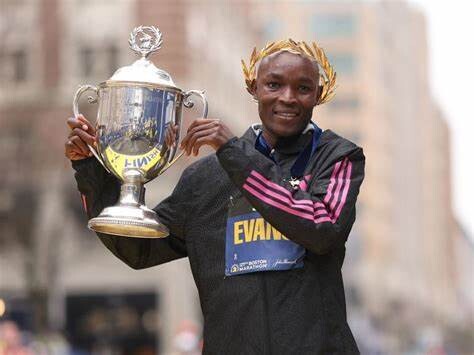
“I want to test my body in England and see how it responds. This race will be part of my preparations for the New York Marathon. I am confident of positive results in both races,” Chebet revealed.
Chebet sustained a tendon rapture during the Boston Marathon in April, dashing his hopes of a historic hat-trick.
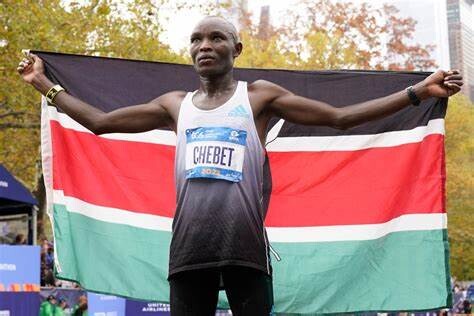
Despite the injury, he managed to secure a third-place finish with a time of 2:07:22, trailing Ethiopia’s Sisay Lemma (2:06:17) and Mohamed Esa (2:06:58).
Before that, he had picked up last year’s title with a time of 2:05:54, beating Tanzania’s Gabriel Geay (2:06:04) and Olympic bronze medalist Benson Kipruto (2:06:06).
He also led an all-Kenyan podium sweep during the 2022 edition—cutting the tape in 2:06:51 to lead Lawrence Cherono (2:07:21) and Kipruto (2:07:27) to the podium.
Now fully fit, the 35-year-old is determined to reclaim his winning form.
“My body feels great. I’m ready for the Great North Run and I am looking forward to positive results. I am also well prepared to win a second title in New York,” Chebet noted.
Chebet won the 2022 New York Marathon in 2:08:41 ahead of Ethiopia’s Shura Kitata (2:08:54) and the Netherlands' Abdi Nageeye (2:10:31).
Chebet’s resume also includes victories from the 2020 Valencia Marathon (2:03:00), the 2019 Buenos Aires Marathon (2:05:00) and the 2020 Lake Biwa Mainichi Marathon (2:07:29).
He placed third at the 2016 Berlin Marathon (2:05:31) and second at the 2016 Seoul Marathon (2:05:33) and 2019 Generali Milano Marathon (2:07:22).
Chebet is set to renew his rivalry with Lemma as he looks to assert revenge on the Ethiopian after he beat him to the Boston title.
The 2021 Valencia Half Marathon champion Abel Kipchumba will join Chebet on the start line as they look to secure a Kenyan 1-2 finish.
Other key competitors include Marc Scott, who will be representing the host nation. Scott clinched the 2021 title in 1:01:22, beating Edward Cheserek (1:01:31) and USA’s Galen Rupp (1:01:51).
In the women’s race, Rio 2016 Olympic 5,000m champion Vivian Cheruiyot leads a strong Kenyan contingent, including 2022 Commonwealth 10,000m bronze medalist Sheila Chepkirui and 2014 World Half Marathon silver medalist Mary Ngugi.
Their competition will come from 2015 World 5,000m silver medalist Senbere Teferi of Ethiopia and Britain’s record holder in the 10km Road race Eilish McColgan.
by Teddy Mulei
Login to leave a comment
Great North Run
Great North Run founder Brendan Foster believes Britain is ready to welcome the world with open arms after the launch of the event's most ambitious plan to date. The Great World Run campaign seeks to recruit one runner from every country in the United Nations – 193 in total – to take part in the iconic half marathon in...
more...A Record-Breaking Day at the Osaka Marathon
With five 180˚ turnaround points and serious hills in its last 12 km the Osaka Marathon course isn't the fastest around, but that didn't hold back record-breaking runs in both the women's and men's races. Great conditions, 5˚~7˚C, light clouds and very light winds definitely helped.
The women's race went steadily on 2:22 pace, an early group of six shaking down to just four, Japan's Momoko Watanabe (Tenmaya), favorite Vivian Kiplagat (Kenya) and Ethiopian duo Helen Bekele Tola and Beyenu Degefa, by 30 km with Australian a few seconds behind. Bekele made the winning break, pulling away to win in a course record 2:22:16. Watanabe, who came into the race with a best of only 2:30:42 PB, led Degefa in the home straight but lost out in the last kick. Degefa was 2nd in 2:23:07 and Watanabe 2:23:08 for 3rd, clearing the 2:24:00 auto-qualifying standard for MGC Race Olympic marathon trials qualification.
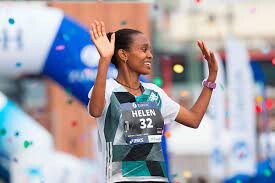
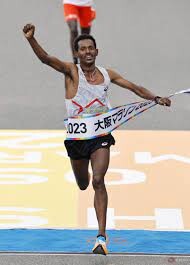
Only getting faster with age, the 43-year-old Weightman ran Kiplagat down for 4th in 2:23:15, beating her PB from last fall's Berlin Marathon by 45 seconds. Weightman is also entered to run next weekend's Tokyo Marathon. Misaki Nishida (Edion) and Yuri Karasawa (Kyudenko) also caught Kiplagat, Nishida taking 5th in a PB 2:25:51 to qualify for the Olympic trials and Karasawa running 2:27:27 in her debut but missing qualification by 27 seconds. The pre-race favorite, Kiplagat fell to 7th in 2:28:44.
The shinkansen effect was in full effect in the equally well-paced men's race, a quartet led by Tomoki Ota (Toyota) running with almost zero variation through 25 km in 1:15:00 and pulling along a pack of almost 50. After Ota stopped at 25 km the pacing over the next 5 km was a bit shakier, but after hitting 30 km in 1:30:13 and the remaining pacers dropping out Eritrean Merhawi Kesete initiated a series of attacks that saw six different athletes take the lead over the hilliest section of the course. Among them was former Toyo University Hakone Ekiden star Kazuya Nishiyama (Toyota), who made moves to the front twice while on 2:06 pace in his debut.
With 5 km to go Ugandan Victor Kiplangat threw off his hat and surged, pulling South African Stephen Mokoka, Tanzanian Alphonce Felix Simbu and #1-ranked Ethiopian Hailemaryam Kiros with him. Behind them a chase trio of Nishiyama and fellow first-timers Charles Kamau (NTN) and Yohei Ikeda(Kao) congealed, all three of them sub-61 half marathoners and on the cusp of hanging on to a 2:06 debut. Kiplangat, 2:05:09 in Hamburg last fall, did all the work up front, shaking off Mokoka and Simbu but unable to get rid of 2:04:41 man Kiros.
With just 200 m to go Kiros surged, taking the win in a 2:06:01 CR with Kiplangat just 2 seconds back. Simbu was 3rd in 2:06:19, but behind him Kamau closed hard to run down Mokoka for 4th, 2:06:37 in his debut to the veteran Mokoka's 2:06:42. Mokoka had a near-miss on the South African NR, finishing just 9 seconds off Gert Thys' 2:06:33 at the 1999 Tokyo International Marathon.
Both only 24 years old, Nishiyama and the Toshinari Takaoka-coached Ikeda were next in 2:06:45 and 2:06:53, each of them well under the old debut marathon NR of 2:07:31 set by last year's Osaka winner Gaku Hoshi. With Nishiyama having dominated Hakone's First Stage at Toyo and Ikeda having been the top Japanese finisher on its most competitive stage his fourth year the relationship between Hakone success and later marathon performance is clearer than ever. 2021 Olympic team alternate Shohei Otsuka (Kyudenko), another Hakone stage winner, closed hard to take 8th in 2:06:57 and make it three Japanese men under 2:07.
Already qualified for the Olympic marathon trials after a 2:11:41 debut for 2nd at August's Hokkaido Marathon, Yugo Kashiwa (Toyo Univ.) ran the 2nd-fastest collegiate time ever, 2:08:11, for 20th. Like Mokoka, Mongolian Jamsran Olonbayar came painfully short of the Mongolian NR, missing Ser-Od Bat-Ochir's 2:08:50 record by just 8 seconds at 2:08:58 for 29th. Tokyo Olympian Yuma Hattori (Toyota) had his best race since the 2019 trials, finishing 34th in 2:09:47, but will have to try again before the end-of-May deadline to hit a trials qualifier. Further back, visually-impaired T11 WR holder Shinya Wada broke his own best with a new world record of 2:24:29.
Including Nishiyama and Ikeda a total of nine men qualified for October's MGC Race Olympic marathon trials, along with Watanabe and Nishida in the women's race. The top 18 went under 2:08 and top 29 under 2:09, both bettering the numbers at the legendary 2021 Lake Biwa Marathon where 15 men were sub-2:08 and 28 sub-2:09. But this year's Osaka came up short of Lake Biwa's depth further down, with only 35 men sub-2:10 versus 42 at Lake Biwa. But with over 50 men on the entry list at Tokyo next week having run sub-2:10 in the last three years the stage is set for something even wilder there.
by Brett Larner, Japan Running News
Login to leave a comment
Osaka Marathon
Let’s run for fun in the shadow of Osaka Castle, the symbol of the city!This is a fun running event, which welcomes international runners from all corners of the global alongside families, friends and Japanese runners; all running together through the colored leaves of Osaka Castle Park on a crisp autumn morning. The fun and pleasure of running is universal! ...
more...World Athletics Championships Oregon22 preview: marathon
Kenya’s Geoffrey Kamworor, whose career was traumatized in June 2020 when he was hit by a motorbike during a training run and required surgery on a broken tibia, is due to contest his first major championship marathon in Eugene on July 17.
The 29-year-old from Nyen was named on the Kenyan team for the World Athletics Championships Oregon22 along with 33-year-old Lawrence Cherono – who missed a medal by one place in the marathon at last year’s Olympics – and 35-year-old Barnabas Kiptum.
Kamworor, confident and outgoing, was flying high when he had his accident.
Although he had performed to high levels on the track, where he earned 10,000m silver at the 2015 World Championships in Beijing, it was on grass and roads that he had excelled, winning the world cross-country senior titles in 2015 and 2017, and world half marathon titles in 2014, 2016 and 2018.
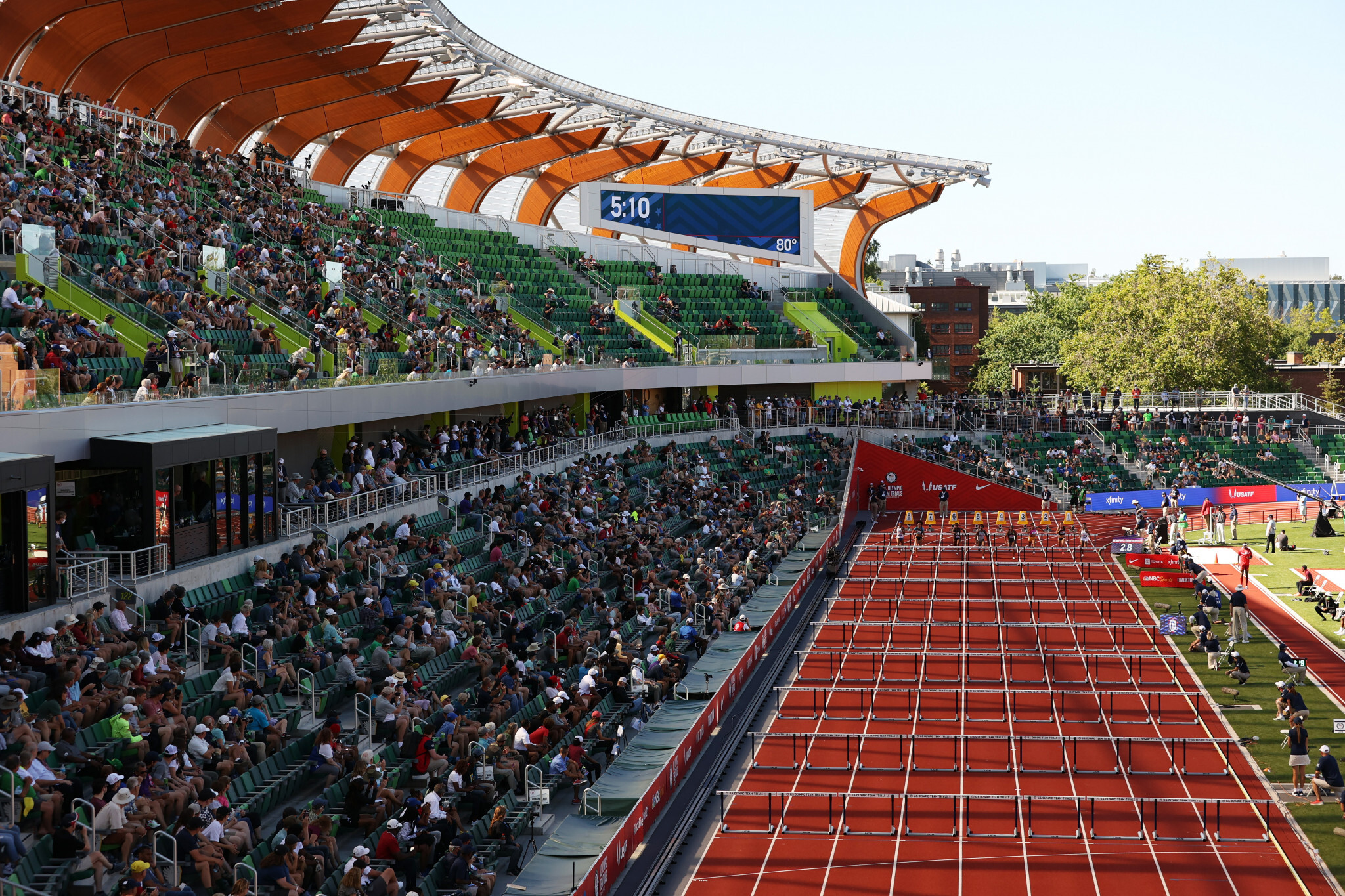
In his first competitive marathon in 2012 he finished third in Berlin in 2:06:12, and he was a consistent presence on the podium at World Majors Marathons thereafter, particularly in New York, where he finished second in 2015, first in 2017, third in 2018 and first again in 2019.
Kamworor ran his first race since the accident in January 2021, winning the Kenyan Police Cross Country Championships before going on to secure a place on Kenya’s Olympic 10,000m team after winning the national trials, only to have to pull out with an ankle injury.
But at the Valencia Marathon last December he was able to perform to the peak of his ability once more as he set a personal best of 2:05:23 in finishing fourth.
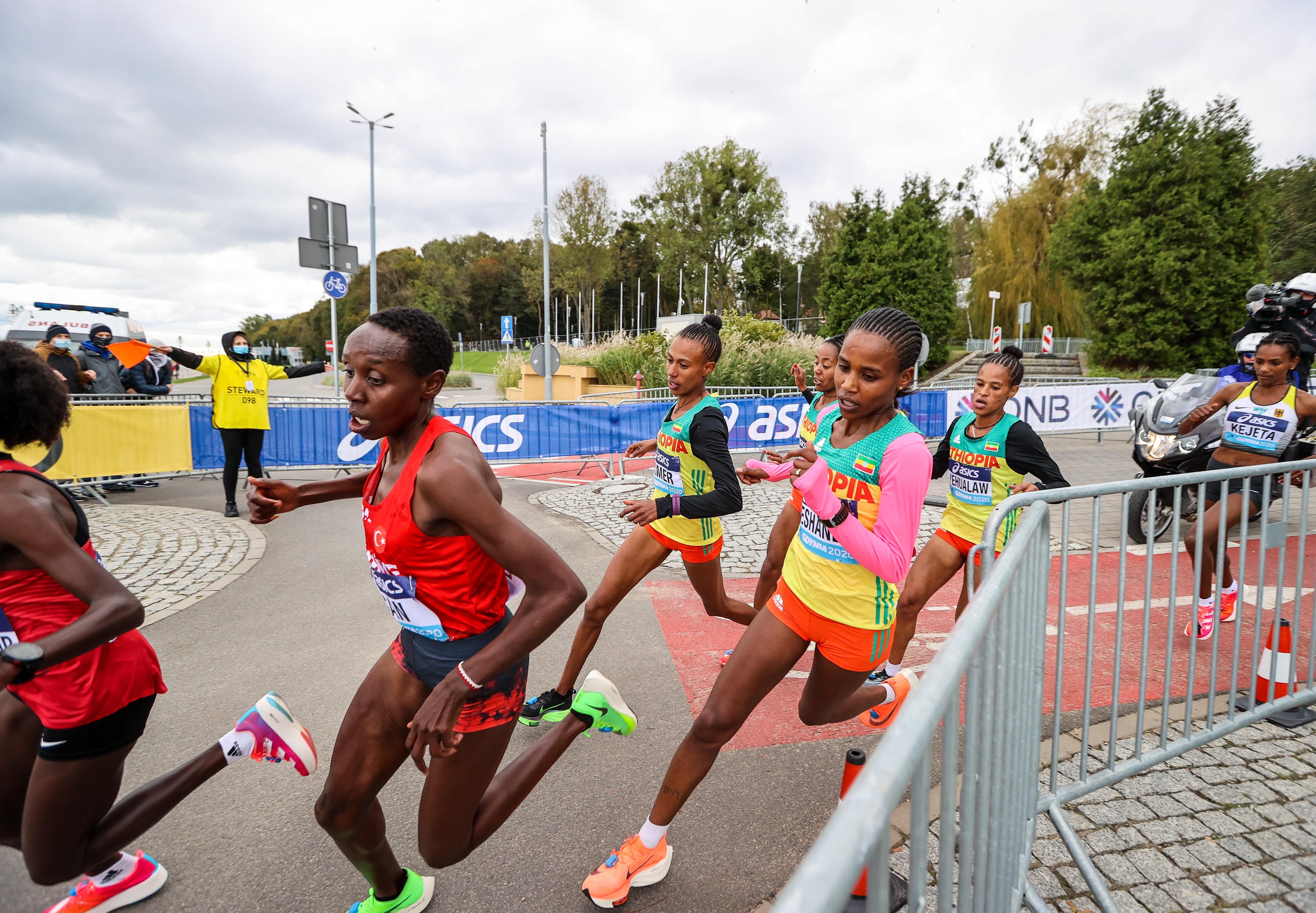
At the previous year’s running in Valencia, Cherono was second in a personal best of 2:03:04, putting him eighth on the world all-time list, having made his World Marathon Majors breakthrough in 2019 when he won in Boston in 2:07:57 and then Chicago in 2:05:45.
Like Kamworor, Kiptum also set a personal best last year as he clocked 2:04:17 in placing third at the Milan Marathon and he has a solid top-three record in virtually every race he has contested.
Such is the depth of Kenyan talent that they can name 2017 world champion Geoffrey Kirui as a reserve.
Meanwhile Kenya’s perennial rivals Ethiopia will be looking to their current world champion Lelisa Desisa, who found the way to win in the steamy heat of Doha three years ago, to make the most of his wild card entry to this year’s competition.
Desisa had early track success, winning the African U20 10,000m title in 2009, and he has since become a highly consistent performer at the highest level, achieving podium finishes four times in New York, including victory in 2018, and four times in Boston, where he won in 2013 and 2015.
He also has championship pedigree, having earned world silver in 2013 six years before his Doha gold, and has a personal best from 2013 of 2:04:45.
The formidable talent Ethiopia can call upon was made clear when it was confirmed that Desisa will have as teammates Tamirat Tola, Mosinet Geremew and Seifa Tura.
Tola earned Olympic 10,000m bronze in 2016 and world marathon silver in 2017. He set his personal best of 2:03:38 last year.
Geremew took silver behind Desisa at the 2019 World Championships, having finished second at that year’s London Marathon in 2:02:55, the third-fastest time in history.
Tura set his personal best of 2:04:29 last year in Milan before going on to win the Chicago Marathon in 2:06:12.
Uganda, the rising nation in distance running, earned this title in 2013 thanks to their 2012 Olympic champion Stephen Kiprotich. But the 33-year-old hasn’t been selected for Oregon, nor have Stephen Kissa, who ran a national record of 2:04:48 in Hamburg earlier this year, and Victor Kiplangat who was third in the second-fastest time ever by a Ugandan, 2:05:09.
Instead, Filex Chemonges, Fred Musobo and Jackson Kiprop will run the World Championships marathon, according to the Uganda Athletics Federation. So Kiprop, who helped Kiprotich to win the 2013 world title, is back at the World Championships for the first time since 2015.
Kissa, meanwhile, is due to be in Oregon in the 10,000m, where he will run with fellow Ugandan Joshua Cheptegei, the world 5000m and 10,000m record-holder, while Kiplangat is reported to be running the Commonwealth Games marathon.
Abdi Nageeye of the Netherlands and Belgium’s Bashir Abdi earned surprise silver and bronze medals respectively at the Olympics last year, but went on to confirm that their performance in Sapporo was anything but a fluke. Abdi set a European record of 2:03:36 to win the Rotterdam Marathon just two months later, while Nageeye was victorious at the Rotterdam Marathon earlier this year in a Dutch record of 2:04:56, finishing ahead of Abdi.
Both men will line up for the marathon in Oregon, only this time it will be less of a surprise if they reach the podium.
The United States will be looking to the highly consistent figure of Galen Rupp. After taking Olympic 10,000m silver in 2012, Rupp moved to the roads and earned Olympic bronze in 2016.
In 2017 he became the first US man to win the Chicago Marathon since 2002 and finished second at the Boston Marathon. He qualified for Oregon by finishing eighth at last year’s Olympics.
The championships will be in Rupp’s home state, in the same city where he made his first Olympic team in 2008 while he was a student at the University of Oregon.
The other US selections are Elkanah Kibet and Colin Mickow. Kibet, who is with the US military, finished 16th at the 2017 World Championships and set a personal best of 2:11:15 in finishing fourth at last year’s New York marathon.
Mickow is a 32-year-old full-time financial analyst for an organic and natural foods distributor who took up road running six years after finishing his college track career. He qualified for his first international vest after being the top US man home at last year’s Chicago Marathon, where he was sixth in 2:13:31.
Japan’s trio of male runners will be headed by Kengo Suzuki, who set a national record of 2:04:56 in February 2021 at the Lake Biwa marathon in Otsu. Daniel Do Nascimento of Brazil has run a 2:04:51 personal best this year and is another one to watch.
The three-loop World Athletics Championships marathon course only varies by about seven meters between its high and low points and the weather is likely to be considerably cooler than it was in Sapporo or Doha, where the men's marathon had to be held at midnight and the start time temperature was 29C/84F with 51% humidity.
Women's marathon
Ruth Chepngetich will defend her marathon title at the World Athletics Championships Oregon22 on July 18 by virtue of a wild card.
Chepngetich claimed the first gold medal of the 2019 World Championships, clocking 2:32:43 in the steamy heat to gain her first major gold.
She went on to finish third at the 2020 London Marathon before a roller coaster 2021, when she set a world record of 1:04:02 at the Istanbul Half Marathon, failed to finish the Tokyo 2020 Marathon in Sapporo but then won the Chicago Marathon.
At this year’s Nagoya Women's Marathon she won in 2:17:18, just 10 seconds off her personal best and the second-fastest ever women-only marathon.
She will be joined on the Kenyan team in Oregon by Judith Jeptum and Angela Tanui. Jeptum set a French all-comers’ record of 2:19:48 to win the Paris Marathon this year, while Tanui won the 2021 Amsterdam Marathon in 2:17:57.
Ethiopia will be represented by Gotytom Gebreslase, who won the 2021 Berlin Marathon on her debut and finished third in this year’s Tokyo Marathon in 2:18:18, Ababel Yeshaneh, second at the 2019 Chicago Marathon in a personal best of 2:20:51, and Ashete Bekere, third in last year’s London Marathon in 2:18:18, who has run 2:17:58 this year.
USA’s Keira D’Amato, who broke the North American record when winning January’s Houston Marathon in 2:19:12 – taking 24 seconds off the mark set by Deena Kastor in 2006 – has answered a late call to join the host nation’s team following the withdrawal of Olympic bronze medalist Molly Seidel.
Seidel has been suffering from a hip injury that forced her to drop out of the Boston Marathon in April and withdrew from the team after being unable to resolve her issue, giving the 37-year-old D’Amato, who only began serious marathon running in 2017, three weeks to prepare, but she is reported to be in “great shape”.
Her teammates will be Emma Bates, runner-up at last year’s Chicago Marathon, and Sara Hall, who finished second at the 2020 London Marathon and third at last year’s Chicago Marathon.
Japan has named Mizuki Matsuda, who has a personal best of 2:20:52, Mao Ichiyama, who has run 2:21:02, and Hitomi Niiya, who has a best of 2:21:17.
Britain will be represented by Rose Harvey, Olympian Jess Piasecki and Charlotte Purdue, who ran a personal best of 2:23:26 in finishing 10th at last year’s London Marathon.
Other names to watch out for are Bahrain’s Eunice Chumba, who ran 2:20:02 in Seoul in April this year, and Israel’s European 10,000m champion Lonah Salpeter, who won the 2020 Tokyo Marathon in 2:17:45 and was going well in the lead group at last year’s Olympic marathon before dropping down to 66th place in the closing stages.
After also dropping out of the 2019 World Championships marathon, Salpeter will be seeking to make the global impact her talent warrants.
Meanwhile Eritrea’s Nazret Weldu, who has run a personal best of 2:21:56 this year, is another one to watch.
by World Athletics
Login to leave a comment
World Athletics Championships Budapest23
Budapest is a true capital of sports, which is one of the reasons why the World Athletics Championships Budapest 2023 is in the right place here. Here are some of the most important world athletics events and venues where we have witnessed moments of sporting history. Throughout the 125-year history of Hungarian athletics, the country and Budapest have hosted numerous...
more...Here's How How Evans Chebet of Kenya Won the 2022 Boston Marathon
He led a Kenyan podium sweep in the deepest Boston men’s pro field ever.
Thanks to covering the stretch between 35 and 40 kilometers in an astounding 13:55, Evans Chebet of Kenya won the 2022 Boston Marathon in 2:06:51.
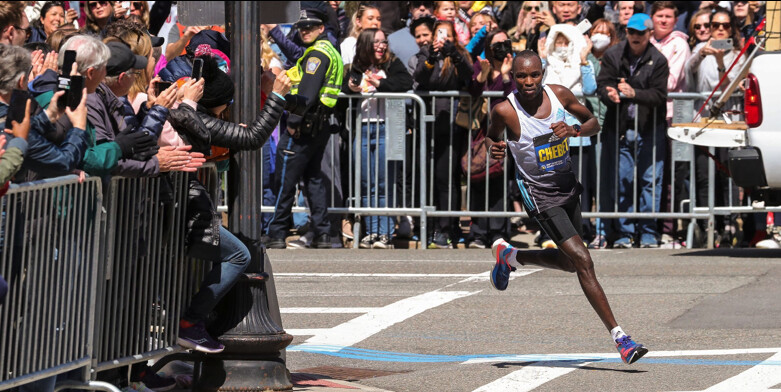
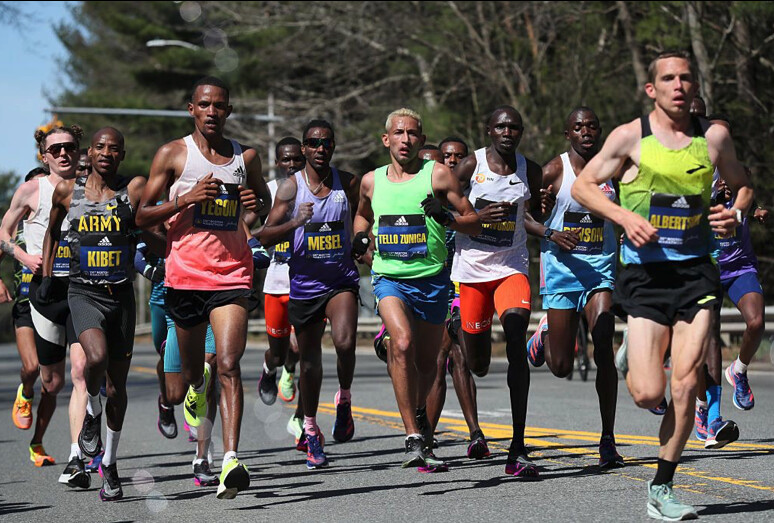
Lawrence Cherono, the 2019 winner, and Benson Kipruto, the 2021 champion, made it a Kenyan podium sweep. Cherono placed second in 2:07:21. Kipruto took third in 2:07:27.
Scott Fauble was the top American, placing seventh in 2:08:52. Fauble was also the top American in 2019, when he also finished seventh. Elkanah Kibet, ninth in 2:09:07, and CJ Albertson, 13th in 2:10:23, were the second and third U.S. finishers. All three set personal bests.
Here’s a full breakdown of the 2022 Boston Marathon men’s race, from how the race was won to the biggest surprise to the $$$.
The Winner: Evans Chebet
Chebet, 33, has been near the top of world marathoning for the past few years. Only one man in the field has a better personal best than his 2:03:00, and before today he had placed first or second in 10 marathons. But his Boston win was still a big step forward in his career.
Chebet’s best races before today were in high-level marathons such as Valencia, Prague, and Seoul, not in World Marathon Majors. He placed third in Berlin in 2016, fourth in Tokyo in 2017, and fourth last fall in London. He started Boston once before today, in 2018, when he was among the one-third of elite entrants who dropped out during that year’s horrific wind, rain, and cold.
Certainly his momentum was heading in the right direction for today’s Boston. Other than that fourth in London in October, he has been on a winning streak, taking titles in Buenos Aries in 2019 and Lake Biwa and Valencia (where he set his PR) in 2020. Chebet will no doubt cherish but not be complacent about his new status among the world’s best. He likely knows that since 2009, only one man, Lelisa Desisa of Ethiopia (2013 and 2015), has won more than one Boston title.
Where the Race Was Won
Chebet covered the 22nd mile in 4:27. Or as Geay apparently thought, “4:27?!” The Tanzanian looked at his watch, either in disbelief or in regret about how much time remained in the race now that he’d opted to go with Chebet. Whatever the case, Chebet dropped Geay a couple of minutes later en route to a 4:26 23rd mile. Then he ran another 4:26 mile.
Chebet’s 13:55 5K between 35K and 40K is good enough to win most open 5K road races. Cherono and Kipruto gave chase and overtook Geay in the process, but Chebet’s victory was never in doubt once he started his fabulous display of late-race speed. Chebet acknowledged as much at the postrace press conference, saying through an interpreter he was confident that his move would get him the win.
The Biggest Surprise
It was a fast, deep race. The 10th finisher, Kinde Atanaw of Ethiopia, ran 2:09:16. That’s 35 seconds faster than Benson Kipruto ran to win the 2021 edition.
Wait, that’s surprising? Wasn’t this said to be the best Boston field in years? Didn’t the postponement of the London Marathon to October funnel that many more elites to the start line in Hopkinton? And doesn’t everyone run fast in the super shoe era?
Well, there were super shoes six months ago when winner Kipruto was the only one to break 2:10. Also, despite what may have appeared to be the case on television, the weather was challenging. The wind was slight—usually no more than 5 miles per hour while the pros were racing—but not favorable. Des Linden, who won during the 2018 monsoon and knows from wind, said there was a persistent headwind. A weather team from the University of Massachusetts at Lowell who tracked conditions confirmed to Runner’s World there was an atypical easterly (i.e., in-their-race) wind throughout the race.
And, as we noted above, it’s become common at Boston for the men to not really start racing until the final five miles. Today, they happened to do so after an opening half of 1:03:24, almost three minutes faster than the main pack ran last year.
So, yes, a bunch of really fast guys ran fast today at Boston. But that outcome was neither predictable nor weather-enabled.
In recent years, the men’s race at Boston has often featured a large lead pack cresting Heartbreak Hill together, and then someone shattering the pack with an aggressive move soon after. That trend continued today.
Chebet was among a pack of 20 that hit halfway in 1:03:24. He occasionally appeared near the front of the pack as they moved through the Newton hills, looking eager to get going, then perhaps reminding himself it was too early, and disappearing back into the group.
Fifteen men came up and over the most famous hill in running together. With five miles to go, two-time New York City winner Geoffrey Kamworor and last year’s champ, Benson Kipruto, appeared at the front for the first time. Chebet looked around some more. Then he started to push.
Within a minute, the field was single file. Only Gabriel Geay of Tanzania went with Chebet. Kipruto and 2019 winner Lawrence Cherono ran together in third and fourth
Tidbits From the Top 20
In addition to runner-up Lawrence Cherono (2019) and third-place finisher Benson Kipruto (2021), there were two other former Boston champions in the top 20. Lemi Berhanu of Ethiopia, the 2016 winner, placed 11th in 2:09:43. Yuki Kawauchi of Japan, winner during the apocalyptic storm of 2018, finished 20th in 2:12:55.
If sixth-place finisher Albert Korir and his knock-kneed gait looked familiar, that’s because he won the 2021 New York City Marathon in November.
Besides Scott Fauble, Elkanah Kibet, and CJ Albertson, there were four other American men in the top 20: Matthew McDonald, 14thin 2:10:35 (a PR); Reed Fischer, 16th in 2:10:54 (also a PR); Mick Iacofano, 17th in 2:11:48; and Colin Bennie, 19th in 2:12:08.
The Prize Money
Evans Chebet, $150,000
Lawrence Cherono, $75,000
Benson Kipruto, $40,000
by Runner’s World
Login to leave a comment
Boston Marathon
Among the nation’s oldest athletic clubs, the B.A.A. was established in 1887, and, in 1896, more than half of the U.S. Olympic Team at the first modern games was composed of B.A.A. club members. The Olympic Games provided the inspiration for the first Boston Marathon, which culminated the B.A.A. Games on April 19, 1897. John J. McDermott emerged from a...
more...Rising star Gaku Hoshi thrills in joint Osaka-Biwako marathon
Gaku Hoshi won Sunday’s combined Osaka Marathon and Lake Biwa Mainichi Marathon, capturing the new event on the national running calendar in his first race at that distance.
In a race featuring 300 elite male and female runners, the 23-year-old Hoshi broke out of a three-man pack around the 38-kilometer mark and ran solo the rest of the way to win in 2 hours, 7 minutes and 31 seconds — a record for a first-time marathoner.
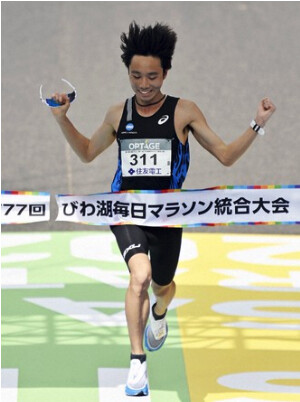
“This was my first marathon and I didn’t think I would win so this is a surprise,” Hoshi said.
“It’s too good to be true but I’m super happy. I knew it would come down to the last stages so I went aggressively after the 30-km mark. It went as planned,” he said.
On a clear and sunny day, the 42.195-km race started in front of the Osaka Prefectural Government Building and finished at Osaka Castle Park.
Hoshi stayed in a leading group of 10 runners after the last turn, and after his pacemaker dropped out the race continued as a three-man contest between Hoshi, Ichitaka Yamashita and Yuhei Urano.
Yamashita finished second, 11 seconds behind Hoshi, and Urano was third. Misato Horie won the women’s division.
Seven runners including the top three men’s finishers qualified for Japan’s Marathon Grand Championship to determine the qualifiers for the 2024 Paris Olympics.
The elite men-only Lake Biwa Mainichi Marathon, Japan’s oldest annual marathon race with 76 editions so far, became a part of the mass-participation Osaka Marathon beginning this year.
The 2022 edition involved only elite athletes, with 20,000 mass-event runners excluded due to coronavirus concerns.
Login to leave a comment
Osaka Marathon
In 2022 the Lake Biwa Mainichi Marathon and Osaka Marathon were held together. For 2023 the name of the marathon will be Osaka and both men and women can run the race. The original male-only competition was first held in 1946 and, having taken place every year since then, it is Japan's oldest annual marathon race. The early editions of...
more...2021 Fukuoka Marathon champion Michael Githae will lead a competitive Kenyan field in Tokyo
Michael Githae will be one of the frontrunners for the coveted title having won the Fukuoka event in December in 2:07:51.
Githae will have Simon Kariuki for the company in the event. Kariuki finished third in the Lake Biwa Marathon last year in a time of 2:07:18.
Benard Kimani, who finished fourth at the Eindhoven Marathon in 2019 in 2:11:31, and Daniel Kitonyi who has a personal best of 2:14.41 set at the Nagano Marathon two years ago, will be seeking to upset the formbook.
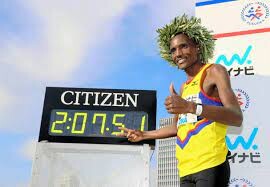
Nicholas Kosimbei, who has a personal best of 1:00.20 in the half marathon, will also make his debut in the full marathon.
Japan will be represented by Kengo Suzuki, who has a PB of 2:04:56 set at the Lake Biwa Marathon alongside Hidekazu Hijikata (PB 2:06:26), Kyohei Hosoya (PB 2:06:35), and 2020 Fukuoka winner Yuya Yoshida (2:07:05).
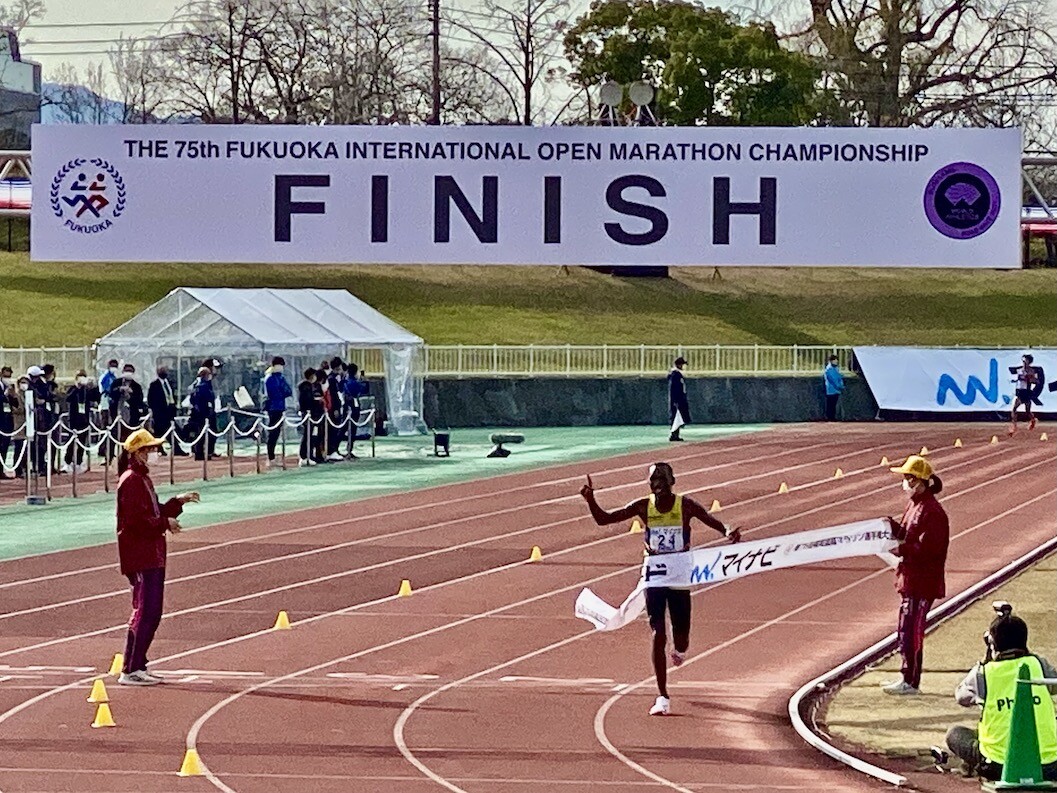
Seven men with recent times under 2:07, 31 under 2:10, 112 under 2:20, and two debuting sub-61 half marathoners have confirmed participation.
Elsewhere, the Osaka Marathon is slated for February 27 with two Kenyans in the field.
The 2018 Lake Biwa winner Joseph Macharia Ndirangu with a PB of 2:07:53 and James Rungaru (PB 2:08:250 will compete at the event.
by William Njuguna
Login to leave a comment
Tokyo Marathon
The Tokyo Marathon is a world-renowned annual marathon held in Tokyo, Japan. As one of the prestigious Abbott World Marathon Majors, it attracts elite and amateur runners from around the globe. The race holds World Athletics Platinum Label status, recognizing its high competitive standards, top-tier organization, and international appeal. Sponsored by Tokyo Metro, the Tokyo Marathon has grown into one...
more...2022 Osaka Marathon Will Cut Mass-Participation Field of 20,000 due to the pandemic
On Feb. 15, Osaka governor Hirofumi Yoshimura indicated that the mass-participation field of 20,000 for the Osaka Marathon's 10th running on Feb. 27 is to be cut and that the race will go ahead with only its elite field of 300. The race is jointly organized by the Osaka metropolitan and prefectural governments.
In response to a question from a reporter, Governor Yoshimura stated, "The final decision is to be made by the organizing committee, but I believe that the mass-participation component of the Osaka Marathon will be canceled. I'd like to express my regret to all the amateur runners who had prepared for this race with anticipation, but given the current reality of the pandemic numbers, from the perspective of combatting further spread of the virus I ask for your understanding of the decision to cancel."
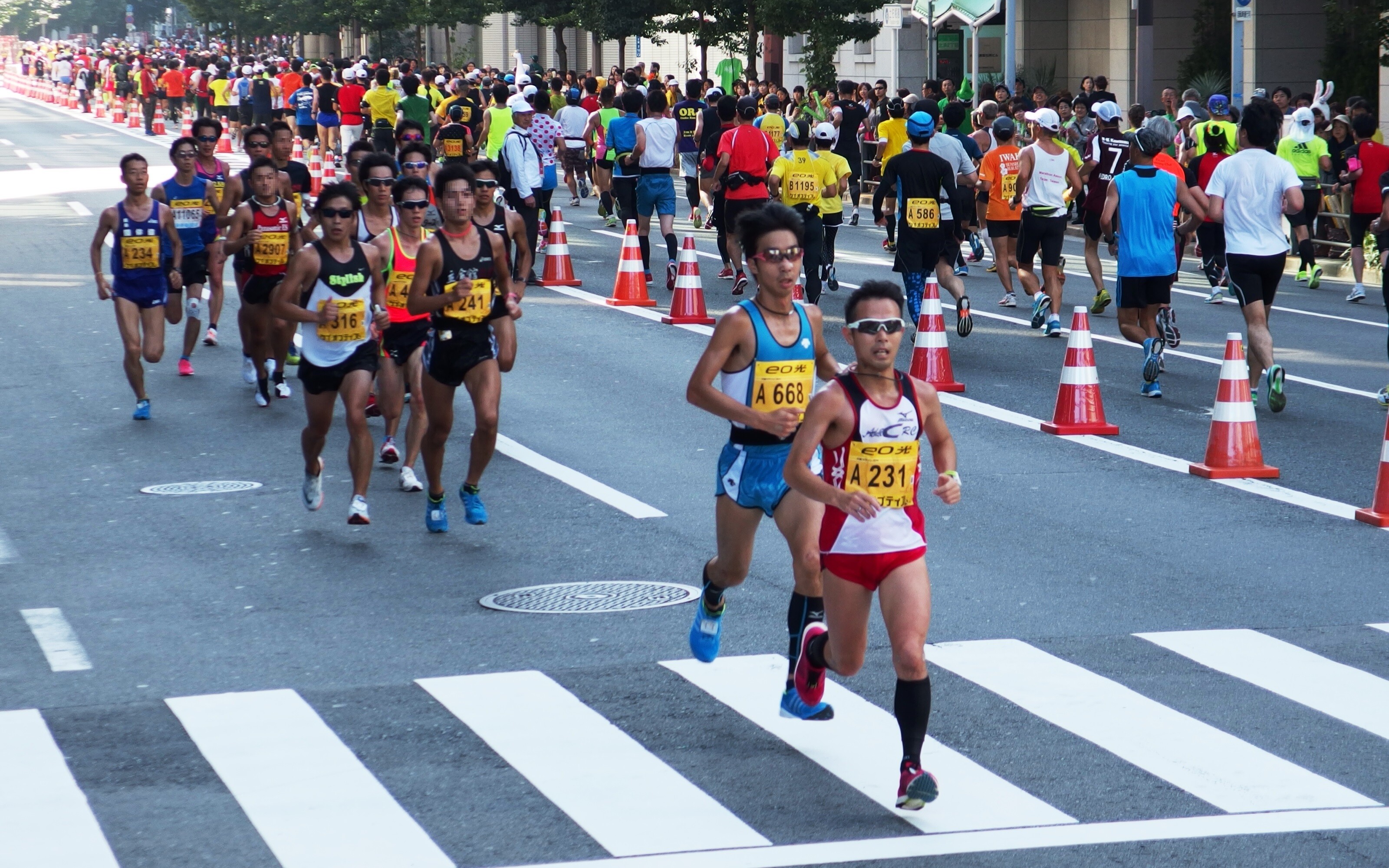
With regard to refunding entry fees, the governor said, "That is a decision to be made by the organizers, but I think refunds should be given to those who want them. There will also be those who want to roll their entries over to next year, so I think that a system must be put in place to accommodate individual choices."
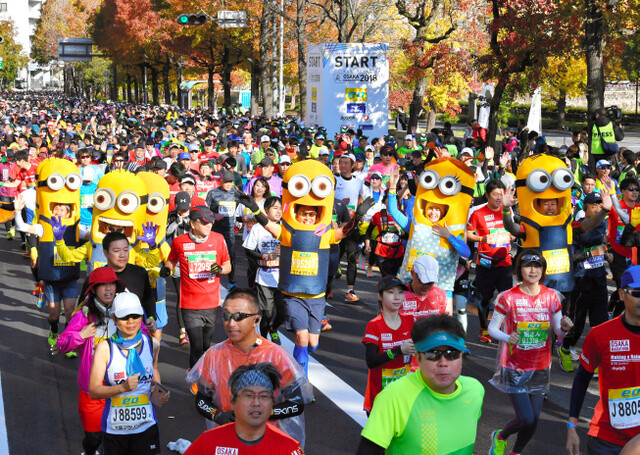
This year the Osaka Marathon is set to expand its elite field, incorporating the organization of the now-defunct elite men-only Lake Biwa Mainichi Marathon. The elite race plays a key role in international competition. As part of the JAAF's new Japan Marathon Championships series it helps determine national teams for both this year's Oregon World Championships and Hangzhou Asian Games.
It is also a crucial part of qualification for the Marathon Grand Championship 2024 Olympic marathon trials. Governor Yoshimura expressed his support for the elite race going ahead, saying, "The level of competition is very high, and it is part of national team selection."
by Brett Larner
Login to leave a comment
Osaka Marathon
Let’s run for fun in the shadow of Osaka Castle, the symbol of the city!This is a fun running event, which welcomes international runners from all corners of the global alongside families, friends and Japanese runners; all running together through the colored leaves of Osaka Castle Park on a crisp autumn morning. The fun and pleasure of running is universal! ...
more...Tokyo Marathon announced domestic elite field
A few days ago the Tokyo Marathon announced the domestic elite field for its 2021 edition being held Mar. 6, 2022, with the caveat that final decisions on whether it would go ahead and whether it would have an international field, originally slated to feature men's world record holder Eliud Kipchoge, would have to wait until Feb. 18. Yesterday the Osaka Marathon announced its field for this year's race on Feb. 27, and like Osaka, Tokyo's field gives away its history as a men-only race. The men's field is even more massive than Osaka's, and the women's field only slightly deeper.
Overall Tokyo is solid, with the men's NR holder, the women-only NR holder, both half marathon NR holders, the last three Fukuoka International Marathon winners, seven men with recent times under 2:07, 31 under 2:10, 112 under 2:20, and two debuting sub-61 half marathoners. Only three women on the list including women-only NR holder Mao Ichiyama (Wacoal) have gone sub-2:30 vs. three sub-2:40 in Osaka, meaning that the field at the Nagoya Women's Marathon the week after Tokyo should be pretty good.
Especially notable people in the men's field include NR holder Kengo Suzuki (Fujitsu), two-time 2:06 man Hiroto Inoue (Mitsubishi Juko) who won last month's Osaka Half Marathon in PB time, 2020 Fukuoka winner Yuya Yoshida (GMO), and 2021 Fukuoka winner Michael Githae (Kenya/Suzuki). It's also notable that none of the three men who ran the Tokyo Olympics marathon is entered in Tokyo or any other domestic spring marathon.
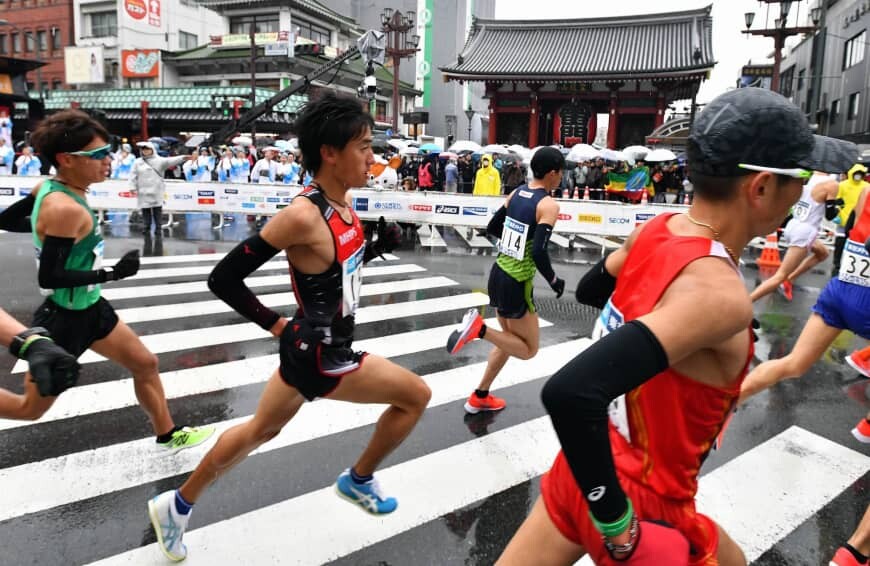
Along with Yoshida a large group from the GMO corporate team and other athletes are entered both here and in Osaka, so the final numbers at both races are likely to be a bit lower than what's on paper. But if the weather's good you can still expect to see massive races both weekends. And expect Ichiyama and Suzuki to give the world record for fastest combined times by a married couple in a single race, 4:27:05 by Kenyans Purity Cherotich Rionoripo and Paul Kipchumba Lonyangata in Paris 2017, a shot.
2021 Tokyo Marathon
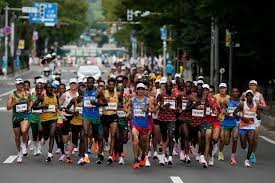
Domestic Elite Field
Men
Kengo Suzuki (Fujitsu) - 2:04:56 (Lake Biwa 2021)
Hidekazu Hijikata (Honda) - 2:06:26 (Lake Biwa 2021)
Kyohei Hosoya (Kurosaki Harima) - 2:06:35 (Lake Biwa 2021)
Ryu Takaku (Yakult) - 2:06:45 (Tokyo 2020)
Hiroto Inoue (Mitsubishi Juko) - 2:06:47 (Lake Biwa 2021)
Yusuke Ogura (Yakult) - 2:06:51 (Lake Biwa 2021)
Daisuke Uekado (Otsuka Seiyaku) - 2:06:54 (Tokyo 2020)
Toshiki Sadakata (Mitsubishi Juko) - 2:07:05 (Tokyo 2020)
Yuya Yoshida (GMO) - 2:07:05 (Fukuoka Int'l 2020)
Simon Kariuki (Kenya/Togami Denki) - 2:07:18 (Lake Biwa 2021)
Masato Kikuchi (Konica Minolta) - 2:07:20 (Lake Biwa 2021)
Shin Kimura (Honda) - 2:07:20 (Tokyo 2020)
Kento Kikutani (Toyota Boshoku) - 2:07:26 (Lake Biwa 2021)
Yuta Shimoda (GMO) - 2:07:27 (Tokyo 2020)
Tadashi Isshiki (GMO) - 2:07:39 (Tokyo 2020)
Masaki Sakuda (JR Higashi Nihon) - 2:07:42 (Lake Biwa 2021)
Michael Githae (Kenya/Suzuki) - 2:07:51 (Fukuoka Int'l 2021)
Atsumi Ashiwa (Honda) - 2:07:54 (Lake Biwa 2021)
Kenya Sonota (JR Higashi Nihon) - 2:08:11 (Lake Biwa 2021)
Kento Otsu (Toyota Kyushu) - 2:08:15 (Lake Biwa 2021)
Naoya Sakuda (JR Higashi Nihon) - 2:08:21 (Fukuoka Int'l 2020)
Daisuke Hosomori (YKK) - 2:08:28 (Lake Biwa 2021)
Keisuke Hayashi (GMO) - 2:08:52 (Lake Biwa 2021)
Kazuma Kubo (Nishitetsu) - 2:08:53 (Lake Biwa 2021)
Chihiro Miyawaki (Toyota) - 2:09:04 (Tokyo 2020)
Takumi Kiyotani (Chugoku Denryoku) - 2:09:13 (Lake Biwa 2021)
Yuki Sato (SGH Group) - 2:09:18 (Berlin 2018)
Kei Katanishi (JR Higashi Nihon) - 2:09:27 (Lake Biwa 2021)
Yuki Takamiya (Yakult) - 2:09:30 (Lake Biwa 2021)
Taku Fujimoto (Toyota) - 2:09:36 (Fukuoka Int'l 2019)
Takamitsu Hashimoto (Komori Corp.) - 2:09:43 (Lake Biwa 2021)
Keisuke Tanaka (Fujitsu) - 2:10:07 (Lake Biwa 2021)
Kensuke Horio (Toyota) - 2:10:21 (Tokyo 2019)
Akira Tomiyasu (Tokyo T&F Assoc.) - 2:10:29 (Lake Biwa 2021)
Ryo Matsumoto (Toyota) - 2:10:32 (Lake Biwa 2020)
Ryota Komori (NTN) - 2:10:33 (Lake Biwa 2021)
Takuma Kumagai (Sumitomo Denko) - 2:10:41 (Fukuoka Int'l 2021)
Yuki Nakamura (Sumitomo Denko) - 2:10:47 (Lake Biwa 2021)
Takuma Shibata (Komori Corp.) - 2:10:48 (Hofu 2020)
Shota Saito (JFE Steel) - 2:10:50 (Beppu-Oita 2020)
Daiji Kawai (Toenec) - 2:10:50 (Lake Biwa 2019)
Junnosuke Matsuo (NTT Nishi Nihon) - 2:11:00 (Beppu-Oita 2020)
Asuka Tanaka (Runlife) - 2:11:07 (Fukuoka Int'l 2020)
Taiki Yoshimura (Asahi Kasei) - 2:11:13 (Hofu 2019)
Toshinori Watanabe (GMO) - 2:11:17 (Katsuta 2020)
Yoshiyuki Hara (Gotemba Takigahara SDF Base) - 2:11:21 (Hofu 2020)
Benard Kimani (Kenya/Comodi Iida) - 2:11:31 (Eindhoven 2019)
Debut / Do-Over
Nicholas Kosimbei (Kenya/YKK) - 1:00:20 (Lisbon Half 2019)
Masashi Nonaka (Osaka Gas) - 1:00:58 (Nat'l Corp. Half 2020)
Tomoya Ogikubo (Yakult) - 27:44.74 (Hachioji LD 10000 m 2021)
Naoki Koyama (Honda) - 27:55.16 (HDC Fukagawa 10000 m 2021)
Women
Mao Ichiyama (Wacoal) - 2:20:29 (Nagoya 2020)
Natsuki Omori (Daihatsu) - 2:28:38 (Nagoya 2021)
Shiho Kaneshige (GRlab Kanto) - 2:28:51 (Osaka Int'l 2020)
Hitomi Niiya (Sekisui Kagaku) - 2:30:58 (Nagoya 2009)
Miharu Shimokado (SID Group) - 2:32:48 (Osaka Int'l 2020)
Yui Okada (Otsuka Seiyaku) - 2:32:00 (Nagoya 2020)
Hitomi Mizuguchi (Uniqlo) - 2:32:33 (Osaka Int'l 2020)
Mai Fujisawa (Hokkaido Excel AC) - 2:35:52 (Kanazawa 2021)
Tomomi Sawahata (Sawahatters) - 2:36:45 (Osaka Int'l 2022)
Debut / Do-Over
Kaori Morita (Panasonic) - 1:10:28 (Nat'l Corp. Half 2021)
Rika Kaseda (Daihatsu) - 31:39.86 (Nat'l Championships 2020)
by Brett Larner
Login to leave a comment
Tokyo Marathon
The Tokyo Marathon is a world-renowned annual marathon held in Tokyo, Japan. As one of the prestigious Abbott World Marathon Majors, it attracts elite and amateur runners from around the globe. The race holds World Athletics Platinum Label status, recognizing its high competitive standards, top-tier organization, and international appeal. Sponsored by Tokyo Metro, the Tokyo Marathon has grown into one...
more...Beppu-Oita Mainichi Marathon is set to return this year on Feb 6
Other races have started canceling as Japan's COVID-19 numbers climb again, but the Beppu-Oita Mainichi Marathon is set to return this year on Feb 6, announcing its elite field on Jan 14. The front end is heavily dominated by people who part of the Miracle in Lake Biwa last year, Shuho Dairokuno (Asahi Kasei) and Tsubasa Ichiyama (Komori Corp.) leading the way at 2:07:12 and 2:07:41 from that race.
Four others on the list have run 2:08 recently, three at Lake Biwa, with two 2:09 veterans rounding out a sub-2:10 club that's as good as in any past year at Beppu-Oita, even without an international field. Well, there is one Ethiopian in the race, 2019 Fukuoka 3rd-placer Derese Workneh (Hiramatsu Byoin), but he's locally-based in Kyushu.
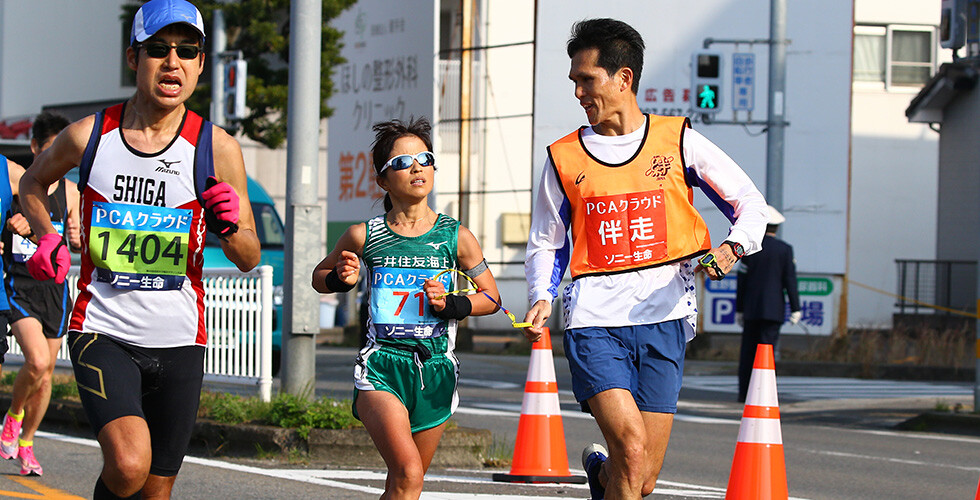
But where this year's field really stands out is in its list of first-timers. Sub-61 half marathoners Kiyoshi Koga (Yasukawa Denki) and Yusuke Nishiyama (Toyota) are there fresh off good runs on the New Year Ekiden's longest stage. Track specialist Tetsuya Yoroizaka (Asahi Kasei) is running for real after a couple of less-serious marathon stabs, and likewise doing it off a good New Year run.
Last time around Aoyama Gakuin University's Yuya Yoshida made a big impact at Beppu-Oita in his debut, and this time the 2022 Hakone Ekiden champ team has five members on the list including Hakone members Kotaro Kondo and Takayuki Iida, who ran the equivalent of 1:01:20 and 1:02:21 half marathons on their stages, and sub-63 half marathoners Taiki Miyasaka, Ryo Nishikubo and Shungo Yokota.
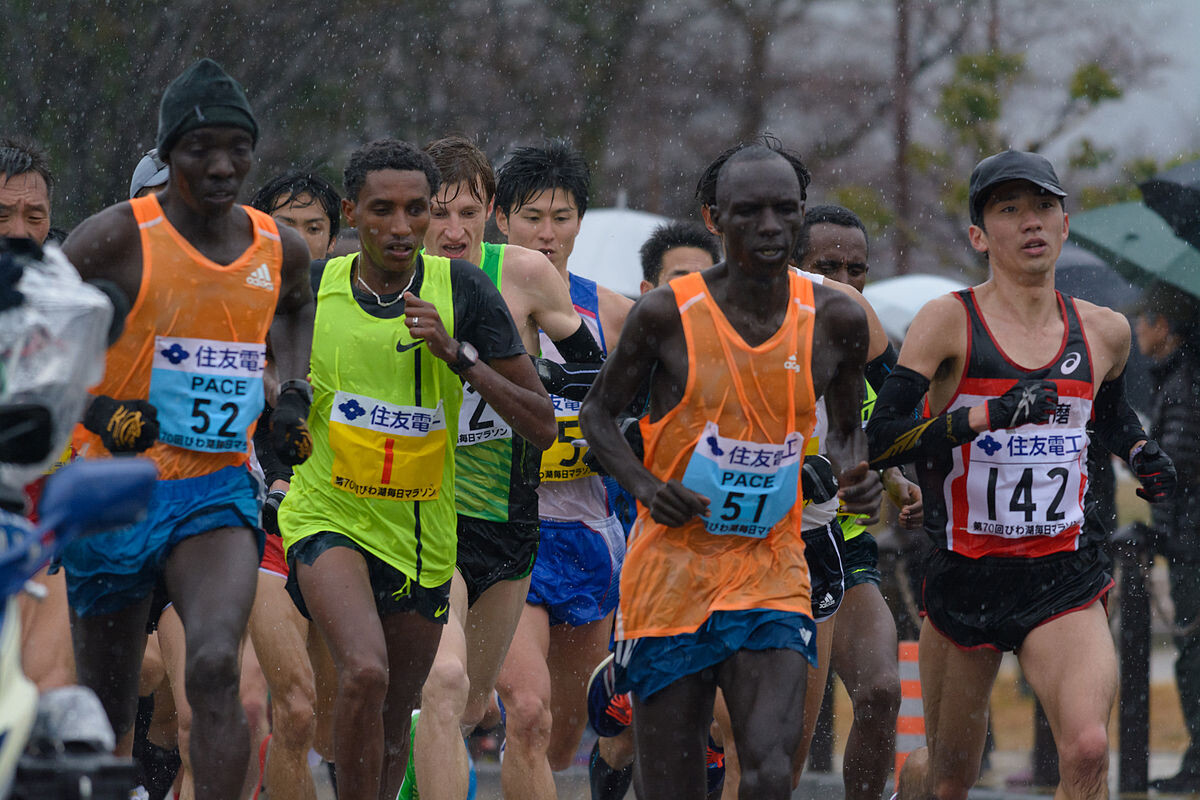
It should be a great race that cranks out even more quality Japanese marathoners. TBS will be broadcasting it live, and JRN will cover it on @JRNLive. Check back closer to race date for more info.
70th Beppu-Oita Mainichi Marathon
Elite Field
Shuho Dairokuno (Asahi Kasei) - 2:07:12 (Lake Biwa 2021)
Tsubasa Ichiyama (Komori Corp.) - 2:07:41 (Lake Biwa 2021)
Daisuke Hosomori (YKK) - 2:08:28 (Lake Biwa 2021)
Hiroto Fujimagari (Toyota Kyushu) - 2:08:30 (Lake Biwa 2021)
Takuya Fujikawa (Chugoku Denryoku) - 2:08:45 (Tokyo 2020)
Yuta Koyama (Toenec) - 2:08:46 (Lake Biwa 2021)
Ryo Hashimoto (GMO) - 2:09:29 (Beppu-Oita 2019)
Hisanori Kitajima (Yasukawa Denki) - 2:09:54 (Lake Biwa 2021)
Shogo Kanezane (Chugoku Denryoku) - 2:10:17 (Lake Biwa 2021)
Tadashi Suzuki (Suzuki) - 2:10:46 (Hofu 2020)
Derese Workneh (Ethiopia/Hiramatsu Byoin) - 2:10:52 (Fukuoka Int'l 2019)
Taiki Yoshimura (Asahi Kasei) - 2:11:13 (Hofu 2019)
Yuichi Okutani (Otsuka Seiyaku) - 2:11:16 (Beppu-Oita 2020)
Tomohiro Tanigawa (Konica Minolta) - 2:11:54 (Hofu 2020)
Debut/Do-Over
Kiyoshi Koga (Yasukawa Denki) - 1:00:49 (Nat'l Corp. Half 2020)
Yusuke Nishiyama (Toyota) - 1:00:55 (Nat'l Corp. Half 2020)
Akira Akasaki (Kyudenko) - 1:01:46 (Ageo City Half 2019)
Tetsuya Yoroizaka (Asahi Kasei) - 1:01:57 (Marugame 2020)
Riki Nakanishi (Toenec) - 1:02:02 (Osaka 2020)
Taiki Miyasaka (Aoyama Gakuin Univ.) - 1:02:26 (Takanezawa 2020)
Ryo Nishikubo (Aoyama Gakuin Univ.) - 1:02:30 (Takanezawa 2020)
Shungo Yokota (Aoyama Gakuin Univ.) - 1:02:36 (Hi-Tech 2022)
Yuya Kawata (Subaru) - 1:02:38 (Nat'l Corp. Half 2021)
Noriaki Oyama (Konica Minolta) - 1:02:41 (Marugame 2020)
Shogo Ise (Konica Minolta) - 1:02:53 (Marugame 2019)
Takayuki Iida (Aoyama Gakuin Univ.) - 1:03:10 (Takanezawa 2019)
Kotaro Kondo (Aoyama Gakuin Univ.) - 1:03:42 (Nat'l Univ. Half 2021)
by Brett Larner
Login to leave a comment
Beppu-Oita Mainichi Marathon
The Beppu-Oita Marathon is an annual men's marathon race that takes place every February between the cities of Beppu and Oita on the island of Kyushu in Japan. First held in 1952 as a 35km race, the looped marathon course begins at the bottom of Takasaki Mountain and reaches Beppu's Kankoko International Port before turning back towards the finishing point...
more...2022 Hakone Ekiden, this is the biggest race of the year on the Japanese Ekiden calendar
One of the biggest race of the year, the 98th Hakone Ekiden on Jan. 2 and 3. 21 university men's teams race 10 legs from central Tokyo to the mountains and back over the course of two days, each leg roughly a half marathon in distance and the total course adding up to 217.1 km. 65 million people watched at least part of the 2021 NTV Hakone broadcast broadcast, so you know they must be on to something.
The broadcast, the best in the world, starts at 7:00 a.m. both days, and as you'd expect they keep it a locked-down secret only for Japanese audiences. A VPN or mov3.co are probably the best bets for trying to watch from abroad, but JRN will once again cover it all on @JRNLive.
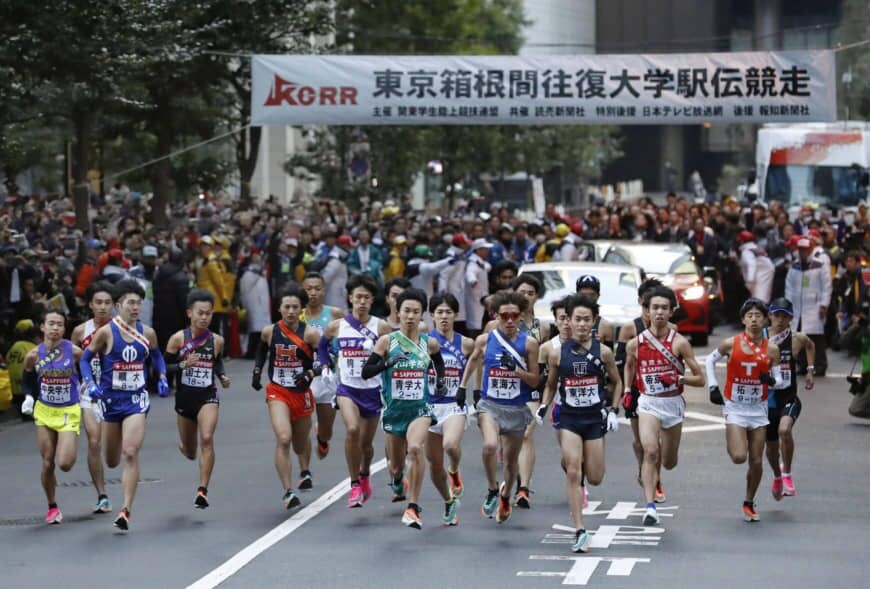
The 2021 race had one of the most dramatic finishes in Hakone history, with Komazawa University anchor Takuma Ishikawa coming from over a kilometer behind to run down Yuki Onodera with 2 km to go and stop him from bringing Soka University home to its first-ever Hakone win. Both were 3rd-years, and it's one sad detail of the 2022 race that neither will be back for a senior year rematch, Ishikawa having been arrested a few months after the race and no longer running for Komazawa, and Onodera missing from Soka's entry list.
The pandemic has had a major impact on Hakone and the collegiate men's development system. Given the average stage length of 21.71 km, the half marathon has long been the major focus of Japanese collegiate training, something that has contributed directly to the depth of the country's marathoning and results like what we saw in Lake Biwa this year. During the pandemic most of the major races on the collegiate half marathon circuit haven't happened, and that's led to a refocusing on track racing. It's easy to see that in this year's Hakone entry lists.
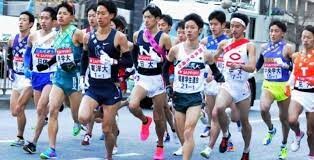
Looking at the average PBs of the 10 fastest runners on each team, out of the 19 teams that raced Hakone last year and are back this year, 17 have gotten faster over 5000 m since last year, 17 faster over 10000 m, and 14 slower over the half marathon. It couldn't be clearer: out of necessity, coaches have shifted focus from the half marathon to the 5000 m and 10000 m, and the level at those distances has come way up. 12 of the 21 teams have a 10-man average 5000 m time under 14 minutes, 16 have a 10000 m average under 29 minutes, and only 2 have a half-marathon average under 63 minutes. Even last year, when the lack of half marathons was already an issue, it was nowhere near that, with 8 teams sub-14, 10 sub-29, and 5 sub-63. 16 teams have at least one runner 28:10 or faster for 10000 m. 12 have someone 13:40 or better for 5000 m. Only 5 have someone under 62 minutes for the half. Shoes are no doubt part of it, but given the decline in the half marathon they're not the whole story. It'd be interesting to speculate what kind of impact this is going to have on the next generation of marathoners, and what would happen if the focus shifted further to 1500 m and 5000 m.
At any rate, the shift that has happened makes the job of ranking teams harder. Defending champ Komazawa has the best 5000 m and 10000 m 10-man averages, 13:41.71 and 28:24.64, but almost nobody on the team has run a serious half marathon. 2nd-tier teams that had to run October's Yosenkai qualifier half marathon have quality half marathon times on the books and look better on paper relative to top-tier teams like Komazawa than they probably really are. Other teams like last year's 3rd-placer Toyo University publicized that they were doing a half marathon time trial in place of November's Ageo City Half Marathon but didn't publicize the results, leaving them way farther down the rankings than they should be. We've tweaked our rankings formula to try to account for all this, but as with last year you can be sure that there's more unpredictability than usual.
Aoyama Gakuin University has won Hakone 5 of the last 7 years and is the favorite. 2nd at both the Izumo Ekiden and National University Ekiden this season, AGU is one of only 3 teams in the field to be better over 5000 m, 10000 m and half marathon than it was last year, when it was 4th at Hakone, and one of only two with sub-14, sub-29 and sub-63 10-man averages. Two weeks after the National University Ekiden it had 6 people total under 63 minutes in two half marathons, so whatever it lacked at the shorter ekidens you can be sure AGU's head coach Susumu Hara isn't letting the team's stamina slide.
AGU's two strongest competitors on paper are this year's and last year's Yosenkai qualifier winners Meiji University and Juntendo University. But it's one thing to win the qualifier, making you the #11 team in the Hakone field, and something else to go for the overall win. Meiji has a history of not performing well at Hakone, and last year Juntendo struggled in part because star 1st-year Ryuji Miura had suffered an injury while training for the National Championships 3000 mSC a month before Hakone. Running up to potential would put either into contention, but as Soka head coach Kazutaka Enoki said right after last year's loss, "It's not that easy."
Komazawa, Tokyo Kokusai University and Toyo could all be up at this level despite being ranked further down the field due to their lack of experience with the half marathon. Komazawa's trending in that direction after finishing 5th at Izumo and then winning the longer Nationals, while TKU and Toyo are the opposite, TKU winning Izumo and taking 5th at Nationals, and Toyo going 3rd and 10th. The most likely scenario for TKU is to stack the first three stages with its top 3 Vincent Yegon, Masaya Yamatani and Ken Tansho to build up a big Day One lead and then try to hang on through Day Two like Soka attempted last year. That would set up a potential duel between Yegon and Komazawa's Ren Tazawa, maybe with Miura, the 3000 mSC NR holder, 7th in the steeple final at the Tokyo Olympics, and the U20 half marathon NR holder, in the mix. Given that Tazawa beat 2021 Hakone MVP Yegon over 10000 m earlier this month, it would be one of the highlights of this year's race.
Toyo will have former H.S. 5000 m NR holder Kosuke Ishida making his Hakone debut, one of the other highlights to watch for. Teikyo University is in the same situation as TKU and Toyo, and given a stable history at Hakone it should probably be included among the contenders for top 10. That leaves only the debuting Surugadai University and bottom-ranked Senshu University on the list of non-contenders, making for what could be one of the most competitive Hakones in memory.
One of the things that NTV does so well on its broadcast, especially on Day Two, is to cover multiple plot lines. With so many good teams this year there should be a lot of turnover around the dividing line between 10th and 11th keeping their production crew busy. Things can get complicated if the leading team gets too far ahead, so in prep for the race take a few minutes to read this guide to understanding elements of the ekiden format like white sash starts and race strategy. See you at 7:00 a.m. Sunday morning.
by Brett Larner
Login to leave a comment
Githae wins final edition of Fukuoka Marathon
Michael Githae was victorious at the 75th and final edition of Fukuoka International Marathon on Sunday (5), winning the World Athletics Elite Label road race in 2:07:51.
Githae, who runs for Suzuki track team, improved his previous best of 2:08:17, which he set when finishing fourth at last year’s Fukuoka Marathon. Japan’s Kyohei Hosoya finished second, 25 seconds adrift of Githae.
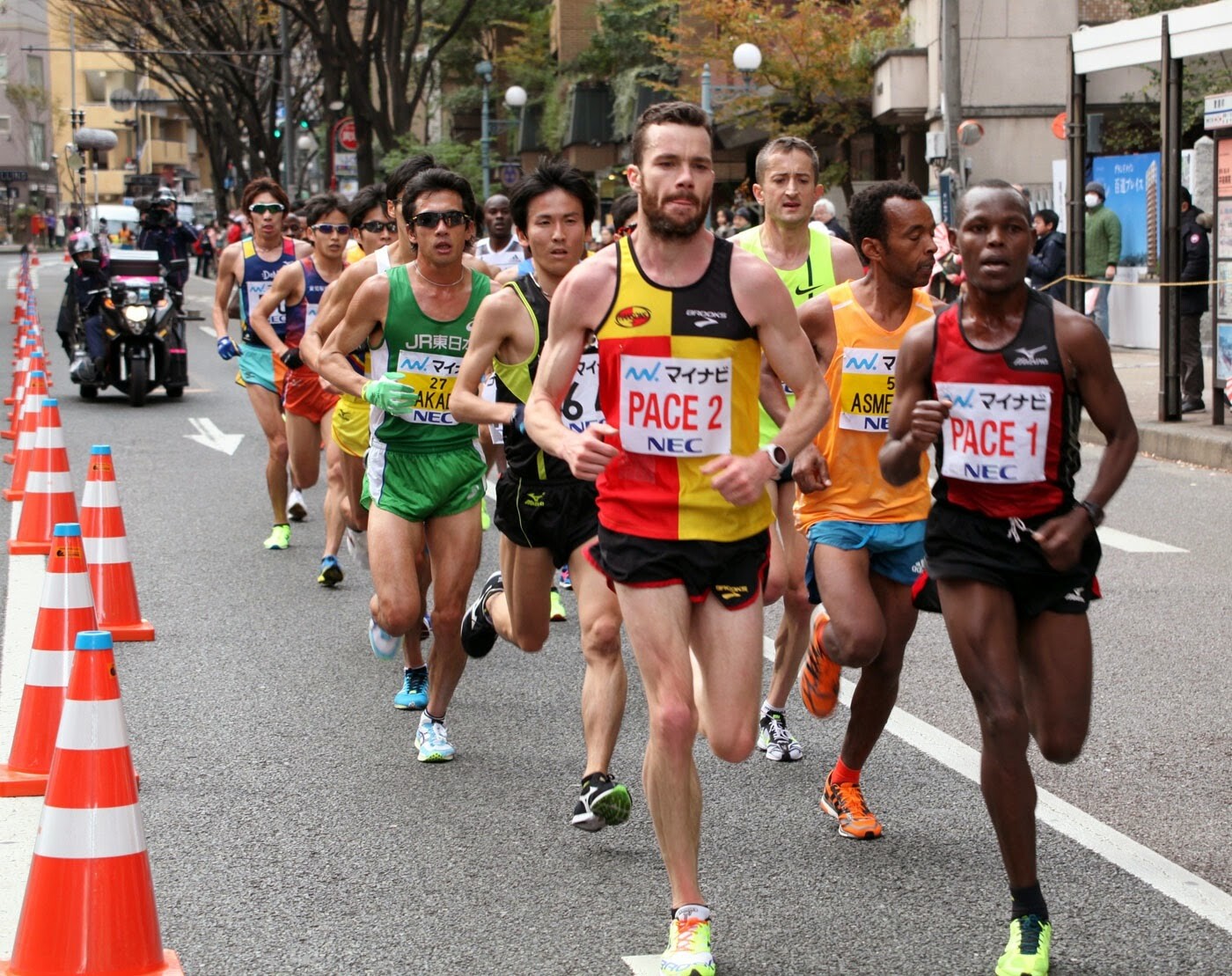
The pacers, led by 2012 Olympian Yuki Sato, directed the huge lead pack through 5km (14:47), 10km (29:39), 15km (44:30) and 20km (59:24) in what turned out to be something of a race of attrition. Yuta Shitara was one of the athletes to fall out of contention before the half-way stage; the former national marathon record-holder dropped out at 20km.
The half-way point was reached in 1:02:41, meaning an attack on the 2:05:18 course record was not out of the question. Simon Kariuki and Charles Wanjiku kept the pace going at the start of the second half, and 30km was reached in 1:29:08. But the pacemakers dropped out soon after, and the pace dramatically slowed down.
Nevertheless, the pack became strung out to almost a single file, and by 34km just Githae, James Rungaru, Hosoya and Ryu Takaku remained in contention. Soon after, Githae surged and Hosoya made a valiant effort to stay close but Githae gradually pulled away to win by 25 seconds in 2:07:51.
In third, Rungaru set a PB of 2:08:25, while fourth-placed Shohei Otsuka and Ryu Takaku and Daisuke Uekado in fifth and sixth respectively were just outside their PBs. Yuki Kawauchi, running his 12th Fukuoka Marathon, fittingly finished 12th in 2:11:33. He is planning on running the Hofu Marathon in two weeks’ time.
Looking back at Fukuoka's history
The Fukuoka International Marathon – which was awarded a World Athletics Heritage Plaque in 2019 – started in 1947 and is the second oldest marathon in Japan behind the now defunct Lake Biwa Marathon.
In its 75-year history, the world record was broken twice there – first in 1967 when Derek Clayton became the first runner to break 2:10 with 2:09:37, and then in 1981 when fellow Australian Rob de Castella ran 2:08:18.
De Castella isn’t the only global marathon champion to have contested the race over the years. Frank Shorter, the 1972 Olympic champion, notched up four consecutive Fukuoka Marathon victories between 1971 and 1974. 2000 Olympic champion Gezahegn Abera won in 1999, 2001 and 2002, while 1996 Olympic champion Josiah Thugwane won in 1997. The late Samuel Wanjiru, winner of the 2008 Olympic title, made a remarkable marathon debut in Fukuoka in 2007, winning in 2:06:39. And two-time world champion Jaoud Gharib won in 2010.
Numerous world record-holders have also competed in Fukuoka, including Haile Gebrselassie (winner in 2006), Belayneh Dinsamo (1990 winner) and Patrick Makau (2014 and 2015 champion).
Japanese runners have also enjoyed moments of victory in Fukuoka. Toshihiko Seko won four times (1978-1980 and 1983), and Takeyuki Nakayama won twice (1984 and 1987). During his 1987 run, Nakayama was on world record pace through 20km (58:37) and 35km until a heavy downpour in the closing stages slowed him down, and he eventually finished in 2:08:18.
When asked about the end of the Fukuoka Marathon, four-time winner Seko said: “It is like part of my history is being erased.”
Japan Running News, a leading authority on the sport in Japan, has produced a docu-film on the Fukuoka Marathon, entitled ‘Inside the Outside – When the World Came to Fukuoka’.
Leading results
1 Michael Githae (KEN) 2:07:512 Kyohei Hosoya (JPN) 2:08:163 James Rungaru (KEN) 2:08:254 Shohei Otsuka (JPN) 2:08:335 Ryu Takaku (JPN) 2:08:386 Daisuke Uekado (JPN) 2:08:567 Kohei Futaoka (JPN) 2:09:148 Masaya Taguchi (JPN) 2:09:359 Toshiki Sadakata (JPN) 2:10:3110 Takuma Kumagai (JPN) 2:10:4111 Ryota Komori (JPN) 2:11:3212 Yuki Kawauchi (JPN) 2:11:33
Login to leave a comment
Hosoya, Takaku and Uekado Will Lead Fukuoka International Marathon's Final Elite Field
With just over a month to go until its final edition, on Nov. 1 the organizers of the Fukuoka International Marathon held a press conference to announce its last elite field. For the second year in a row it's domestic-only, headlined by Kyohei Hosoya (Kurosaki Harima), 2:06:35 at the final Lake Biwa Marathon this past spring, Ryu Takaku (Yakult), 2:06:45 in Tokyo last year, and Daisuke Uekado (Otsuka Seiyaku), 2:06:54 in Tokyo just behind Takaku.
Out of a total field of 124, along with the 3 sub-2:07 guys there are 11 sub-2:08, 18 sub-2:09, 25 sub-2:10 and many more at the sub-2:11 and sub-2:12 levels. It's an even bigger front end than was on the entry list at the record-breaking final Lake Biwa Marathon earlier this year, and for a domestic field it's one worthy of sending off Fukuoka's 75-year history. Last year's winner Yuya Yoshida (GMO), who was scheduled to run October's Tokyo Marathon before it was postponed until March, is absent.
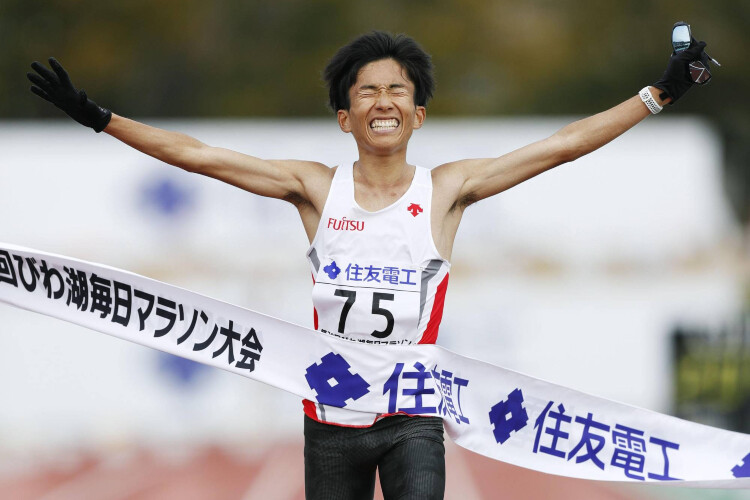
With Japan still holding tight to its border closures the international component of the field is covered by Japan-based internationals Michael Githae (Suzuki), 2:08:17 in Fukuoka last year, Mongolian NR holder Ser-Od Bat-Ochir (Mie T&F Assoc.) past Marugame Half winner Paul Kuira (JR Higashi Nihon), James Gitahi Rungaru (Chuo Hatsujo), Daniel Muiva Kitonyi (Track Tokyo), and the debuting Nicholas Kosimbei (YKK).
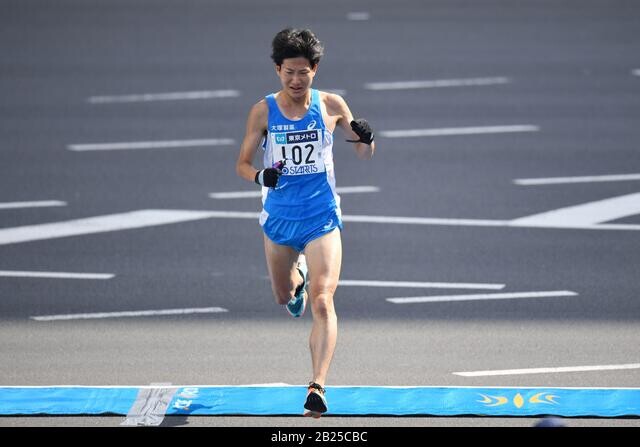
complete field listing
Kyohei Hosoya (Kurosaki Hariima) - 2:06:35 (Lake Biwa 2021)
Ryu Takaku (Yakult) - 2:06:45 (Tokyo 2020)
Daisuke Uekado (Otsuka Seiyaku) - 2:06:54 (Tokyo 2020)
Toshiki Sadakata (Mitsubishi Juko) - 2:07:05 (Tokyo 2020)
Shuho Dairokuno (Asahi Kasei) - 2:07:12 (Lake Biwa 2021)
Shin Kimura (Honda) - 2:07:20 (Tokyo 2020)
Yuki Kawauchi (ANDS) - 2:07:27 (Lake Biwa 2021)
Shohei Otsuka (Kyudenko) - 2:07:38 (Fukuoka Int'l 2020)
Masaru Aoki (Kanebo) - 2:07:40 (Lake Biwa 2021)
Yuta Shitara (Honda) - 2:07:45 (Tokyo 2020)
Atsumi Ashiwa (Honda) - 2:07:54 (Lake Biwa 2021)
Natsuki Terada (JR Higashi Nihon) - 2:08:03 (Fukuoka Int'l 2020)
Kento Otsu (Toyota Kyushu) - 2:08:15 (Lake Biwa 2021)
Michael Githae (Kenya/Suzuki) - 2:08:17 (Fukuoka Int'l 2020)
Junichi Tsubouchi (Kurosaki Harima) - 2:08:35 (Lake Biwa 2021)
Yuji Iwata (Mitsubishi Juko) - 2:08:45 (Tokyo 2020)
Kazuma Kubo (Nishitetsu) - 2:08:53 (Lake Biwa 2021)
Kenta Murayama (Asahi Kasei) - 2:08:56 (Berlin 2019)
Chihiro Miyawaki (Toyota) - 2:09:04 (Tokyo 2020)
Kohei Futaoka (Chudenko) - 2:09:15 (Beppu-Oita 2019)
Shoma Yamamoto (NTT Nishi Nihon) - 2:09:18 (Lake Biwa 2020)
Ser-Od Bat-Ochir (Mongolia/Mie T&F Assoc.) - 2:09:26 (Lake Biwa 2021)
Yoshiki Takenouchi (NTT Nishi Nihon) - 2:09:31 (Fukuoka Int'l 2020)
Takahiro Nakamura (Kyocera Kagoshima) - 2:09:40 (Lake Biwa 2021)
Paul Kuira (Kenya/JR Higashi Nihon) - 2:09:57 (Fukuoka Int'l 2020)
Jo Fukuda (NN Running Team) - 2:10:32 (Beppu-Oita 2020)
Ryota Komori (NTN) - 2:10:33 (Lake Biwa 2021)
Yuki Nakamura (Sumitomo Denko) - 2:10:47 (Lake Biwa 2021)
Takuma Shibata (Komori Corp.) - 2:10:48 (Hofu 2020)
Koshiro Hirata (SG Holdings) - 2:10:50 (Lake Biwa 2021)
Shota Saito (JFE Steel) - 2:10:50 (Beppu-Oita 2020)
Asuka Tanaka (Runlife) - 2:11:07 (Fukuoka Int'l 2020)
Taiki Suzuki (Eldoreso) - 2:12:09 (Fukuoka Int'l 2019)
Keita Shitara (Hitachi Butsuryu) - 2:12:13 (Tokyo 2020)
James Gitahi Rungaru (Kenya/Chuo Hatsujo) - 2:12:54 (Hofu 2020)
Daniel Muiva Kitonyi (Kenya/Track Tokyo) - 2:14:41 (Nagano 2019)
Debut
Nicholas Mboroto Kosimbei (Kenya/YKK) - 1:00:21 (Lisbon Half 2019).
by Brett Larner
Login to leave a comment
Fukuoka Marathon
The Fukuoka International Open Marathon Championship is one of the longest running races in Japan, it is alsoan international men’s marathon race established in 1947. The course record is held by Tsegaye Kebede of Ethiopia, running 2:05:18 in 2009. Frank Shorter won first straight years from 1971 to 1974. Derek Clayton set the World Record here in 1967 running 2:09:37. ...
more...Kenya’s Reuben Kipyego and Ruth Chepngetich will target Chicago Marathon crowns
Reuben Kipyego and Ruth Chepngetich head the fields for the Bank of America Chicago Marathon on Sunday (10), with Sara Hall and Galen Rupp leading US hopes at the World Athletics Elite Platinum Label road race.
After action in Berlin and London in recent weeks, Chicago is the next race in a busy period of major marathons and the Boston event follows just one day later. The weather in Chicago looks set to be warm, with temperatures of around 21°C expected for the start of the elite races at 7:30am local time.
The last edition of the Chicago Marathon in 2019 saw a world record fall as Kenya’s Brigid Kosgei clocked 2:14:04 to take 81 seconds from Paula Radcliffe’s 2003 mark. This time her compatriots Chepngetich, who won the 2019 world title, and Vivian Kiplagat are among the athletes in the spotlight.
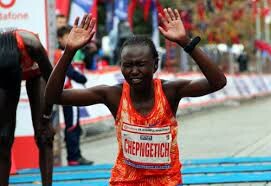
Chepngetich sits fourth on the women’s marathon all-time list thanks to the 2:17:08 PB she set when winning in Dubai in 2019 and she ran a world half marathon record in Istanbul in April with 1:04:02. The 27-year-old was unable to finish the Olympic marathon in Tokyo but is looking forward to her US debut race in Chicago.
“I have never raced in the States and making my debut in such a great race like the Bank of America Chicago Marathon is more than a dream to me,” she said. “I will give all myself trying to run as fast as possible.”
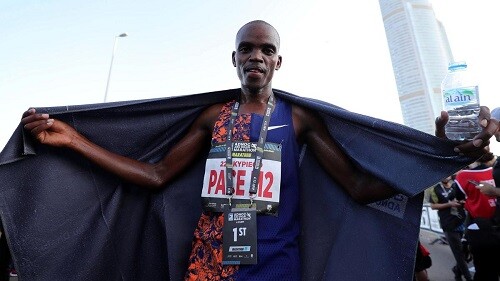
Hall will be among those looking to challenge her. The US athlete beat Chepngetich at last year’s London Marathon, as the pair finished second and third respectively behind Kosgei, and Hall went on to run a PB of 2:20:32 in Arizona a couple of months later. Now she has her eye on Deena Kastor’s 2:19:36 US record, should the conditions allow.
“When I thought about where I wanted to chase the American record, I thought it would be more exciting to do it at home, in the US, and Chicago is such an epic race,” she said.
The other sub-2:25 women in the field are Kiplagat, the USA’s Keira D'Amato and Ethiopia’s Meseret Belete. Kiplagat, who ran her marathon PB of 2:21:11 in 2019, clocked 2:39:18 in Eldoret in June but showed her current form with a personal best performance in the half marathon of 1:06:07 in Copenhagen last month. Like Hall, D'Amato also ran a PB in Arizona in December, clocking 2:22:56, while 22-year-old Belete – who was sixth at the 2018 World Half Marathon Championships and ran a world U20 best of 1:07:51 later that year – has a marathon PB of 2:24:54 set when finishing fourth in Houston last year.
Among those joining them on the start line will be the USA’s Emma Bates, Diane Nukuri and Lindsay Flanagan.
Kipyego ready to turn up the heat
With his PB of 2:03:55 set at the Milan Marathon in May, Kipyego goes into the Chicago race as the second fastest man in 2021. The 25-year-old made his marathon debut in Buenos Aires in 2019, clocking 2:05:18, and later that year he improved to 2:04:40 to win in Abu Dhabi, despite having started the race as a pacemaker. He also seems unfazed by the warmer than expected temperatures, simply replying: ‘No problem’ at the pre-race press conference when asked about the weather.
Ethiopia’s Seifu Tura, meanwhile, explained how he is not as comfortable in the heat but he will go into the race looking to build on the 2:04:29 PB he set when finishing fourth in that same Milan Marathon in May. He also has experience of the Chicago event, having finished sixth in 2019 in 2:08:35.
Rupp leads US hopes as the 2016 Olympic bronze medallist returns to action after his eighth place in the Tokyo Olympic marathon nine weeks ago and third-place finish in the Great North Run half marathon in 1:01:52 last month. Eighth fastest among the entries, his PB of 2:06:07 was set in Prague in 2018 but he will be looking to regain the crown he claimed in 2017.
Kenya’s Dickson Chumba is also a former Chicago winner, having triumphed in 2015, and he set his PB of 2:04:32 in the same city the year before that. The fourth sub-2:05 runner in the field is Kengo Suzuki, who broke the Japanese record with his 2:04:56 to win the Lake Biwa Marathon in February.
Kenya’s Eric Kiptanui is also one to watch. Having helped to pace world record-holder Eliud Kipchoge in the past, the 58:42 half marathon runner made his own marathon debut last year and improved to 2:05:47 to win in Siena in April.
“I was so happy to run 2:06 for my first marathon,” he told NN Running Team. “What it proved to me was, yes, I was in good shape but that I had the mentality to perform over the marathon distance.” Looking ahead to Chicago, he added: “I aim to run 2:03/2:04 but my first priority is to win the race."
Ethiopia’s Chalu Deso and Shifera Tamru have respective bests of 2:04:53 and 2:05:18, while Ian Butler, who is coached by former world record-holder Steve Jones and balances his running with his job as a teacher, is the second-fastest US runner in the field with a PB of 2:09:45 set in Arizona last year.
by Jess Whittington for World Athletics
Login to leave a comment
Bank of America Chicago
Running the Bank of America Chicago Marathon is the pinnacle of achievement for elite athletes and everyday runners alike. On race day, runners from all 50 states and more than 100 countries will set out to accomplish a personal dream by reaching the finish line in Grant Park. The Bank of America Chicago Marathon is known for its flat and...
more...Kenenisa Bekele will lead the entries for Sunday’s BMW Berlin Marathon
When Kenenisa Bekele lines up for the BMW Berlin Marathon this weekend (Sept 26) it marks the beginning of an unprecedented period of marathon racing. Due to Covid-related postponements, five of the six Marathon Majors will be staged within a 42-day period. If you’re a fan of the classic 26.2-mile distance, you are in for a feast.
Bekele is clearly excited by the prospect as he is racing in not just one but two of these races. After Berlin on Sunday he will attempt to recover and re-boot before tackling the New York City Marathon in early November.
Here is how the autumn marathon period plays out…
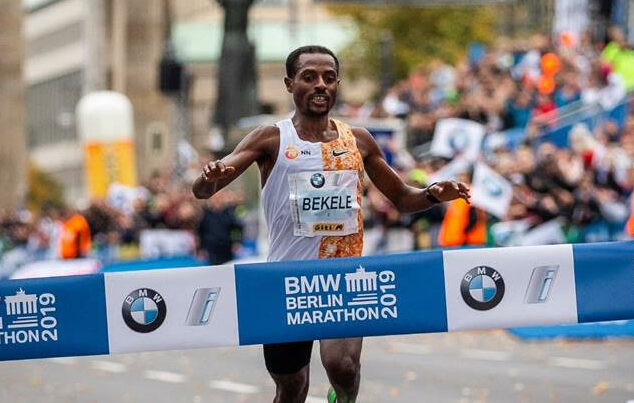
Sept 26 – BerlinOct 3 – LondonOct 10 – ChicagoOct 11 – BostonNov 7 – New York
Tokyo Marathon, which is also one of the Marathon Majors, was due to take place on October 17 too, but has been called off due to the pandemic. However the TCS Amsterdam Marathon is still on October 17 – and this Dutch race often sees fast times.
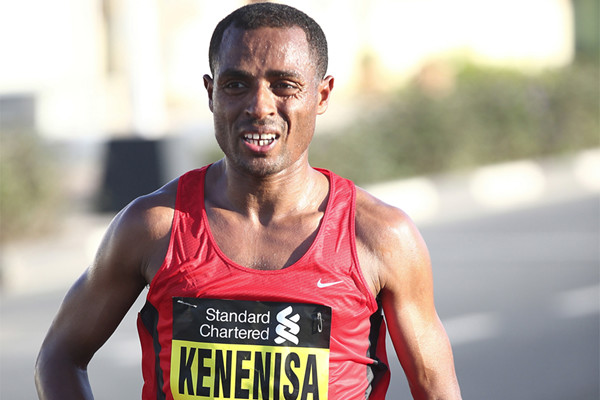
First comes Berlin, though. Bekele has not raced since March last year and during this time he has seen his world 5000m and 10,000m records fall to Joshua Cheptegei. Last October he was due to race in London but withdrew on the eve of the race with a calf injury. He is now aged 39 but don’t write him off. People thought he was a spent force in 2019 but he came within two seconds of the world record with 2:01:41 in Berlin.
“I will come back with good energy and motivation,” says Bekele. “The last race in Berlin motivated me a lot, so I hope I will fulfil my plan this year.”
Bekele will be among around 25,000 runners in Berlin as mass participation road running emerges from the pandemic. His opposition on Sunday includes Guye Adola, an Ethiopian who ran the world’s fastest ever debut marathon of 2:03:46 in Berlin four years ago but has struggled to improve since.
There is also Eliud Kiptanui of Kenya, who has run 2:05:21, plus a further eight men who have run inside 2:07 such as Philemon Kacheran and Festus Talam of Kenya, Olika Adugna and Tadu Abate of Ethiopia, plus Hidekazu Hijikata of Japan.
Adugna won his debut marathon in Dubai in 2:06:15 while Hijikata took the Lake Biwa Marathon victory earlier this year.
The women’s race, meanwhile, includes Hiwot Gebrekidan, who won the Milan Marathon this year in 2:19:35, plus fellow Ethiopian Shure Demise, together with Kenyans Fancy Chemutai and Purity Rionoripo.
Just seven days after Berlin, the Virgin Money London Marathon takes place with the fields led by women’s world record-holder Brigid Kosgei together with fellow Kenyan Joyciline Jepkosgei and Ethiopians Roza Dereje and Birhane Dibaba.
The men’s race in London features Ethiopians Shura Kitata, Mosinet Geremew and Birhanu Legese plus Kenyans Titus Ekiru and Evans Chebet, whereas Brits like Charlotte Purdue and Jonny Mellor will create plenty of home interest.
Chicago includes world champion Ruth Chepngetich of Kenya in the women’s race alongside American hope Sarah Hall, while another home nation hope, Galen Rupp, takes on Ethiopians Getaneh Molla and Seifu Tura in the men’s race.
by Athletics Weekly
Login to leave a comment
BMW Berlin Marathon
The story of the BERLIN-MARATHON is a story of the development of road running. When the first BERLIN-MARATHON was started on 13th October 1974 on a minor road next to the stadium of the organisers‘ club SC Charlottenburg Berlin 286 athletes had entered. The first winners were runners from Berlin: Günter Hallas (2:44:53), who still runs the BERLIN-MARATHON today, and...
more...A Strong Japanese Quartet Of Elite Runners In Vienna’s Comeback Marathon
With a strong quartet of Japanese elite runners headed by Kento Kikutani the Vienna City Marathon will go ahead for the first time since April 2019 on Sunday. Austria’s major road race event sees its 38th edition and organizers have registered around 26,000 entries. This includes races at shorter distances. Around 6,000 marathon runners will compete in Vienna on Sunday. The Vienna City Marathon will be the first major marathon worldwide with a strong international elite field and a mass race since the start of the Corona pandemic. It is a World Athletics Label Road Race. The marathon will be streamed live from 8.30 am on Sunday at: Vienna-Marathon.com.
It is the first time in the history of the Vienna City Marathon that a Japanese male elite team will be on the start line. And partly this development has to do with Eliud Kipchoge. When the Kenyan Olympic Champion broke the two hour barrier in the Austrian capital two years ago the world took notice of a unique running spectacle co-organized by the Vienna City Marathon. Back in Japan Kento Kikutani, Yuta Koyama, Koki Yoshioka and Daji Kawai all watched Kipchoge’s race through Vienna’s Prater Park, which is also part of the marathon course.
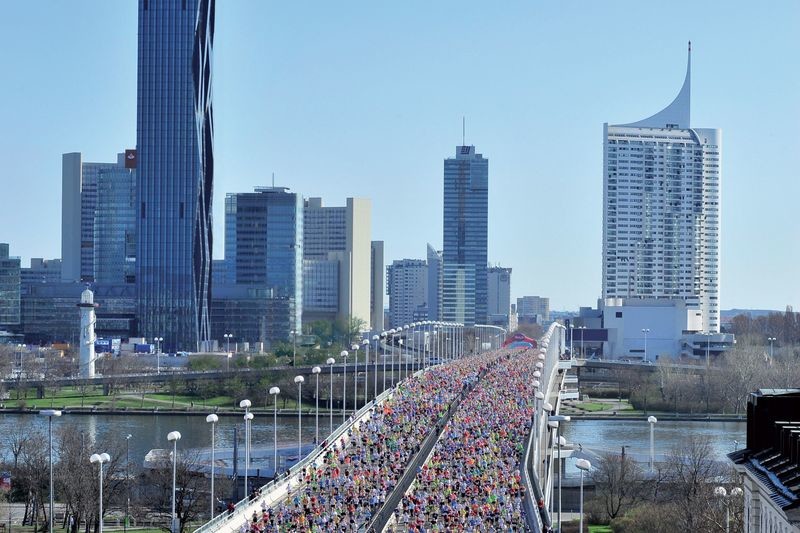
“I was watching the live stream. This was a huge effort by Kipchoge. I think that good weather conditions in Vienna had a big influence on the result,“ said Kento Kikutani, who has a personal best of 2:07:26 from Lake Biwa this year. He is the fastest of the Japanese quartet and wants to improve his personal best on Sunday: „I will follow to pacers and then I want to go for the win after the 30k point“, said the 27 year-old, who then hold up his watch during the press conference: “At least I already have the same watch Kipchoge used in Vienna!“
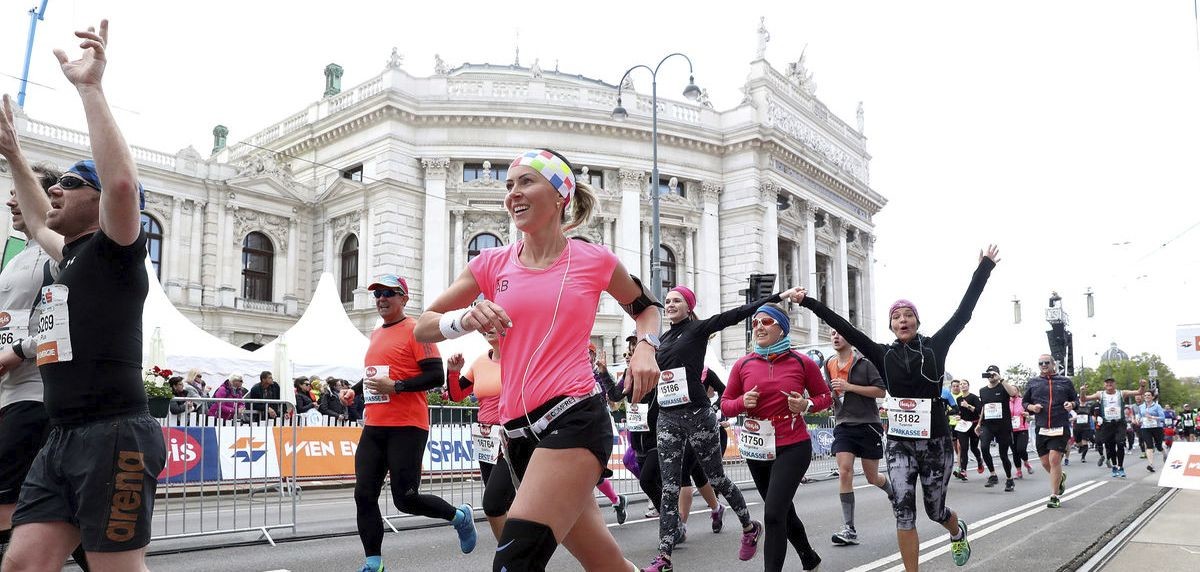
Yuta Koyama has a personal best of 2:08:46 and is the second fastest of the four Japanese. He is also ready for a fast race and possibly a personal best. „My plan is to go with the leading group,“ said Koyama, who also clocked his PB in Lake Biwa this year. „Vienna is a good opportunity for me to race despite the corona pandemic.“
Koki Yoshioka and Daji Kawai feature personal records of 2:10:13 ans 2:10:50 respectively. Both target their personal bests on Sunday. “I really appreciate that I am able to run here during the pandemic. My goal is to go under 2:10,“ said Yoshioka while Kawai stated: “Vienna is a traditional race and I am happy to run here. As there are pacers, I think the race will have a good pace. I want to stay calm and will then decide how to react.“
“This will be the most important Vienna City Marathon since the first edition back in 1984,“ said Race Director Wolfgang Konrad. “On Sunday we will send a strong message as the first major international marathon worldwide since the start of the pandemic.“ He compares the situation to when he was an elite runner back in the 80ies. “After a fine Olympic season I was injured in a car crash in 1980. When I could finally start running again I had to stop after two kilometers. Four months later I ran a PB,“ recalled the former steeplechaser, who achieved a fine PB of 8:17.22 in 1982. “Back then it was just about me, now it is about everyone. We were desperate to bring the race back on as early as possible. It was a disaster for us when we had to cancel on short notice in 2020. But we continued to work hard to make the race possible again.“
“We want to stage a great race that stands for joy and motivation. With this event we also want to say thank you to all those who have supported us during this very difficult time," said Kathrin Widu, one of the Managing Directors of the Vienna City Marathon. She explained that runners from 126 nations entered the race. “Most of the foreigners are obviously from EU countries.“ While over 90 % of all runners are vaccinated organizers have implemented strict hygiene rules. Everyone needs to provide a negative Corona test to receive the bib number.
Fellow Managing Director Gerhard Wehr said: “We have never been out of touch regarding organizing races. Under most difficult situations we did stage a number of smaller races whenever possible,“ said Gerhard Wehr. “We are now experiencing a very strong togetherness from all those involved. Everyone wants the Vienna City Marathon to come back.“
More information is available at: Vienna-Marathon.com.
Login to leave a comment
Vienna City Marathon
More than 41,000 runners from over 110 nations take part in the Vienna City Marathon, cheered on by hundreds of thousands of spectators. From the start at UN City to the magnificent finish on the Heldenplatz, the excitement will never miss a beat. In recent years the Vienna City Marathon has succeeded in creating a unique position as a marathon...
more...Lake Biwa Mainichi Marathon organizers look forward
The 76th Lake Biwa Mainichi Marathon race held on February 28 this year concluded as the best edition ever held, with the establishment of a new Japanese men’s national record and the first ever performance of under 2 hours 4 minutes by an Asian athlete.
The Lake Biwa Mainichi Marathon boasted the longest history of any marathon in Japan. It has traditionally been a men-only elite race with approximately 300 entries each year. In order to catch up with the trends of the world’s major marathon races the race organizers have decided to move the race, leaving the beloved course in Otsu city in Shiga prefecture and relocating to Osaka, using the course of the present Osaka Marathon, and combining the elite race with the mass participation Osaka Marathon.
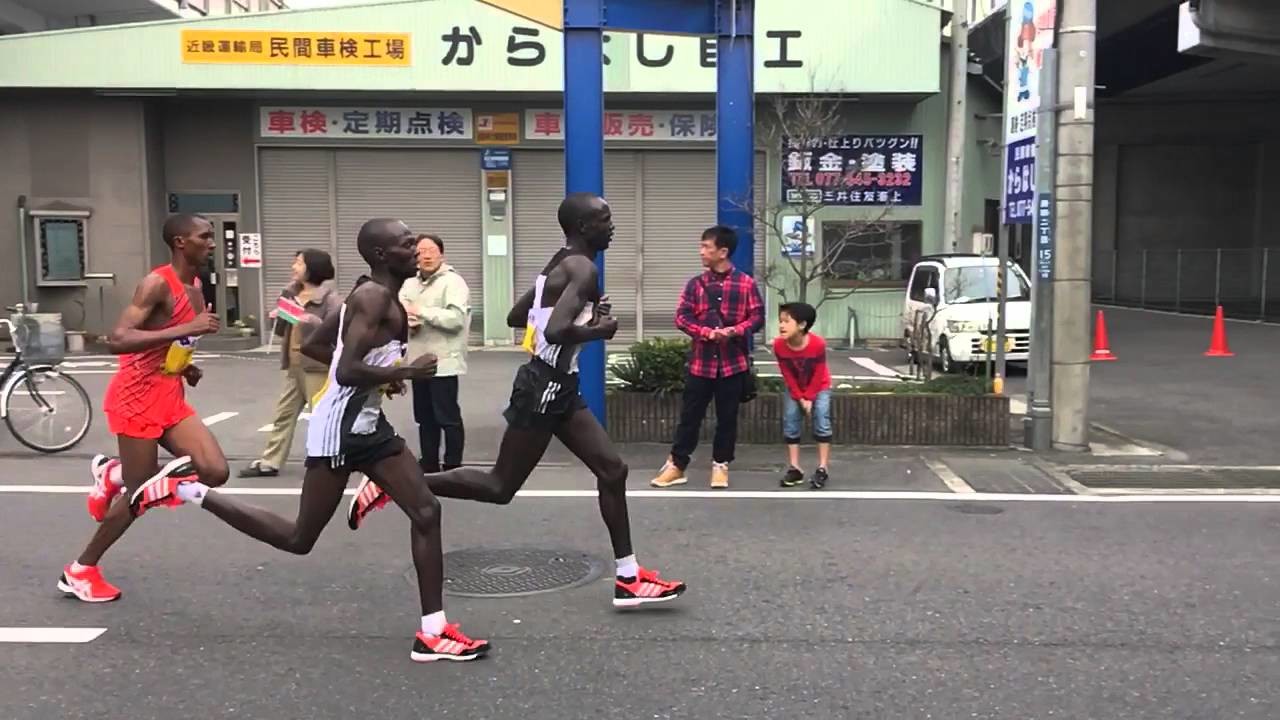
The 10th Osaka Marathon was to be held in November 2020 with 32,000 participants anticipated but had to be cancelled due to the COVID-19 pandemic. The organization of the event itself is perfect but until 2019 Osaka Marathon had not had attracted serious elite athletes.
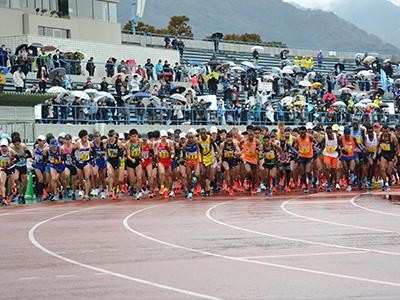
On February 27, 2022 a new event had been planned, combining the 10th Osaka Marathon and the 77th Lake Biwa Mainichi Marathon with a total of 35,000 runners provided. Because of the continuing impact of the COVID-19 virus this number has now been revised to 20,000.
The elite race level of the Lake Biwa Mainichi Marathon will be maintained on the Osaka Marathon course route. The Japan Association of Athletics Federations (JAAF), the Osaka Prefecture and the Mainichi Newspapers will be the joint organizers of the race, and NHK will continue to broadcast on TV, providing live coverage in Japan and overseas.
The invited athletes will be sufficient in quality and quantity to retain a Gold Label. The Mainichi Newspapers will remain responsible for the management of the elite athletes.
by AIMS
Login to leave a comment
Osaka Marathon
In 2022 the Lake Biwa Mainichi Marathon and Osaka Marathon were held together. For 2023 the name of the marathon will be Osaka and both men and women can run the race. The original male-only competition was first held in 1946 and, having taken place every year since then, it is Japan's oldest annual marathon race. The early editions of...
more...Tokyo Marathon October 17 will only be open to residents of Japan
Organizers of the Tokyo Marathon have announced that the upcoming edition of their race, which is set for October 17, will only be open to residents of Japan. The country’s COVID-19 restrictions are still quite strict, and there is no word on when they might be eased, so organizers made the difficult decision to block any international runners from travelling to Japan and competing in the marathon. International athletes who were registered for the Tokyo Marathon will have their entries deferred until the 2023 event.
Earlier this year, Tokyo Marathon organizers set their race date, moving the event from its traditional late February or early March run date to the fall. The run wouldn’t have worked so early in the year due to the ongoing COVID-19 pandemic, but they hoped it would be able to go ahead later in 2021. At the moment, the race is still a go, but it will be a Japan-only event.
When organizers decided on the October race date, they also noted that the event capacity would be lowered to 25,000 runners from the usual field size of around 38,000. Nothing has been published regarding the race capacity in its new field format.
Japan has been able to host many big road and track races throughout the pandemic, but they’ve mostly been for runners already living within the country’s borders. The Tokyo Marathon may be the biggest Japanese race to bar international competitors, but it’s certainly not the first. The pandemic forced many popular races to only welcome citizens and residents of Japan, including last year’s Fukuoka International Marathon and the 2021 Lake Biwa, Osaka International Women’s and Nagoya Women’s marathons.
Unfortunately for anyone hoping to run in Tokyo, they will have to wait more than a year to do so, as international entries aren’t being deferred to 2022, but 2023.
by Ben Snider-McGrath
Login to leave a comment
Tokyo Marathon
The Tokyo Marathon is a world-renowned annual marathon held in Tokyo, Japan. As one of the prestigious Abbott World Marathon Majors, it attracts elite and amateur runners from around the globe. The race holds World Athletics Platinum Label status, recognizing its high competitive standards, top-tier organization, and international appeal. Sponsored by Tokyo Metro, the Tokyo Marathon has grown into one...
more...NN Running has announced its elite field for Mission Marathon
Set to run in the Netherlands on April 18, Eliud Kipchoge will headline the race of about 60 athletes.
The fields for the NN Mission Marathon have been released, and the world finally knows who will toe the start line with Eliud Kipchoge. The races are set to be run in Enschede, the Netherlands, on April 18, and fields of 23 women and 35 men will line up to compete. Kipchoge is the clear favourite for the win, but second place in the men’s race and first place in the women’s are both anybody’s to claim, which will make for a couple of exciting and dramatic competitions.
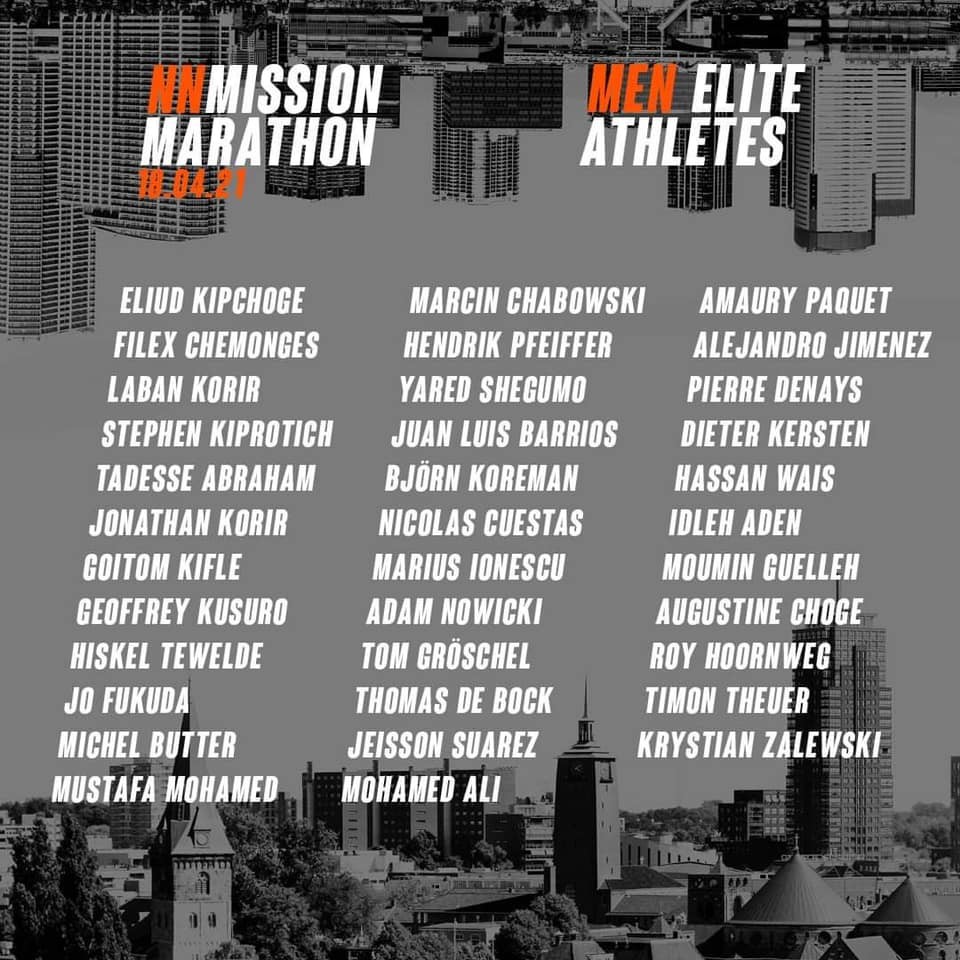
The men’s race
In the men’s race, the pre-race seed times aren’t even close, and there’s really no debate as to who is most likely to win. Kipchoge owns the world record in the marathon with his PB of 2:01:39, and he has also run an unofficial record of 1:59:40. While many of the other runners racing the NN Mission Marathon are looking to qualify for the Tokyo Games or prove that they deserve to be chosen for their national Olympic teams, Kipchoge has a simpler and less stressful reason to run: he needs to bounce back from his poor race at the London Marathon last fall.
He’s still a heavy favourite heading into the Tokyo Games, but his poor 2:06:49 showing in October proved that he is human, and for the first time in years, his competitors might seriously believe they have a chance to beat him. A great race in the Netherlands can boost Kipchoge’s confidence while also knocking down that of his rivals ahead of the Olympics.
The next fastest PB in the men’s field belongs to Felix Chemonges, who owns the Ugandan national marathon record of 2:05:12 (which he ran at the Scotiabank Toronto Waterfront Marathon in 2019). Chemonges hasn’t raced since March 2020, though, and his last result was a sub-par 2:10:08 run at the Lake Biwa Marathon in Japan.
Only one other man in the field, Kenya’s Laban Korir, has run a sub-2:06 marathon in his career, and his 2:05:54 PB puts him at third-best in the men’s race. Out of the 35 men set to race the NN Mission Marathon, 17 have run faster than the Olympic standard of 2:11:30, and 11 runners from that group have broken 2:10.
It’d be safe to bet on Kipchoge for the overall win in the Netherlands, but with so many other runners hovering around the same seed times, the battle for second and third place — plus the mad dash to cross the finish before the clock hits 2:11:30 — will produce must-watch coverage.
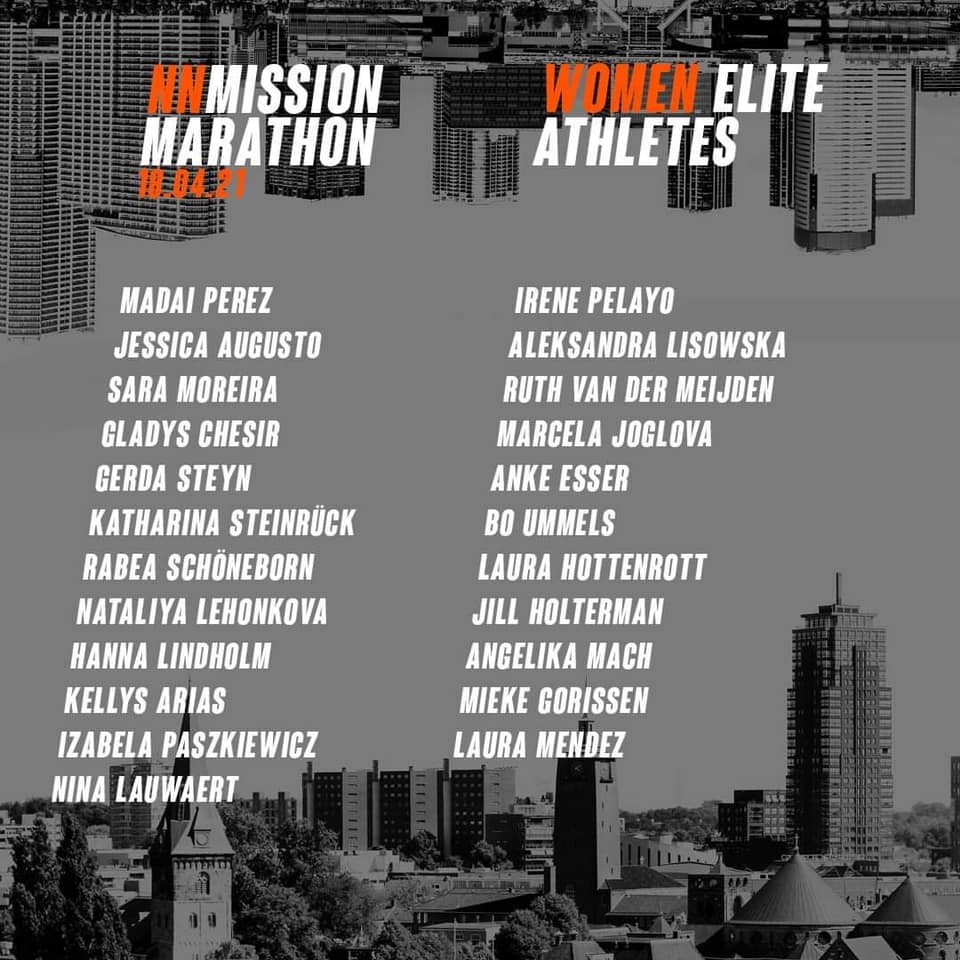
The women’s race has the potential to be much more competitive than the men’s when it comes to the overall win. Mexican marathon record holder Madai Perez has the fastest PB of any of the women in the field. The only thing is that she ran her national record of 2:22:59 all the way back in 2006, and the last time she broke 2:30 came in Chicago in 2017, when she ran 2:24:44. She certainly could take the win in the Netherlands, but her seed time is a bit misleading considering how long ago she ran it.
Next up are Jessica Augusto and Sara Moreira, a couple of Portuguese runners. Augusto owns a PB of 2:24:25, just ahead of Moreira’s career best of 2:24:49. Both of these women have posted tremendous times in the past, but neither has completed a marathon in recent years. Augusto’s last finish came in 2017, and she has one DNF since then.
Moreira has had an even worse few years, and her last finish came in 2015. Since then, she has DNFed three times, including in the marathon at the Rio Olympics. In 2015, though, she placed second at the Prague Marathon and fourth at the New York City Marathon. The next athlete on the start list is Kenya’s Gladys Chesir, who has a PB of 2:24:51, but like her Portuguese competitors, she hasn’t completed a marathon in years, and her last official finish was in 2017.
In total, nine of the 23 women in the field have beaten the Olympic standard of 2:29:30, with several others knocking at the door of sub-2:30 results. Like the men’s race, the women’s run should be an exciting affair, and it’s an event no running fan will want to miss.
by Ben Snider-McGrath
Login to leave a comment
NN Mission Marathon
Eliud Kipchoge will bid to resume winning ways in his last race before the Tokyo games with around 70 runners looking to make the Olympic qualification standard on April 18th in Twente.After suffering a rare marathon defeat in London last October, reigning Olympic champion Eliud Kipchoge makes his return at the NN Mission Marathon in 2021. It is set to...
more...2021 Fukuoka International Marathon will be Its final running
The prestigious Fukuoka International Open Marathon Championship will be discontinued after the 75th edition in 2021 due in part to a lack of sponsors, a source close to the matter said Friday.
The international men's marathon held in the southwest Japan city is one of the longest-running footraces in Japan. First held in 1947 in Kumamoto Prefecture, it moved to Fukuoka permanently in 1959.
The marathon has served as a qualifier for Olympics and world championships.
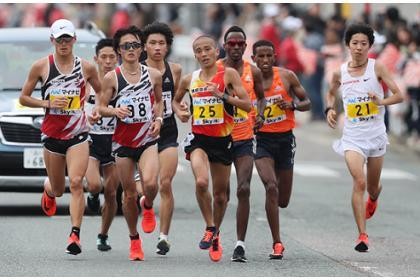
The marathon is one of six events, each one of the world's oldest footraces, that received a World Athletics heritage award in October.
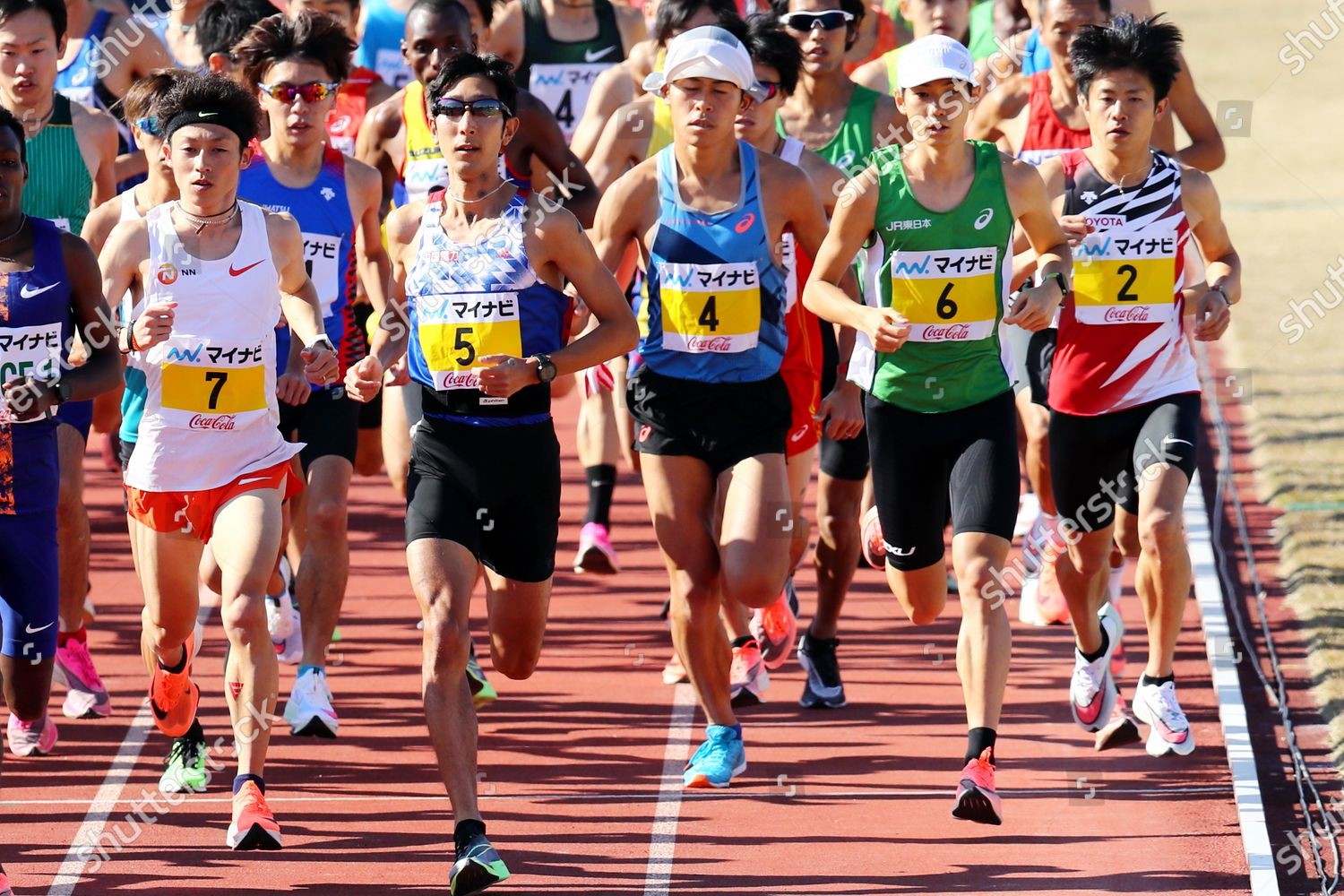
Some of Japan's greatest racing moments, including those involving Olympians Toshihiko Seko and twin athletes Shigeru So and Takeshi So in the 1970s and 1980s, have been witnessed at the Fukuoka marathon.
The Lake Biwa Mainichi Marathon, considered the oldest marathon in Japan, will be absorbed into the Osaka Marathon from 2022. It was run on the banks of the Shiga Prefecture lake for the 76th time in February.
Login to leave a comment
Fukuoka Marathon
The Fukuoka International Open Marathon Championship is one of the longest running races in Japan, it is alsoan international men’s marathon race established in 1947. The course record is held by Tsegaye Kebede of Ethiopia, running 2:05:18 in 2009. Frank Shorter won first straight years from 1971 to 1974. Derek Clayton set the World Record here in 1967 running 2:09:37. ...
more...2021 Tokyo Marathon plans to go ahead in October with reduced field of 25,000
The organizers of the Tokyo Marathon held a special board meeting Mar. 19 to discuss plans for staging this year's race on Oct. 17. As a measure to combat the spread of the coronavirus, the decision was made to reduce the field size from 38,000 to 25,000 participants. The race's slogan will be "The Day When Tokyo Once Again Becomes One." Entries will be open Mar. 22 to 31.
Rough guidelines were also established for the process by which the final decision on whether the race can go ahead will be made. If a state of emergency is declared within a month prior to the marathon, it will be cancelled at that time. "Holding a safe and secure event is our number one priority," commented an official. International entries will be accepted.
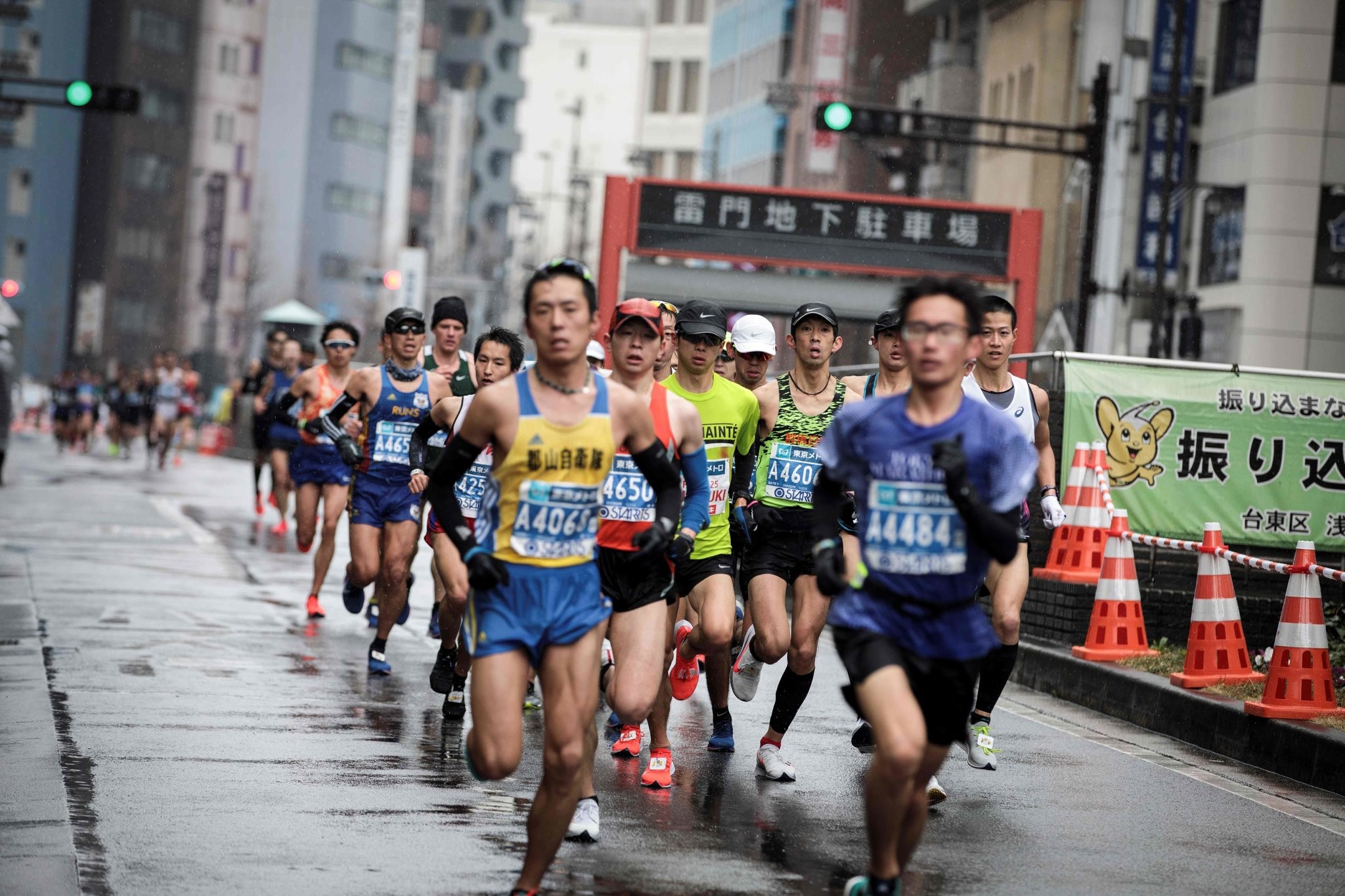
Because the 2020 edition of the race was held with only elite athletes, mass-participation runners were given the option of transferring their entries to either the 2021 or 2022 editions. Roughly 7,000 people opted to run 2021, meaning about 18,000 further entries will be accepted. Part of the course will be changed, and there will also be an uncertified 10.7 km run.
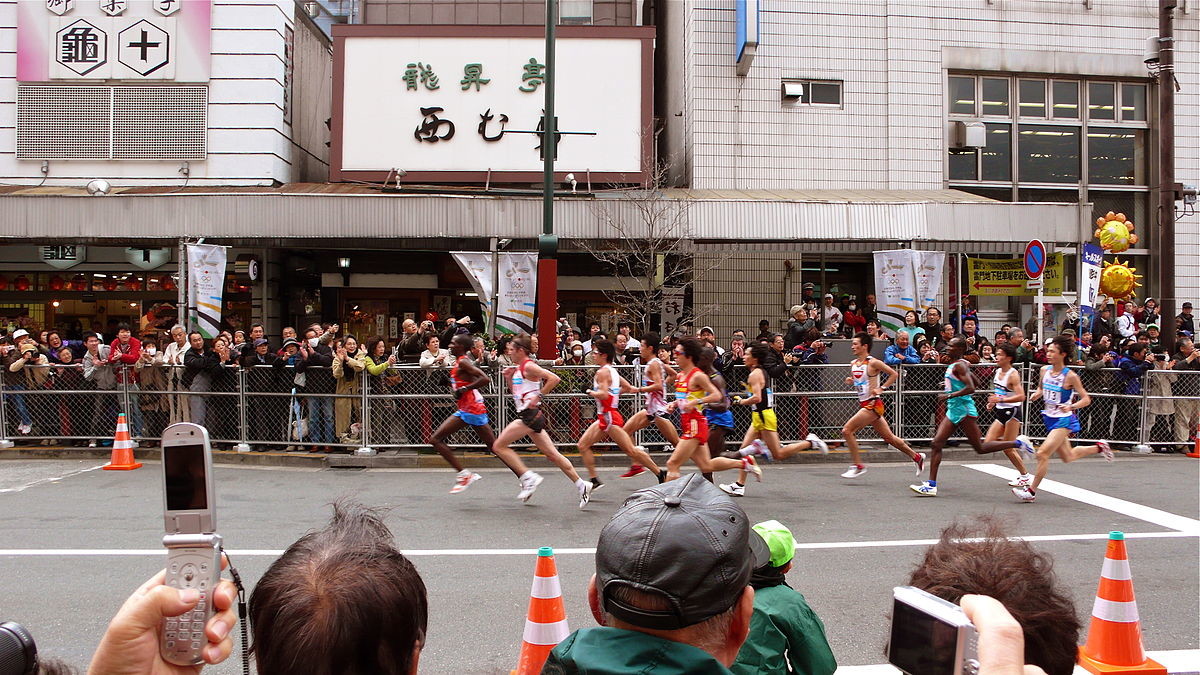
This year's Tokyo Marathon was originally scheduled for Mar. 7, but amid the ongoing coronavirus crisis organizers decided last October to postpone it., prioritizing holding it close to its usual capacity over holding it on-schedule with a drastically reduced field again.
Because Tokyo was rescheduled for October when elite marathons are scheduled to take place around the world and Japanese athletes are in the middle of ekiden season, it is expected that there will be problems with attracting elite athletes from abroad and within Japan. Race director Tadaaki Hayano commented, "With the Paris Olympics on the horizon I hope that young athletes and newcomers will come into sight." With Kengo Suzuki (Fujitsu) having set a new men's national record at the Lake Biwa Marathon last month at age 25, hopes are high for a race where the next generation will shine.
by Brett Larner
Login to leave a comment
Tokyo Marathon
The Tokyo Marathon is a world-renowned annual marathon held in Tokyo, Japan. As one of the prestigious Abbott World Marathon Majors, it attracts elite and amateur runners from around the globe. The race holds World Athletics Platinum Label status, recognizing its high competitive standards, top-tier organization, and international appeal. Sponsored by Tokyo Metro, the Tokyo Marathon has grown into one...
more...Japanese Yuki Kawauchi has become the first person to run 100 sub-2:20 marathons
Guinness World Records (GWR) has recognized Japanese marathoner Yuki Kawauchi for becoming the first person to run 100 sub-2:20 marathons. Kawauchi hit triple digits at Japan’s Hofu Marathon in December, where he ran to a second-place finish in 2:10:26, and he recently posted his 101st sub-2:20 result after running a PB of 2:07:27 at Sunday’s Lake Biwa Mainichi Marathon in Otsu, Japan, where he finished 10th.
GWR awarded Kawauchi a certificate in 2018 after he ran the 78th sub-2:20 marathon of his career and overtook American Doug Kurtis for the most in history. That same year, Kawauchi won the Boston Marathon (crossing the line in 2:15:58), and in 2019, he ran the 100th marathon of his career. At that point, he had broken 2:20 94 times.
Due to the pandemic, Kawauchi didn’t race as much as he normally would last year, but he did manage to run four marathons (for comparison, he ran 10 in 2018 and eight in 2019). He broke 2:20 at each of his races in 2020, and he is currently on a 15-race streak of marathons in which he has broken that barrier.
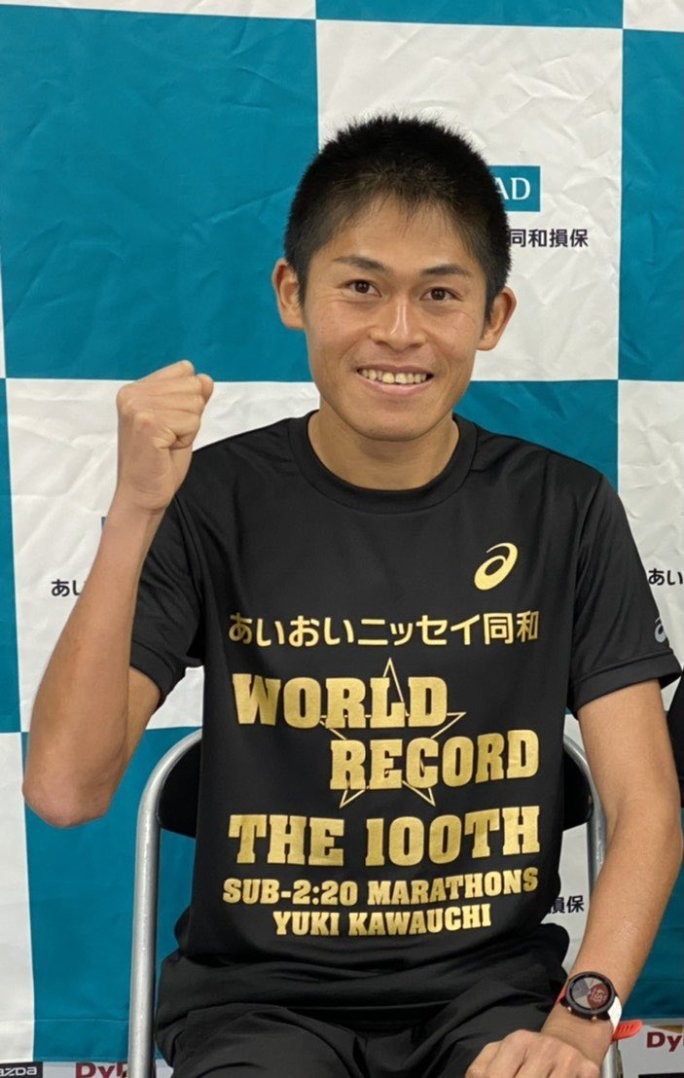
Kawauchi´s last marathon over 2:20 came in October 2018, when he ran 2:27:43 at the Venezia Marathon in Italy. Amazingly, he has run a whopping 109 marathons in his career, meaning he has only failed to break 2:20 on eight of those occasions.
"It might not to be difficult to run under 2:20 once,” Kawauchi said at an online press conference. “But even if it’s easy to achieve it once, in order to achieve that 100 times, you have to be able to continue the sport for a long time, you have to be able to participate in a lot of races, and more than anything you have to stay healthy. Otherwise, you can’t make it happen.”
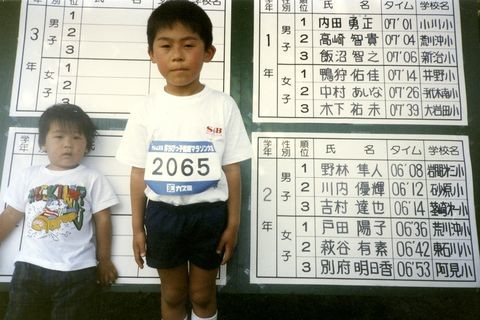
He continued, adding modestly, “With that said, I’m not the fastest in Japan, I’m not the strongest in Japan. But I’ve diligently continued this since I was six years old and it’s resulted in this record.”
Kawauchi turns 34 on Friday, and although he’s getting older, he is still capable of running PBs, as he showed at the Lake Biwa Marathon. He touched on this in the press conference, and he said he is confident he can continue to run this quickly for many years to come.
by Ben Snider-McGrath
Login to leave a comment
Kengo Suzuki still in state of shock after setting Japan marathon record
A day after his blistering run at the Lake Biwa Mainichi Marathon, Kengo Suzuki was still coming to grips with his status as a new Japanese national record holder on Monday.
Suzuki surprised even himself by setting the national men’s marathon record of 2 hours, 4 minutes, 56 seconds in Sunday’s race along the shores of Japan’s largest freshwater lake in Shiga Prefecture.
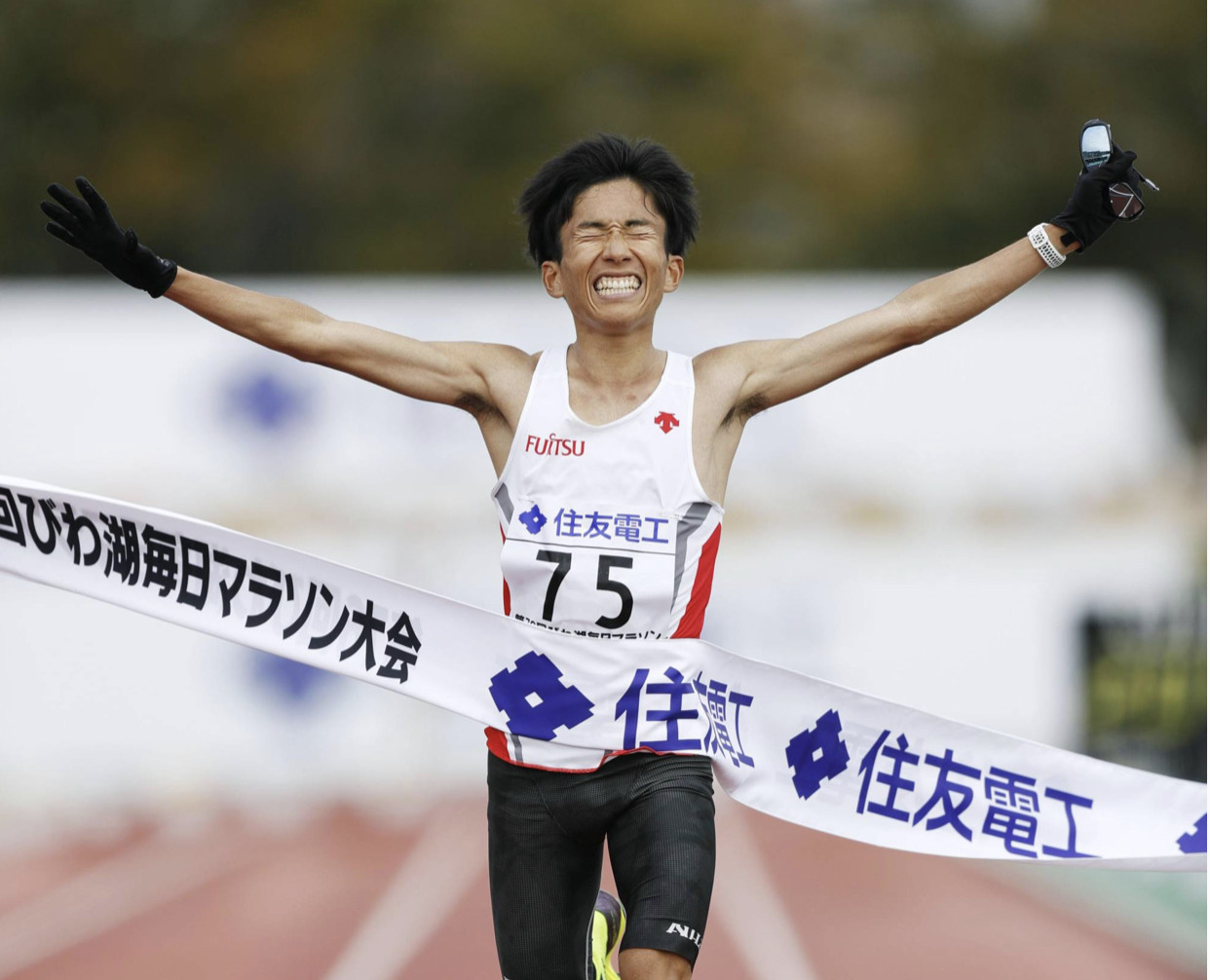
“It’s slowly sinking into my head that I actually set a new national record,” Suzuki said in an online press conference.
“(The race) has done more damage to my legs than I had imagined, so I’m going to take some time to rest before I move on to my next goal,” he said.
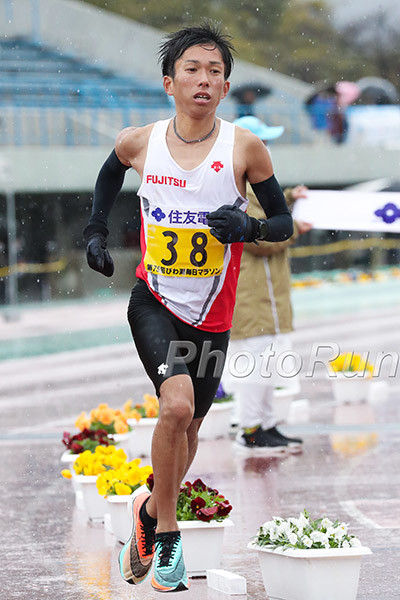
Suzuki’s win made him the first Japanese runner to complete a sub-2:05 marathon. He was among the more than 300 men lined up to run the Lake Biwa Mainichi Marathon, one of the country’s most prominent races.
The unheralded Suzuki finished 12th in the same race last year, but this year he chopped more than five minutes off his previous personal best of 2:10:21, set in 2018.
Now the 25-year-old has set his sights on the 2024 Paris Olympics.
“(I still lack) the physical toughness to endure high-intensity training and the mental toughness to fend off (other runners’) attempts to unsettle me,” he said. “It’s important that I work out consistently every day.”
The previous national record of 2:05:29 was set last March at the Tokyo Marathon by Suguru Osako, who secured qualification for the Tokyo Olympics.
Kenya’s Eliud Kipchoge holds the official marathon world record of 2:01:39, which he set at the Berlin Marathon in 2018, as well as the unofficial world record of 1:59:40 from an event in Vienna, Austria, in 2019 held under several artificial conditions.
Suzuki believes himself capable of running a sub-2:04 marathon in the near future, provided he can steer clear of injury.
“I’m getting more comfortable with my marathon training program,” he said. “If I’m able to stay injury-free and I raise my fitness levels, then that time might just be reachable.”
Spectators at Sunday’s race were asked to refrain from cheering on the sidelines as a coronavirus countermeasure.
The event, first run in 1946 in Osaka, moved to Shiga in 1962. But top runners have recently been opting to run the Tokyo Marathon, held around the same time of the year and said to produce better records.
Toshihiko Seko, who booked his berth for the 1988 Seoul Olympics by winning that year’s Lake Biwa Marathon, said, “It was a fitting finale and wonderful. It was a history-changing race.”
Login to leave a comment
Osaka Marathon
In 2022 the Lake Biwa Mainichi Marathon and Osaka Marathon were held together. For 2023 the name of the marathon will be Osaka and both men and women can run the race. The original male-only competition was first held in 1946 and, having taken place every year since then, it is Japan's oldest annual marathon race. The early editions of...
more...Kengo Suzuki clocked 2:04:56 National Record to Win final Lake Biwa Mainichi Marathon
Set to be absorbed into the mass-participation Osaka Marathon as its elite men's field next year the same way the old Tokyo International Marathon was swallowed whole by the Tokyo Marathon, the Lake Biwa Mainichi Marathon wrapped its 76 years as a freestanding event with a bang, a big one, Sunday in Otsu.
Everything was on. The conditions were good, light clouds, 7ËšC, 57% humidity and light breezes at the start. The field was good, 24 men having run sub-2:10 in the last three years and 52 sub-2:12. The pacing was good, the lead trio of pacers hitting almost every split within a couple of seconds of the target 2:58/km and the second group pacers even closer to the 3:00/km target. The shoes were good, across brands.
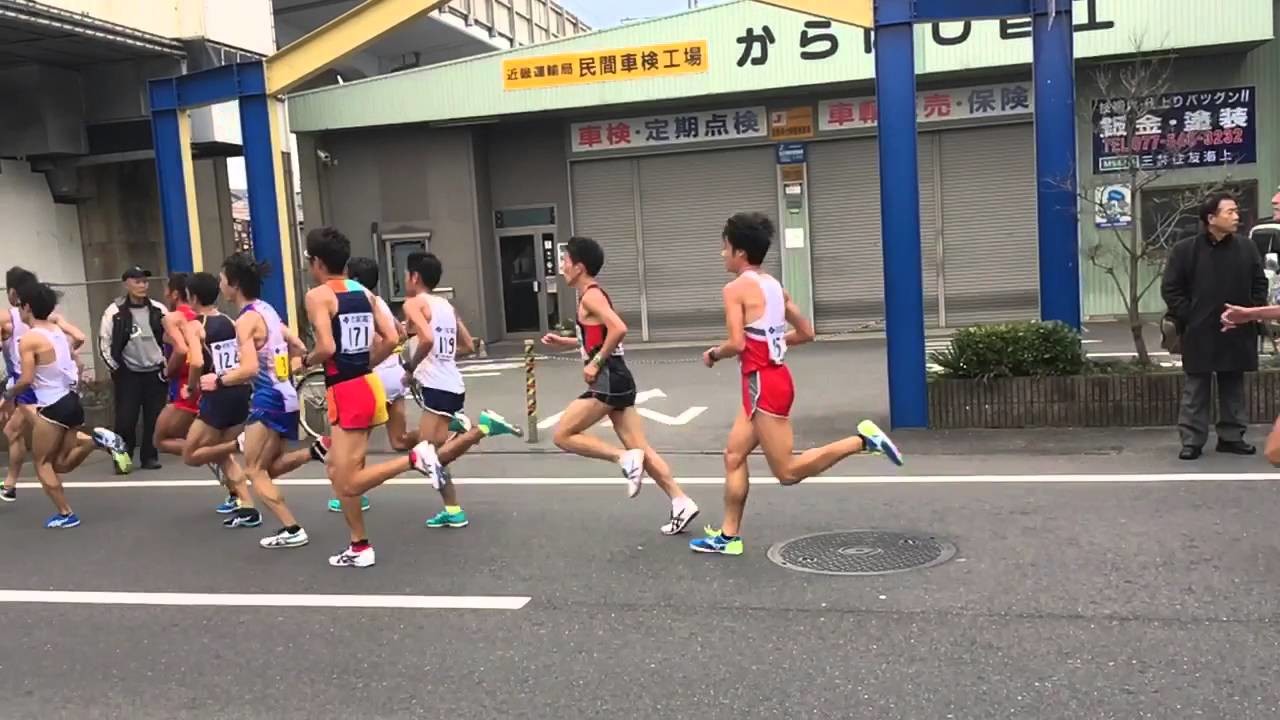
30 or so people went out on pace to go under the 2:05:29 national record in the first group, with what looked like about a hundred on mid-2:06 pace in the second group. Everything went smoothly and steadily, nature taking its course and whittling down both groups until there were only 12 left up front and a couple of dozen in the second group at 25 km when most of the pacers stepped off. Just past that point, Hiroto Inoue (Mitsubishi Juko), the second-fastest man in the field at 2:06:54, made a surge to break away. Lone remaining pacer James Rungaru (Chuo Hatsujo) took his time reeling Inoue back in, just five others still with him when he regained contact 3 km later.
When Rungaru stopped at 30 km past Ageo City Half Marathon winner Simon Kariuki (Togami Denki) took over with five Japanese men, Kengo Suzuki (Fujitsu), Hidekazu Hijikata (Honda), Shuho Dairokuno (Asahi Kasei), Masato Kikuchi (Konica Minolta) and Inoue, strung out single-file behind him. Kariuki slowed slightly to 2:59-3:00/km, but even so Dairokuno, Kikuchi and Inoue started to strain and lose touch. Suzuki and Hijikata, on the other hand, were even smoother and calmer than Kariuki, staying right there behind him.
The only changes until just after 36 km were the gap between the front and back trios widening and Suguru Osako's NR starting to slip out of reach. But at the 36 km drink station Suzuki made his move, one that will be studied for years to come. As they approached the #6 special drink table where Kariuki's bottle waited, Suzuki pulled out from behind him to his right. Just as Kariuki looked to his left to grab his bottle Suzuki attacked, and when Kariuki looked back up the gap was already about 5 m.
It was brilliant. And Suzuki, the 2017 National University Half Marathon champ in 1:01:36 and 2017 World University Games half marathon silver medalist and who made a similar move near 20 km in the MGC Race Olympic trials that ultimately helped his older teammate Shogo Nakamura win, was just getting going. For almost every one of the final 6 km he split in the 2:51~53/km range, bringing the NR back into sight, then 2:05:15, then 2:05:00.
With a final surge in the last 200 m of the track he stopped the clock at 2:04:56, the first Japanese man to break 2:05, 1:17 under former world record holder Wilson Kipsang's course record, and a PB by 5 and 1/2 minutes. "I didn't expect this kind of time at all," he said post-race. "In my other marathons to date I've slowed down in the last part, so the focus today was on finishing hard. I knew that was the right time to make my move." Still just 25, Suzuki's career goal is the Paris Olympics. Unluckily for him, the Project Exceed 100 million yen bonus program for a new national record has already run out. Let's hope he's got another chance to earn that kind of payday before Paris.
Behind him, Hijikata, only 23 and running just his second marathon after a 2:09:50 debut in Tokyo last year right before his graduation from Koku Gakuin University, dropped Kariuki for 2nd in 2:06:26. Likewise doing his second marathon after a 2:28:47 debut at Lake Biwa last year, 25-year-old Kyohei Hosoya (Kurosaki Harima) ran almost perfectly even splits, going through halfway in 1:03:21 to come up from the second group and run down Kariuki, Inoue, Dairokuno and half marathon NR holder Yusuke Ogura (Yakult) for 3rd in 2:06:35. Both Inoue and Ogura held on for sub-2:07 PBs, Inoue 4th in 2:06:47 and Ogura 5th in 2:06:51.
And behind them, the hits kept coming. 10 men ran 2:07. 13 ran 2:08. 14 ran 2:09. Almost all were PBs or debuts. 28 men sub-2:09, 42 sub-2:10. 174 men sub-2:20, the most ever, anywhere, by a long shot. With no Beppu-Oita, Nobeoka or Tokyo this season that may have been a factor of Lake Biwa being the only game in town, but still, can you believe those numbers, even with the usual Japanese depth? With the shoes these days times might not be worth what they used to be, but even if you factor in a couple of minutes this was about as good a demonstration of the sheer depth of quality of the marathon development system here as you could ask for.
And between that and a great race up front it was the perfect sendoff for Japan's oldest marathon before it disappears next year into the maw of Osakan modernity. Farewell, Lake Biwa. Long may you run.
Login to leave a comment
Osaka Marathon
In 2022 the Lake Biwa Mainichi Marathon and Osaka Marathon were held together. For 2023 the name of the marathon will be Osaka and both men and women can run the race. The original male-only competition was first held in 1946 and, having taken place every year since then, it is Japan's oldest annual marathon race. The early editions of...
more...Olympic Trials Winner Shogo Nakamura withdraws from Lake Biwa Mainichi Marathon
After experiencing mild pain in the outer ankle of his left foot and being diagnosed with peroneal tendonitis, Tokyo Olympics men's marathon trials winner Shogo Nakamura (Fujitsu) has made the decision to withdraw from the Feb. 28 Lake Biwa Mainichi Marathon.
Nakamura will take a few days off to rest and plans to resume light jogging next week. However, in combination with not meeting his performance goals at an intensive training camp last month, he has decided to err on the side of caution and withdraw.
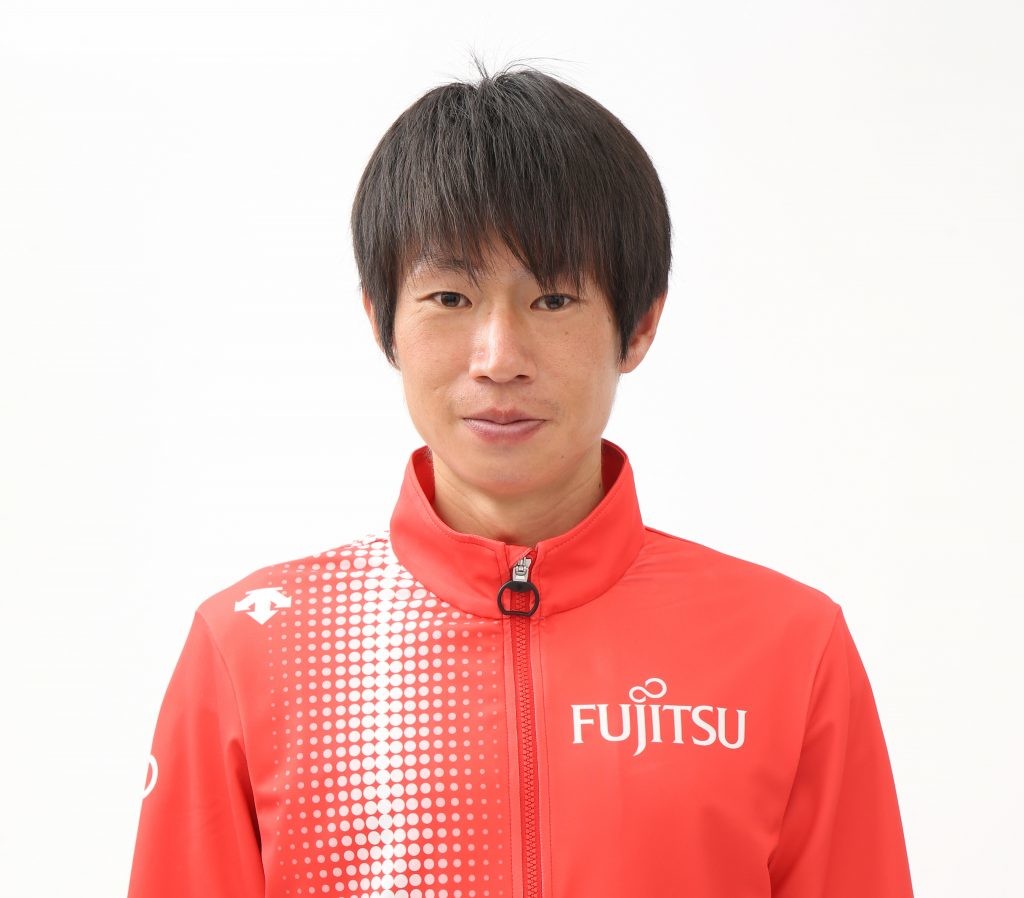
Comments from Nakamura:
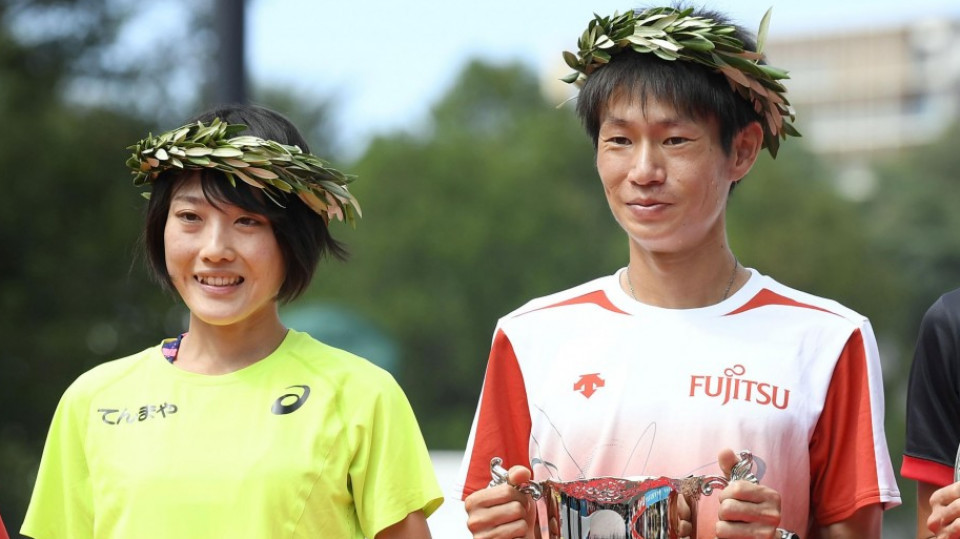
Lake Biwa was going to be my first race since the New Year Ekiden and my first marathon in a long time, so I'd been looking forward to it.
The pain has already faded and doesn't look like it will get in the way of training, but after looking carefully at the situation we decided not to risk more serious injury and to withdraw in favor of being ready for the Tokyo Olympics.
I apologize to everyone who had been expecting to see me run. My first priority is to get back on my feet and do the work necessary to show up at the Tokyo Olympics ready to race. I hope that you will all support me and cheer me on there.
by Brett Larner
Login to leave a comment
Osaka Marathon
In 2022 the Lake Biwa Mainichi Marathon and Osaka Marathon were held together. For 2023 the name of the marathon will be Osaka and both men and women can run the race. The original male-only competition was first held in 1946 and, having taken place every year since then, it is Japan's oldest annual marathon race. The early editions of...
more...Registration boom leads to tighter standards for Lake Biwa
Entries for the Lake Biwa Mainichi Marathon on 28 February closed on 22 January. With most other races cancelled or postponed due to the coronavirus crisis Lake Biwa this year received nearly double the normal number of applications for entry.
Putting on the race with such a large field poses problems and prevent the organisation from safely executing all planned coronavirus countermeasures. As a result revised entry standards will be applied based on World Athletics scoring points as follows: 10000m: 30:40; half marathon: 1:07:29; marathon: 2:27:30.
After proof of qualification from each entrant was checked on 25 January notifications were sent to all those who were unable to participate under these new standards. Information regarding refund of entry fees was included. Those eligible to participate will be notified around 5 February, on which date there will be a virtual press conference to announce the elite athlete field.
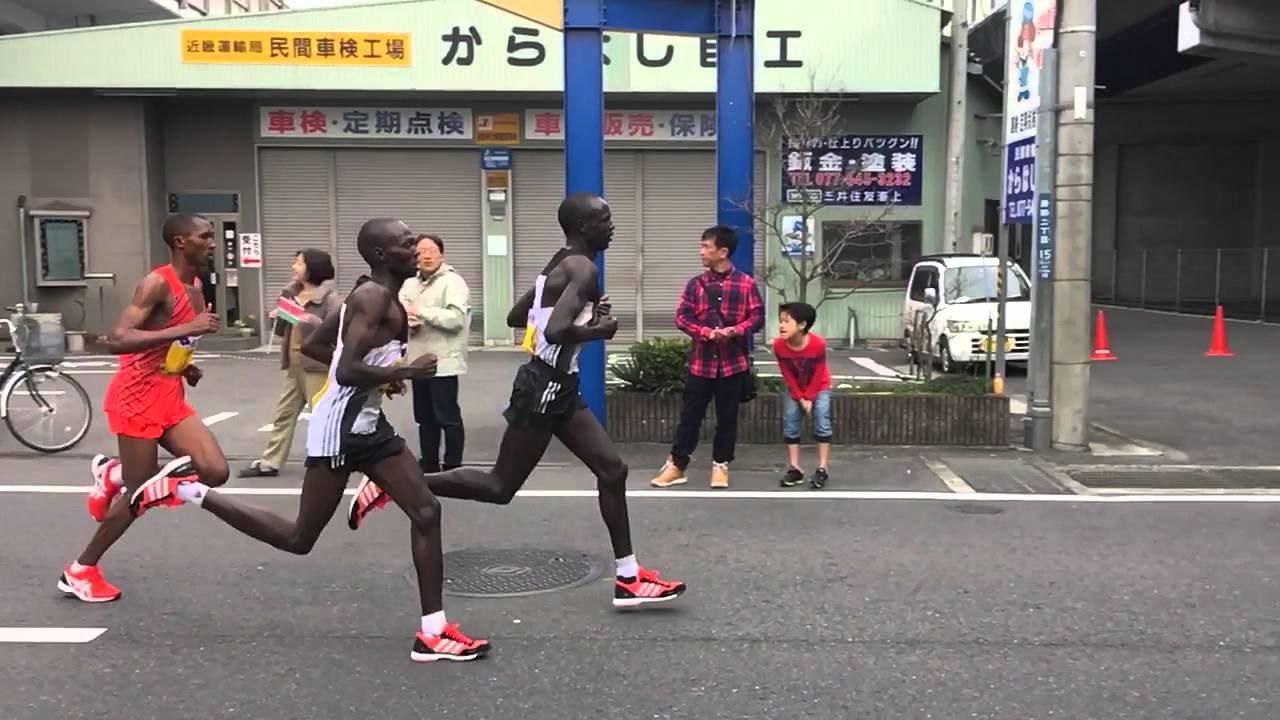
Further operational changes may become necessary as the situation regarding the virus evolves, said the organisers.
There are multiple reports where people have claimed that Lake Biwa has also rejected all entries from abroad, after initially being open to international participation.
by Brett Larner
Login to leave a comment
Osaka Marathon
In 2022 the Lake Biwa Mainichi Marathon and Osaka Marathon were held together. For 2023 the name of the marathon will be Osaka and both men and women can run the race. The original male-only competition was first held in 1946 and, having taken place every year since then, it is Japan's oldest annual marathon race. The early editions of...
more...Lake Biwa Marathon to be Subsumed Into Osaka Marathon beginning in 2022
On Dec. 25 it was learned that the longest-running marathon in Japan, the Lake Biwa Mainichi Marathon, will become a part of the Osaka Marathon beginning in 2022.
Following Lake Biwa's 76th edition on Feb. 28, 2021, it will next take place under the tentative title of the 10th Osaka Marathon and 77th Lake Biwa Mainichi Marathon Combined Competition.
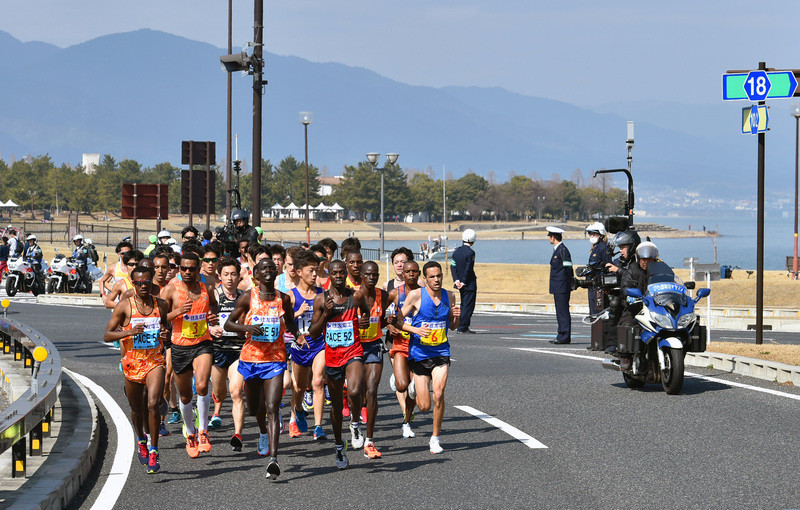
The Osaka Marathon executive committee finalized the plan at a meeting in Osaka on Dec. 25. Plans call for the 2022 race to take place on Feb. 27 utilizing the existing Osaka course.
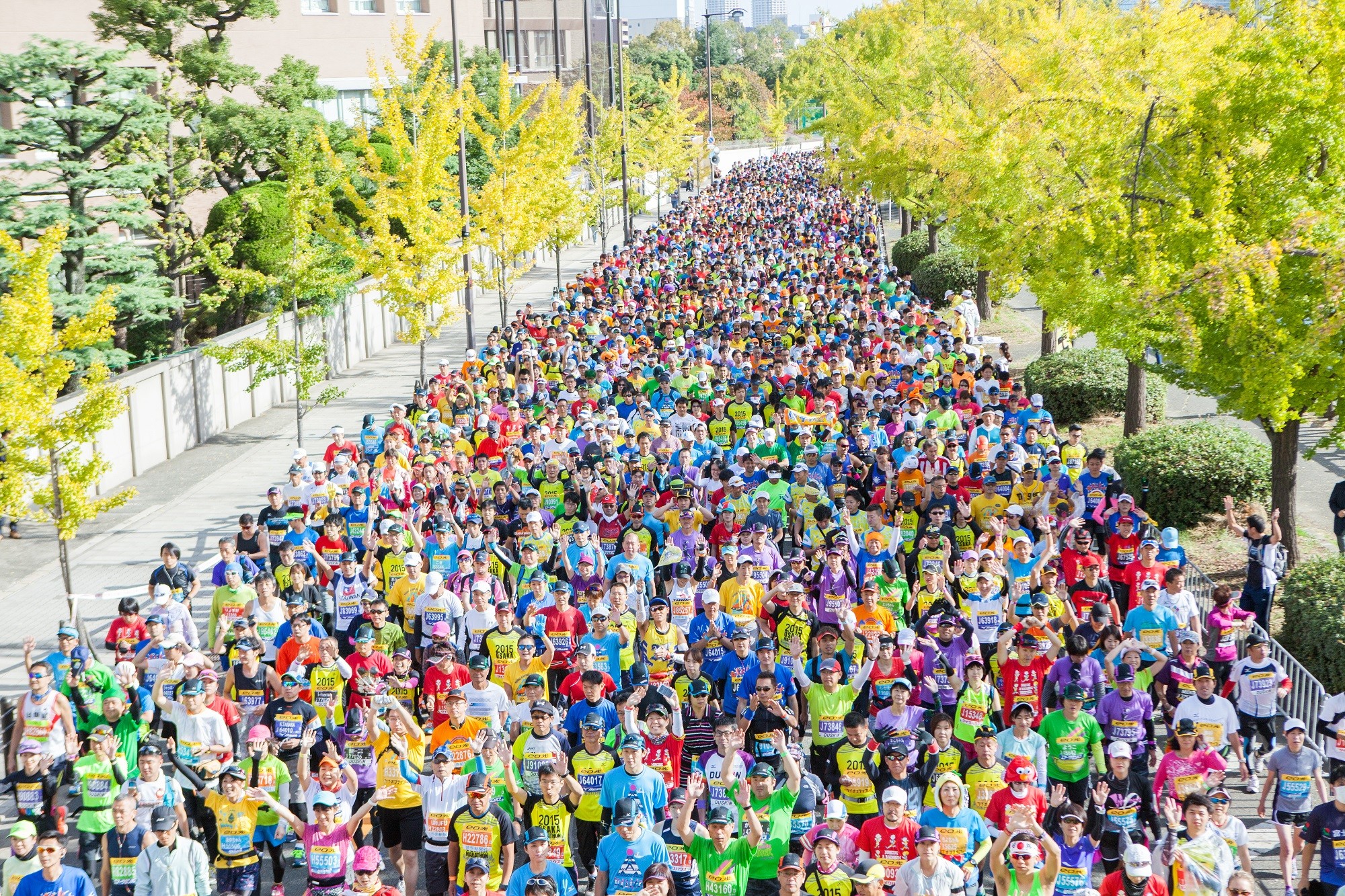
With an eye toward World Athletics' preference for large-scale races that combine elite and mass participation marathons, the plan will combine Lake Biwa's history of attracting top-level international and domestic athletes with Osaka's status as the second-largest mass-participation marathon behind only the Tokyo Marathon.
Organizers are aiming to go one level higher than Lake Biwa's current World Athletics ranking of gold to achieve the top-level platinum ranking, and hope that the arrival of such a prestigious event will help pave the way for success for the Kansai region at the 2025 Osaka World Expo.
Lake Biwa's first edition in 1946 was held in Osaka, moving to its current location in 1962. Its lakeside course has welcomed countless famous athletes and helped produced a large number of Olympic and World Championships team members.
The Osaka Marathon began in 2011. Starting in front of the Osaka Government Offices, its course passes many of Osaka's most popular tourist sites before finishing at Osaka Castle Park.
Its 10th running in late November this year was cancelled due to the coronavirus crisis, but it had attracted a field of 35,000 entrants.
by Brett Larner
Login to leave a comment
Osaka Marathon
In 2022 the Lake Biwa Mainichi Marathon and Osaka Marathon were held together. For 2023 the name of the marathon will be Osaka and both men and women can run the race. The original male-only competition was first held in 1946 and, having taken place every year since then, it is Japan's oldest annual marathon race. The early editions of...
more...Lake Biwa Mainichi Marathon, Japan's first World Athletics gold label race will be discontinued after 2021 Race
In an interview with a source involved in the decision, it was learned on Dec. 17 that the Lake Biwa Mainichi Marathon will be discontinued after next year's 76th edition on Feb. 28, 2021. One of Japan's three major men's marathons, Lake Biwa's position on the calendar as the last chance to qualify for Olympic and World Championships teams meant it has had a long history of being the place where Japan's best marathoners earned to right to compete against the best in the world. But in recent years Lake Biwa has felt increasing pressure from the rise of the Tokyo Marathon, where national records and other fast times have been run almost every year, and Lake Biwa's relevance and value began to come into question. The Osaka Marathon is likely to replace Lake Biwa as a national team selection race in the future.
Having begun in 1946, Lake Biwa is the oldest existing marathon in Japan. Along with the Fukuoka International Marathon and the Tokyo Marathon it is counted as one of Japan's three major men's marathons. But now its long, colorful history is set to come to an end next year when Olympic marathon trials winner Shogo Nakamura (28, Fujitsu) and others stand on its starting line one final time.
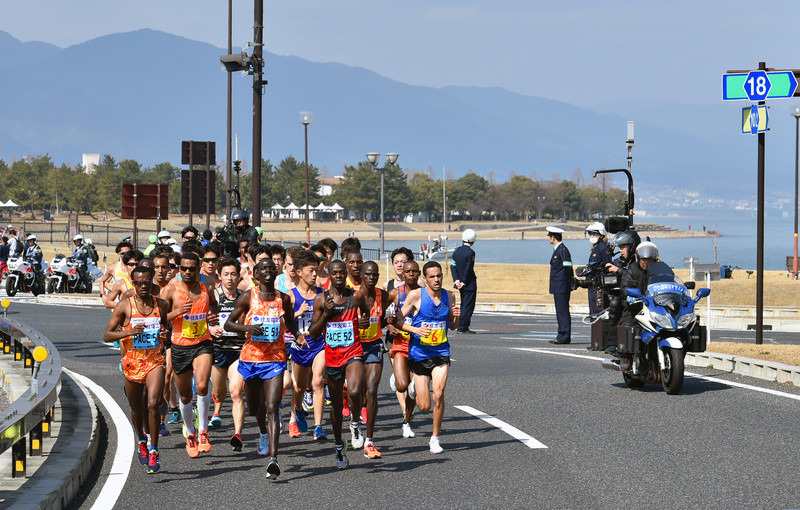
Starting and finishing on the track at Ojiyama Field, Lake Biwa has long been the final selection race for Olympic and World Championships teams. At both the 2012 London Olympics and 2016 Rio de Janeiru Olympics two of the three men's team members earned their places at Lake Biwa. At both the 1964 and 1968 Olympics all three members were chosen there. Its position on the calendar relative to Fukuoka and Tokyo meant the battles were always furious, and those who emerged victorious went on to take on the world.
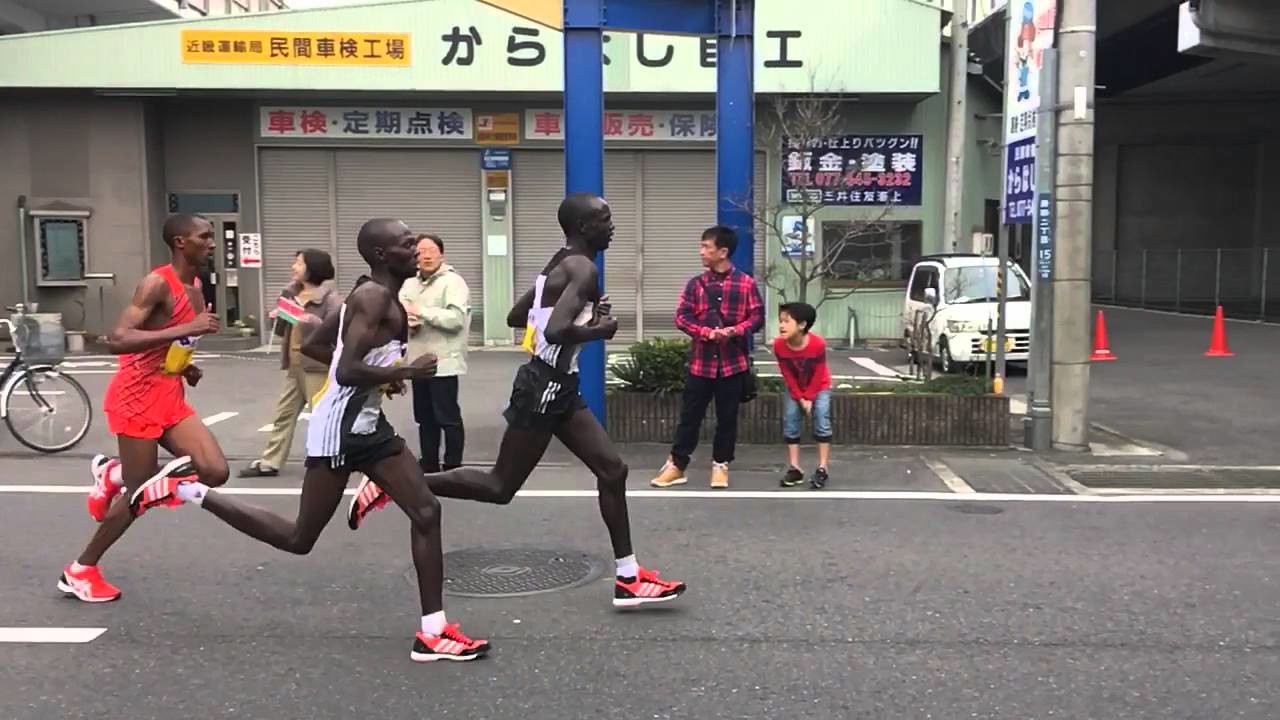
There's no question that Lake Biwa has been the site of countless classic races and a vital part of Japan's marathon tradition, but in recent years its relevance has faded. One of the major factors in this was the Tokyo Marathon's change to a faster course in 2017. In 2018 Yuta Shitara (29, Honda) broke the Japanese national record in Tokyo, and two years later Suguru Osako (29, Nike) followed Shitara's lead and did the same. With that record of success, Tokyo has become the first choice for Japanese men targeting fast times.
The outcome of that change for Lake Biwa, an elite-only marathon, was that the athletes who could have provided the fireworks started staying away. With the Tokyo Marathon having moved to Lake Biwa's traditional date the first Sunday in March two years ago, Lake Biwa's shift a week later meant it was now the same day as the Nagoya Women's Marathon, hiding it in the shadows even further. The race's viability, financial and otherwise, came into question.
According to those involved, the Osaka Marathon is the most likely candidate to replace Lake Biwa as a national team selection event. With 35,000 people running on a downtown urban course it is the second-largest marathon in Japan after only Tokyo. With that kind of modern prestige to it, Osaka is highly likely to pick up the selection race label.
Modernity has a way of burying history. The MGC Race, a one-shot selection race for the Tokyo Olympics, was a major success. Those in power are leaning toward using the same kind of single trials race for the 2024 Paris Olympics. With the coronavirus crisis an ongoing issue, this is a period of transition. The Japanese marathon world isn't immune to those transitional forces, and we can only hope that its reorganization and reformation produce even more exciting races.
by Brett Larner
Login to leave a comment
Osaka Marathon
In 2022 the Lake Biwa Mainichi Marathon and Osaka Marathon were held together. For 2023 the name of the marathon will be Osaka and both men and women can run the race. The original male-only competition was first held in 1946 and, having taken place every year since then, it is Japan's oldest annual marathon race. The early editions of...
more...Olympic Marathon Trials Winner Shogo Nakamura Plans to Run Lake Biwa Mainichi Marathon
On Dec. 15, Olympic marathon trials winner Shogo Nakamura (28, Fujitsu) sat for an online interview from his training base in Tokunoshima, Kagoshima, revealing that he plans to run the Feb. 28 Lake Biwa Mainichi Marathon.
Reporting that his training has been progressing steadily, Nakamura enthusiastically said, "The goal is to win in Lake Biwa to build up some momentum for the Olympics. Time is important too, but the main goal is to win."
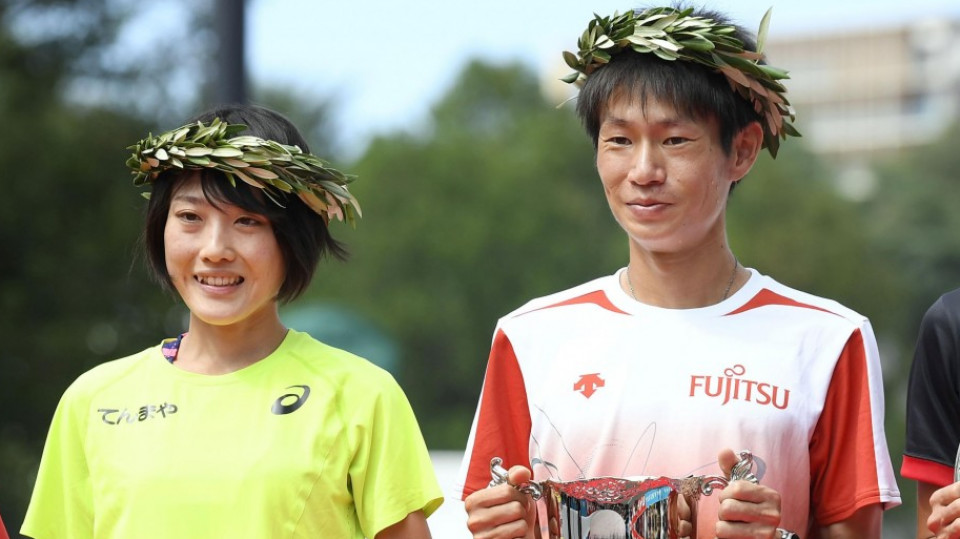
Lake Biwa will be a year and a half since Nakamura's last marathon, the Sept., 2019 MGC Race Olympic trials.
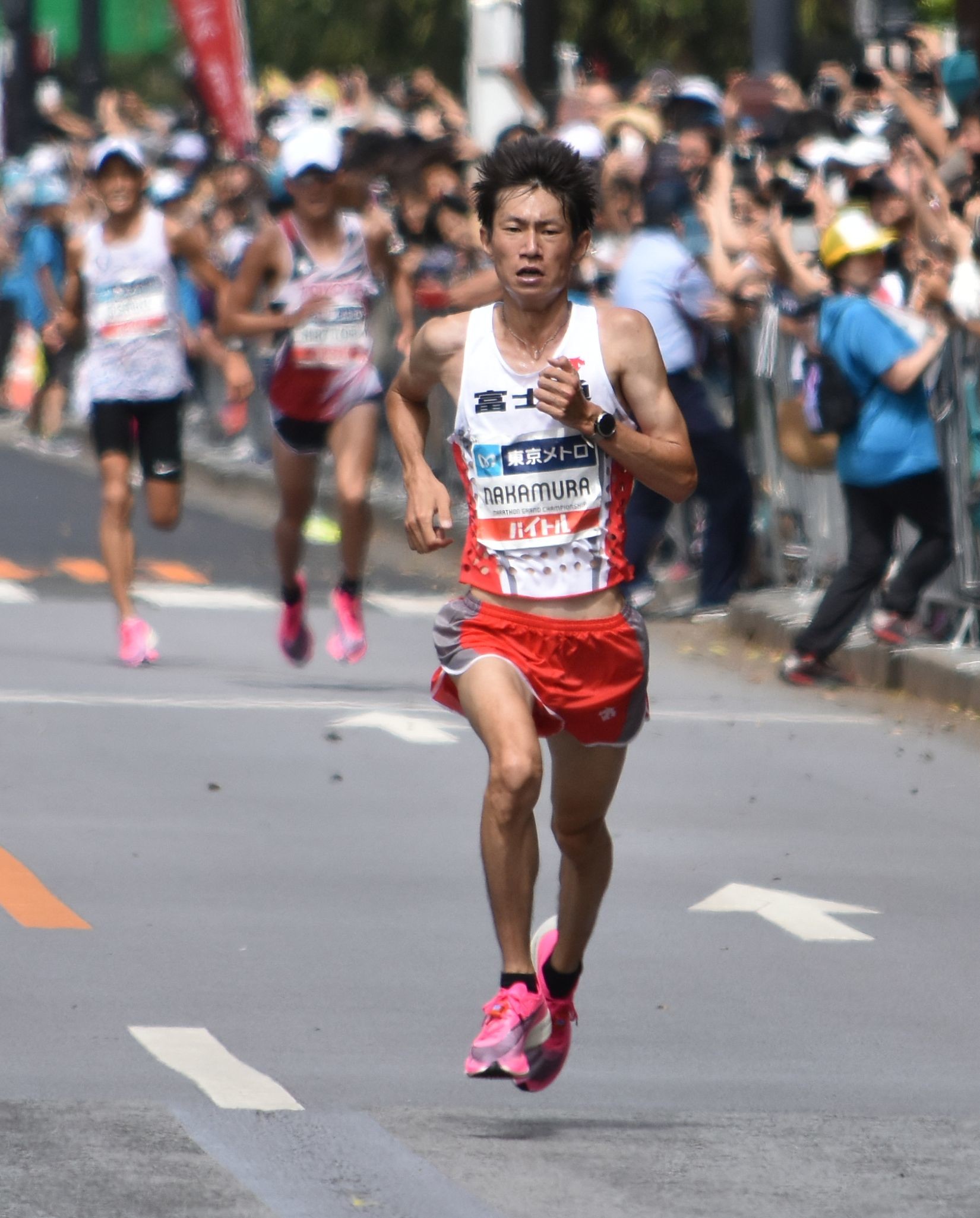
Since his victory there everything about the Olympic marathon has changed, with the venue forcibly relocated to Sapporo and the Olympics themselves postponed for a year. But through it all he has remained true to his path without wavering.
Nakamura ran his debut marathon at Lake Biwa in 2018, and it is no accident that he is returning there for his final marathon before the Olympics. "I was the top Japanese finisher in 2018 and got my place at the MGC Race there," he said. "
But instead of just going back to where it all started, I want to go into the Olympics with a fresh new mindset. I want to win this time, not just be the top Japanese man."
Before that, Nakamura will kick off his Olympic year early at the Jan. 1 New Year Ekiden national corporate men's championships. He expects to be put on either the critically important Fourth or Fifth Stage, but whichever it ends up being, he said, "I want to win my stage and help my team succeed."
by Brett Larner
Login to leave a comment
Osaka Marathon
In 2022 the Lake Biwa Mainichi Marathon and Osaka Marathon were held together. For 2023 the name of the marathon will be Osaka and both men and women can run the race. The original male-only competition was first held in 1946 and, having taken place every year since then, it is Japan's oldest annual marathon race. The early editions of...
more...Amateur Runner, 23, Kaito Iwasa Hoping for Breakthrough at Fukuoka International Marathon
Local Hiratsuka resident Kaito Iwasa, 23, will run the 74th Fukuoka International Marathon on Dec 6. With the number of entrants limited to a select few due to the ongoing coronavirus crisis, Iwasa earned the right to stand on the starting line by meeting the strict qualifying standards. "Fast times will come later," he said. "Before anything else I just want to enjoy this one."
Iwasa graduated from Kasugano J.H.S. and Oiso H.S. He attended Chuo University. where he was part of the ekiden team. After graduating from Chuo this year he started working at a local company in April, training all the while for next spring's Tokyo Marathon. When Tokyo was postponed until next October due to the coronavirus crisis, he started looking for another race he could run and heard that Fukuoka would be happening.
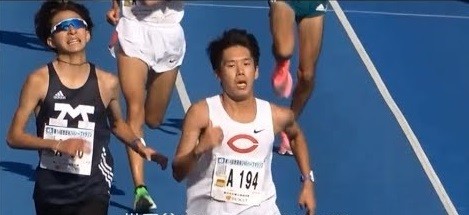
In March this year Iwasa ran the Lake Biwa Mainichi Marathon as the final race of his college career, recording a respectable 2:19:51. "Fukuoka is an elite race," he said. "To be honest I didn't think I had a chance." But in a field of 94 his Lake Biwa time earned him bib # 83. He hopes to break 2:15.
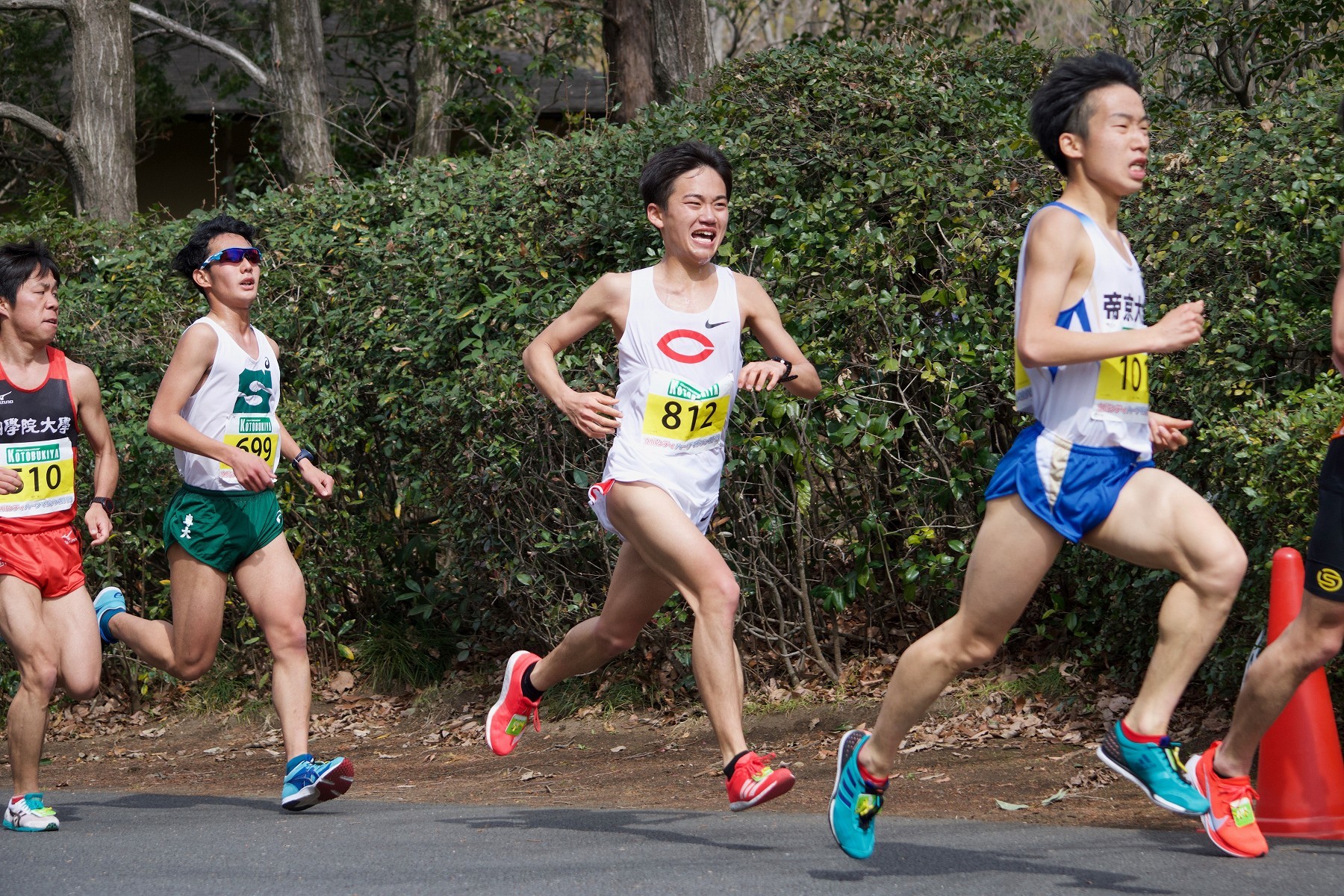
Still in his first year of full-time work, it's a challenge for him to balance his job and training. "My life can't be completely focused on running like it was in university," Iwasa says. "but I've been able to work it so far so that I can still train six days a week." He gets up at 5:00 a.m. to run, generally following Route 1 along the coast or in the Hiratsuka municipal park, before heading to work.
At Chuo Iwasa was selected as one of the entry members for the Hakone Ekiden but never made it to the starting lineup. That disappointment is what drives him now. "I want to stay involved with athletics and someday coach an athlete who will run the Hakone Ekiden's Fourth Stage through Hiratsuka," he says. "I want to show younger athletes that you can still have a career in athletics even if you're in the workplace."
by Brett Larner
Login to leave a comment
Fukuoka Marathon
The Fukuoka International Open Marathon Championship is one of the longest running races in Japan, it is alsoan international men’s marathon race established in 1947. The course record is held by Tsegaye Kebede of Ethiopia, running 2:05:18 in 2009. Frank Shorter won first straight years from 1971 to 1974. Derek Clayton set the World Record here in 1967 running 2:09:37. ...
more...2021 Lake Biwa Marathon to Go Ahead Feb. 28
With race after race canceling or postponing, this week the organizers of the Lake Biwa Mainichi Marathon announced plans for next year's 76th running to go ahead on Feb. 28, 2021.
A week earlier that its traditional date due to the Tokyo Marathon's move to March, the planned date comes with the caveat that, "depending on the future situation with regard to COVID-19, there may be changes to the race's operation, including the possibility of cancelation."
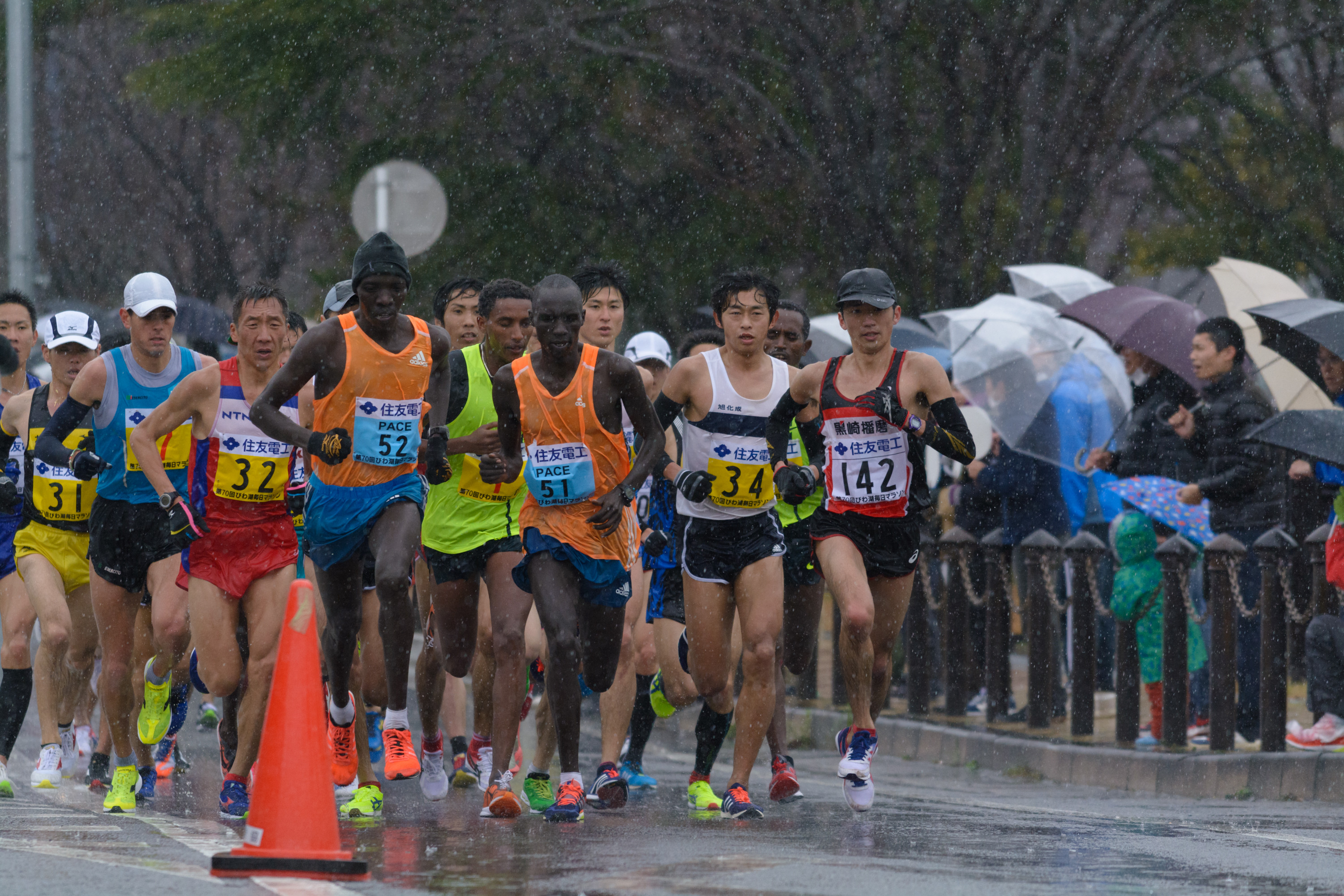
But with that said, it looks like the organizers plan no additional restrictions on their event's field beyond the normal qualifying times and requirement for national federation approval.
In that past that has typically meant a field of under 200 finishers from Japan and abroad. For the domestic field, with no Beppu-Oita or Tokyo Marathon there's sure to be record-setting depth. as between Beppu-Oita, Tokyo and Lake Biwa this year 29 men went sub-2:10 and 50 sub-2:12.
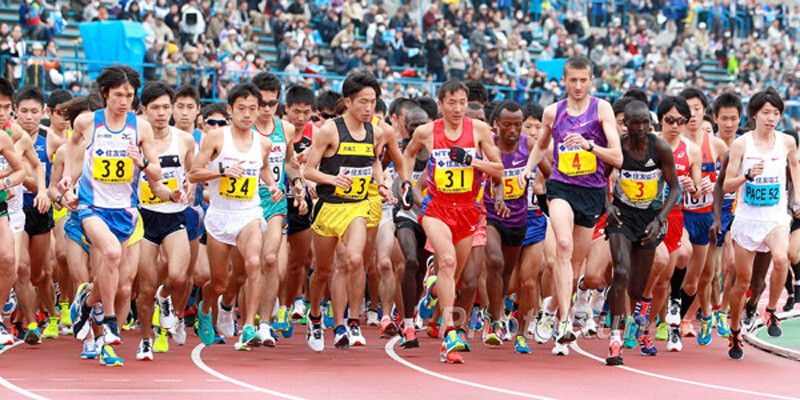
For international men, if it actually happens Lake Biwa will be one of the only elite spring marathons in the world. In contrast to the 2020 Fukuoka International Marathon and 2021 Nagoya Women's Marathon, both of which restricted their fields to those already in Japan, Lake Biwa appears to be open to any internationals who meet the standards, have federation approval, and are willing to make the trip.
At the moment immigration restrictions would prevent that from being an easy option for most nationalities, but as it works on its athlete COVID protocols for the Tokyo Olympics it's quite possible that changes to Japan's policies could open the door to a legit international field at Lake Biwa. With the race's application deadline standing at Dec. 31 there's just over 2 months for those changes to happen one direction or the other.
Major Japanese marathons still scheduled to happen in 2020 and 2021 marathon announcements to date:
Dec. 6: Fukuoka International Marathon (370) - scheduled with limited field size.
Dec. 20: Hofu Marathon (2,724) - scheduled with limited field size.
by Brett Larner
Login to leave a comment
Osaka Marathon
In 2022 the Lake Biwa Mainichi Marathon and Osaka Marathon were held together. For 2023 the name of the marathon will be Osaka and both men and women can run the race. The original male-only competition was first held in 1946 and, having taken place every year since then, it is Japan's oldest annual marathon race. The early editions of...
more...Ryu Takaku, Yuma Hattori and Taku Fujimoto Headline Fukuoka International Marathon
With strict limitations on immigration still a reality in Japan, the Dec. 6 Fukuoka International Marathon has announced an almost entirely domestic field of less than 100 that includes only five Japan-based foreign-born athletes plus an all-Japan-based Kenyan pacing crew led by Bedan Karoki (Toyota).
Not that the field is hurting for quality. Ryu Takaku (Yakult), 2:06:45 in Tokyo this year, 2018 Fukuoka winner and Tokyo Olympics marathon team member Yuma Hattori (Toyota), and Taku Fujimoto (Toyota), a bump up to the 2019 Fukuoka winner's position pending after the subsequent suspension of the Moroccan who crossed the line first for biological passport violations, make up the front end of a field that includes eleven current sub-2:10 men and seven of last year's top ten.
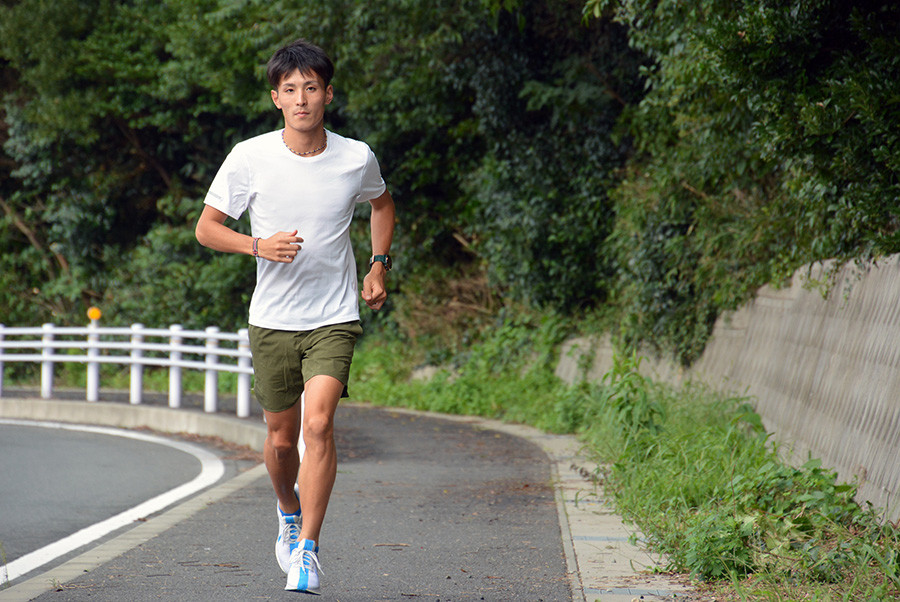
Hattori has said publicly that he'll be going for Suguru Osako's 2:05:29 national record, and with pacing support from teammates Karoki and Fujimoto, his former Toyo University teammate Takaku there with him, and no dirty athletes to effortlessly tear him in half at the end, if the weather is good his chances will be too.
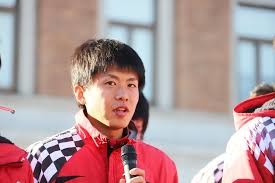
Shizuoka-based Kenyan Michael Githae (Suzuki) is the top international in the field with a best of 2:09:21 from Lake Biwa in 2018, but sub-60 half marathoner Paul Kuira (JR Higashi Nihon) still has potential to improve on his 2:11:58 best, and likewise for former Takushoku University ekiden team captain Derese Workneh (Hiramatsu Byoin). Workneh's teammate Cyrus Kingori (Hiramatsu Byoin) looks promising in his debut with a 1:01:31 for 4th at last year's Gifu Seiryu Half.
One promising name for a breakthrough in the Japanese field is Taiki Suzuki (Raffine), 9th last year in 2:12:09 in his marathon debut. It'll be interesting as well to see if Yuya Yoshida (GMO) can build on his inspiring at-the-time-career-ending 2:08:30 debut at Beppu-Oita this year, and it still feels like Olympic team alternate Shohei Otsuka (Kyudenko) has more waiting in him than his 2:10:12 best from Beppu-Oita two years ago.
Toyo fans will be hoping the same for Keita Shitara (Hitachi Butsuryu), twin brother of former NR holder Yuta Shitara.
by Brett Larner
Login to leave a comment
Fukuoka Marathon
The Fukuoka International Open Marathon Championship is one of the longest running races in Japan, it is alsoan international men’s marathon race established in 1947. The course record is held by Tsegaye Kebede of Ethiopia, running 2:05:18 in 2009. Frank Shorter won first straight years from 1971 to 1974. Derek Clayton set the World Record here in 1967 running 2:09:37. ...
more...2021 Kagoshima Marathon Canceled and updates on other Marathons in Japan
We have studied a variety of options for staging the 2021 Kagoshima Marathon, but with no end to the coronavirus crisis in sight we have come to the unfortunate conclusion, in light of the need to ensure the safety of the runners, event staff and local residents, that it would not be possible to hold the race as planned and that it must be canceled for the second year in a row.
We sincerely pray for a swift end to the crisis and that we can once again hold the Kagoshima Marathon as a safe event that will delight runners and locals alike. We will be working hard to make that a reality.
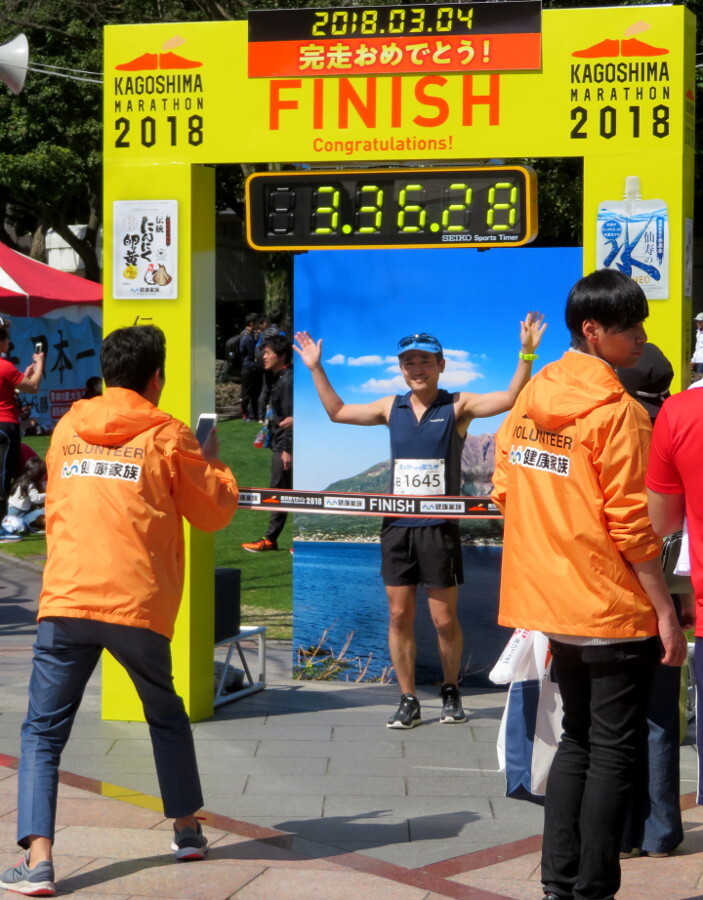
With regard to priority entry for those who were entered to run in 2020, we are still studying how we might move forward with improved coronavirus measures in the future, including examining the field size, and do not have a clear answer at this point.
We will post that information as soon as it has been determined and thank you for your patience until then. We are planning to hold events including a running clinic and an online marathon and will also post that information on our website as soon as all the details have been decided.
Kagoshima Marathon Organizing Committee
Major Japanese marathons still scheduled to happen in 2020 and 2021 marathon announcements to date:
Dec. 6: Fukuoka International Marathon (370) - scheduled with limited field size
Dec. 20: Hofu Marathon (2,724) - scheduled with limited field size
2021
Jan. 10 - Ibusuki Nanohana Marathon (10,954) - canceled
Jan. 31 - Katsuta Marathon (10,627) - canceled
Jan. 31 - Osaka International Women's Marathon (423) - TBA
Feb. 7 - Beppu-Oita Marathon (3,141) - canceled
Feb. 14 - Ehime Marathon (9,554) - canceled
Feb. 14 - Nobeoka Nishi Nippon Marathon (536) - TBA
Feb. 21 - Kyoto Marathon (13,894) - canceled
Feb. 21 - Kochi Ryoma Marathon (10,924) - canceled
Feb. 21 - Kumamoto Castle Marathon (10,444) - canceled
Feb. 21 - Kitakyushu Marathon (9,485) - canceled
Feb. 21 - Okinawa Marathon (7,990) - canceled
Feb. 28 - Shonan International Marathon (16,821) - rescheduled from Dec. 6
Feb. 28 - Himeji Castle Marathon (6,938) - canceled
Feb. 28 - Iwaki Sunshine Marathon (5,259) - canceled
Feb. 28 - Lake Biwa Marathon (174) - TBA
Mar. 7 - Kagoshima Marathon (9.356) - canceled
Mar. 7 - Tokyo Marathon (151) - postponed to October 17
Mar. 14 - Shizuoka Marathon (9,802) - canceled
Mar. 14 - Nagoya Women's Marathon (96) - scheduled with limited field size
Mar. 21 - Itabashi City Marathon (13,310) - canceled
Mar. 21 - Koga Hanamomo Marathon (8,766) - canceled
Mar. 21 - Saga Sakura Marathon (8.509) - canceled
Mar. 28 - Tokushima Marathon (11,010) - decision in early November
Mar. 28 - Sakura Marathon (5,614) - TBA
Apr. 18 - Kasumigaura Marathon (10,096) - decision by end of October
Apr. 18 - Nagano Marathon (8,082) - decision by end of October
by Japan Running News
Login to leave a comment
2021 Kagawa Marugame International Half Marathon has been cancelled due to the coronavirus crisis
We regret to announce that the 75th anniversary running of the Kagawa Marugame International Half Marathon scheduled for Feb. 7, 2021 will not take place.
After careful consideration we determined that, with no visible end to the coronavirus crisis in sight, for the health and safety of participants, volunteers, staff, medical and rescue personnel, fans along the course and everyone else involved with our event, our 75th running must be postponed for one year.
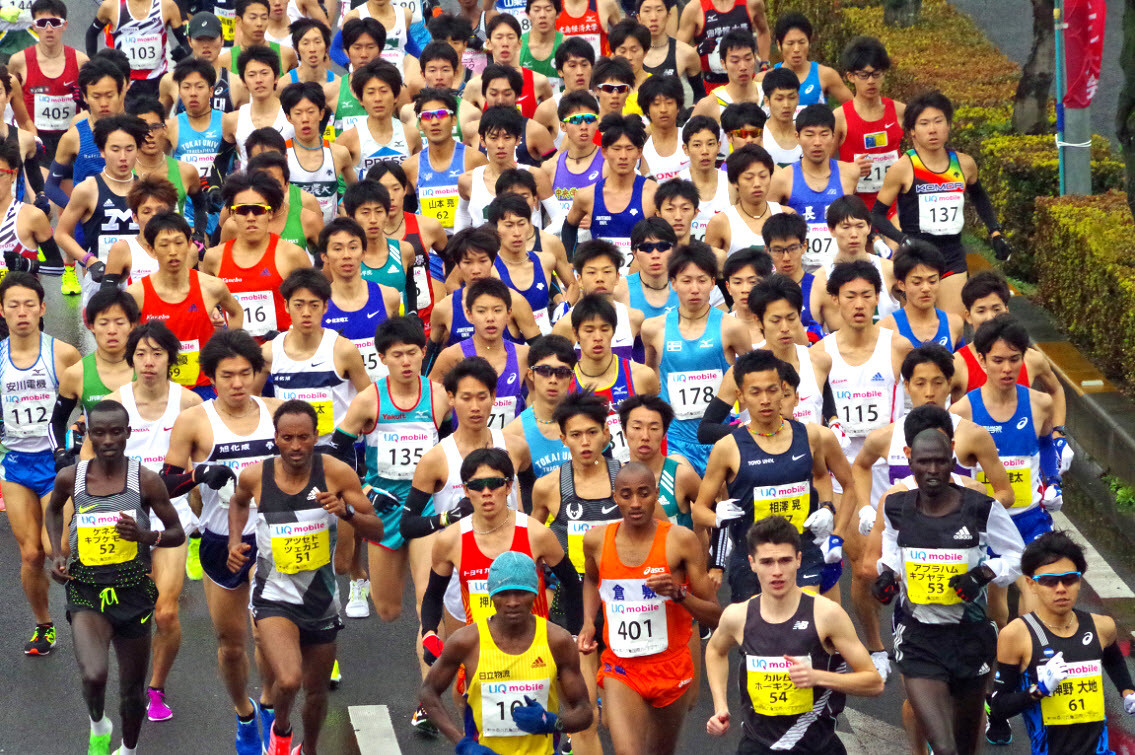
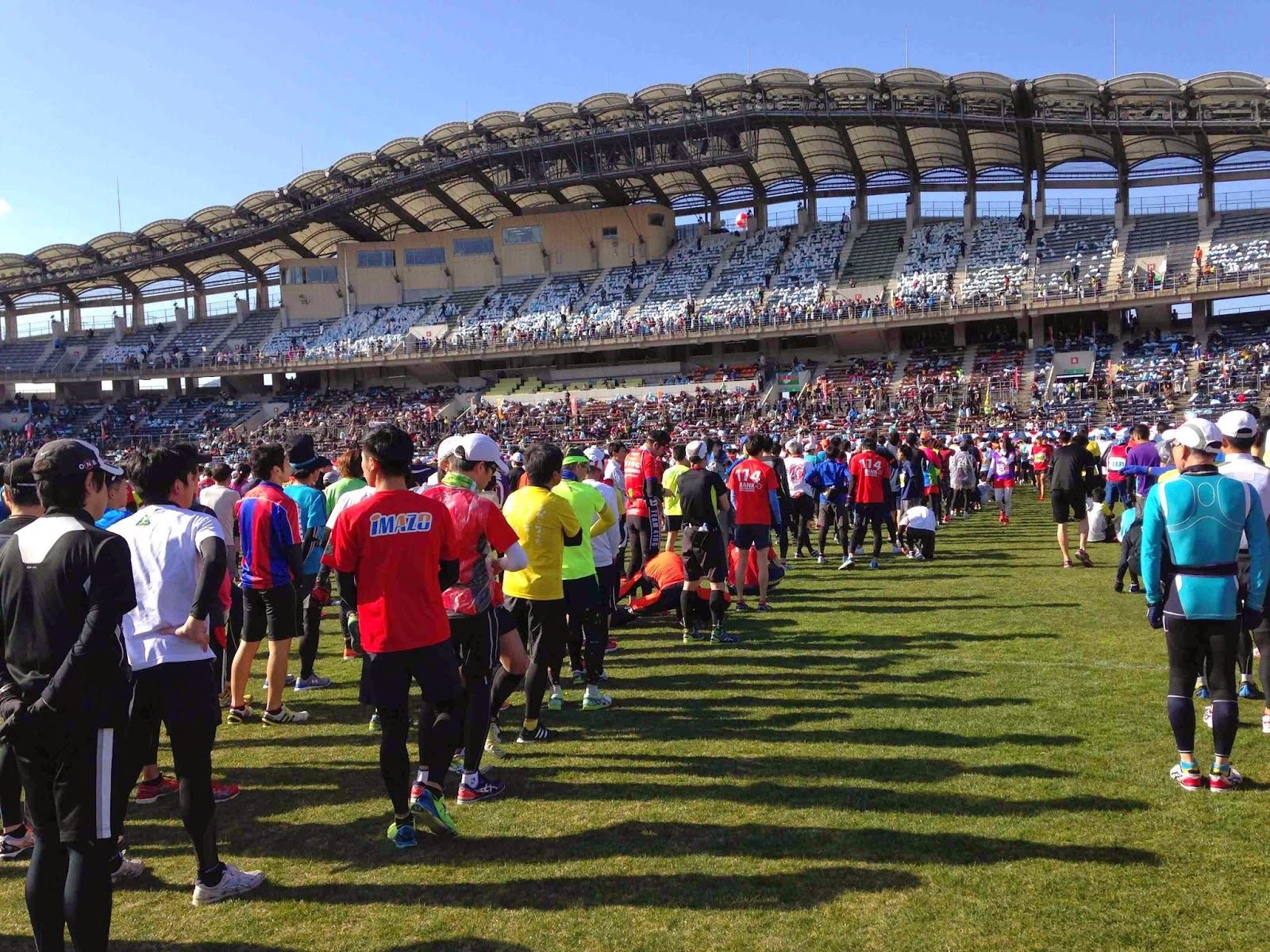
We apologize to everyone who had anticipated taking part in our race, but we ask for your understanding of this difficult situation. We hope for a solution to the coronavirus situation and look forward to welcoming you all to our next race on Feb. 6, 2022.
We will be busily preparing for that day and thank you all for your continued support of the Kagawa Marugame International Half Marathon. Kagawa Marugame International Half Marathon Organizing Committee.
This is the third major Japanese race of 2021 and, as far as I'm aware, the first World Athletics label race in 2021 worldwide to cancel. Marugame is Japan's premier winter half marathon, one of the deepest in the world and a key tuneup every year for top-level Japanese athletes competing in the Tokyo Marathon, Lake Biwa Marathon and Nagoya Women's Marathon.
by Brett Larner
Login to leave a comment
Kagawa Marugame Half Marathon
The Kagawa Marugame Half Marathon is an annual road running competition which takes place in early February in Marugame, Japan. It currently holds IAAF Silver Label Road Race status and the professional races attract over 1000 entries each year, and hosted by the Sankei Shimbun, Sankei Sports, Okayama Broadcasting, BS Fuji. The race in Marugame was first held in 1947...
more...Like everywhere else, lives and plans in Japan have been put on hold by the global outbreak of the Covid-19 virus
Japan was one of the first countries after China to detect cases of the virus, its first on 16 January, but taking until 7 April for official numbers to climb enough for the national government to declare a state of emergency.
The official response within Japanese athletics has been similar, simultaneously fast and slow. The Tokyo Marathon on 1 March was one of the first outside China to put a stop order on this year’s edition, announcing that it would cancel its mass-participation race and go ahead as an elite-only event. The Nagoya Women’s Marathon on 8 March echoed that days later.
But while other road races joined Nagoya in following Tokyo’s lead, outdoor track season appeared ready to go forward. Some individual events in early April were voluntarily cancelled, but after 2008 Olympic 4x100m silver medallist Naoki Tsukahara was diagnosed with the coronavirus on 30 March, the JAAF Athlete Committee submitted a formal written request to the JAAF that all competitions through the end of May be cancelled or postponed. The JAAF went one better, cancelling or postponing everything through the end of June, including the National Championships.
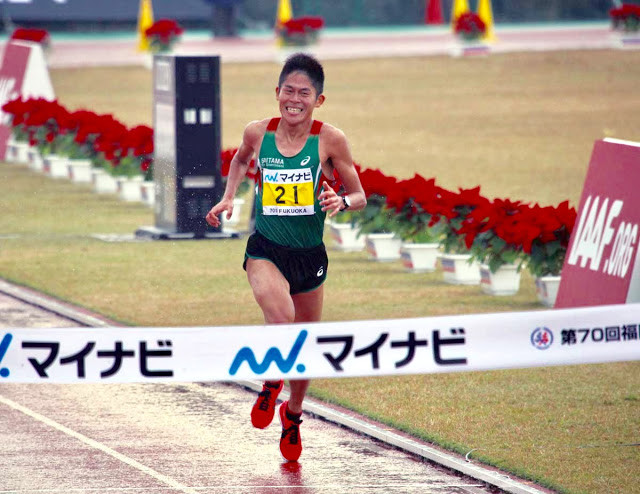
So where did this leave Japan’s athletes? For some, it put fresh-caught dreams straight on to ice. Tokyo, Nagoya and Lake Biwa were the culmination of a three-year process to put together the best Olympic marathon teams Japan could. After these races, on 8 March the JAAF confirmed the line-ups of Honami Maeda, Ayuko Suzuki, and Mao Ichiyama for women, and Shogo Nakamura, Yuma Hattori and Suguru Osako for men.
On 15 March at the 20km race walk Olympic trials, Nanako Fujii and Koki Ikeda joined Kumiko Okada, Toshikazu Yamanishi, Yusuke Suzuki and Masatora Kawano on the Olympic race walk teams. Eiki Takahashi was added a few weeks later.
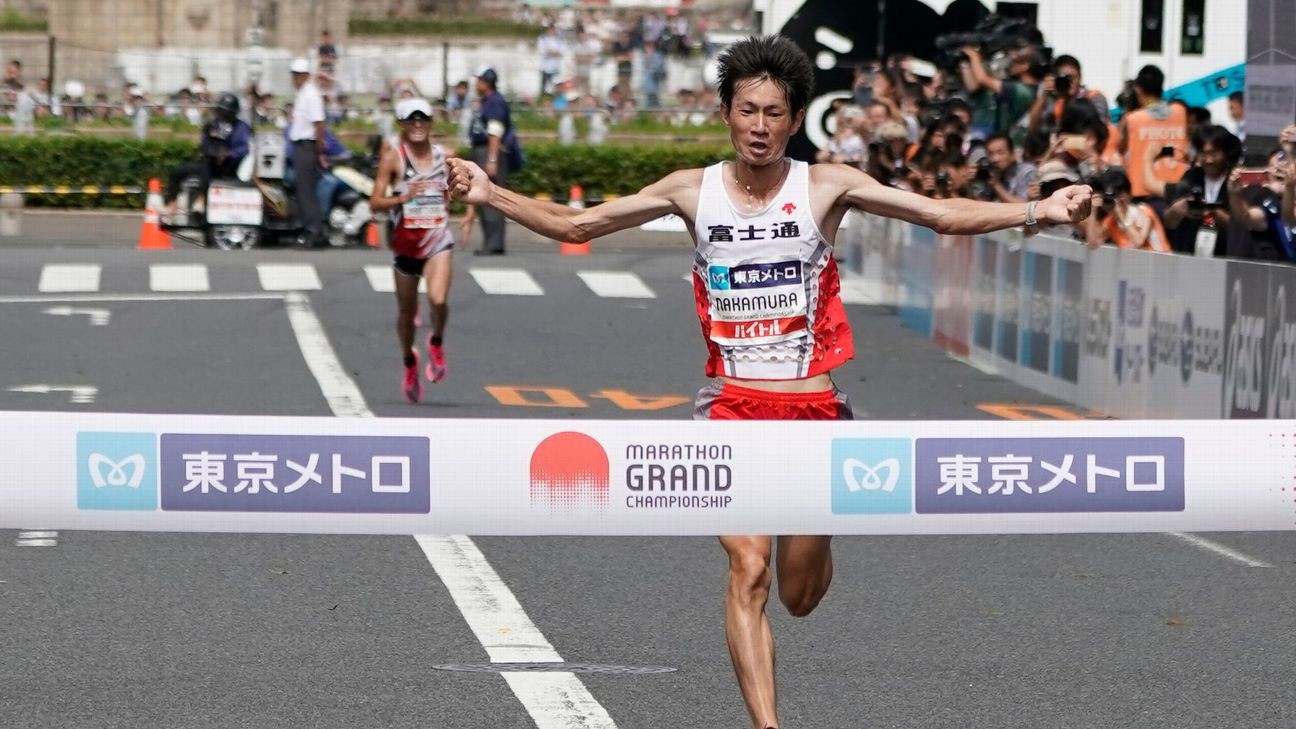
Japanese athletes have it easier. Low official infection numbers and the absence of a lockdown have meant comparatively fewer restrictions, but it’s still meant changes. Yuki Saito, assistant coach for both marathon runner Suzuki and 5000m Olympic team favourite Ririka Hironaka, said: “Suzuki was supposed to get physiotherapy at the Japan Institute of Sport Science, but it’s been closed and that’s been an issue. With 11 athletes on our team, we never have more than four or five running together. We can’t do out-of-town training, and since the declaration of emergency, the university where we do workouts has been closed. We’re probably going to use some nearby parks twice a week. With more people working from home there’ll be more around, so we have to be careful not to come too close.”
Post-collegiate Japanese athletes also have a little more peace of mind thanks to the corporate team system. Team members are salaried employees of the sponsor company, meaning that if the situation stretches on for months, they should still get paid whether or not they compete. That means less financial vulnerability than many professional athletes elsewhere.
But there is still the frustration of carefully worked-out plans thrown out the window and no races on the immediate horizon. Brendan Reilly, agent for all three women on the Olympic marathon squad, said: “We had race and/or training plans in place, and the last of those was scrapped in early April.”
For now, like everywhere, it’s a holding pattern. Like everywhere, Japanese athletes are doing what they can to stay optimistic and focused, and to help transmit the same feelings to the general population as the situation becomes more serious. From the members of the 4x100m team to high jump national record-holder Naoto Tobe to marathon runner Hattori, they’ve been posting workouts the average person can do at home, baking tips, and just positive messages.
“Sport is not only essential to maintain and elevate our physical and mental health,” wrote National Sports Agency commissioner and Olympic gold medallist Daichi Suzuki, “but also gives people pride, joy, dreams, excitement, courage. I hope all of us in the sport community can work together as one to help bring this public health threat under control.”
It’s a sentiment everyone in the sport worldwide can take to heart as we all face uncertainty in the year to come.
by Brett Larner for world Athletics
Login to leave a comment
Macharia Ndirangu wins Lake Biwa Marathon; Shogo Nakamura leads Japanese in seventh
OSAKA – Shogo Nakamura led the Japanese runners in the Lake Biwa Mainichi Marathon on Sunday, finishing in seventh place behind winner Macharia Ndirangu of Kenya.
Nakamura finished the sunny Shiga Prefecture race in 2 hours, 10 minutes and 51 seconds, while Ndirangu crossed the tape with a comfortable lead in 2:07:53.
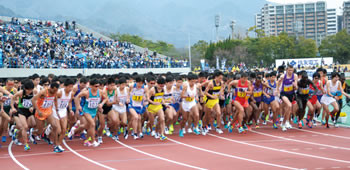
Kenyan Albert Korir (2:08:17) beat his personal best for second, and New Zealand’s Jake Robertson (2:08:26) broke a 34-year national record to finish third. Besides Korir, Nakamura and the top three runners were all making their marathon debut.
The result earned Nakamura a spot in next year’s Grand Championship, a qualifying race for Japanese runners for the 2020 Tokyo Olympics.
“I was desperate in the last kilometer because I didn’t want to miss (qualifying for the Grand Championships),” Nakamura said. “I was able to run with confidence since I trained hard.”
Masato Imai and Takuya Noguchi finished ninth and 10th, respectively.
Login to leave a comment
Osaka Marathon
In 2022 the Lake Biwa Mainichi Marathon and Osaka Marathon were held together. For 2023 the name of the marathon will be Osaka and both men and women can run the race. The original male-only competition was first held in 1946 and, having taken place every year since then, it is Japan's oldest annual marathon race. The early editions of...
more...An assault of Wilson Kipsang's course record on tap at the 75th edition of the Lake Biwa Marathon
An assault of Wilson Kipsang's 2:06:13 course record from 2011 is on tap at the 75th edition of the Lake Biwa Marathon, a World Athletics Gold Label road race, in Otsu, Japan, on Sunday.
Three sub-2:06 and two sub-2:07 runners are in the line-up. Four of those have career bests faster than Kipsang's nine-year-old record. All of those performances came in 2019, suggesting that quartet is on top of their game.
The fastest in the field is Evan Chebet who clocked 2:05:00 in winning last year's Buenos Aires Marathon. Chebet has also produced sub-2:06 runs in Valencia, Berlin and Seoul and also finished fourth in the Tokyo Marathon with 2:06:42.
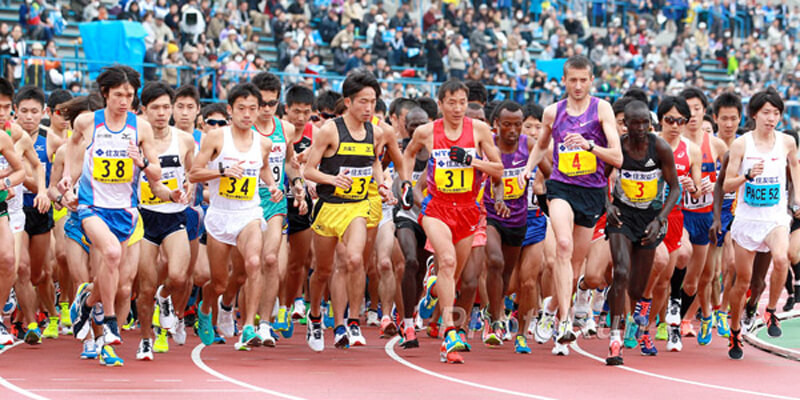
The next fastest is Filex Chemonges who broke the Ugandan national record with a 2:05:12 performance in Toronto last year. He has run three marathons and each time improved his personal best.
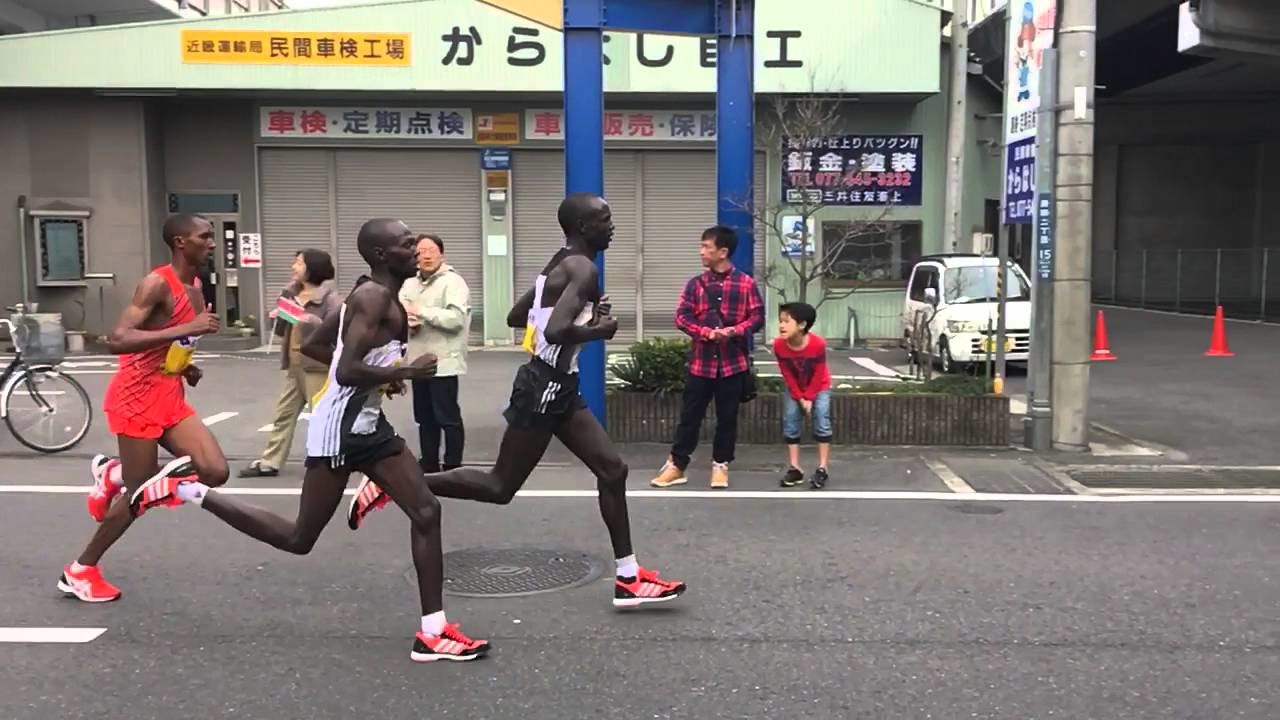
Felix Kiprotich, the third fastest in the field, won the 2019 Daegu Marathon with 2:05:33, and also has three more sub-2:07 runs to his credit. Samuel Ndungu, the Lake Biwa winner in 2015, improved his personal best to 2:06:02 in Lisbon last year. The final sub-2:07 man in the field is Dutch national record holder Abdi Nageeye who improved clocked 2:06:17 in Rotterdam, also last year.
Former winners joining Ndungu are 2018 champion Joseph Ndirangu and 2019 winner Salah Bounasar. Other contenders include Stephen Mokoka who was third in 2019 in 2:07:58, the second-best time of his career.
The race also serves as the final chance for Japanese men to win a spot on the Olympic Marathon team. To secure their spot, a runner must run faster than the 2:05:29 national record set last week by Suguru Osako.
The fastest among the five invited Japanese runners is Yuki Kawauchi, with a lifetime best of 2:08:14. Other high-profile Japanese include Takuya Noguchi, with a 2:08:59 best; Kohei Ogino, who's clocked 2:09:36; Shohei Otsuka, a 2:10:12 man; and Kengo Suzuki, who has a 2:10:21 best.
by World Athletics
Login to leave a comment
Osaka Marathon
In 2022 the Lake Biwa Mainichi Marathon and Osaka Marathon were held together. For 2023 the name of the marathon will be Osaka and both men and women can run the race. The original male-only competition was first held in 1946 and, having taken place every year since then, it is Japan's oldest annual marathon race. The early editions of...
more...The organizers of the Lake Biwa Marathon Ask People Not to Come Cheer
The organizers of the Mar. 8 Lake Biwa Marathon have asked people not to come cheer along the course in order to help slow the spread of the COVID-19 coronavirus.
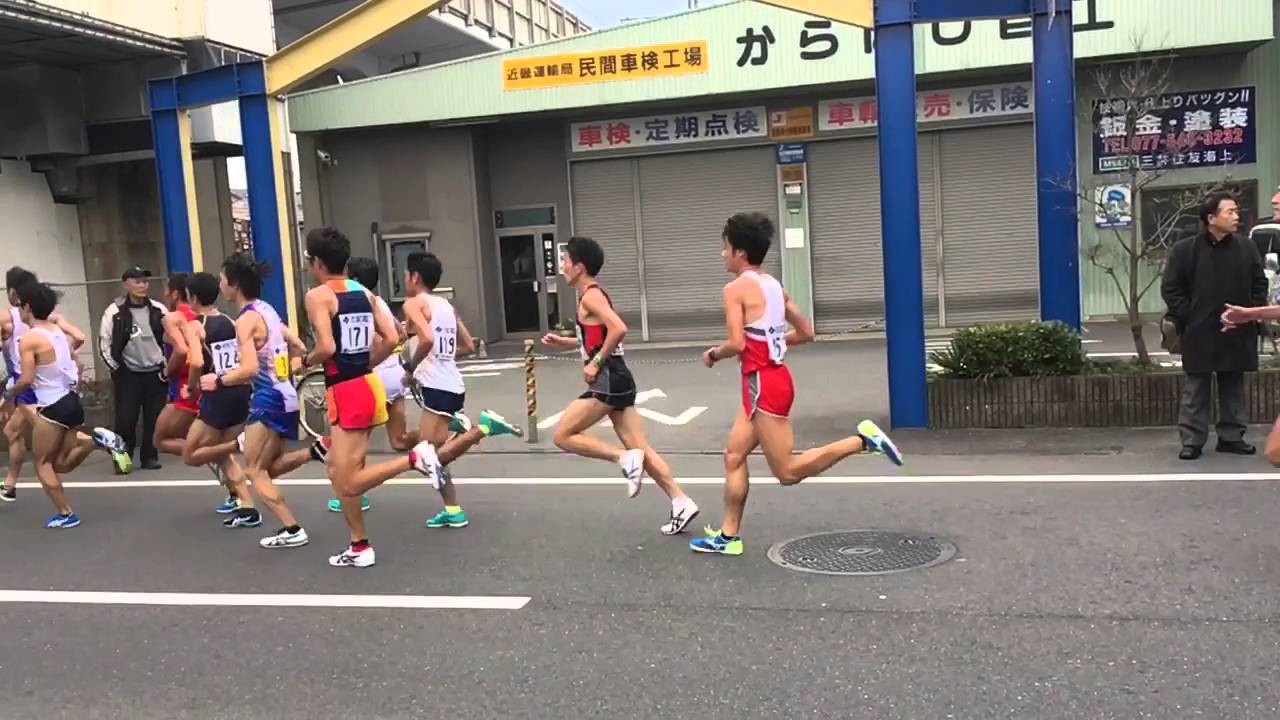
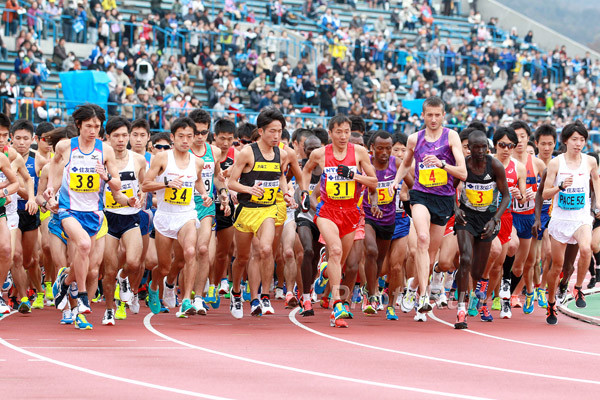
People involved with the race are being asked to wear masks and wash their hands, and alcohol disinfectants are being distributed as measures against infection.
The post-race award ceremony at a local hotel and an elementary school students' 1000 m track race during the marathon have been canceled in order to reduce the number of people assembled.
by Brett Larner
Login to leave a comment
Osaka Marathon
In 2022 the Lake Biwa Mainichi Marathon and Osaka Marathon were held together. For 2023 the name of the marathon will be Osaka and both men and women can run the race. The original male-only competition was first held in 1946 and, having taken place every year since then, it is Japan's oldest annual marathon race. The early editions of...
more...Defending champ Ruti Aga and last year's winner Birhanu Legese will be back for 2020 Tokyo Marathon
Ethiopia is pretty far down the road to overtaking Kenya as the world's leading marathon nation, and its presence is heavy in both the women's and men's fields for the Olympic year 2020 Tokyo Marathon. Lacking London's star power the Tokyo fields won't win many nominations for best of 2020, but with loads of World Marathon Majors top three finishers and winners of next-tier gold label marathons they're still fields at a level most other races would love to be able to pull off.
On the women's side, with PBs of 2:18:34 and 2:18:46 defending champ Ruti Aga and past winner Birhane Dibaba lead a main of twelve top-tier invited elites, of which nine were born in Ethiopia. The other three, Valary Jemeli Aiyabei, nationality transfer Lonah Chemtai Salpeter, and Selly Chepyego Kaptich, were all born in Kenya.
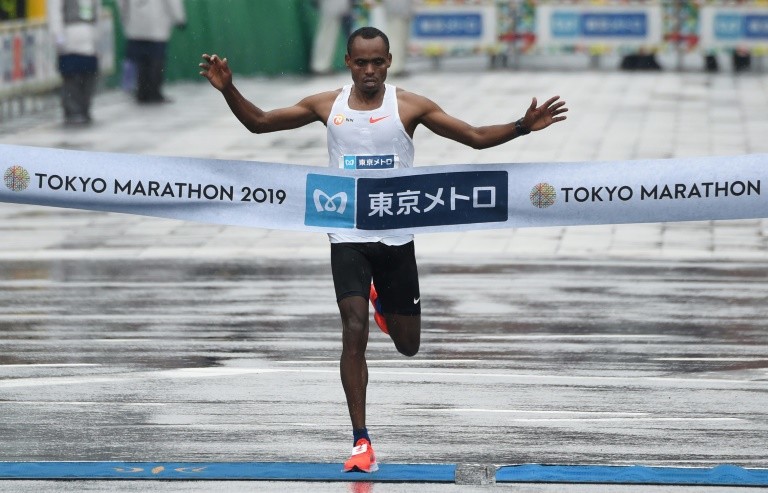
With Tokyo not counting in last-chance Olympic qualification for Japanese women the top entrant from outside those two countries is Japan's Haruka Yamaguchi, an amateur who took 7th in this past weekend's Osaka International Women's Marathon in 2:26:35. Former Canadian national record holder Rachel Cliff and locals Kaori Yoshida, Risa Noguchi, Shiho Kaneshige and Yurie Doi fill out the rest of the sub-2:30 set.
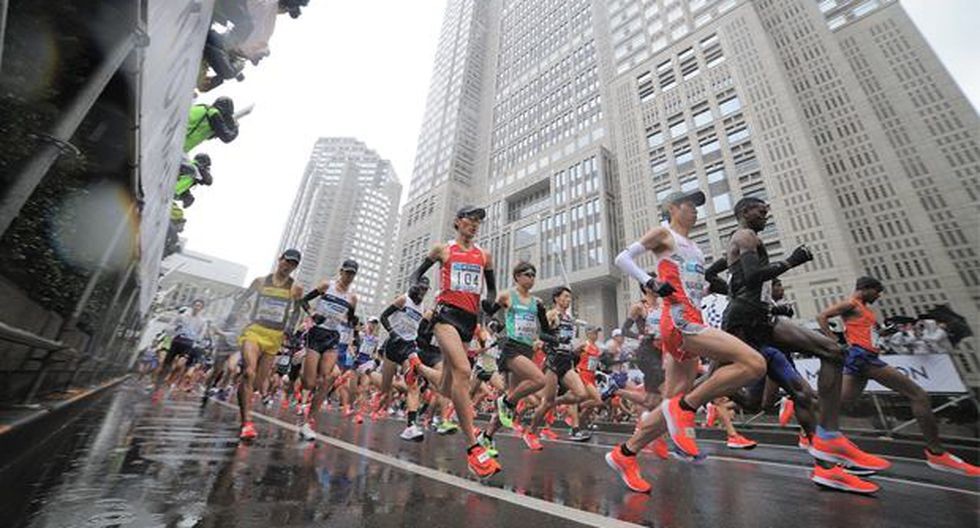
On the men's side Ethiopians make up five of the eleven invited internationals including the top four, with last year's winner Birhanu Legese leading the way in 2:02:48. Things are heavily stacked in the 2:04 to low-2:05 range, perfectly designed to set it up for the Japanese men. Their task and its payoff are simple: be the top Japanese guy in 2:05:49 or better and replace national record holder Suguru Osako (Nike) on the Sapporo 2020 Olympic marathon team.
Osako's there to stop them, fresh off a 25 km tempo in Dubai. His main competition is previous national record holder Yuta Shitara (Honda), who said last week that 2:05 isn't good enough and that if he doesn't run 2:04 in what he's calling his final marathon in Japan then he'll turn down the Olympic team spot.
Shitara's got that crazy edge working, which can count for a lot, but the biggest danger to Osako is probably going to be the ultra-disciplined Hiroto Inoue (MHPS), who ran 2:06:54 in Asics behind Shitara's NR two years ago, then made the switch to the Next% this season and promptly crushed the course record on the New Year Ekiden's longest stage. Put him in the same shoes as Osako and Shitara and they'd better watch out.
Kenta Murayama has the goods to be the other three's equal, but with his sponsor team Asahi Kasei having lost the plot when it comes to marathoning it would be a surprise to see him go much below 2:08. With twelve current sub-2:10 Japanese men in the field it's one of the best domestic races ever assembled, but apart from Murayama and possibly his talented teammate Shuho Dairokuno it's hard to see any darkhorses breaking through to the level of Osako, Shitara and Inoue.
Mizuki Matsuda's 2:21:47 win in Osaka last weekend bumped her up into the 3rd Olympic women's spot but left her vulnerable to others in Nagoya, but with all the main men in Tokyo it's even harder to see anyone in Lake Biwa a week later going better than what they might do here.
by Brett Larner
Login to leave a comment
Tokyo Marathon
The Tokyo Marathon is a world-renowned annual marathon held in Tokyo, Japan. As one of the prestigious Abbott World Marathon Majors, it attracts elite and amateur runners from around the globe. The race holds World Athletics Platinum Label status, recognizing its high competitive standards, top-tier organization, and international appeal. Sponsored by Tokyo Metro, the Tokyo Marathon has grown into one...
more...El Mahjoub Dazza wins the Fukuoka Marathon
It came down to a race between #1-ranked El Mahjoub Dazza (Morocco) and top Japanese man Taku Fujimoto (Toyota) after 30 km, but the Moroccan proved the stronger as he pulled away to win the Fukuoka International Marathon in 2:07:10.
Japanese men had to run under the national record of 2:05:50 to score the last spot on the 2020 Olympic marathon team. Fujimoto, 2:08 man Yuki Sato (Nissin Shokuhin) and ambitious 2:12 guy Takashi Ichida (Asahi Kasei) were the only ones to really give it a go, staying up front in the lead pack with most of the internationals, with Bedan Karoki (Kenya/DeNA) laying down the law at the head of the pacer group.
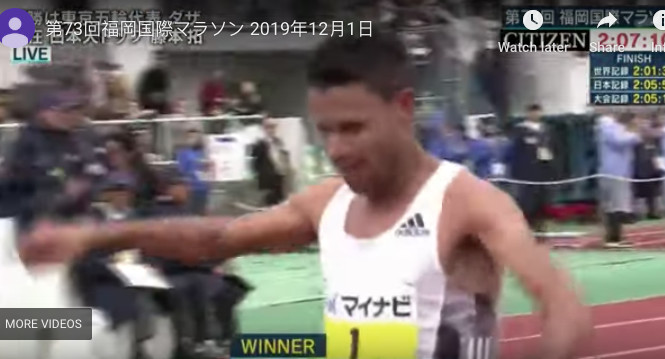
A secondary lead group quickly separated off the back of the lead group, with Japan-based Kenyan Daniel Muiva Kitonyi (Track Tokyo), 2:09:52 man Jo Fukuda (Nishitetsu), Keita Shitara (Hitachi Butsuryu) and others cutting back to 2:07 pace. European marathon champ Koen Naert (Belgium) and Pan-Am Games gold medalist Christian Pacheco (Peru) were more conservative, going out with the sub-2:10 pace B-group.
The high pace took its toll up front, with most of the invited internationals falling off and then dropping out to leave just Dazza, Fujimoto, Sato, Ichida and former Takushoku University ekiden captain Workneh Derese (Ethiopia/Hiramatsu Byoin).
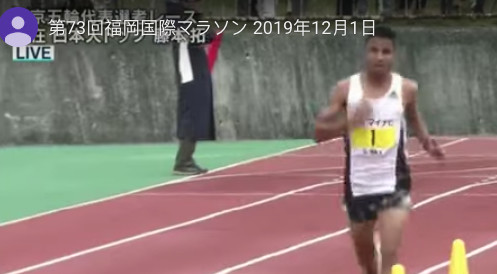
Ichida, Sato and Derese all fell back on the trip out to the 31.6 km turnaround point, leaving just Dazza and Fujimoto when the pacers stepped off at 30 km. Dazza immediately surged, breaking Fujimoto and running unchallenged for the win in 2:07:10. Fujimoto slowed progressively, almost shuffling down the home straight of the track for 2nd in 2:09:36 after a 1:03:02 first half. Derese dropped Sato, but in the last km he was run down by second group runner Fukuda who took 3rd in 2:10:33 to Derese's 2:10:52 for 4th.
Early caution paid off, as runners from the sub-2:10 third pack took the next four spots led by Natsuki Terada (JR Higashi Nihon), who closed with the fastest split in the field, 6:44, for a 5-minute PB of 2:10:55 and a 5th-place finish.
Raymond Kipchumba Choge (Kenya) was the only other athlete from the original front pack to make the top 10, taking 9th in 2:11:38. Taiki Suzuki (Raffine) followed up a solid 3rd-place finish two weeks ago at China's Yiwu International Half Marathon with a 2:12:09 debut for 10th.Amateur runner Yusuke Tobimatsu (Hioki City Hall), a regular front runner in Fukuoka, survived going with the sub-2:10 this time to take 11th in a major PB of 2:12:44, while Sato faded to 2:14:56 after going through halfway in 1:03:02.
Still on sub-2:10 pace at 35 km, Ichida paid heavily for his own 1:03:02 first half as he fell to 29th in 2:19:05. Fan favorite Shitara, twin brother of former national record holder Yuta Shitara (Honda), fell short of his sub-2:10 goal at 14th in 2:14:31 just ahead of Sato.
Apart from Dazza and Choge, the only other invited internationals to finish were Naert and Pacheco, Naert finishing 18th in 2:15:51 and Pacheco 40th in 2:21:15.The Final Challenge series, the three-race chance for men to replace Osako on the 2020 Olympic team, continues in March with the Tokyo Marathon and Lake Biwa Marathon.
The dire crash and burn results today showed just how high a bar it will be to pull off, and that whatever else happens there's really only one person who could do it. But with the Valencia Marathon having quickly surpassed Fukuoka's place on the world calendar and the Osaka Marathon putting on heavy domestic pressure, more than ever before today's race seemed like a relic of times gone by.
Dazza's winning time was only just over 30 second faster than Osaka winner Asefa Tefera's, and Osaka had a quality women's race and field of over 30,000 on top of that. What is Fukuoka's route forward to stay relevant in a rapidly changing landscape?
Login to leave a comment
Fukuoka Marathon
The Fukuoka International Open Marathon Championship is one of the longest running races in Japan, it is alsoan international men’s marathon race established in 1947. The course record is held by Tsegaye Kebede of Ethiopia, running 2:05:18 in 2009. Frank Shorter won first straight years from 1971 to 1974. Derek Clayton set the World Record here in 1967 running 2:09:37. ...
more...El Mahjoub Dazza, Koen Naert, Ayana Tsedat, and Yuki Kawauchi are set to compete for the title at Fukuoka Marathon
When the Fukuoka International Marathon became a non-domestic race in 1966, the intent of the organizer was to invite the winners from all the international championship marathons which took place over the previous 12 months. In keeping with the spirit of the event, this year’s edition of the World Athletics Gold Label road race, set to take place on Sunday, December 1st, , features European champion Koen Naert and Pan American Games gold medalist Christian Pachoco.
Naert recorded his marathon personal best, 2:07:39, at this year’s Rotterdam Marathon. But Morocco’s El Mahjoub Dazza is the fastest in the field as he recorded 2:05:26 at the 2018 Valencia Marathon and 2:05:58 in Prague earlier this year. Those two performances are faster than the PBs of all the other runners in the field.
“I am ready,” he said. “If the weather is good, I can run fast.”
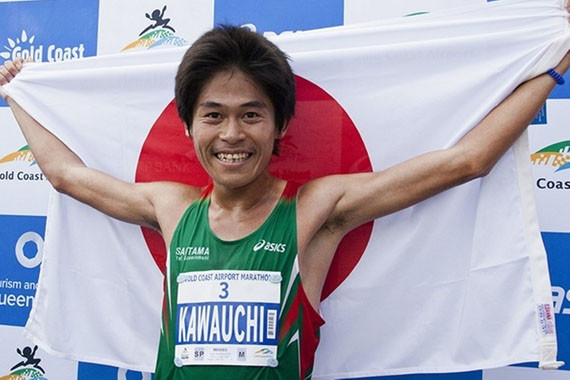
Other invited runners include Tsedat Abeje Ayana, who set a PB of 2:06:36 in Seville earlier this year, as well as sub-2:09 performers Raymond Choge, Amanuel Mesel, Abdi Ibrahim Abdo, and Shadrack Kiplagat. Mesel has competed in the past four editions of Fukuoka Marathon and has broken 2:10 in 2017 and 2018.
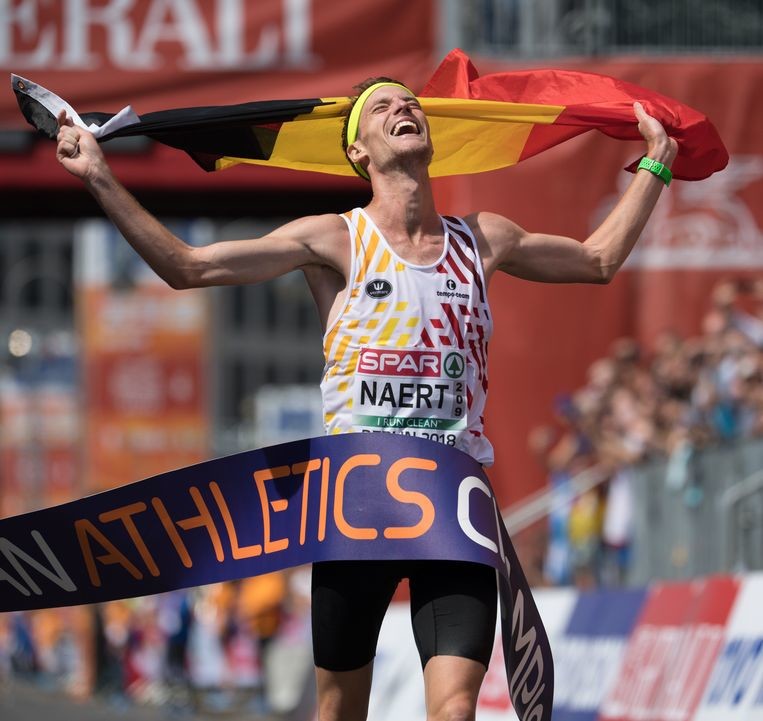
Kenyans running for a corporate sponsored team won the race on three occasions between 2011 and 2013. This year Michael Githae, who runs for Suzuki Hamamatsu Athletics Club, will try to become fourth Kenyan with a Japanese connection to win the Fukuoka Marathon. He was eighth at the 2017 Fukuoka Marathon and recorded a personal best of 2:09:21 at the 2018 Lake Biwa Marathon.
For Japanese runners, the significance of the race is that anybody who improves the national marathon record, 2:05:50, will clinch the third spot on the Japanese Olympic Marathon team – unless someone else improves the record further at the 2020 Tokyo or the Lake Biwa Marathon. Given the Japanese entrants for Sunday’s race, however, a national record appears unlikely in Fukuoka.
Taku Fujimoto, who ran 2:07:57 at the 2018 Chicago Marathon, is the fastest Japanese runner in the field, while Yuki Sato, who has a 10,000m best of 27:38.25, may have the best marathon potential.
Yuki Kawauchi will run the Fukuoka Marathon for the fifth straight year. His personal best is 2:08:14, while his best time in Fukuoka is 2:09:05 from 2013. Now that Kawauchi no longer works for Saitama prefecture government, he may be ready for a quicker time.
by World Athletics
Login to leave a comment
Fukuoka Marathon
The Fukuoka International Open Marathon Championship is one of the longest running races in Japan, it is alsoan international men’s marathon race established in 1947. The course record is held by Tsegaye Kebede of Ethiopia, running 2:05:18 in 2009. Frank Shorter won first straight years from 1971 to 1974. Derek Clayton set the World Record here in 1967 running 2:09:37. ...
more...Japanese Yuta Shitara will Go For National Record in Tokyo Marathon, I Care About the 100 Million Yen Bonus More Than the Olympics, he says
There's a lot of attention right now on the last remaining spot on the 2020 Olympic marathon team. The first two spots were secured by the 1st and 2nd-placers at the MGC Race, Shogo Nakamura (Fujitsu) and Yuma Hattori (Toyota).
To claim the last remaining spot, someone has to break the Japanese national record and run at least 2:05:49 at this winter's Fukuoka International Marathon, Tokyo Marathon or Lake Biwa Mainichi Marathon. If nobody succeeds, the spot will go to MGC 3rd-placer and current national record holder Suguru Osako (ex-Nike Oregon Project).The favorite to pull it off, after his run at East Japan Shitara talked about his plans for next year's Tokyo Marathon. But he did so in a characteristically Shitaresque way. "As long as you're competing in sports, [the Olympics] are something you aim for," he said.
"I'm running the Tokyo Marathon next year, but I don't really care that much about the Olympics. I care more about getting the 100 million yen bonus [$920,000 USD]. That's my priority. I'm running it for the money. The MGC Race didn't have any prize money, and I'm living right now because I can run. It takes money to run."Making clear his focus on scoring the Project Exceed bonus for breaking the marathon national record again, Shitara seemed to suggest that if he succeeds in winning a place on the 2020 Olympic team he might turn it down. "
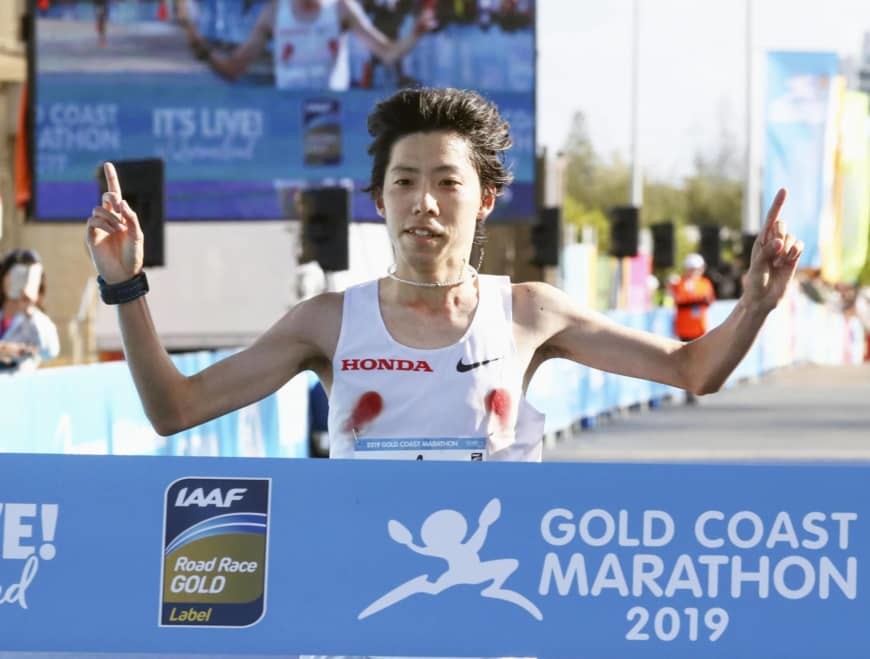
"I'm not going to say myself that I'll run [the Olympics]," he said. "The public would probably rather see Osako run there. He's got better achievements in international competitions.
He'd definitely get the job done, and if you leave it to him there won't be any doubt. I'll leave it to the public to decide." Of the Olympic marathon's move to Sapporo he said, "If that's what has been decided then there's no choice but to obey."Now 27 years old with his own unique way of looking at the world, Shitara expressed a sense of frustration with the current state of the marathon as an event. "It's really boring to run all these races set up by old people these days," he said. "I think we're going into an era when change is going to come from the athletes.
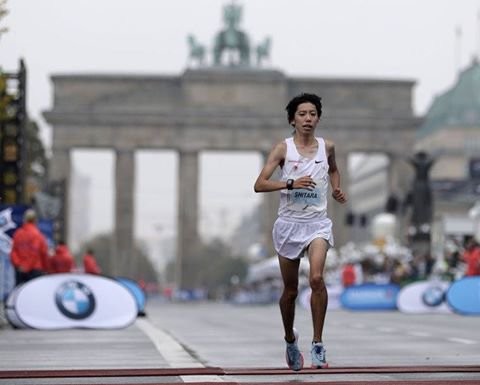
I want to change, and I can't wait for that day to come." The first step is to try to score his second 100 million yen bonus in Tokyo. "It's a race against Osako's record," he said. "I'll be going for it as long as I can run."
Login to leave a comment
Tokyo Marathon
The Tokyo Marathon is a world-renowned annual marathon held in Tokyo, Japan. As one of the prestigious Abbott World Marathon Majors, it attracts elite and amateur runners from around the globe. The race holds World Athletics Platinum Label status, recognizing its high competitive standards, top-tier organization, and international appeal. Sponsored by Tokyo Metro, the Tokyo Marathon has grown into one...
more...Yuta Shitara sets new course record at the Gold Coast Marathon even when weather conditions were not ideal
The second fastest Japanese marathon runner in history became the fastest runner in Gold Coast Marathon history when Yuta Shitara won the IAAF Gold Label race in 2:07:50 this morning.
The 27-year-old had an exciting duel with placegetters Barnabus Kiptum of Kenya and Zane Robertson of New Zealand over the final 12km before making his move with 2km remaining.
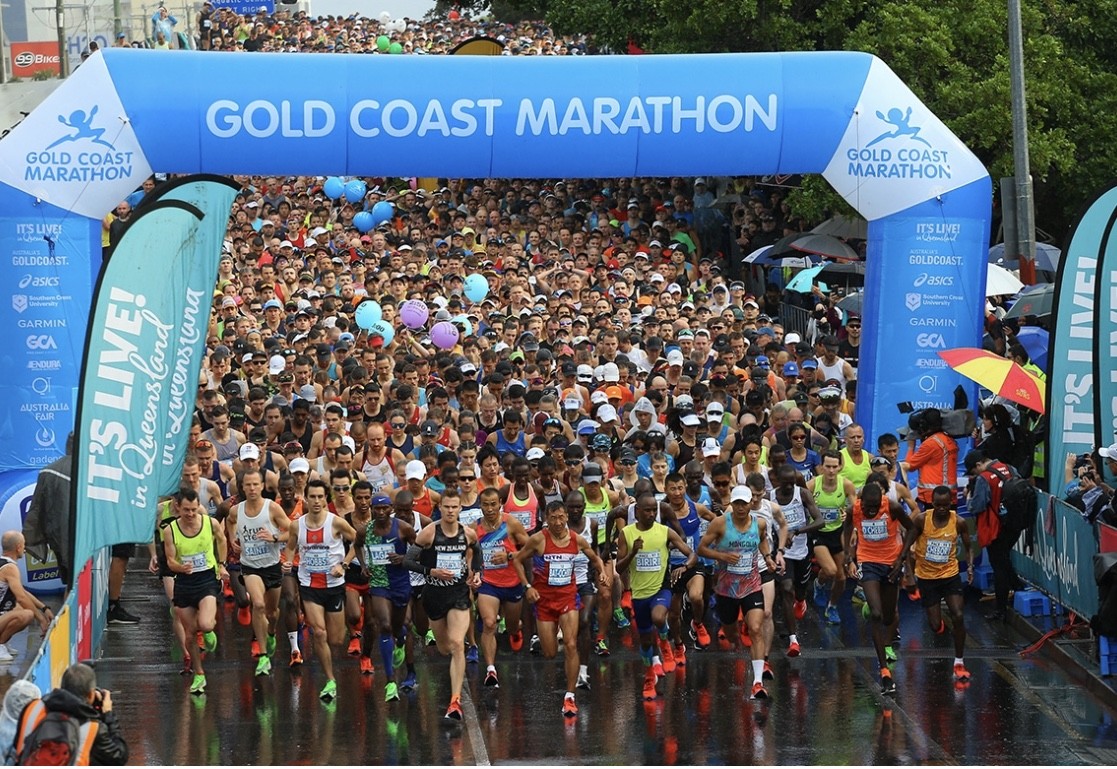
It was the eighth win by Japanese men in the 41-year history of the event and bettered the race record and Australian all comers record previously held by Kenyan Kenneth Mungara (2:08:42).
Shitara takes home $20,000 in victory prize money and an additional $10,000 time bonus for his record-breaking effort today.
Kiptum, the winner of the Hong Kong Marathon in February, finished second in a personal best 2:08:02, while marathon debutant Robertson placed third in 2:08:19.
It was an extra special result for Robertson as his time was a New Zealand record, bettering the previous mark of his brother Jake (2:08:26, Lake Biwa, 2018), and he was crowned the IAAF Oceania Area Marathon Champion for 2019.
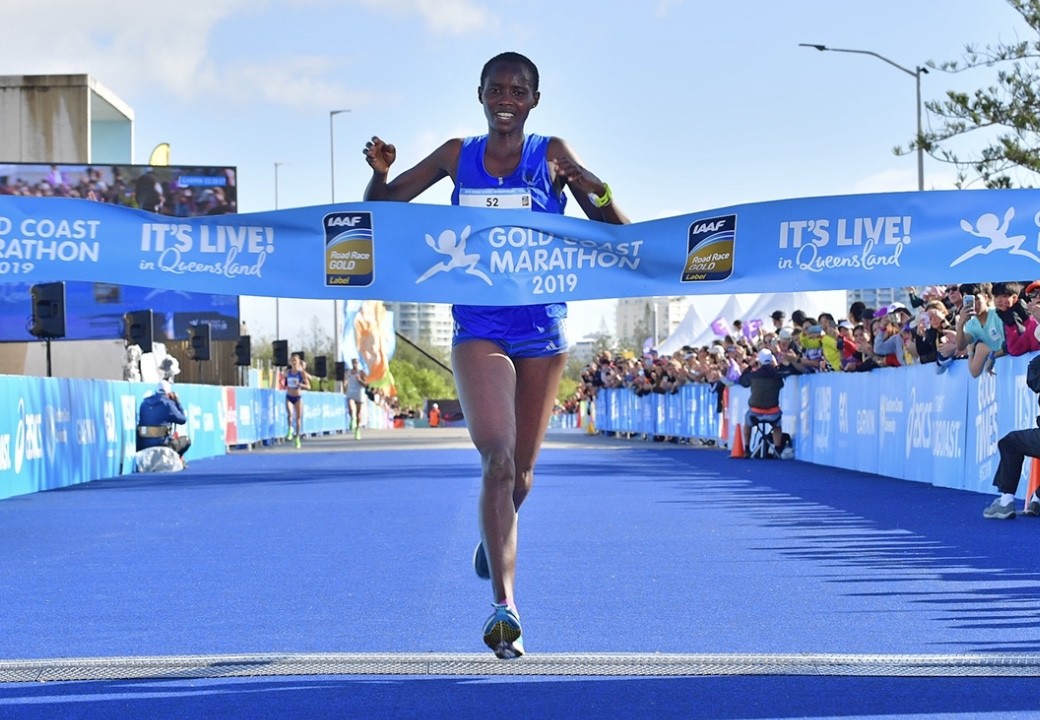
The first Australian across the line was Victorian Liam Adams in sixth place clocking a pb 2:11:36 – a bittersweet result for the 32-year-old as it was an agonising six seconds outside the 2020 Olympic qualification standard.
Dual world champion over 1500m and 5000m on the track Bernard Lagat (USA) improved his marathon pr to 2:12:10 for seventh place, while 2013 race winner Yuki Kawauchi (JPN) placed 13th in 2:15:32.
"It's definitely a confidence builder, and I have had a lot of things to make me confident, but this is a big one heading into the Japanese Olympic trials," said Shitara.
Shitara, who stayed with the lead group of four throughout the race, said although he was not aiming for a particular time or result, the win showed his training had paid off.
“We did a lot of training, and I think that helped," he said in a post-race interview.
Weather conditions on the Gold Coast were less than ideal, with athletes in both the full- and half-marathons battling headwinds and heavy rain.
"Honestly, I'd like to be able to run together with Yuta but I'm still not good enough," Kimura said.
Kenyan Rodah Jepkorir (KEN) held off a strong finishing burst from Tasmanian Milly Clark (AUS/TAS) to take the women’s Gold Coast Marathon.
The 27-year-old broke away from the 30km mark and then lasted to break the tape in 2:27:56, with Clark second (2:28:08) and Eritrea’s Nazret Weldu (ERI) third in 2:28:57.
This year’s eight Gold Coast Marathon races attracted a total of 26,287 entries, including 3,678 overseas competitors, as the event continues to achieve a long-term upward trend.
Login to leave a comment
Gold Coast Airport Marathon
The Gold Coast Airport Marathon is held annually in one of the most popular holiday destinations in the world. It is Australia’s premier road race and was the first marathon in the country to hold an International Association of Athletics Federations (IAAF) Road Race Gold Label. The event is held on the first weekend of July and attracts more than...
more...A deep field is targeting the men’s course record at the Lanzhou International Marathon this weekend
Eight runners toeing the line have career bests faster than the 2:10:10 course record set by Abayneh Ayele of Ethiopia in 2015, with Ethiopia’s Limenih Getachew the fastest thanks to his personal best of 2:06:49 set at the 2014 Paris Marathon.
The 29-year-old came close to that mark last October when he registered a winning mark of 2:07:34 to break the Portuguese all-comers’ record at the Lisbon Marathon. He achieved his second career best time of 2:07:30 in March with a fifth finish in Barcelona.
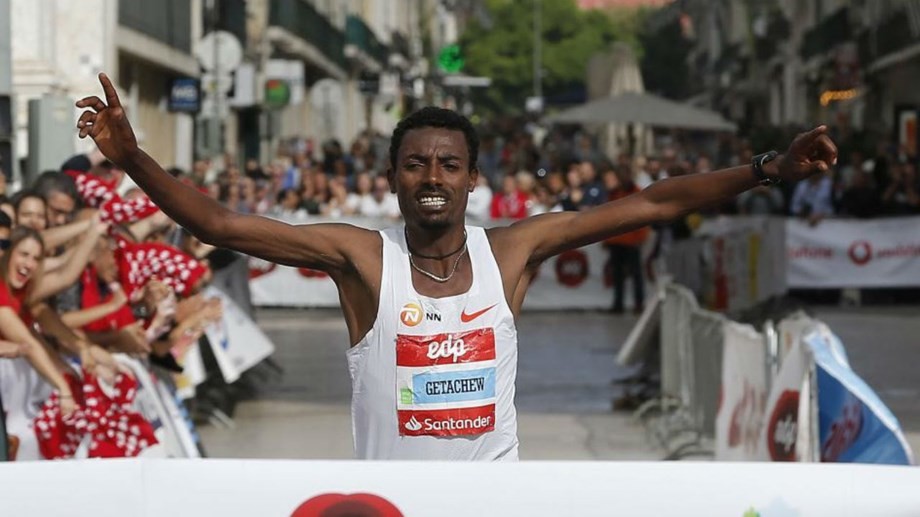
It will be Getachew’s second race in China following his fourth place finish at the Hengshui Lake Marathon in 2016.
Bahrain’s Benson Seurei is another man to watch. The 35-year-old, who used to compete mainly in middle distance events and grabbed a 1500m silver medal at the Asian Indoor Championships in 2016, only debuted over the classic distance in 2017 but progressed rapidly with his PB of 2:07:37 set last December in Valencia.
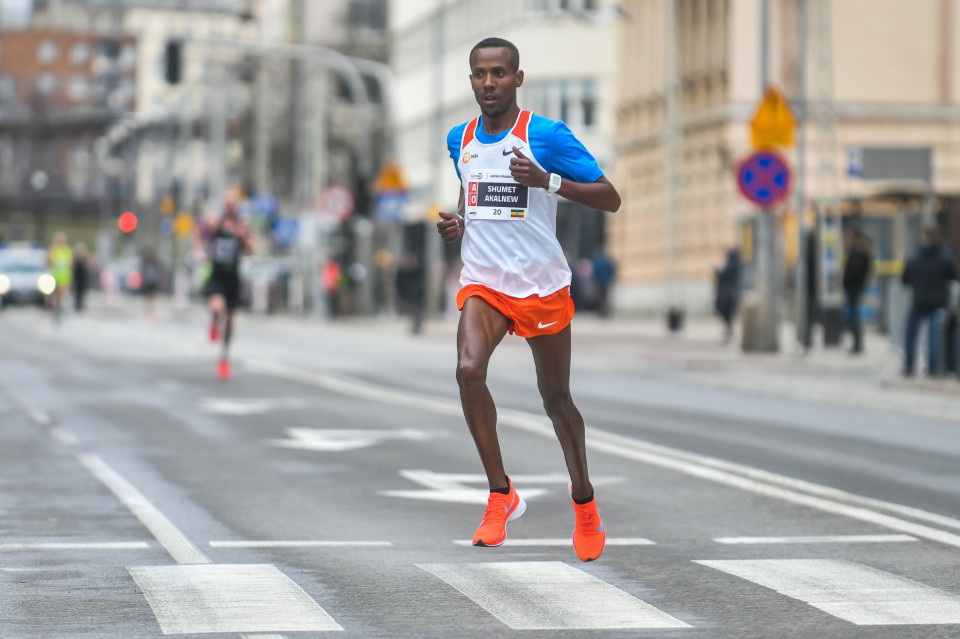
Seurei clocked 2:08:08 to finish fourth at the Lake Biwa Marathon in March and is yet to gain his first title after five marathon races.
Shumet Akalnew of Ethiopia is also chasing his first marathon title in Lanzhou. The 31-year-old clocked a life-time best of 2:08:50 to finish third in Kosice last year and achieved another third place finish in Mumbai four months ago with a 2:10:24 clocking.
The Ethiopian contingent also include Bira Seboka, a 2:08:51 performer, and Afewerk Mesfin, who improved his PB to 2:09:28 in Xiamen this year. The other sub-2:10 runners in the field are Bahraini Zelalem Bacha with a PB of 2:09:16, Kenya’s Mike Kiprotich Mutai, whose PB of 2:09:18 dates back to 2012, and Motlokoa Nkhabutlane of Lesotho.
by IAAF
Login to leave a comment
Lanzhou International Marathon
Lanzhou International Marathon has been honorably awarded as China’s “Best Marathon” and “Marathon Gold Label Race” by Chinese Athletics Association, meanwhile it has upgraded into one of the National Scoring Races.Lanzhou International Marathon is carefully crafted on the course along the Yellow River line which is spotted with beautiful natural scenery and mountains and waters along the way, and it...
more...New Zealand-born Zane Robertson eagerly awaiting marathon debut at Gold Coast
When you want to be the best at something, you surround yourself with the best. That was New Zealand-born Zane Robertson’s thinking when he and twin brother Jake Robertson shunned US athletics scholarships and moved to Kenya at age 17 to immerse themselves in one of the culture that produces the world’s best runners.
Dubbed ‘Elvis’ by the Kenyans for once dying his hair black, the 29-year-old New Zealand 10,000m national record holder and Glasgow 2014 Commonwealth Games 5,000m bronze medallist has chosen to make his marathon debut at the Gold Coast Marathon, an IAAF Gold Label road race, on 7 July.
After a groin injury ruled him out of his first marathon at the Gold Coast 2018 Commonwealth Games, Robertson is hungry to make amends on the same flat and fast course.
“Missing out last year when I was in crazy shape was devastating. I watched the race from Kenya and couldn’t stop thinking about how I could have won,” Robertson said.
“By coming to the Gold Coast Marathon, I feel I can replace that loss of mine.”
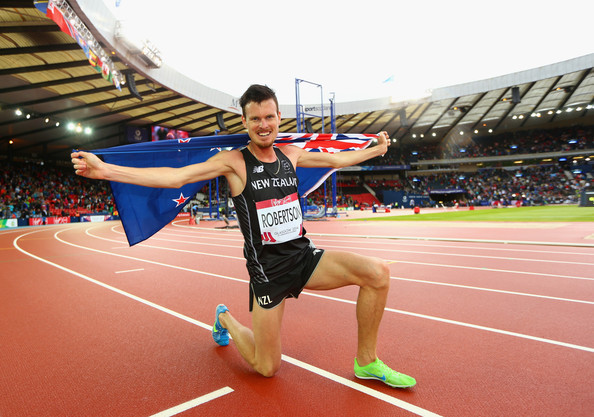
Robertson, who has a half marathon PB of 59:47, is not letting last year’s disappointment faze him in the lead up to his first attempt at 42.195km.
“The mind is such a powerful thing in sport, especially in long distance races,” he said.
“If you don't believe in yourself, you've already lost. I always feel confident; if I don't, I won't race.”
Robertson is upbeat about his potential in this year’s event, despite toeing the line alongside a stellar line up in the men’s marathon including 2013 champion and 2018 Boston Marathon winner Yuki Kawauchi of Japan and three-time Gold Coast Marathon champion and race record holder Kenneth Mungara of Kenya.
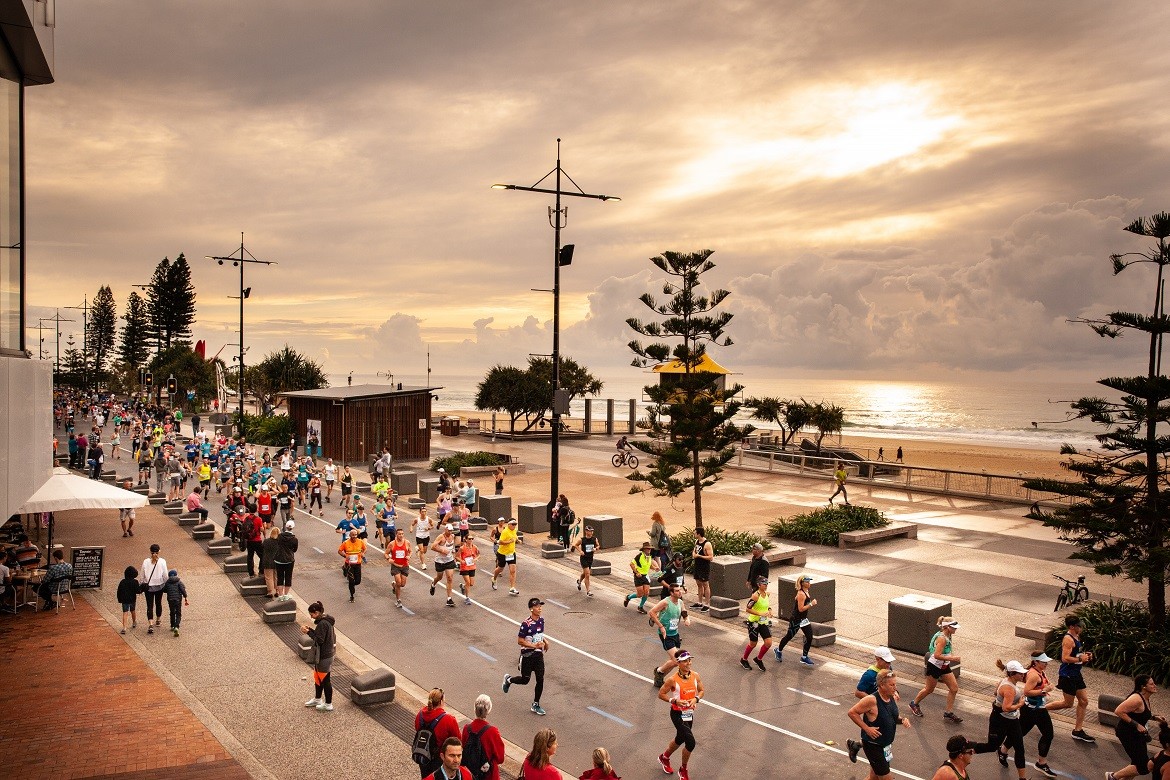
“First and foremost, I always target the win. I want to run as fast as the pacemakers allow and once they step off the road anything can be possible. Perhaps a new Oceania record?” Robertson said.
Robertson and his brother have now spent over a decade in Kenya and Ethiopia learning what makes the best runners tick and while the jury is out on whether it is nature or nurture, he’s confident the lessons learnt both on and off the track will stand him in good stead for a fast marathon time.
“I’ve learnt to live a runner’s life - which means to have discipline when you’re training, and to relax and recover when you’re not,” he said.
Twin brother Jake placed third on debut at last year’s Lake Biwa Marathon in Japan in an impressive 2:08:26, a time 16 seconds faster than Mungara’s Gold Coast Marathon race record of 2:08:42 set in 2015.
But despite his brother seemingly throwing down the gauntlet, Zane remains assured the pair have moved past sibling rivalry.
“We realised that this world is so much bigger than that and the challenge is not with each other but against ourselves to be better than we were yesterday,” he said.
Login to leave a comment
Gold Coast Airport Marathon
The Gold Coast Airport Marathon is held annually in one of the most popular holiday destinations in the world. It is Australia’s premier road race and was the first marathon in the country to hold an International Association of Athletics Federations (IAAF) Road Race Gold Label. The event is held on the first weekend of July and attracts more than...
more...Ethiopia’s Abera Kuma just might be the most talented runner in the Scotiabank Ottawa Marathon this year
The 28-year-old has twice bettered 2:06 in his career, most recently when finishing second at the 2018 Rotterdam Marathon in a PB of 2:05:50. The other occasion was at the 2014 Berlin Marathon where Kuma finished third in 2:05:56 in the race in which Kenya’s Dennis Kimetto set a world record of 2:02:57, which has since been broken by Eliud Kipchoge.
In between those two races, Kuma has made his mark across the globe. Now he sets his sights on racing in the Canadian capital.
“I want to win and I want to run fast,” he said. “I hope the conditions will be kind to me. Yes, (the course record is a target) though it all depends on the conditions.”
Compatriot Yemane Tsegay set that record (2:06:54) in 2014.
Kuma’s performance in Rotterdam was all the more startling since he had run, and finished, Japan’s Lake Biwa Marathon (2:09:31) just 35 days earlier – hardly the ideal preparation for a world-class marathon.
“At Lake Biwa I did not feel well and had a bad day at the office,” he explains. “I felt like I ran at 95% without being able to give more than that. After finishing I still felt strong and very disappointed about the race. I needed to take revenge quickly and the gamble paid off.”

Kuma has a level of confidence matching his ability. Unlike many of today’s marathon runners, he took up road racing after a successful career on the track. Twice he represented Ethiopia at the IAAF World Championships, finishing fifth in the 5000m in 2011 and fifth in the 10,000m in 2013. With 5000m and 10,000m personal bests of 13:00.15 and 26:52.85, he has basic speed matched by very few road racers.
“I had a short track career but always wanted to go to the road fairly quickly,” he says. “Track has helped me to be a stronger road runner, though.
“I like the endurance that belongs to road running and marathons. Running is fun to do and I enjoy it, but it is also my job. In marathon running the financial aspect is important.”
The lucrative prize money in road racing, coupled with the fact there is a limited number of track races with decent prize money, has seen many young East African athletes go straight to the roads. First place in Ottawa is worth CDN$30,000 with another CDN$10,000 on offer for a course record.
As Kuma says, running is his job. And, he is happy to share his experience with younger up-and-coming Ethiopian runners, many of whom are part of the training group under coach Tessema Abshero, who himself was a 2:08 marathon runner.
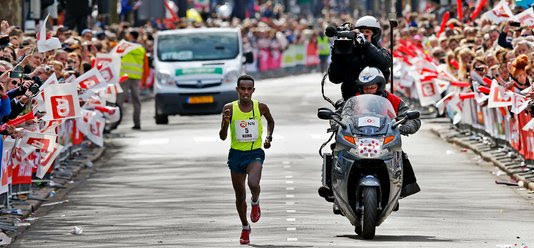
“I would advise others to run track but I also know that it is not easy to do that as the track races are scarce these days,” Kuma says.
Training is going well currently he says, despite a mediocre performance at the Mumbai Marathon in January when he finished seventh in 2:13:10.
“I am preparing really well and my last test (a half marathon in Spain where he ran 1:00:41) was good,” he says. “Now I am finalising the endurance part to bounce back strongly after a disappointing race in Mumbai. The conditions in Mumbai were very difficult (heat, air quality) and the course was tough. I was with the lead group for a long part of the way but suffered a lot in the last seven kilometres.
Kuma has a marathon personal best of 2:04:24. There are others of similar quality among Kuma’s training partners. Most significantly, all of this training is done at altitudes of at least 2600m. It’s hard work but with a group sharing the load and the drudgery it is normal. Down time is used to relax and recover and wait for the next workout.
by IAAF
Login to leave a comment
Ottawa Marathon
As one of two IAAF Gold Label marathon events in Canada, the race attracts Canada’s largest marathon field (7,000 participants) as well as a world-class contingent of elite athletes every year. Featuring the beautiful scenery of Canada’s capital, the top-notch organization of an IAAF event, the atmosphere of hundreds of thousands of spectators, and a fast course perfect both...
more...2016 Rio Olympics marathoner 39-year-old Suehiro Ishikawa will retire from competition at the end of March
Japan's 39-year-old Suehiro Ishikawa, 2016 Rio Olympics marathoner announced that he will retire from competition at the end of the month.
At the time of the Rio Olympics Ishikawa was 36 years and 11 months old, surpassing 1996 Atlanta Olympics marathoner Hiromi Taniguchi's record of 36 years and 3 months to become Japan's oldest-ever Olympic marathoner. He finished 36th.
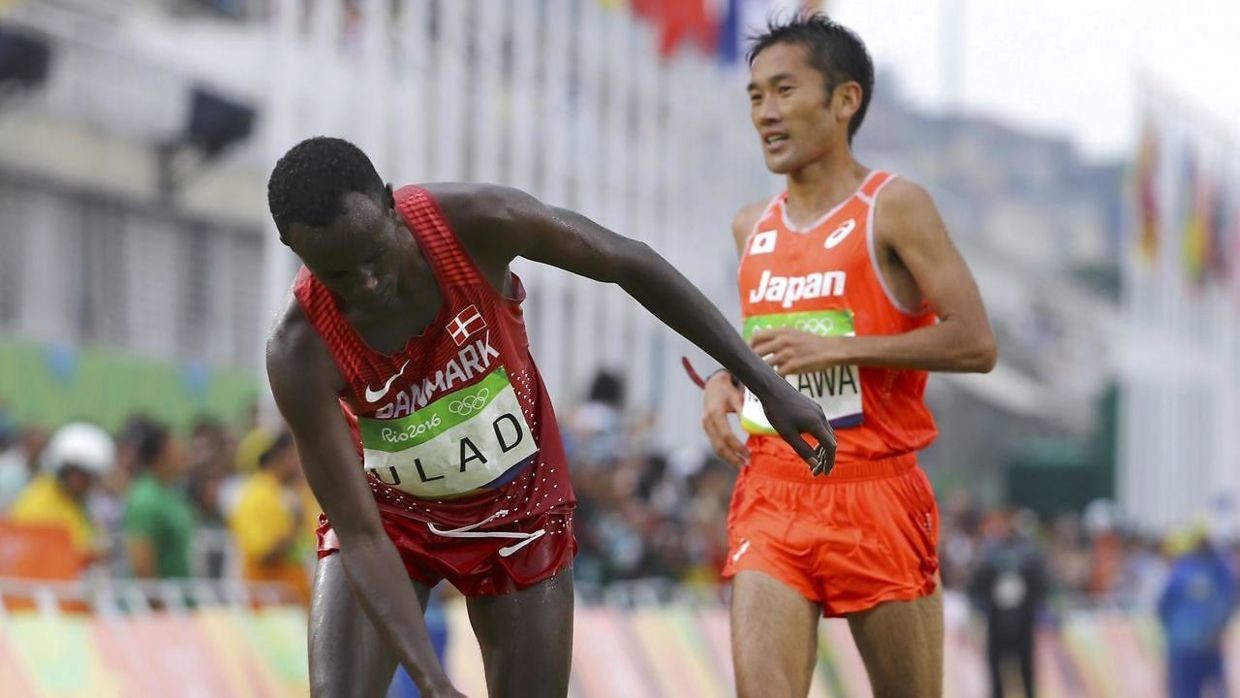
"Since I started running high school it's been 24 years," said Ishikawa at the press conference. "I've been with Honda for 17 years, and I made it all the way to the top, the Olympics. I'm glad that I've kept going this long.
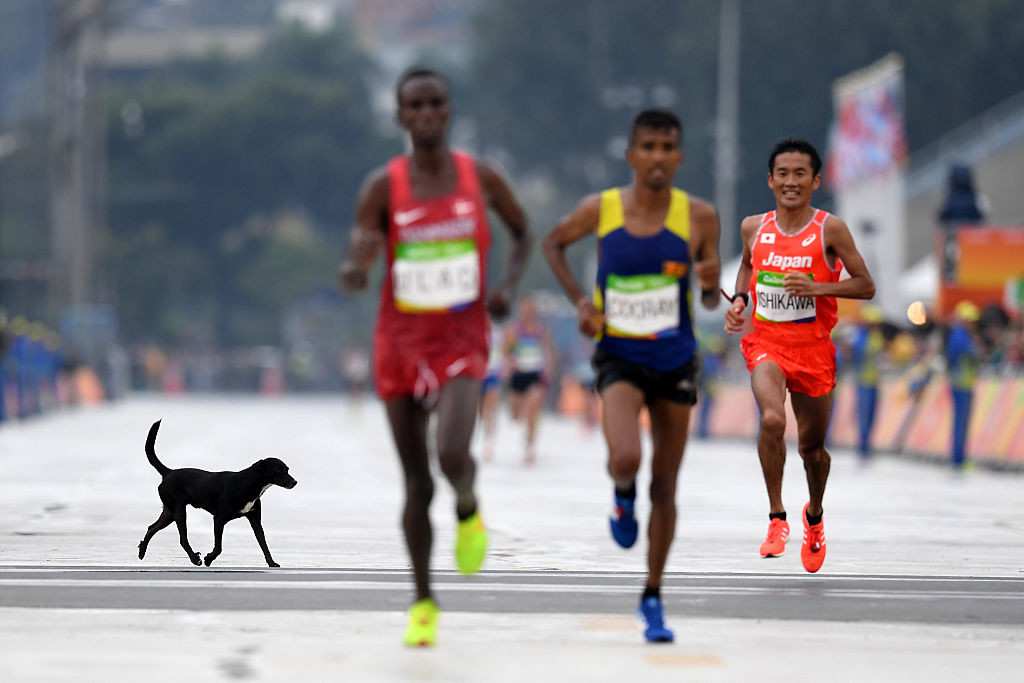
Ishikawa ran the Lake Biwa Mainichi Marathon on March 10 but dropped out after only 10 km. It will be his last race of his career.
"It was the first time in my career that I'd ever DNFd, and I thought, 'OK, this is where it ends,'" said Ishikawa. Shortly after the race he made the decision to retire.
Beginning in April he will become an assistant coach with the Honda team.
Login to leave a comment
Osaka Marathon
In 2022 the Lake Biwa Mainichi Marathon and Osaka Marathon were held together. For 2023 the name of the marathon will be Osaka and both men and women can run the race. The original male-only competition was first held in 1946 and, having taken place every year since then, it is Japan's oldest annual marathon race. The early editions of...
more...Bermuda Olympian and professional triathlete Tyler Butterfield will make his debut at the Lake Biwa Mainichi Marathon
Tyler Butterfield will literally run his way into unknown territory when he makes his debut at the Lake Biwa Mainichi Marathon in Otsu, Shiga, Japan.
The Bermuda Olympian and professional triathlete is scheduled to make his first appearance in the 26.2 mile race on March 10 and is under no illusion as to the enormity of the task at hand competing against the world’s elite runners.
“That will be an elite marathon so for me it’s my first one ever outside of Commonwealth Games and its going to be a calibre way above my limit,” Butterfield said.
“I think it was won in around 2:06 or 2:07 last year so I’m going to be 15-20 minutes behind.
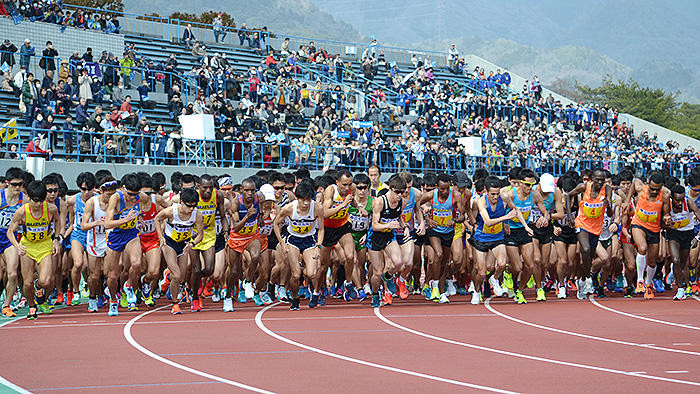
“But it’s a great opportunity to run with some of the best guys in the world. It’s going to be a lot of people better than me and I can challenge myself.”
The Lake Biwa Mainichi Marathon, a male only competition, is one of the prominent Japanese races of the year and the country’s oldest annual marathon.
Butterfield warmed up for March’s commitment in Japan with a solid display at last weekend’s Bermuda Marathon Weekend where he placed runner up in the adult mile, International 10K and Half Marathon to capture the Half Triangle Challenge title at the first attempt.
“The Bermuda Race Weekend was awesome and just a great hit out for the Lake Biwa Marathon,” he said. “It was great to come back and do the mile, 10K and the Half because I’ve actually never done that before.
Login to leave a comment
Osaka Marathon
In 2022 the Lake Biwa Mainichi Marathon and Osaka Marathon were held together. For 2023 the name of the marathon will be Osaka and both men and women can run the race. The original male-only competition was first held in 1946 and, having taken place every year since then, it is Japan's oldest annual marathon race. The early editions of...
more...Kenya’s Edwin Kipngetich Koech produced the Shenzhen Marathon’s first ever sub 2:10
The 26-year-old Koech enjoyed a comfortable lead after 25 kilometers and went on to win in 2:09:44. This is his second sub-2:10 run behind his personal best of 2:07:13 achieved in Milan last April. Koech took home a prize of US$20,000.
A leading group of more than 10 runners paced the race in the early stages. Only five men were left when the leaders passed the 20-kilometer mark, and that pack was trimmed to just three runners, Koech his compatriot Samuel Ndungu and Bekele Muluneh of Ethiopia, by the time they hit 25 kilometers in 1:17:09.
After covering the five-kilometer section between 25 and 30 kilometers in 14:41, Koech broke and built up a lead of more than half a minute and never looked back.
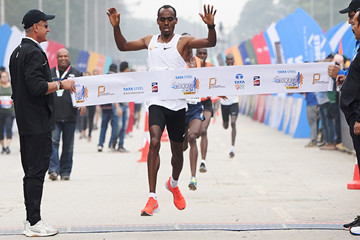
Bekele Muluneh improved his PR by 40 seconds to finish second in 2:11:19. Ndungu, a two-time Lake Biwa marathon winner with a PR of 2:07:04, settled for third place in 2:12:15.
Pre-race favourite Seboka lived up to expectations in the women’s race. She won in 2:27:12 to improve on her runner-up finish from last year while taking down the course record of 2:33:25 set by last year’s winner Viktoria Poliudina of Kyrgyzstan.
Seboka broke away from Kenyan veteran Flomena Chepchirchir near the halfway mark and when she passed the 25-kilometer water stations in 1:26:27, the margin had been widened to some 10 seconds.
The 34-year-old Ethiopian kept extending her lead and claimed the convincing win with an advantage of nearly five minutes.
It is Seboka’s second title in China this year as she also won the Dalian International Marathon in 2:28:59 seven month ago. The Ethiopian has finished within 2:30 in each of her three outings in 2018 with a season’s best of 2:25:01 registered in Seoul.
The 37-year-old Chepchirchir, who finished 10th in Shenzhen last year, took second place in 2:32:05, which was her best mark since achieving her PR of 2:23:00 back in 2013. Ashu Kasim of Ethiopia was a remote third-place finisher with a clocking of 2:38:35.
Login to leave a comment


